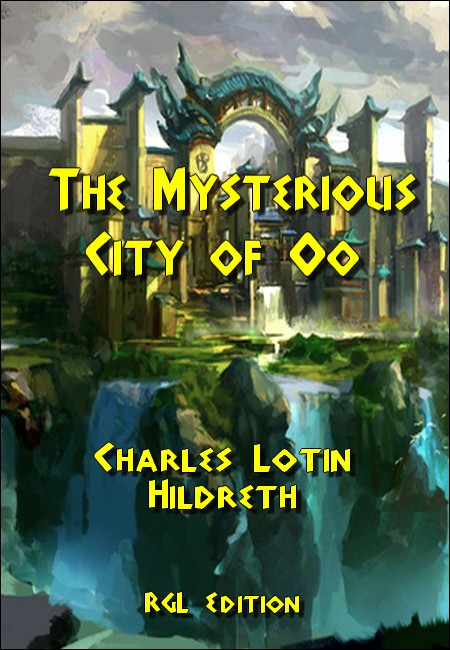
RGL e-Book Cover©
Roy Glashan's Library
Non sibi sed omnibus
Go to Home Page
This work is out of copyright in countries with a copyright
period of 70 years or less, after the year of the author's death.
If it is under copyright in your country of residence,
do not download or redistribute this file.
Original content added by RGL (e.g., introductions, notes,
RGL covers) is proprietary and protected by copyright.

RGL e-Book Cover©

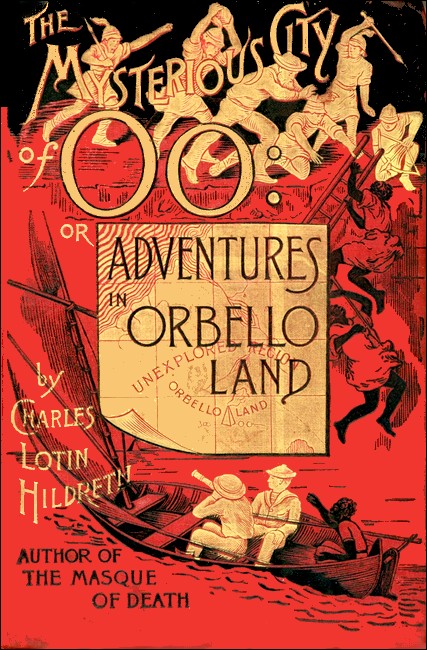
Belford Clarke Company, Chicago, 1889
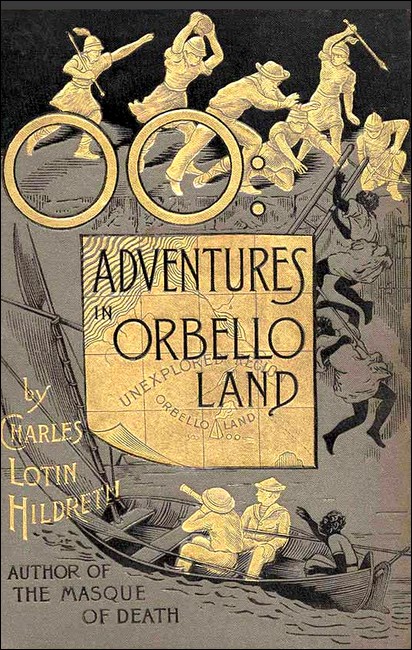
Federick Warne and Co., New York, 1893
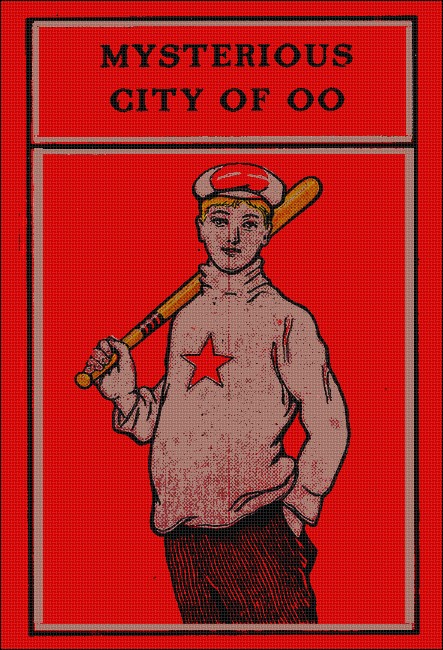
W.B. Conkey, Chicago, 1889
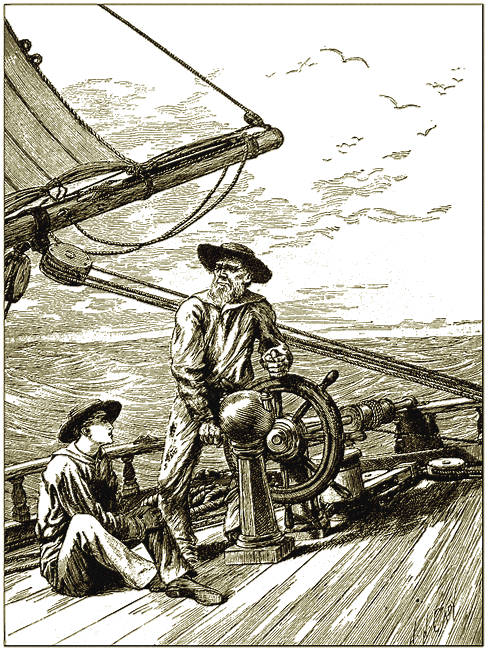
Frontispiece
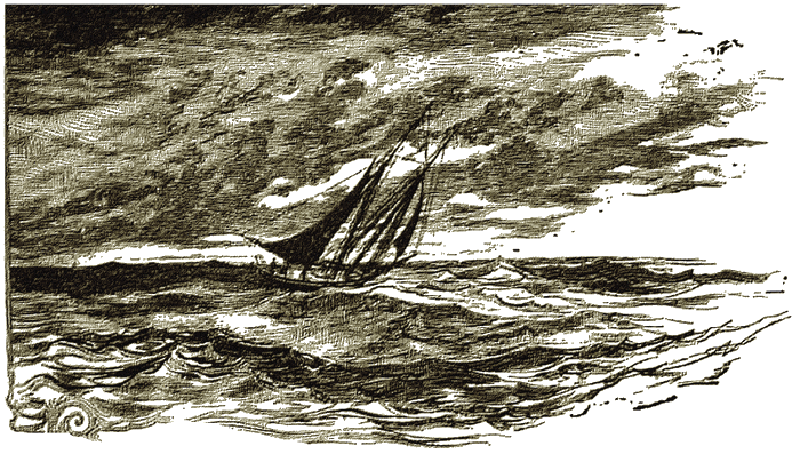
DAYLIGHT was breaking dimly through wild-looking clouds upon a world of tumultuous waters. One of those dangerous storms which, in the tropics, spring out of the heated regions of the air with sudden and devastating violence, had been raging all night. Toward morning the tornado had abated somewhat, but it was still blowing hard and the sea ran in short heavy swells, bursting into frothing ridges of snowy foam. Riding the waves with the lightness of a water-fowl, her tall spars bending gracefully to the sharper gusts of wind, a vessel under single-reefed mainsail and jib was beating slowly toward the northeast.
She was a handsome boat of four or five hundred tons, schooner-rigged, with slender masts and spars and a spread of canvas which would have served a still-water yacht. Indeed from the beauty of her lines, the plentiful display of brass-work in her fittings and her polished hard-wood rails, hatches and stanchions, it was evident that she had, in fact, been designed originally for a yacht. The purity of her decks and her general air of neatness and good order now, proved that if she were not still in use as a pleasure boat, she was at least engaged in some very light and cleanly trade. From certain signs about her a sailor would have declared that she was of American build and that she had been many weeks at sea.
The crew, exhausted with their labors during the night, had gone below, and the watch on deck consisted of the man at the wheel and a boy of fifteen, who sat at a little distance, regarding his companion with an expression of anxious inquiry.
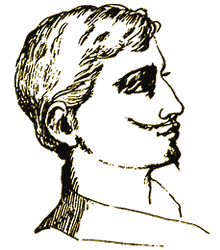
He was a handsome, manly-looking lad, with brown curling hair and bright gray eyes. Though his hands were soiled by labor and his clothing was poor and patched in a dozen places, he was plainly much above the class to which cabin-boys ordinarily belong. His face, bronzed and darkened by exposure to the weather, though frank and sincere, wore a thoughtful and troubled look not natural in one of his years.
The man at the wheel was about fifty years of age, short of stature, but so powerfully built about the shoulders and back as to present an almost comical appearance, as he stood balancing himself to the swaying of the vessel upon a pair of legs, which for girth, at least, might have supported a sizable elephant "There is plenty of me," he was in the habit of remarking, "only I grew sidewise instead of up and down, d'ye see?"
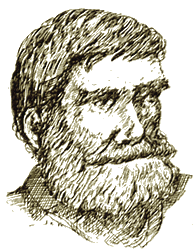
His face was rugged and weather-beaten and looked more like a piece of rough red ox-leather than anything human. His eyes were small, keen and set deep among a net-work of wrinkles and creases, giving him an expression of perpetual good-humor and joviality. Good-humor was, in fact, his chief characteristic, though upon certain occasions he might manifest a decidedly combative disposition. Such occasions, however, were very rare, for he had an unlimited belief in his own muscular powers, and it was his firm conviction that he was more than a match for any three men living. Consequently he considered it both unfair and unmanly to notice provocations from individuals whom he could utterly demolish if he chose.
The baptismal name of this personage was Benjamin Barker, commonly abbreviated to Ben Bark. It was all the same to Ben. "Names don't signify," he observed philosophically, "calling a marlinespike a monkey won't make it climb a backstay. So what's the odds?"
At the present moment Ben's features had assumed an unnatural gravity. His huge hand, tattooed with certain nautical emblems, gripped the spokes of the wheel as if it would crush them to pieces, in the agitation of some unaccustomed emotion. From time to time he glanced mechanically at the compass before him, then his eve sought the boy's face again with a perplexed and troubled look.
There had been a long silence between the two, but the sailor at length, broke it by saying in an unsteady voice,
"So lad, you are bound to leave the ship, are you?"
"Yes," replied the boy, with a flush in his brown cheek. "I have borne all I can bear. I will submit to the captain's abuse and ill-treatment no longer. He is my relative, but if I were a vagabond whom he had picked up out of the gutter he could not use me more shamefully."
"Will you desert, lad?" asked Ben.
"Yes," answered the boy, "and you will help me, Ben."
"I don't know about that, Rollin," replied Ben, shaking his head gravely, "desertion is agin all seamanship and mostly is a sneaking business. I did so hope you were going to stick by the ship and make a man of yourself, instead of going back ashore and degrading yourself into a common landsman."
"But what can I do, Ben? You see my position here."
"I don't blame you, boy, no I don't. You have had hard usage, that's a fact."
"And you will help me to get away, Ben?" asked the boy eagerly.
The sailor looked down at him a moment without replying, his rough features expressive of deep feeling.
"I'm a fool, a regular marine!" he ejaculated at length. "But d'ye see, lad, when a man takes a liking at my age it's a hard matter to beat agin it and face the situation in a sensible and seaman-like fashion.
"What is it, Ben?" enquired Rollin, arising and laying his hand affectionately upon Ben's broad shoulder. "What have I said to hurt your feelings?"
"No, lad, no," said Ben, shaking his head, "it's human natur' that's to blame, d'ye see? Man and boy, I've sailed the sea thirty-five years, never coming to anchor for any length of time and consequently never forming no family ties. But it's human natur' to form ties of one sort or another, and when a man gets to my age he grows hungry-like for something or somebody to look after and take care on. When you came aboard, lad, I was just in that state that I took to ye powerful, and I did hope we might sail in company for the rest of my voyage of life."
Much affected by his rough friend's emotion, the boy remained silent and Ben continued,
"But, as I said afore, I'm an old marine. A gentleman's son like you, can't mess with a common 'fore-master like me and I should have known better. But it goes right hard with me to think of losing you."
"I am glad to hear you talk so, Ben," cried the boy, seizing one of his friend's great hands and pressing it warmly. "But I must desert, Ben, or I shall go mad."
"Shall I pitch into him, yonder?" asked Ben, nodding his head mysteriously toward the cabin hatchway. "I know it's downright mutiny, but I'll do it if you say so."
"No, no, Ben," answered Rollin quickly, "it would only make matters worse. He would put you in irons and abuse me more shamefully than ever. No, help me to get away quietly. It is all I ask or desire."
Ben Bark fixed his eyes mournfully upon the compass and remained silent.
"Ben," said the boy suddenly, "where are we now?"
The sailor raised his head and gazed thoughtfully over the wide expanse of tossing water.
"Last night at sunset we were less than fifty miles off the west coast of Australia. The gale blew from the southward all night and shifted round to the eastward at daybreak. As near as I can guess, we can't be far from Cape Leveque, at the mouth of the Darke river."
"Ben," said the boy again, with an earnest look, "were we not almost in this very spot six months ago?"
"Aye, lad," responded the sailor, returning his look.
"And have we not been in this neighborhood three times before, while I have been aboard the ship?"
"Mayhap, lad, mayhap," answered Ben slowly.
Rollin remained silent, with his chin supported upon his hand, for some minutes.
"Is there any large town upon this coast, Ben?"
"I never heard of any, boy."
"And there is nothing but swamp and desert and uninhabited country along the whole west coast, eh Ben? No port at which a vessel could take in or deliver a cargo?"
"Not unless it was to trade with naked savages for a cargo of crabs and mud-fish," was the reply.
"Then why are we here?" persisted the boy.
"Why," said Ben, avoiding the boy's eye, "seeing that the captain laid the course and the crew obeyed orders, it is quite natural that the ship should be where she is."
"You are joking, Ben," responded the boy reproachfully. "Is it not true that there is no town along this whole coast and no apparent reason why a ship should ever come here? Is it not true that we have spent the best part of this voyage cruising in these waters, never landing except at some uninhabited island? And at such times does not my cousin always go ashore alone and spend hours away from the ship by himself, returning more gloomy and silent than ever? Is it not true that while we are in these waters he is more abusive and savage toward me than at other times? Is not all this true, Ben? Answer me."
"Well," said Ben reluctantly, "if I was put upon oath, lad, I should have to say that you are about right."
There was a long silence between the friends, each seeming to be occupied with painful thoughts.
"Ben," said the boy at length, "was it not somewhere on this coast that my father was lost?"
The sailor started and glanced about him apprehensively. Before he could reply a stern voice from the companionway put an end to the conversation.
"Aft there! Send that shirking boy forward, Ben Bark, and mind your eye with that wheel. The sails are shaking now."
"Another time, Ben," whispered the boy, as he turned to obey the harsh summons. "You are on the middle watch to-night. I will try and steal out and come to you. Meanwhile not a word of my plans."
"Mum as a barnacle," replied Ben, in the same tone. "Poor lad, poor lad!" he muttered, as he watched the boy's retreating figure. "Strange things come to pass in this world. Here we are on the very spot where it happened, with his son on board. Is there a fate in it, I wonder?"
TO judge from his manner and look, Captain Chadwick was not in the most amiable frame of mind possible. He had come on deck during the conversation recorded in the last chapter, holding a sea-chart in his hand. His eye wandered from the chart to the stretch of heaving water eastward, then to the spars of his vessel, and a heavy frown settled upon his features.
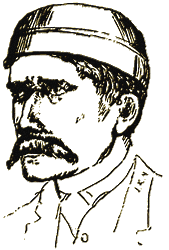
Captain Chadwick was not an ill-looking man, as far as face and form went, being of medium height, with broad shoulders and active though not powerful frame. His hair was short, slightly grizzled and curly. His face was clean-shaven, with the exception of a moustache which shaded a stern, firm set mouth. His eyes were black and piercing as a hawk's, with an expression hard to describe, but producing an unpleasant effect upon the beholder. Altogether he was a man one would be likely to distrust and avoid, without exactly knowing why.
He continued to examine the chart and the ocean at intervals, for some moments, his face growing darker with each glance. Although the Swallow had weathered the storm without the slightest damage and was then sailing upon a safe course, with plenty of sea-room, the captain seemed savagely displeased with the state of affairs generally.
Detecting Rollin in conversation with Ben Bark at this moment, his frown grew even blacker, if possible, as he gazed at the boy. Calling him forward in an angry tone, he ordered him to go below and summon the first mate upon deck.
That officer appeared promptly.
"Good-morning, Mr. Tobias," said the captain, abruptly. "What do you think of the weather?"
Mr. Tobias glanced aloft at the spars, then at the water and replied,
"Why, sir, it is as favorable as can be. The storm has blown itself out and the ship is as sound as a nut."
"Will the wind hold in this quarter, think you?" asked the captain in the same abrupt tone.
"To my mind it has a flavor of south in it, sir," responded the mate. "The wind seldom holds long at east in these latitudes."
"Then we are likely to sight land before dark?"
"We ought to make land from the mast-head before sunset," replied Mr. Tobias.
"What part of the coast should we make on this course?" enquired the captain.
"To my mind it will be one of the Buccaneer islands, sir, somewhere off the mouth of the Darke River."
The captain walked away a few steps, with his head bent thoughtfully and returned again. Presently he addressed his subordinate again.
"We will hold on until we are within three miles of the shore and drop anchor for the night. I shall land in the morning, alone. You will see that no other person aboard this ship holds any communication with the shore while we are in this neighborhood."
The mate looked at his superior with some surprise, but interposed no objection.
"Very well, sir," he responded gravely. "Your orders shall be obeyed."
"The wind is shifting already, Mr. Tobias," said the captain, as the breeze, which had been blowing steadily, changed to irregular puffs and the water assumed a more broken and disturbed appearance, "shake out the reefs and get more sail on the ship."
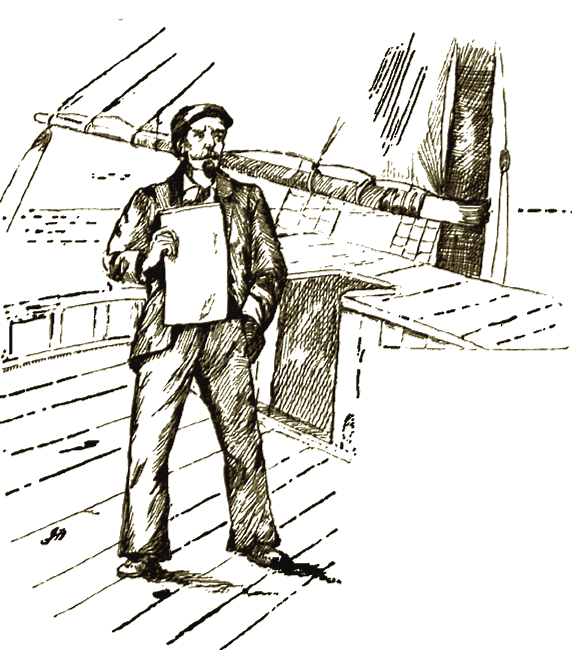
The mate retired and the captain continued to pace the deck, with contracted brows and downcast eyes.
His meditations were interrupted by a light step behind him, and turning about, he saw Rollin standing beside him.
"What do you want?" he said harshly.
"Mr. Tobias reports that your directions have been obeyed," answered the boy. "He asked me to speak to you as I passed."
"Very well," responded the captain, "now get below and help the cook clean the ship's coppers."
Rollin's cheek reddened. After a moment of hesitation, he said,
"Are you sure you really mean that, cousin?"
"What is that?" asked Chadwick, sharply. "What are you talking about?"
"I wanted to give you a chance to remember, cousin," answered the boy quietly, "that I did not come on board the Swallow to do such work as that."
"Pray, what did you do me the honor of coming for, then?" retorted Chadwick, sarcastically. "Perhaps a suit of broad-cloth and a seat at my table would be more to your taste."
"It would certainly show better taste on your part," answered Rollin, "and it would certainly be nearer to your promises."
"Do you offer insolence to me, you young vagabond?" said Chadwick, angrily.
"I don't mean to be insolent, cousin," answered the boy, "and I am no vagabond. If I am poor, ragged and dirty, the fault is not mine but yours."
"That will do," said his cousin, coldly, "I wish to hear no more. Go below and attend to your work.
"But I have something more which I wish to say," responded Rollin, without moving. "When you sent for me and offered to take me to sea with you, you told me that my duties would be light and that I should be taught navigation and fitted to become an officer. How have you kept your word with me, cousin?"
His relative looked at him with lowering eves, seeming astonished as well as enraged at the boy's boldness.
"If you imagined that you were to live in idleness at my expense," he said, "you were greatly mistaken. I allow no drones aboard my ship."
"I am not a drone, cousin, as you well know," replied Rollin. "I am willing to work; I do work far beyond my strength. And what do I get in return? Ill-usage, poor food, and rags."
"You would have been starving or stealing, if I had not picked you up out of charity," answered the captain harshly. "Instead of being grateful you are impertinent, you young beggar."
"Grateful!" repeated the boy, "for what? for being treated like a drudge on a ship that was once my father's?"
"The less you say about that the better," said the captain, with a dark look. "I should have thought that you would not be very anxious to call your father to mind."
"You, of all persons in the world, should say least against my father," retorted Rollin indignantly, "for you alone have benefited by his disgrace and death."
"What do you mean to insinuate, you young scoundrel?" cried Chadwick, white with rage.
"I mean that I am convinced that if justice were done, my father's name would not have been dishonored and you would not now have it in your power to abuse his son."
"Why do you suspect me?" asked Chadwick, glancing about him anxiously and speaking in a lower tone. "What was there in my actions to justify suspicion?"
"Time will show," answered Rollin. "When you returned from that last voyage, you told us the story of my father's disgrace and death and you showed us papers which gave you the right to all of his property. But child as I was, I did not believe your story. I do not believe it to-day."
"And you do me the honor to believe that I was in some way responsible for your father's mishap—no, give it its true name—his crime?" Chadwick spoke quietly, but there was a dangerous gleam in his eyes.
"At all events," responded the boy, "I am convinced that sooner or later I shall know the truth. And," he added, looking steadily at his relative, "I am convinced that it will be a bad day for you, cousin, when the truth is known."
Chadwick was silent He was deadly pale and his features were frightfully distorted. Casting a furtive glance around, he suddenly seized a hand-spike lying upon the deck, and before the boy could divine his intention, struck him a powerful blow upon the head.
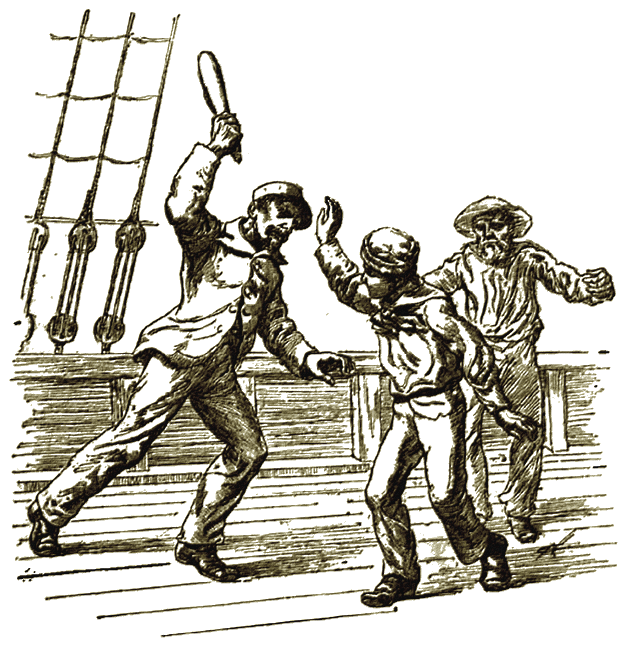
Fortunately for Rollin, his thick sea-cap deadened the force of the blow and the heavy instrument merely cut the skin upon his forehead. Apparently maddened by his own act, Chadwick was about to repeat the blow with better aim, when the hand-spike was suddenly wrenched from his hand behind and Ben Bark's deep voice said quietly,
"No, no, captain; think better of it. Remember the little chap can't stand the battering that tough old timbers like yours and mine can bear. I'm sure, now, if you think it over, you'll take a sort of more sensible view of it, d'ye see?"
Chadwick turned with a furious ejaculation, and struck Ben a heavy blow with his clenched fist. Ben merely shook his head, without offering to return it.
"Well, well, Captain," he remarked, without the smallest trace of anger, "if you must open fire on somebody, better on me than on the little chap. Because I can stand it, d'ye see? I know my duty, Captain, and though as ready at a scrimmage as most men when its equal and fair, I hold it to be unseamanlike to strike my superior officer. So if you will let the boy go, you may take it out of old Ben and welcome."
"If he dares stir a foot until I order him to go," shouted the infuriated Chadwick, "I will brain him on the spot."
"Well, well," said Ben, with a sigh, "I s'pose there must be exceptions to all rules. I did think to sail out my voyage in this here life, without disobeying orders, or treating my commander with disrespect. But circumstances alters cases. So here goes."
So saying, the sailor threw his powerful arms round Chadwick and, despite his struggles, held him helpless as an infant.
"Now, lad, go below as fast as you can," he said, "and stay out of the way till the captain has had time to reflect. As I said afore, when he comes to himself, he will see the philosophy of what I have been telling him."
The crew, attracted by the scuffle, had gathered from all parts of the vessel and now stood looking on the strange scene with wonder.
"Mutiny!" shouted Chadwick, "will you stand by and see me assaulted? Lend a hand here, will you?"
"Yes," said Ben, shaking his head, "I suppose that's what it is, just mutiny and nothing less. But it was the choice of two evils, d'ye see, mates? Ben must draw the enemy's fire, or the little chap's hold be stove in. Now, then," he added, seeing that Rollin had disappeared, "I'll take the stoppers off the captain's arms."
"Put him in irons," commanded Chadwick in a low, hoarse tone, when he was free again.
"I'm agreeable," said Ben. "Irons is according to rules and regulations made on purpose for such like cases. So bring along your bracelets and lay old Ben Bark by the heels."
The manacles were put upon the sailor and escorted by the mate and carpenter, Ben went cheerfully below, while Chadwick continued to pace the deck with a face more dark and threatening than ever.
THE Swallow, under easy sail, ran smoothly and rapidly before a brisk, southwest wind. At two o'clock land was sighted ahead, and before sunset the coast, which proved to be a low barren island, was not more than six miles distant.
After examining it long and attentively through the glass, the captain ordered the course of the vessel to be changed a couple of points, and as the wind had become lighter, more sail was set.
The Swallow was now in the broad bay, into which the Darke River empties, known as King's Sound. The island was soon left on the larboard quarter; at sunset the schooner was hove to at a safe distance from the land, and the captain announced his intention of going ashore in the morning.
Meanwhile he seemed to have forgotten both Rollin and Ben Bark, together with the disgraceful scene of the morning. Rollin had continued to perform his duties, without crossing his cousin's path; and as for Ben, lodged in a dark corner of the hold, with irons upon his limbs, he was not in a position to give the captain much trouble.
Most persons in Ben's situation would have employed themselves either in bemoaning their fate, or pondering schemes of vengeance. Ben did neither. His good humor was inexhaustible.
His mind, however, was not altogether at ease. He considered that he had done his duty in protecting Rollin, but he also admitted that in laying hands upon his superior officer he had been guilty of a serious breach of discipline.
He interrupted his reflections to search in his pocket for his plug of tobacco. By reason of his irons, this was a matter of considerable difficulty. By dint of hitching and straining, however, he at length accomplished his object, and, rolling his quid luxuriously into his cheek, he continued, half aloud,
"This little chap, what I have took to so powerful, is a puzzler. If he deserts on this coast, the savages or the fever or starvation will do for him. If he stays aboard, who's to say that the captain won't serve him as he served his—Avast there, Ben Bark! Put a stopper on that jaw of yours, will you? unless you want to perwide a meal of wittels for the sharks afore your natural time. Well, well Ben, the best you can do is to see what turns up and make the most of it."
Having reached this satisfactory conclusion, Ben's mind seemed greatly relieved. Making himself as comfortable as possible in his narrow quarters, he deliberately went to sleep. It will be seen by this that Ben was a practical philosopher, possessing that most admirable of faculties, the ability to make the best of a bad job.
The hours passed slowly away. The groaning of the ship's timbers and the creaking of the spars, were sounds too familiar to the sailor's ear to disturb his slumbers.
He was awakened at length, however, by a low knock upon the bulkhead near him.
"Who's there?" he called.
"Hush! it is I, Ben," answered a voice, which he recognized as Rollins. "Don't speak until I get in where you are. I have found a hole in the partition and I am making my way through."
Ben waited in silence, until he felt the boy's hand upon his shoulder.
"I am afraid you will be found out and punished for coming here," whispered the sailor.
"No fear of that," replied Rollin. "It is near midnight and the captain is in his cabin. I have brought a lantern, which I am going to light, and better than that, I have found the carpenter's keys and I am going to take off your irons."
In another moment the smoky glare of the lantern illuminated Ben's prison. Selecting the proper key, Rollin unlocked Ben's manacles and threw them aside.
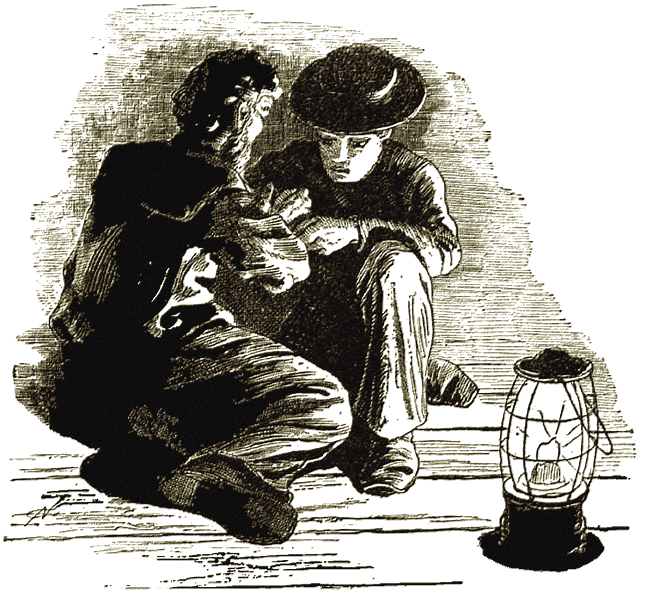
"Now," said he, silting down beside his friend, "let us talk. First of all, how can I thank you for what you have suffered on my account?"
"By just saying nothing at all about it," was the sailor's reply.
"Ben," said the boy abruptly, "I am going to leave the Swallow to-night. Will you help me?"
"Have you thought it over, careful like?" asked Ben, seriously. "Do you know that if you leave the ship here you will be alone in a wild country, more than a thousand miles from any white settlement?"
"So much the better," answered Rollin quietly. "It is just here, on this part of the Australian coast, that I wish to be. If I had not come here in the Swallow, I should have found some other way. Ben," added the boy, laying his hand upon his friend's arm, "you were one of the Swallow's crew when my father was her owner?"
Ben assented silently, with an uneasy look at the boy's face.
"Ben," said the boy again, after a pause, "are there any people in the slave-trade now-a-days?"
"Yes," he replied, with the same uneasy look. "Some Arabs and Malays run slavers on the coast of Africa, and among the islands still. It is a dangerous trade and means hanging if caught."
"Are there any white men in the trade, Ben?"
"Some few Portuguese," was Ben's reply, "if you can call such yellow varmints white men."
"Ben," said Rollin in an almost inaudible voice, "my father was accused of being a slave-trader."
Ben bowed his head, without replying.
"But you do not believe it, do you, Ben? You knew my father. He was a good and honorable man. Tell me, Ben, that you do not believe it."
The boy spoke in a low, trembling tone, and there was an expression of deep trouble in his young face.
"No," replied the sailor solemnly. "I do not believe it, lad; for it is a lie, a cruel, cowardly lie that will look black agin' the names of them that invented it, on the great day of reckoning, when all log-books are overhauled by the Captain up aloft."
"Ben," said the boy, grasping his friends huge hand, "I am going to try and clear away the disgrace upon my father's name. I am only a boy, I know, but it is a good cause and I shall succeed, I know I shall. Will you help me?"
"Best let it be, lad," responded the sailor gravely. "It's a dangerous business."
"I know what I have to expect." replied the boy firmly, "my mind is made up. If you will help me, I shall be grateful all my life. If not, I must do my work alone."
The sailor made no reply for some time, but sat with his eyes cast down as if in deep thought.
"Rollin," said he, presently, "I had meant to carry my thoughts and suspicions with me to the grave. But since you have come aboard, my mind has been troubled with many misgivings as to what my duty calls upon me to do. If there had been any real proof, it would have been another matter. But it's like sailing in the dark in unknown waters. You can neither shake out your reefs not let go your anchor. However, I will tell you what I know and mayhap your young eyes can see light where old Ben's are pretty much blind."
Rollin listened breathlessly, while the old seaman spoke, bending his head closer to him so as not to lose a word.
"I was one of the Swallow's crew," continued Ben, "when your father made his last voyage in her. She was not a regular trading vessel, but what she was cruising for in these waters, no one knew besides your father. He never opened his mouth, unless it may have been to his first mate, Chadwick. Whatever it was, he was very earnest about it. He was always looking into bays and rivers hereabouts and making long journeys inland. He had learned the native lingo, and would invite crowds of the black fellows aboard to talk with them."
"On that same last voyage," continued Ben, "I fell through a hatch and broke a leg, and was laid by the heels in my hammock for the rest of the cruise. After a while, as I lay there, it began to grow upon me as how there was something wrong going on aboard the ship. What it was I could not guess, but whatever it might be, I was sure that Chadwick was at the bottom of it."
"Yes, yes," murmured Rollin, "I knew it."
"He was very thick with two of the crew, hard-looking, hung-dog fellows as ever I set eyes on. My hammock had been slung outside of the mess-room, between decks. Often when the rest of the crew were above, Chadwick and his two cronies would slip into the mess-room and hold long talks together. There was a plank partition between us and they always spoke cautious, but now and then I caught a word which set me thinking."
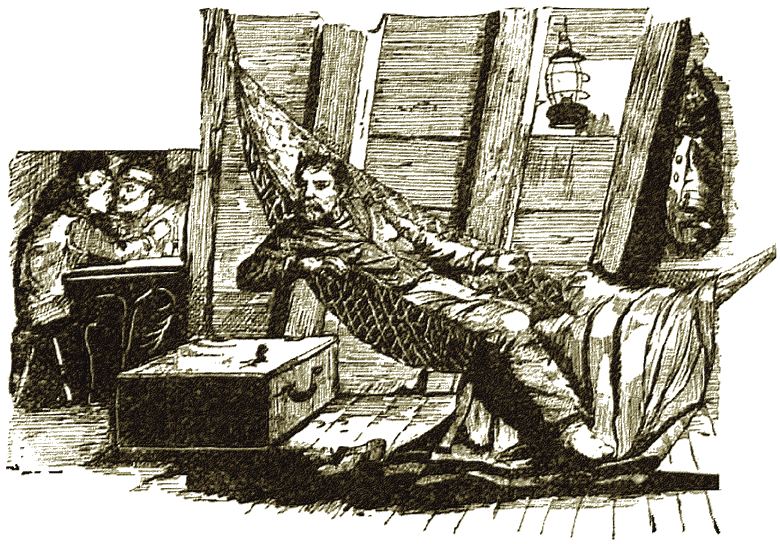
"One night," continued Ben, glancing about him uneasily, "as I lay turning my doubts and forebodings over in my mind, I heard the sound of voices in the cabin, followed by the scuffling of feet on the deck overhead. The men were all asleep below, except the watch, which, as I called to mind, was them same two hard-looking friends of Chadwick. The trampling of feet seemed to move across the deck toward the starboard quarter. Then there was a creaking of blocks as if a boat were being lowered. A horrible suspicion made my hair stand up and my flesh creep."
The boy's hand, which held the sailors, tightened its grasp, and for a moment the two friends sat looking at each other with pale faces.
"Forgetting all about my leg," said Ben, after a pause, "I started to get out of my hammock. The bone had just begun to set and it gave way beneath me. I fell back in a faint and for many a long day I was out of my head with the fever that followed. When I came to myself again I was told your father—There, lad, there! Don't take on so, that's a good lad.
Overcome by the emotions excited by the sailor's story, Rollin had covered his face with his hands and was trembling violently with grief and horror.
"Go on, Ben," he said, at length, raising his head and brushing the tears from his eyes. "Tell me all. I can bear it
"There is but little more to be told, lad, replied Ben. Your father disappeared without leaving a trace behind him. Chadwick's two friends talked around among the crew that your father had intended to turn the Swallow into a slaver and run a cargo of black fellows to the African coast. He had tried to get Chadwick to go into the scheme with him, they said, but he had not only set his face agin' it, but had threatened to stir up the crew and deliver him up at the nearest civilized port. That frightened your father and that same night, in fear of the consequences, he jumped overboard and drowned himself."
Rollin drew his breath hard between his set teeth.
"Oh my poor father! he muttered.
"Whether the men believed the story or not, they had the good sense to keep mum. When we reached Cape Town the crew was paid off and discharged. Chadwick's two friends went up into the country and bought sheep-walks, which, considering that there was only about sixty dollars apiece in wages justly due them, I take to be a suspicious circumstance."
"I see," said Rollin, bitterly, "they were well paid for putting my father out of the way."
"Just so," assented Ben. "As for me, I stayed with the Swallow. The ship was like home to me and I could not bear to quit her. It was borne in upon me, likeways, that I must stay, I don't know how. Perhaps there was a fate in it. At all events I stayed and here I am. Now, lad, you know all that old Ben knows."
There was a long silence between the friends. The boy sat with his head resting upon his hand, while the old seaman looked at him with a strange mixture of affection, perplexity and trouble in his rugged features.
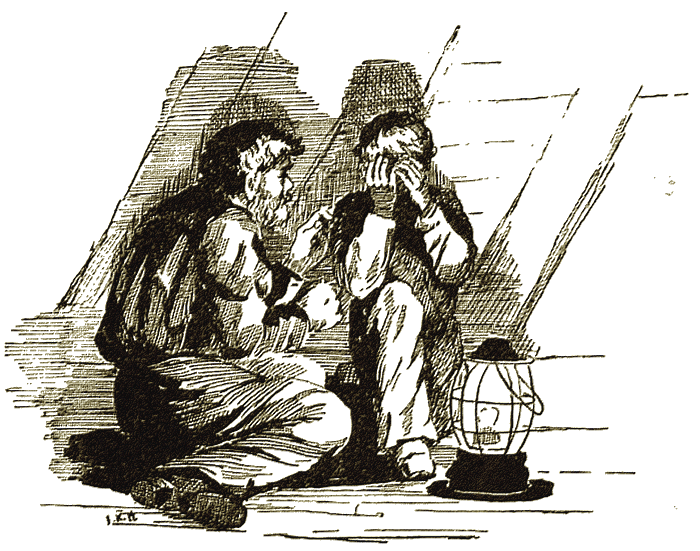
"Ben," said Rollin, raising his eyes at length, "do you believe that my father was—?"
He paused with a shudder.
"Made away with?" answered Ben, "not a doubt of it."
"And what was Chadwick's object?"
"Why, did you not say that he got hold of your father's property? Ain't that object enough? Ain't all the black deeds that men do, for the sake of money?
"That was not his original object," replied Rollin, quietly, "He had another and a more important one.
"Aye, lad?" said the sailor, in surprise. "How do you make that out?
"And he failed, said the boy.
"Did he, lad?" responded Ben, in still deeper perplexity. "Well, mayhap. But you have outsailed me now. I haven't an idea of what you are driving at."
"Ben," said Rollin, with a suddenness that caused the sailor to start, "what is Oo?
"Oo," repeated the sailor, with a puzzled air, "now lookee, lad, if it comes to the rigging of a ship, or a general notion of navigation, I might tell you the difference betwixt bolt-rope and a back-stay, or sailing close-hauled and going free, but when it comes to Latin or Hebrew or any of them foreign languages, you might as well ask the figure-head of this ship as Ben Bark.
"It is not Latin," answered Rollin gravely, "nor any language that I have ever seen in books. But I want to know what Oo means? I must know! If it is a place, I must go to it."
The sailor sat gazing at his young friend, as if he were not quite certain that he had not lost his senses.
"Look," said the boy, drawing a small tin case from his breast pocket, I have found something which puzzles and frightens me, because it seems so strange and yet seems to mean so much. I am sure that when I understand it I shall know what this mysterious Oo is. And Ben, he added solemnly, "when I know what Oo is, I shall know what became of my father. See!"
And opening the case, he displayed a singular object before the astonished eyes of the sailor.
THE object which Rollin exhibited to his bewildered friend was a small piece of the bark of some tree, flexible as cloth and of a yellowish white color. It was stained in places, and with the battered tin case which had contained it, showed signs of hard usage.
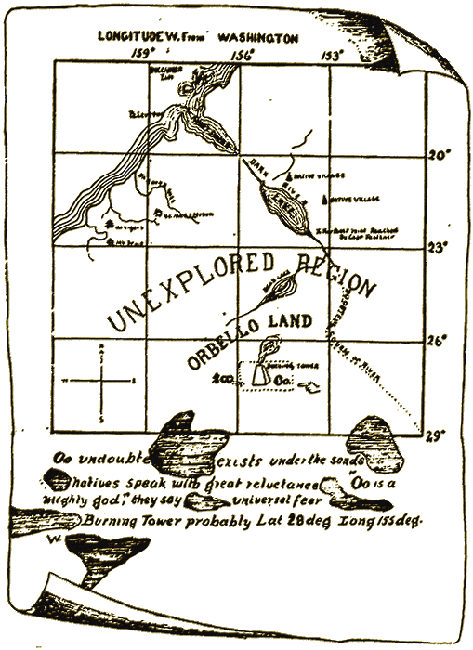
The boy spread it out carefully upon his knee and by the light of the smoky lantern, the old sailor saw that it was a kind of rude map or chart, with some lines of indistinct writing beneath it. It was roughly drawn and the ink which had been used, to all appearance the juice of some wild berry, was much faded.
With their heads close together and scarcely breathing in the intensity of their interest, the two friends bent over it in silence a long time.
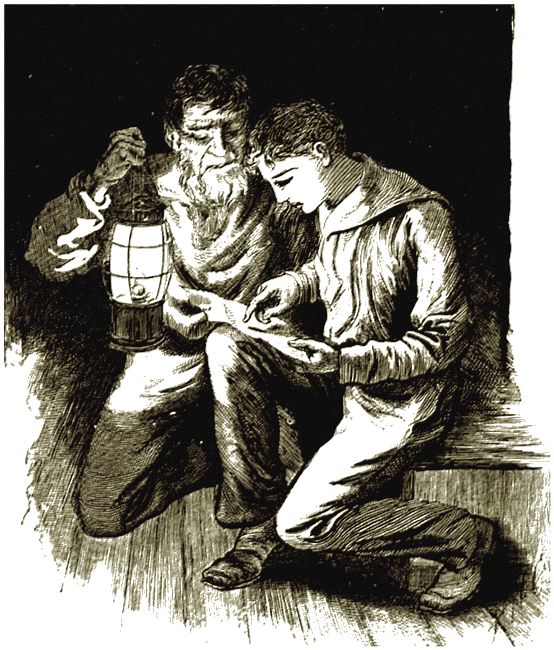
"Well," said Ben at last, with a deep sigh, "I have seen a many charts in my time, but I never run foul of anything like this here. I make neither head nor tail of it Do you, lad?
"Only a very little," replied the boy, "but enough, as I told you, to satisfy me that it has something to do with the mystery of my father's fate."
Ben glanced from the chart to the boy's face, with an air of great perplexity, but said nothing.
"Ben," said Rollin, laying his trembling hand upon his friend's arm, "since I have had that piece of bark I have come to believe a strange thing. It is that my father is not dead."
"Not dead!" echoed the sailor, aghast, "what do you mean?
"Listen, Ben," continued Rollin. "What you have told me just now about my father makes me still more certain that I am right. You told me that my father made many voyages in the Swallow on this coast, never stopping at any port or taking any cargo. Is that true, Ben?
"Exactly," replied Ben, "just so, lad."
"He made long journeys into the country and never told any one where he went or what he went for. Every one on board the Swallow knew that he had some object in which he was greatly interested, but he never revealed it Is that true, Ben?
"Exactly," replied the sailor, as before, "just so."
"On that last voyage you suspected that my Cousin Chadwick had some bad design against my father. You believe that he and his two ruffians took my father away in the boat by force that night, and did something with him, accounting for his disappearance by the wicked story of the slave-trade. This is true, too, is it not, Ben?"
"Word for word," answered Ben, "couldn't be truer, lad."
"Where was the Swallow on that night, Ben?"
"Hove to off a little island in King's Sound, near the mouth of Darke River."
"About six miles from the mainland, which runs out in a long point, and is hilly and covered with trees?"
"Aye, aye," replied Ben, "I know the spot well."
"We passed that island to-day," said the boy, "and we are now hove to off the wooded point. When we passed the island I saw Captain Chadwick examining it with the telescope. Do you know why he did that, Ben?"
The sailor shook his head.
"Because he thought it possible my father might be still there.
"Still there!" said the sailor with a gasp.
"Yes, Ben," replied Rollin. "Chadwick and his two men look my poor father to that island in the boat that night and left him there. Alone on that barren place, six miles from the mainland and many hundred miles from any town, was he not as completely out of the way as if he were dead?"
"True, lad, true," muttered the sailor, thoughtfully. "I believe you are right."
"It was not my fathers property which he was after, at that time," continued the boy, "though he took that later on, when his real object was baffled. Do you know what that object was, Ben?"
The sailor shook his head.
"It was Oo," said Rollin, laying his finger on the chart.
"It was Oo," repeated Ben, mechanically.
"My father had discovered something about this Oo which made him very anxious to go to it. Chadwick found out my father's plans and resolved to turn them to his own benefit. But my father had some clue or secret about this Oo which Chadwick has failed to obtain, so that his crime has done him no good."
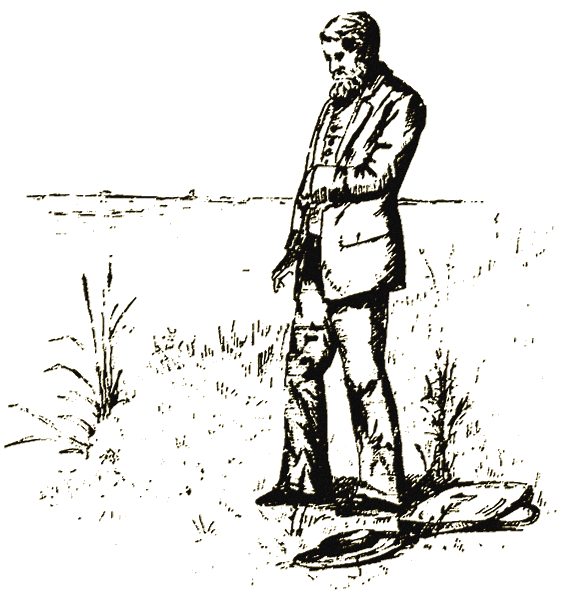
The sailor gazed at his young friend, with admiration and astonishment depicted in his rugged features.
"Think of that, now," he said. "Well, I always said you had the making of something great in that little head of yours."
"But Oo must be something very wonderful," added Rollin, smiling affectionately at the old sailor, "for Chadwick is still determined to find it. That is why he continues to cruise on this coast and make journeys inland, as my father did. Like me, he is not sure that my father may not have escaped from the island and be still alive. So he is always nervous and frightened. This, perhaps, accounts for his ill-nature to me, which is always worst when we are on this coast, as you have noticed, Ben."
"Remorse, lad," responded the sailor, sententiously.
"That clue or secret," said Rollin, "which Chadwick committed a crime to obtain, I found by chance one day while I was cleaning the cabin, behind a book-shelf. It is this very map, Ben."
"I always said there was a fate in it," replied Ben, solemnly.
"This map was drawn by my father while he was on one of his expeditions into the country. See, he says here—'Farthest point reached by Capt. Faulkner.' And here upon the back," said Rollin, turning the piece of bark over and pointing to some almost illegible lines of writing upon it, "he says, 'Another failure. Reached this place with incredible hardship. Food exhausted, everything stolen by the natives. I must again return to the ship without success.' Here under the map he says, 'Oo undoubtedly exists.' But what is 'Oo,' Ben? Is it a town, do you think?"
"Why, that can't be, for he says there, 'Under the sands'," answered Ben, slowly spelling out the words. "And there again, 'Oo is a mighty god,' meaning that the black heathens say that much, which just goes for nothing at all, seeing that they lie by nature."
"And what does he mean by the 'Burning Tower,' Ben? See, here is a picture of it, and beside it the word 'Oo,' in a dotted square.
"He gives the latitude and longitude of that there Burning Tower, whatever it may be," said Ben, "and since Oo, whatever that may be, is near it, you have the position marked out all ship-shape, latitude 27 degrees south, longitude 154 degrees west.
"And here is another strange thing," responded Rollin, pointing to a curious sign in the square adjoining that which contained Oo and the Burning Tower. "What do you make of it?
"It looks like some insect or varmint without legs," was Ben's perplexed answer. "But it can't be that.
"No," replied the boy, "for there is something like the mark which stands for dollars beside it. There is a mathematical sign, which we used in school, made by placing two circles or zeros side by side and touching each other. It represented infinity."
"So you make it out to mean an infinity of dollars? said the sailor, studying the symbol with renewed curiosity.
"Something like that, at least. A great quantity of money, or the place where it may be found. Perhaps a rich mine. Yes, that would account for Chadwick's persistent attempts to reach Oo, which you see is near it.
"Right, lad. Such a man would sell his head for money. His soul he can't sell, that having been mortgaged long ago to some one we are not called upon to mention, d'ye see?"
"Ben," said the boy, emphatically, arising and putting the chart carefully in his breast-pocket, "my father was a very strong man and very learned. He was not the person to stay upon that barren island and die there. He found means to reach the mainland."
"But if he is alive, lad, where is he now? asked Ben, anxiously.
"He is at Oo, Ben," was the prompt reply. "I am going there to find him. Will you go with me?"
The old seaman was silent for a moment, evidently in deep and uneasy thought.
"It's desertion, flat desertion," he muttered at length, "unseamanlike and agin' your principles, Ben Bark, as you have always stood up for. Deserting your ship is like going back on your word, and that is lubber's work." He scratched his head nervously. "But there, agin', is this little chap what I have took to so powerful. I can't let him go and get his little hull stove in among them blessed heathen. It's another puzzler, Ben, and the puzzlingest kind of a puzzler at that."
The boy watched his friends face anxiously, while the struggle between his affection and life-long prejudices went on in the old seaman's mind.
"Well," said Ben at length, sighing deeply, "I can't get the kinks out of the matter nohow, so I will just cut the rope and say I'll go with you, lad.
"Thank you, Ben; thank you," responded the boy warmly. "Now let us lose no time. By the greatest good fortune the captain had the boat, which he intends to go ashore in himself to-morrow, lowered and stored with everything necessary. There are oars and a sail, arms and ammunition, and a quantity of food and water. I put in more myself after dark, so there will be enough to last a long while. It could not be better if we had done it all ourselves.
"Fate," muttered the sailor. "I said there was fate in it from the first."
Extinguishing the lantern, the two friends made their way cautiously through the opening by which the boy had entered, and after much difficulty succeeded in gaining the deck of the vessel undiscovered.
The night was dark, though clear, and the stars were shining brilliantly in the deep blue of the sky overhead. A light breeze was blowing from the southward, and the vessel, with her bows to it and her sails loose, was riding the long, easy swells, without advancing. Not far distant, on one hand, an uncertain outline of deeper shadow indicated the position of the land. On the other, the undulating surface of the water melted away imperceptibly into the sky.
The two men who constituted the watch on deck were dozing near the stern, and the friends managed to creep to the forward gangway, where the boat lay alongside, without arousing them.
As they were on the point of lowering themselves into it, Ben turned, and looking back over the vessel said, in a low, regretful tone,
"A sweet boat she is, and it goes hard with me to leave her in this marine's fashion."
"Come, Ben," responded the boy, warningly; "if my cousin discovers us now neither of us will ever see Oo. You can judge by what we know of him what our fate would be."
"Yes, lad, yes," said the sailor; "Oo is the word now, whatever it may mean. And that little chart of your father's lays the course us two is to sail by hereafter."
Neither of the friends had detected a dark form which had been crouching in the shadow of the bulwark in a listening attitude, while they had been speaking. But now, as they were in the act of descending into the boat, it darted forward and seized Ben by the shoulder. It was Captain Chadwick.
There was something so menacing in his swift, tiger-like movement that the boy shrank back with a shudder. Not so Ben. Large and heavy of frame and far from quick of perception ordinarily, this was one of the emergencies in which his presence of mind and extraordinary muscular power served him to good purpose. With the rapidity of thought he caught Chadwick by the throat with one hand, effectually preventing him from uttering a sound, while with the other he dealt him a stunning blow upon the forehead.
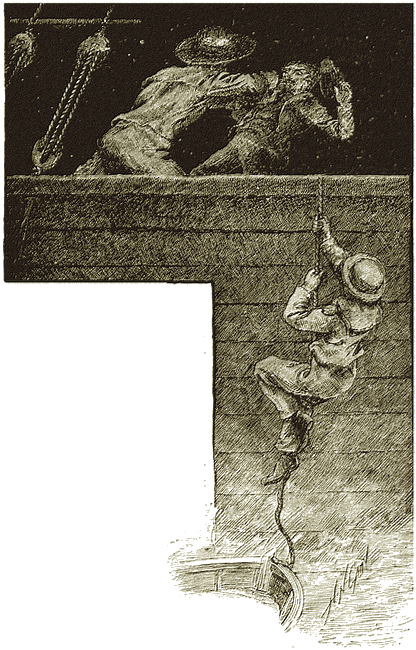
Lowering the helpless and unconscious form of their enemy to the deck, he signed to the boy to enter the boat, and quickly following him, cut the rope and pushed off.
All this had passed so swiftly and silently as not to have attracted the notice of the dozing men on the vessel's deck.
When they were at a safe distance from the vessel, Ben took up the oars and began rowing quietly.
"There," said Ben, philosophically, "I call that job neat and artistic, lad."
"I hope you did not strike him too hard, Ben," responded the boy, anxiously.
"Never fear," said the sailor, coolly; "it will be a matter of carrying his head in a sling a few days, that's all. If he will only have the kindness to lay quiet in the scuppers, where I put him, for an hour or so—Hark," he added, leaning forward to listen, and speaking in a disappointed tone, "I do believe I didn't hit him hard enough, after all."
A dull, confused sound came over the water from the direction of the ship and lights flashed out along her deck.
"Yes, yes," muttered Ben, "he has come to himself and in ten minutes will be after us. Row is the word now, lad, and forward to Oo!"
PROPELLED by Ben's vigorous arms, the boat was soon more than half a mile distant from the Swallow, But the creaking of the cordage, and the flapping of canvas, proved that she was being rapidly prepared for pursuit.
Rollin Faulkner was a boy of great natural courage and determination, but the consciousness of imminent danger and the strangeness of his position pressed heavily upon his heart. With a relentless enemy behind him, before him a wild country peopled by savages and full of unknown perils, and around him a lonely waste of water, gloomy and weird in the pale starlight, he might, indeed, be excused for the feeling of despondency which oppressed him now.
But the thought of the wrongs he had suffered and the great object before him soon renewed his firmness, and he grasped the helm of the boat with a resolution to face the situation boldly.
"Here she comes," muttered Ben, suddenly, as a dull rushing sound came over the water, indicating that the vessel was now in motion, "pointing dead this way, too.
"They will never find us in the darkness, said Rollin.
"There is good eyes and good night-glasses aboard that ship," replied Ben, "and a man who would give his right arm to get us back.
"You think that Chadwick overheard our conversation on the deck?" asked the boy.
"Certain, replied the sailor.
"Then he knows that we are bound for Oo, and that I have my father's chart with me. In that case, Ben, he will pursue us to the bitter end. But," said the boy, with compressed lips, "I will never give myself up while I live—never!"
"Right, lad," responded the sailor; "nail the colors to the mast and go down with them flying, if need be. But it ain't come to that yet, and I have faith in your luck, boy.
"Hush! what is that? interrupted Rollin, warningly.
"The Swallow," answered Ben, in a low voice, "lie down in the boat and she may pass without sighting us."
As he spoke, the tall shadow loomed up close to them, revealing the sails and spars of the vessel against the lighter background of the sky. It was a terrible moment for the two friends, as crouching breathless in the bottom of the boat, they watched the huge mass bearing swiftly down upon them.
For an instant it seemed certain that they were discovered, for the vessel came so close to them that they could distinctly hear the men on deck talking, and the sighing of the breeze through the rigging. But she passed on, and melting into the darkness, disappeared from sight.
"Is she gone? asked Rollin anxiously, as Ben arose and resumed the oars.
"For the present," replied Ben, "but we are not done with her yet. Chadwick will stand on as far as he thinks we can have possibly gone, and then come about and look for us on the other quarter.
"The land is not far off," said Rollin, "had we not better go ashore and hide among the woods? We should be safe there.
"That would be the same as giving up the cruise altogether," answered Ben. "Without the boat and wittles and water in that there wilderness, we should be like two turtles on their backs. And what is more, we should never set eyes on Oo—if there is any Oo—nor your father, either. Have you thought of that, lad?
"You are right, Ben," replied the boy, "It was a cowardly thought on my part. But what shall we do?
"Pull hard and take the chances," answered Ben, glancing at the stars. "We have three hours yet to daybreak, and by that time we shall be in the Darke River.
"Hist! whispered the boy, pointing out a dark object, which seemed to rise out of the water and approach them swiftly.
"The Swallow again!" said Ben.
This time the vessel passed at a considerable distance, and was soon lost to sight again the darkness.
For nearly an hour Ben rowed on steadily and the Swallow did not reappear. In spite of their better judgment the two friends began to hope that their enemy had either given up the pursuit, or had gone so completely astray as to give them no further trouble.
And now the sea, which had hitherto worn the dull grayish black appearance, common to it on clear, dark nights, began to assume a singularly mottled look. Here and there spots of pale hazy whiteness would gleam out brightly for a moment and then melt away.
The boy observed that every now and then the sailor would glance at the water on either side of the boat, with a dissatisfied exclamation, as if greatly displeased.
"What is it, Ben? he asked anxiously.
"Look, replied the sailor, dashing the blade of his oar into the water, so as to cause it to be violently agitated. The boy saw that each blow was followed by a thousand glittering sparks, flashing and dancing below the surface.
"Why, those are only phosphorescent little animals in the water and perfectly harmless, he said, in some surprise.
"Harmless!" ejaculated Ben. "Would the sun be harmless if it happened to be shining now?
"No," replied Rollin, "for it would betray us to those on board the Swallow."
"Well, wait a bit," growled Ben, "and see if them harmless little pollyglobbles in the water don't do the same for us."
Even as he spoke, a brilliant glow lighted up the water, spreading out far around them on every side. It was as if the full moon were shining, except that the lustre was of a greenish tinge and fluctuated with the motion of the waves. The two friends could see each others face's plainly, and at times the glow was so powerful that a pin might have been picked up by its aid.
This remarkable phenomenon is common in the tropics, and is caused, as Rollin said, by innumerable phosphorescent animals of minute size, which in certain conditions of the atmosphere, rise from the depths of the ocean and display themselves upon the surface. The two friends had often witnessed it before, but never so brilliantly as to-night.
The sailor's eyes, roving keenly around the horizon, became suddenly fixed with a heavy frown.
"Yes, yes," he muttered, "there she is, and I was fool enough to think he had given up the chase."
Following the direction of Ben's gaze, Rollin saw the Swallow about two miles distant, plainly visible in the phosphorescent glow, like a vessel afloat in a sea of fire.
She was headed away from them when they first saw her, but a few moments later she came about and lay with her bows toward them, bending over gracefully with the wind aft her quarter.
"A lovely boat she is," muttered the sailor, with a sort of angry admiration in his voice. "She comes in stays like a French dancing-master. Look at her now! nodding her foremast pennant like a little gal with ribbons in her hair."
"Do you think they see us? asked Rollin, with his eyes fixed anxiously upon the advancing vessel.
"Not yet," lad, replied Ben. "You see her nose lies to windward of us. But it won't be long before they do.
"Ben," said the boy, determinedly, "I would sooner risk starvation in the wilderness or falling into the hands of the savages, than give myself up to Chadwick again."
"So would I," answered Ben, "the worst kind of a snake would be innocent alongside of that pison varmint now."
"Then let us make for the land," responded Rollin, "and take our chances."
"I believe you are right," said Ben, after a moments thought, "it's our only hope now. Round with her, lad."
In accordance with this resolution, the boat was headed for the land, which was less than two miles distant, and the sailor bent to the oars with a vigor which made the frail vessel quiver.
Meanwhile the Swallow was advancing rapidly, but as she had not altered her course, it was evident that the boat had thus far escaped the keen eyes of Captain Chadwick. Moving in a direct line for the shore, and thus quartering the vessel's path, if she would but hold on her present course for a few moments longer, the fugitives might hope to get into shallow water, and thus baffle pursuit.
But suddenly the sailor, whose eyes were fixed upon the vessel, uttered a low growl of anger. Turning, Rollin saw that the Swallow's head now pointed directly toward them, while several of the lighter sails were being hoisted to increase her speed to the utmost. At the same moment a flash of flame broke from her side, followed by the report of a gun.
"Aye, aye," muttered the sailor, "we know you see us, without wasting powder to tell us so. That means stop! as well as a cannons mouth can pronounce the word, lad.
"I know it," answered the boy, between his teeth. "Faster, Ben, faster."
The sailor complied, putting all of his vast strength into the work, and the water hissed and bubbled around the boat as she flew through it. But, in spite of his utmost efforts, the pursuing vessel gained upon them visibly. She was now so near that the figure of her commander, illuminated by a lantern which had been hung in the rigging, was plainly visible to the occupants of the boat. Ben Bark smiled grimly, as his eye rested upon the large swelling which his fist had raised upon the captain's forehead, not at all improving the malignant expression with which he gazed at the two friends, now completely in his power.
"Heave to, there!" he shouted, "or I will cut you in two.
"Can't do it, Captain," replied the sailor, his respect for his superior officer struggling oddly with his anger. "Sorry I can't obey orders, and what's more, sir, I'll knock the daylights out of that ugly head of yours, captain or no captain, if you lay the weight of a rope-yarn upon the boy."
The ship swept by within a dozen oars' length, and as she passed, the captain raised a musket which he carried, and fired.
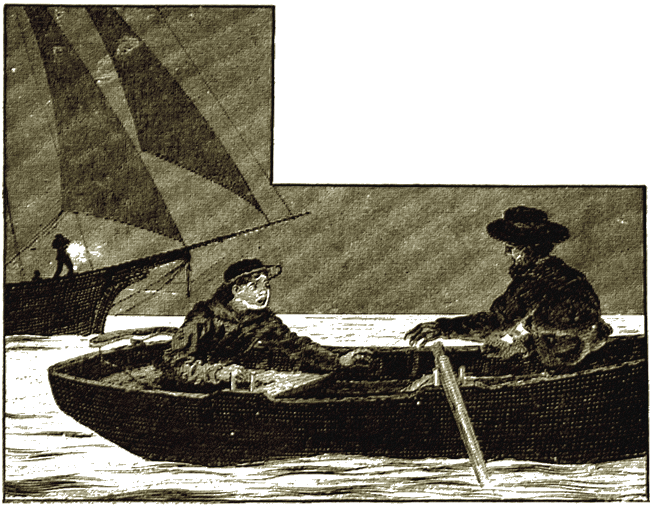
His intention had been merely to frighten the fugitives into surrendering, and he had aimed wide, but with a loud cry, the boy fell forward upon his face in the bottom of the boat.
With a roar like a wounded lion, the sailor dropped the oars and sprang to the boy's side.
"Oh you lubber, you cowardly lubber!" he shouted, in a voice full of rage and grief, shaking his fist at Chadwick, who, thunderstruck at the effect of his shot, stood staring at the motionless form of the boy. "You have killed the lad, as you did his father, you murdering ruffian."
Whatever evil he might have ultimately designed for the two friends, their open destruction had formed no part of Chadwick's plans. Astounded and unnerved, he ordered the Swallow to be hove to at a short distance from the boat, and as the pursuit was now over, he directed the lighter canvas taken in.
Meanwhile the sailor had been anxiously searching for the wound which the boy had received, mingling groans of sorrow with vows of vengeance upon the head of his enemy.
Suddenly, while he was thus engaged, the phosphorescent glow which had illuminated the scene, melted away in an instant, leaving all in darkness. The position of the ship, which had been almost as plainly visible as at noon-day, was now marked only by the lights in her rigging.
At that moment, Ben, whose face was close to the boy's, heard the latter whisper, clearly and distinctly,
"Row, Ben, row for your life!
"What—how?" exclaimed the sailor, dumbfounded, "what, lad, are you—?"
"Sound as a dollar," replied Rollin, rising to his scat and resuming the helm, "the ball did not come within twenty yards of me.
"And you really are not hurt, lad? asked the sailor, in a tremulous voice, which proved how deeply he had been affected by the supposed death of his young friend.
"Not a scratch," responded Rollin, grasping the sailor's hand warmly. "It was a ruse, Ben. I calculated that Chadwick would heave to when he imagined he had killed me, and that would give us a long start before they could get way upon the ship again. Don't you see, Ben?"
"Yes, yes," assented Ben, taking up the oars, "you were born for a commander, lad. But you gave me a turn, I can tell you. I was sure there was an ugly hole in your little timbers."
"We have fooled them completely," said the boy, with a low laugh. "Turn her head away from the shore and pull for all you are worth. It will take them a good while to discover the deception. When they do they will be sure that we have landed. At all events they will lose time in trying to find out. Meanwhile we shall be far away from here, eh, Ben?"
"Aye, lad," replied Ben, with great admiration, as he began rowing vigorously, but with caution, in a direction opposite to that in which they had been previously moving. "Thanks be to you for that same clever roose of yours, and," he added, reverently, "to the Great Commander aloft for taking pity on us and dousing them phosphorescent little pollyglobbles at just the right moment We shall win yet, lad. We shall win yet."
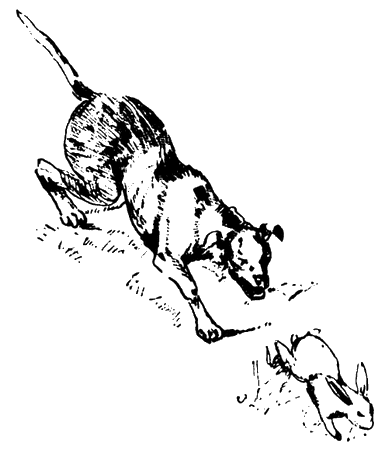
THE next half hour was full of anxiety for the two friends. Should Chadwick suspect the deception which had been practised upon him, he would immediately renew the chase with more determination than ever, and, as they had reason to know, with every chance of success.
But as the moments went by and the lights in the rigging of the Swallow remained stationary, the fugitives began to breathe more freely, A boat had been lowered from the ship, and by the lantern which she carried, her course could be marked as she moved to and fro on her futile search.
Presently she was seen to abandon her erratic course and make directly for the shore.
"There they go on a fools errand," said the sailor, with a quiet chuckle; "not finding us where they saw us last, they suppose we have gone ashore, and they are going to waste another half hour or so hunting for your dead body and my live one. Couldn't be better, lad. I do believe that we have seen the last of them."
The boy shook his head doubtfully. "Chadwick knows that I have that chart," he said, "and he will follow us across Australia to get it, or I am wholly mistaken in his character."
"Well," responded the sailor, "a stern chase is a long chase, you know, lad, and we shall be in the river by daybreak, barring accidents. Once there, it will be sharp eyes that will find us."
The Swallow's lights had by this time dwindled to mere red points, and that upon her boat had entirely disappeared. The fugitives had gained a start of fully four miles, by means of Rollin's clever ruse, and their boat was now among the short, rough swells caused by the mingling of the outflowing current of the river with the deeper water of the Sound.
Resting upon his oars for a moment, the sailor bent forward and gazed steadily into the darkness astern.
"Aye, aye, I thought so," he said, beginning to row again, "he has doused his lights."
"What do you make of that, Ben?" asked the boy.
"That he has found us out and is in chase again. He has put out his lights so as to be able to sneak upon us unseen. However, that won't do him much good, for we shall have daylight soon. And we shall need it, too."
The boy detected an accent of uneasiness in the sailor's voice.
"What is it, Ben?" he inquired, "some new danger?"
"Why, lad," responded Ben, "there is a small matter of a bar across the mouth of this river which kicks up a pretty lively swell. I had forgotten about that."
"You mean that there is danger in attempting to pass it?" said Rollin.
"Well," answered the sailor, "compared with that horse-marine Chadwick, the worst bit of water on earth is innocent and harmless. But I will admit that it is an ugly place, lad."
"But it can be passed?" said Rollin.
"Why, yes," was the reply, "it's bound to be a tough job, but with a cool head to steer and a pair of strong arms to pull, it may be done, lad."
"Very well, then," said the boy, quietly, "I shall try to keep the one and you certainly have the other. So pull away, Ben, and let us do our best."
"Aye, aye, lad," returned the sailor, "man or boy, no one can do more."
The first cold, pale glimmerings of dawn were now beginning to appear in the east. One by one the stars faded, leaving the one large planet of morning glittering in the widening arch of the coming day. Gradually the dusky surface of the water and the misty outlines of the distant land came into view, indistinct and uncertain in the imperfect light.
And now, faint and ominous as the far-off mutterings of a thunder storm, a low booming sound was borne to the ears of the occupants of the boat.
"The breakers," said Ben, answering the boy's inquiring look.
As the fog lifted slowly from the water, the two friends, gazing anxiously around them, saw the phantom-like form of the Swallow, less than three miles astern. She was still pursuing, though with a degree of caution which proved that her captain was thoroughly acquainted with the dangers of the shallow channel in which she was sailing.
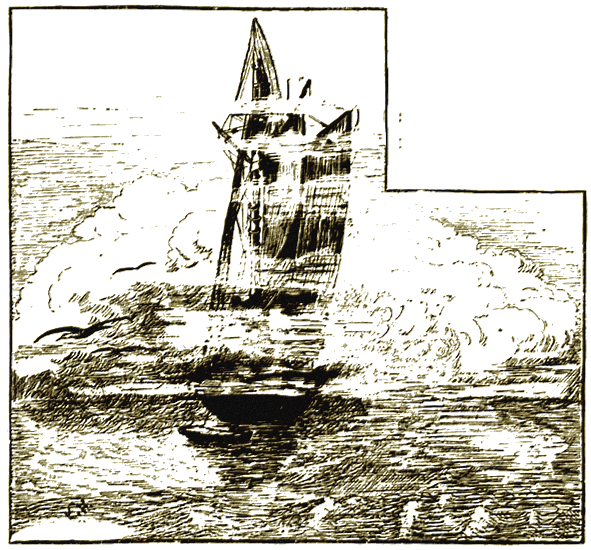
But before them and still nearer, the fugitives beheld a more immediate peril, and one which would try all of their resources of courage and skill to overcome. To all appearance, it was a wall of snow, ten feet high, curving away on either hand for more than a mile. But as the light increased this wall of snow was seen to be in constant and violent agitation. Bending over upon itself, and every now and then throwing fountains of spray high in the air, its deep booming was like the voice of a waterfall.
It was the line of breakers, where the vast volume of water flowing out from the river rushed over the shallow sands at its mouth. Always a dangerous spot in the mildest weather, the recent storms had increased its hazard a hundred-fold. And even the stout heart of the sailor sank as he gazed at it.
Hemmed in by an implacable enemy behind and an almost impassable barrier before, for the first time Rollin felt a sensation almost like despair steal over him. But one glance astern, where the Swallow lay, renewed the boy's failing courage, and grasping the helm with a steady hand, he motioned the sailor to go on.
Here and there in the line of foam were darker spots, marking the places where the water was least agitated. Toward one of these Rollin directed the boat's course.
Pitching and tossing, so that the sailor had great difficulty in keeping his oars in the water, the boat approached the roaring, boiling surf. In another moment she was seized as by a giant's hand and hurled bodily forward. As she was carried onward, the force of the current swung her bow around. To meet that mountain of surging water, broadside on, meant certain destruction. This the boy was quick to perceive.
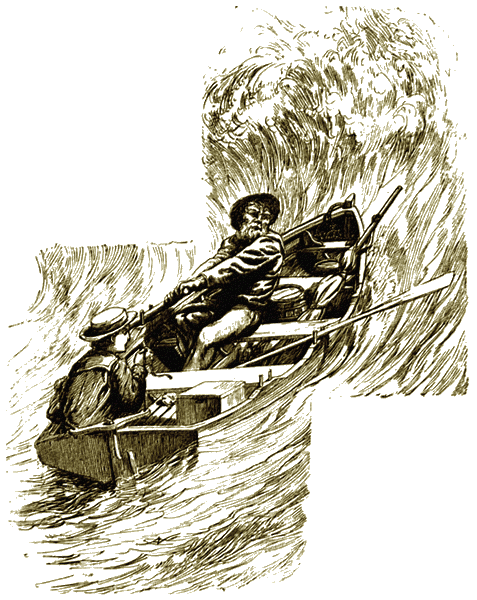
"Larboard oar!" he shouted, "larboard oar! hard! for your life, Ben!"
Planting his feet against the gunwale, he threw his weight upon the helm.
"Hard to starboard with her!" he cried again, "or we are lost!"
Throwing the whole of his mighty strength into his arms, the sailor tugged at the oar, until it bent like a reed. Had it given way, or had a thole-pin snapped at that juncture, all would have been over in ten seconds.
Fortunately, no such accident happened, and under the united efforts of the sailor and the boy, the boat yielded in time, and with a headlong swoop, plunged into the surf. For a moment the friends were literally under water. It poured over them in torrents, filling the boat to the gunwales, roaring around them with the noise of a thousand tempests, and burying them completely out of sight in a mad whirlpool of foam.
And during that awful moment neither of them drew breath, for both were convinced that it was their last on earth. Utterly helpless in the very jaws of destruction, they could only cling desperately to the frail vessel which bore them, and await whatever destiny might be in store for them.
At length, with a last violent shock, they were uplifted and flung forward into the calmer water beyond the bar. But though safe for the moment, they were by no means out of danger yet. A hundred yards ahead, another white wall, twisting and tossing in wild upheaval, betokened a second line of breakers which must be passed.
Dashing the water out of his eyes, the old sailor glanced around and comprehended the new danger.
"Bail!" he shouted, seizing a tin pail which lay in the bottom of the boat. "We must free her from the weight of this water, or she will swamp."
Working with the energy of despair, the two friends managed to relieve the boat of the greater part of the water she had shipped, before she reached the second line of breakers. They had barely time to spring to their places at the oars and helm when she was among them.
Though apparently less formidable than the outer barrier, the inner line of breakers was even more broken and angry. In spite of their frantic exertions, the boat again swung broadside to the surf and instantly filled, careening gunwale under. With a sick feeling at his heart, the boy closed his eyes and waited for the next billow which must surely overwhelm them.
As he did so the boat rocked violently and then righted a little. Opening his eyes, he uttered a cry of terror and despair. Ben had disappeared!
In another moment, however, the boy saw him, with the painter of the boat between his teeth, battling gallantly with the waves. With a last hope of saving the boat, the brave sailor had plunged overboard, and was trying to drag her through the breakers, at the imminent risk of his life.
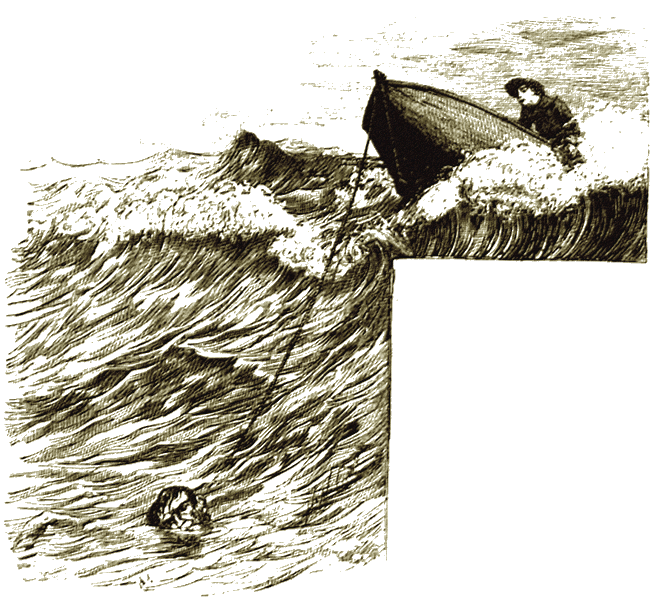
Utterly helpless to assist him, the boy sat gazing at his friend, as, borne aloft upon the crest of a wave, or buried out of sight beneath it, he swam slowly on. Only a man possessed of his gigantic muscular power could have lived an instant in that maelstrom.
At length, with a final plunge which nearly threw the boy out of the boat, she shot forward into calmer water. Exhausted by his almost superhuman exertions, the sailor had only strength to climb into the boat and throw himself into her bottom, where he lay very pale, with closed eyes.
Alarmed by his livid features and blue lips, Rollin knelt beside him and chafed his cold hands. Gradually, however, the color returned to the sailor's face, and with a deep sigh he sat up and looked around with a bewildered air.
"Oh, Ben!" said Rollin, reproachfully, "how could you do it?"
"The boat was sinking, lad," replied Ben, seriously, "and I knew that once among those breakers you would be pounded to death in a twinkling."
"And you risked your life to save mine?" said the boy, in a trembling voice.
"Why," returned the sailor, argumentatively, "it's a matter of profit and loss, as the landlubbers say. If anything was to happen to you, the rest of old Ben's cruise in this here world would be in lonely waters, lad. So you see it was a matter of mere selfishness on my part, after all."
"People call that kind of selfishness very noble, Ben," replied Rollin, smiling.
"Do they, lad?" said the sailor, quietly. "They have queer names for things on land. So we won t say no more about it."
"All right, Ben," replied the boy, "but I shall not forget all I owe you."
"That there little swim has given me the appetite of a shark," said Ben, evading the boy's gratitude for an action which he evidently regarded as a mere matter of course. "What do you say to piping to breakfast?"
The boy consented, and while Ben continued to row, busied himself in preparing the meal, of which both stood in great need. A supply of tins of preserved meat and other eatables formed a part of the boat's cargo. Stored in watertight lockers, the food was found to have escaped damage from the breakers, and Rollin soon had a substantial repast of biscuit, ham, and tongue spread out upon a thwart between them.
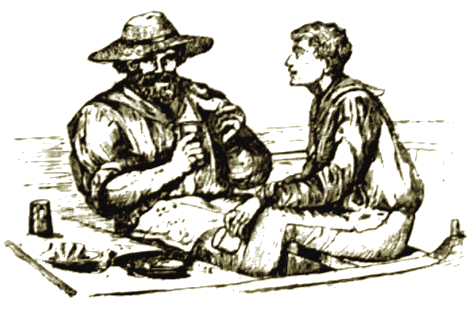
"I call this here comfortable," observed Ben, taking a huge bite of bread and ham. "With a clear conscience and a hold full of good wittles, a man can face most of the troubles of life without flinching. Now if we are called upon to beat to quarters again, we shall be prepared to show the enemy a bold front."
"Do you think they will try to pass the breakers after us?" asked the boy, his bright face clouding over at the thought.
"Well," replied Ben, "I think they will not try it for at least twelve hours to come. By that time the effects of the storm will have subsided, and with a heavy, eight-oared boat they ought to come over dancing."
"And by that time we shall be a good many miles up the river, eh, Ben?" said Rollin, somewhat reassured.
"Aye, aye, lad," replied the sailor, cheerfully, "make your mind easy. Now, seeing that my old timbers are a bit strained after last nights work, I am going to ease them off for the matter of a half hour before we set sail again."
Disposing himself comfortably in the bottom of the boat, the sailor drew out his pipe, filled it, and began smoking with every appearance of satisfaction.
Though greatly fatigued himself, the boy was still too much excited to imitate his example. Besides, the consciousness that the danger was by no means past, but merely suspended for the time, did not tend to reassure him. He lacked the coolness which long experience had taught the sailor, whose philosophy it was to make the most of the present and to let the future take care of itself.
Therefore while his friend lay quietly smoking, Rollin sat gazing around with anxious and watchful eyes. The white wall of foam, which they had just crossed with so much danger, was plainly visible, and its dull, incessant roar was borne faintly to his ears on the gentle morning air.
Everything was so quiet, the water was so smooth, and the sun so warm and bright, that in spite of his forebodings, the boy felt a drowsiness stealing over him. Suddenly his half-closed eyes, which had been fixed upon the line of breakers, opened wide with a look of doubt and alarm. He sat upright and gazed breathlessly at the object which had startled him.
"Ben! Ben!" he cried, in a tone of terror, "look! look!"
The sailor sprang to his feet. Following the direction of the boy's pointing finger with his eyes, for a moment, Rollin saw his ruddy cheek grow pale and his lips compress themselves tightly.
Throwing aside his pipe, he seized the oars and began rowing with desperate energy.
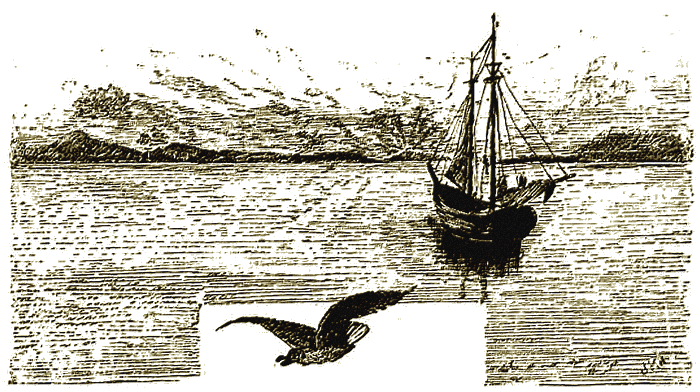
THE character of the object which had startled our adventurers was plainly evident even at that distance. A large boat, pulling eight oars, was rising and falling upon the breakers; now lost to sight and again poised upon the crest of a wave. Who commanded it and the purpose upon which it was bent, the friends never for a moment doubted. Chadwick was again in pursuit of them.
In the bitterness of his determination to capture them, he had not been willing to wait until the subsidence of the breakers should render the passage safe and easy, but had resolved to make the attempt immediately at all hazards. Thus Ben's calculations of a twelve hours' start were upset, and the pursuit at once assumed a critical aspect.
Despite her weight and number of oars, the Swallow's boat was evidently experiencing much of the danger and difficulty which the smaller boat had met with. More than once she seemed upon the point of foundering, and only escaped by the most violent exertions on the part of her crew.
Meanwhile the two friends were making the most of the delay, and when at last the Swallow's boat succeeded in getting over the barrier, the smaller boat was a good three miles away and about the same distance from the mouth of the river.
The broad sheet of calm water inside the reef narrowed gradually on either hand, until it reached the true mouth of the river, which was little more than a hundred and fifty yards in width. It was toward this point that the fugitives were directing their course. The banks of shallow tropical streams, like the Darke River, are always more or less fringed with tall reeds and overhung with luxuriant vegetation. If, therefore, the friends could gain the shelter they were aiming at, sufficiently in advance of their pursuers, their chances of escape would be greatly increased.
As we have said, when the Swallow's boat finally got through the breakers, that containing the friends was about three miles ahead and about the same distance from the mouth of the river.
Now, though much the lighter and smaller of the two, the escaping boat was in reality fitted for four oars and had been built for capacity rather than speed. Hence, even with Ben's great strength, she was no match for her pursuer.
From the rapidity with which the Swallow's boat came on, it was plain that Chadwick's liberal bribes and promises had overcome any favorable feeling toward the friends, which may have previously existed in the minds of the rough men who composed her crew.
With the perspiration streaming down his face and the muscles starting out upon his brawny arms, the old sailor labored grimly on, like an angry Hercules. Struggle as he might, however, the space between the two boats decreased visibly, until less than three hundred yards of clear water separated them.
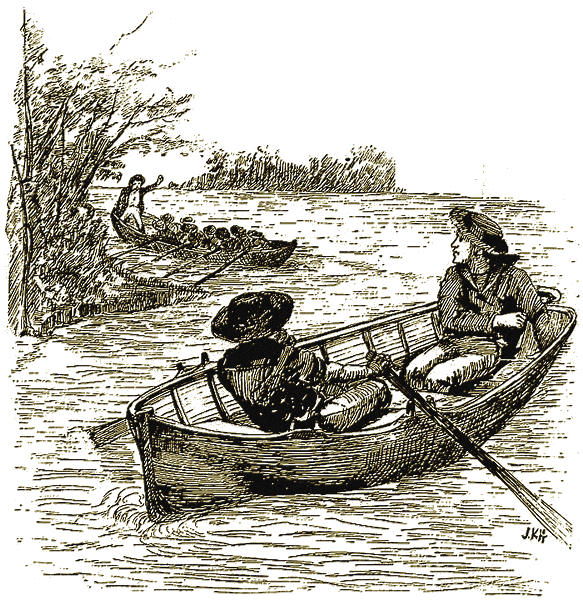
They were now but little more than that distance from a long, low point of land, covered with dense shrubbery, which must be rounded in order to enter the river. Though the hope of escape was well nigh extinguished in the hearts of the fugitives, Ben put forth his last resources of strength and rowed furiously, while, incited by the voice of Chadwick, who was steering, the crew of the Swallow's boat bent to their oars with redoubled energy.
The two boats rounded the point of land within two oars' lengths of the steep wooded shore, and so close together that the bow oarsman of the larger boat could have touched Rollin with his outstretched oar.
As we have said, the old sailor possessed an unlimited belief in his own prowess, and desperate as the odds looked, he was by no means ready to admit that he was not a match for the whole of their pursuers together, in a hand-to-hand combat.
"Stand by to keep way on the boat," he said, between his teeth, "while I floor them one after another."
Even as he spoke, the two boats touched. The man in the bow had arisen to seize the gunwale of the smaller boat, when a tremendous blow on the side of the head sent him sprawling among his companions.
But it was not Ben who had administered the blow. A score of naked, dusky forms sprang out of the shrubbery, and with unearthly yells attacked the crew of the Swallow's boat, who, utterly surprised and unprepared, received considerable damage before they could arouse themselves for the defence.
For some reason, probably because the larger boat seemed the more valuable prey, the savages had directed their whole attention to it, while the two friends had been allowed to pass unharmed.
Recovering from their surprise, the crew of the Swallow defended themselves with spirit; fighting with oars, clubs and boat-hooks. Many a black fellow went howling and disabled from the melee; but others took their places, swarming about the boat in the water, or discharging their missiles from the bank. Shouts, cries and yells and the sound of weapons falling upon naked backs or uncovered heads arose from the confused mass of black and white combatants.
Astounded at the sudden and unexpected turn of events, the two friends sat motionless in their boat, at some distance, watching the strange battle with a variety of emotions. Though the whites were their enemies, and but a moment before they had been prepared to oppose them with all their strength, they could not witness their danger now without a strong impulse to assist them against their black foes.
The old sailor's eyes flashed and his fingers clenched with the ardent desire to take part in the combat. But it must be confessed that it would have made no great difference to Ben which side he fought on. So long as he could be in the thick of it, it would not have been a matter of much importance to him whether his fist encountered a white head or a black one.
"No, no," he muttered, shaking his head, "it won't do, Ben, it won't never do. Though it do seem hard to stand off and watch a fine sight like that there, and not take your natural share in it. Well, well," he added with a sigh, as he resignedly took up the oars, "we must learn to make sacrifices, I suppose."
A bend in the river soon hid the combatants from sight. The sound of their shouts and cries grew fainter as the boat proceeded, and finally died away in the deep silence of the primeval forest.
"Which do you think will win the battle, Ben," asked the boy, "the savages or the crew of the boat?"
"Why it will be a sort of draw, lad," replied Ben. "There are too many of the black rascals to be driven away altogether. The boat will sheer off into deep water again, and that will end the affair."
"In that case we are rid of Chadwick for good," said Rollin. "We ought to be grateful to the savages, Ben. They did us a good turn, just in the nick of time too."
"Wait a bit, lad, before you talk about gratitude," responded Ben. "I'm thinking you and I may have something to say to them same savages before we are through with this here voyage."
"Why so, Ben?"
"Well, when they are done with the crew of the boat, they will be likely to remember us."
"We shall be too far away to be caught, Ben."
"You don't know them black villains, lad," replied the sailor, "if they do make up their minds to pitch into us, they will stick to the chase like barnacles to a rotten timber."
"Between the two, I would rather have to deal with the savages than Chadwick," said Rollin.
"Right, boy," responded Ben, "at worst they would only eat us in a natural human fashion, while Chadwick—"
"Eat us!" interrupted Rollin, in some alarm. "Are they cannibals, Ben?"
"I can't say precisely," said Ben, doubtfully. "Most wild savages is inclined that way. I don't suppose these here would object to a meal of wittles off us two, if it came handy. I don't know as I should set well upon their stomachs altogether, having used tobacco these five-and-twenty years. But as they wouldn't be likely to find it out until after I was done to a turn, old Ben wouldn't be none the better for that, d'ye see?"
"Had we not better make some preparations for defence, in case they do attack us, Ben?" replied Rollin.
"It would be as well to see what there is in the way of weapons on board, lad. There is no telling when we may be called upon to beat to quarters."
While the sailor continued to row, the boy instituted an investigation into the contents of the various lockers. There was a strong, light spar in the boat, which would serve excellently as a mast, and in one of the lockers Rollin found a lug-sail, provided with sheets, halyards, and blocks complete.
As a brisk wind was blowing in the right direction, the mast was stepped and the sail hoisted at once. Impelled by the broad sheet of duck, the boat's progress was much more rapid than with the oars. Very grateful for the relief from his long and arduous toil, which had nearly exhausted even his immense strength, Ben took the helm with a sigh of contentment.
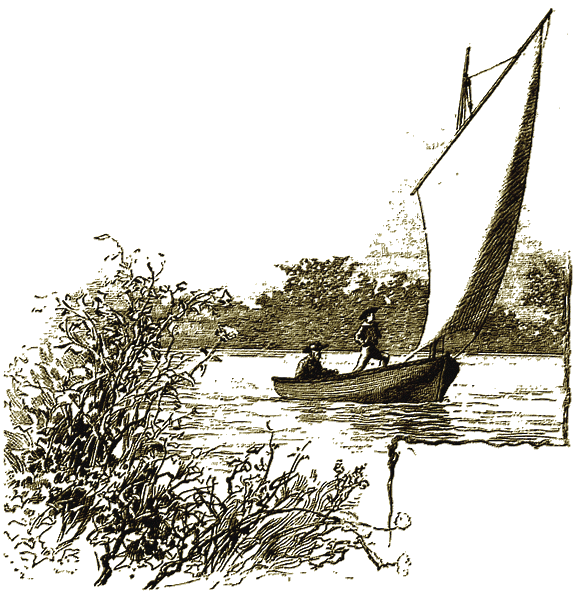
"Ben," said Rollin, gazing at the sail with admiration, "now that we have a sail for our boat we ought to have a name for her as well."
"True," replied Ben, reflectively, "what do you say to 'A-bry-ham Lincoln,' lad?"
"Why," said Rollin, doubtfully, "its a good enough name for a large ship, but do you think it suits so small a boat as this?"
"Perhaps not," assented Ben; "'A-bry-ham' do sound a trifle heavy, that's a fact."
"I was thinking of something which would commemorate our good fortune in escaping Chadwick so neatly—something with a triumphant sound to it, Ben."
"Well, what do you think of 'Huzza,' lad? That's a natural sort of word and not too big for a little craft, eh?"
"Just the thing," replied Rollin, "'Huzza' let it be."
This having been satisfactorily settled, the boy continued his search. In loading the boat Chadwick had evidently prepared for a trip of some duration; for her lockers contained a considerable supply of the articles most necessary to the travellers. There was a large number of tins of preserved meat, condensed milk, coffee, tea, and sugar; a small oil-stove and a quantity of oil; a case of medicines, a sextant for taking observations, a powerful marine telescope, and many other useful articles.
In another locker the boy discovered a repeating rifle, a breech-loader of heavy calibre, a fowling-piece, and two navy revolvers, with an ample provision of ammunition for each weapon.
When these had been properly loaded and placed ready at hand in case of an attack, the two friends disposed themselves for a brief interval of rest after the intense excitement and fatigue of the past twelve hours.
In spite of his efforts to keep awake, Rollin's eyes closed and his head drooped upon his chest. After one or two ineffectual attempts to arouse himself, he sank into a deep slumber.
When he awoke, it was late in the afternoon. The boat was still moving swiftly through the water, and the old sailor was sitting at the helm, smoking. There was a look of great weariness in his face, but he smiled kindly at the boy as he sprang to his feet with a feeling of shame at his own selfish indulgence.
"Oh, Ben," he cried, "why did you let me sleep so long, when you need rest so much more than I?"
"I was glad to see you sleep, lad," was the sailors reply, "for I knew it was doing you good. Now we will pipe to supper if you like, and afterwards I will turn in for a couple of hours."
The meal was soon ready, together with a cup of hot tea, prepared with the help of the oil-stove, and the friends enjoyed it quietly and with good appetites. Then Rollin took the helm and Ben stretched himself in the bottom of the boat, enjoining Rollin to wake him before dark in order to get everything snug aboard the Huzza for the night.
MOVING before the wind on an even keel, the boat required but little attention. But the knowledge that they were now in an almost unexplored region, surrounded by savage enemies and unknown perils, impressed upon the boy the necessity for unremitting watchfulness. As he sat with his hand upon the helm, therefore, he kept a sharp lookout upon the river banks, where the dense undergrowth afforded a hiding-place for any natives who might be lurking in the neighborhood.
Nothing of a suspicious character made its appearance, however. The boat glided on over the placid surface of the stream, which glittered like molten gold in the warm red rays of the declining sun. No sound proceeded from the forest, except the clear whistle of some bird, or the quick patter of little feet, as some small animal fled away at their approach.
Everything was so quiet and peaceful that Rollin felt almost as if everything that had passed since he had left the Swallow, were only a wild dream—nay, even this journey to the mysterious Oo, which they were now upon, seemed itself a dream. What was Oo? Was there indeed any such thing as Oo? Was not the very name, his hope of reaching it, and of discovering his lost father, all a delusion? He asked himself these questions for the twentieth time, and again the hope of his strong young heart overcame doubt and fear, crying Onward! onward!
The sun sank in a glory of fiery clouds and the misty shadows of evening gathered upon the bosom of the river. Then, almost in the twinkling of an eye—for in the tropics there is little or no twilight—it was night. The large, bright stars came out overhead, and still the little vessel sped on its lonely course toward its unknown goal.
Poor Ben slept so heavily that Rollin had not the heart to awaken him as he had agreed to do. As the wind had fallen considerably, he lowered the sail and stowed it carefully, ready for hoisting at a moment's notice, and anchored the boat in the middle of the stream. With his head resting upon a thwart and his eyes fixed upon the stars he lay until near midnight. At last he too fell asleep.
He was awakened by a touch upon his elbow, and, opening his eyes, saw the sailor bending over him. It was early dawn. A pale radiance glimmered in the east, but in the shadow of the forest it was still dark. A thin fog hung upon the river, obscuring all objects at a little distance; but there was light enough for the boy to see that his friend's face wore an expression of amazement and alarm.
"What is it, Ben?" he asked. "The savages again?"
The old sailor shook his head.
"No," said he, in a troubled voice, "I almost wish it was; for they are human at least, and may be dealt with as such. But this—hark; there it is again!"
From the obscurity of the neighboring shore arose a sound such as the boy had never heard or imagined before. Loud, clear, and long drawn, it rang shrilly through the silence of the dawn, like a peal of demoniac laughter.
"Ha! ha! ha! hoo! hoo! hoo!"
"What can it be?" whispered Rollin. "Some one laughing?"
"Such laughter as never came from mortal lips," answered Ben, solemnly. "Man and boy, I have heard strange sounds, at sea and ashore, but never did I hear the like of that."
"Ha! ha! ha! hoo! hoo! hoo!"
Surely nothing human could have given utterance to that fearful outburst of mocking, jeering mirth! Malicious, cynical, full of weird menace, it chilled the hearts of the friends with a shudder of nameless terror.
"It must be the savages laughing at us, because they suppose we are in their power," said Rollin, though by no means satisfied with his own explanation.
"I will tell you what it is, lad," responded Ben, in the same awe-stricken tone, "it's imps, that's what it is."
"Imps!" repeated Rollin, nervously, "there are no such things as imps, Ben."
"Ain't there?" said the sailor. "Just listen to that and tell me if anything could let off that wicked screech but imps, and the unholiest kind of imps, too?"
Though by no means superstitious or given to imaginative fears, Rollin almost began to believe that the sailor's singular solution was the true one. What strange, unknown creatures might not dwell in the recesses of the mysterious Australian wilderness—that haunt of strange animals and still stranger men?
"Ha! ha! ha! hoo! hoo! hoo!"
As the eldritch laughter again pealed out, the sailors natural courage began to overcome his terror. He drew himself up, and, facing the point whence the sound seemed to proceed, cried boldly,
"Be you what you may, imp, ghost or man, here is them that do not fear you. Come out and show yourself, instead of cackling there behind the trees like an idiot! I don't see nothing so blessed funny to laugh at," he added, working himself into a rage, "Come out, I say! and if a stout arm and a good conscience can do it, I'll punch your ugly head till your own mother won't know you."
Ben's characteristic defiance was interrupted by a sudden shout from the boy.
"Oh, look! Ben, look!" he cried, pointing with his finger. "There it is! There is your imp."
And throwing himself back upon his seat, he laughed until the tears ran down his cheeks. At first the sailor gazed at him with alarm, as if he feared that terror had overthrown his reason; then following the direction of Rollins finger, he started, uttered a gruff exclamation of disgust, and sat down with an air of humiliation.
It was now broad day, and the fog lifting from the surface of the stream, revealed the river banks clearly. Directly before them, swaying itself to and fro upon the dead branch of a tree, sat a large bird, which Rollin recognized from his reading as one of a strange species found only in Australia. Even as the boy spoke, it opened its beak and in the most solemn manner possible gave vent to another peal of the wild laughter which had alarmed them.
"It is the great Australian Kingfisher," said Rollin. "They call it the Laughing Jackass, Ben."
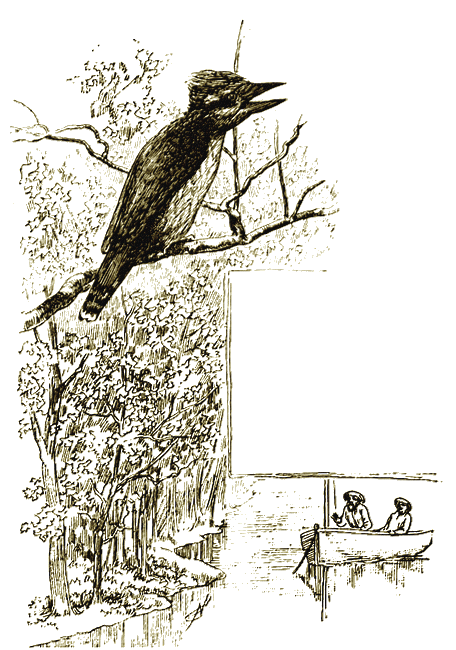
"A very good name, too," replied Ben, eying the bird with great contempt. "Though if it was named for its voice it might have been called the Laughing Hippopotamus. You are a bird," he added, apostrophizing the creature in no very good humor; "and I suppose that there guffaw of yours you call your song! Every one to his taste. I prefer a steam saw-mill."
While speaking, the sailor had busied himself in raising the anchor and hoisting the sail. There was a brisk wind blowing, and the boat was soon under way. Ben took the helm, while Rollin got the breakfast, and the friends ate the meal with appetites undiminished by their recent scare.
According to Ben's calculation, the Huzza had sailed more than forty miles on the previous day. The adventurers were now in the midst of that wonderful belt of tropical wilderness which encloses the vast unexplored regions of western Australia. Giant trees of the species called the eucalyptus towered to the height of three hundred feet and more, shooting upward for two-thirds of their growth without a single branch or limb, and spreading out in an immense canopy of dense verdure. Here and there between, a graceful palm threw out its umbrella-like head of a delicate, light green.
The friends noticed with amazement that many of the leaves of both trees and plants, instead of growing flat or parallel to the earth, were vertical, or up and down. This is a peculiarity of Australian vegetation, and, like most of the animals of that wonderful country, is unknown elsewhere in the world.
As they sailed quietly along, the duck-billed mole, a creature with the body and fur of an otter and the bill of a duck, would be seen creeping along the bank, or diving in the shallows in search of food. Now and then, in the dusky glades, a kangaroo, shaped like a huge rabbit, would lift its head to look at them, then disappear among the tall grass, with leaps covering twenty feet of ground.
Toward noon the wind died away and the heat grew so intense from the direct rays of the sun and the reflection from the water, that despite their desire to proceed as rapidly as possible, the two friends were compelled to seek shelter. The sail was lowered and the boat rowed to a shady cove in the bank, where she was fastened, while the friends landed and walked about to stretch their cramped limbs.
Presently Ben's appetite, which, as he was in the habit of saying, was like a good watch-dog, always ready to take a bite of something, began to manifest itself. Accordingly Rollin procured the necessary provisions from the boat, and in order to economize their oil, of which the supply was limited, built a fire of sticks to cook upon.
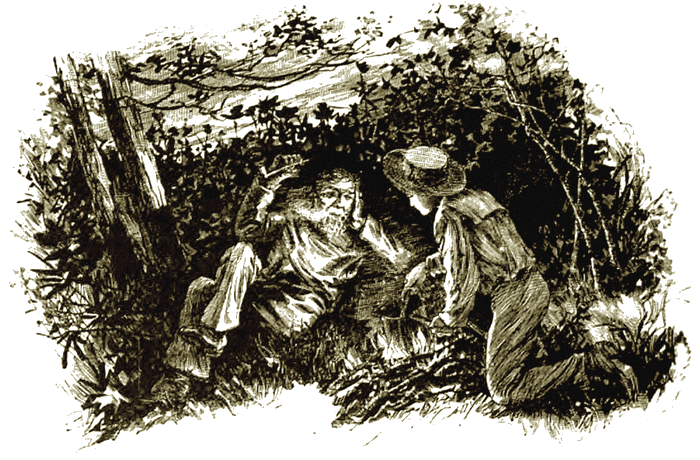
Not far from where the boat lay, the friends had observed a large bank or mound of earth, ten feet in height, covered with sparse vegetation. It had the appearance of an ancient excavation made by human hands, but for what purpose or by whom done they could not guess. By scooping a hollow in the loose, sandy loam, it served admirably for Rollin's fireplace, and in a short time the coffee-pot was singing merrily.
The meal was spread upon the grass at a little distance, and Rollin and the sailor sat down to eat it. They had hardly begun, however, when they were disturbed by very unwelcome guests. Creeping along in the shadow of the glade, the boy detected the dark forms of several animals, stealthily approaching them. As they came nearer, Rollin recognized them as dingoes, a sort of Australian wolf, naturally cowardly if alone, but exceedingly fierce when in packs, especially if incited by hunger.
When they saw that they had been discovered, the dingoes paused for a moment, then began circling about the spot where the travellers sat, with a long, silent gallop, coming nearer at each circuit and evidently getting up their courage for a direct attack.
Rollin had brought one of the rifles from the boat, as a precaution, and while Ben was gathering up the food and dishes, stood guard against their four-footed enemies. Emboldened by the retrograde movement of the friends, the dingoes made a dash, but a shot from the boy's rifle brought one of them down. This caused the remainder of the pack to halt.
Clustered upon the top and sides of the mound, the animals watched the movements of the travellers, gathering themselves together for another attack, which, considering their numbers, might have resulted seriously for Rollin and the sailor.
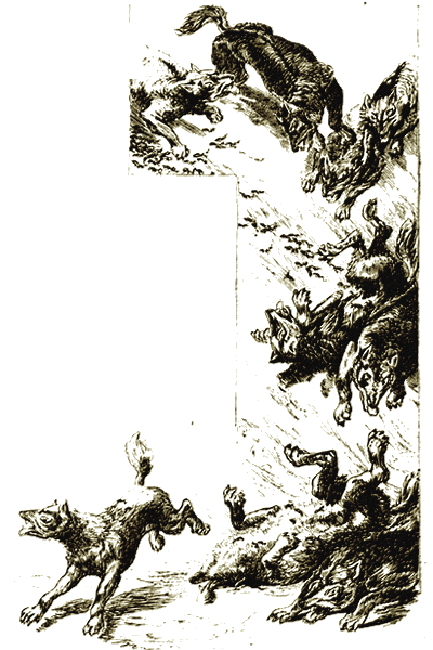
But at this moment a strange commotion was observed among the pack. They began suddenly to spring to and fro, yelling and barking furiously, rolling over and over down the sides of the mound, apparently biting themselves and acting generally as if the whole of them had been seized with a fit of madness.
The friends had pushed the boat from the shore, and now sat gazing at this singular spectacle in amazement.
"Now what does that there mean?" said Ben, as he watched the furious antics of the animals. "Is that some sort of dingo dance, got up for our especial entertainment?
"It looks more like pain and anger," replied Rollin, equally at a loss to understand the grotesque scene. "See, Ben, how they leap and roll about!"
"Conscience," said the sailor, gravely, "it's conscience that is troubling them for having tried to devour a pair of harmless travellers."
Suddenly the cause of the wild commotion among the dingoes became apparent. The friends saw that the bodies of the leaping, writhing animals were literally covered by small black objects, in rapid motion among themselves. These in reality were huge ants, two inches in length, armed with tremendous nippers, capable of inflicting a fierce and poisonous bite.
The mound which has been described was their dwelling place, and disturbed by Robin's fire they had emerged by thousands, just in time to attack the unfortunate dingoes.
The enraged insects continued to swarm out of their hill, till not only the mound itself and the bodies of the animals, but the earth for yards around was alive with them, their black scaly armor glittering as they ran to and fro, rubbing against each other with a loud rustling sound.
In their blind ferocity they attacked and tore each other to pieces, heaping up in living balls which rolled over and over in the desperate struggle. It was a dreadful sight, that of these small, venomous creatures fighting among themselves and with the dingoes, as if insane with pure malice. The friends shuddered as they gazed.
Despite their superior size, the dingoes were no match for their small but furious enemies. Two of the animals were overcome and rolled down the mound where they were instantly set upon by fresh reinforcements of the insects and speedily finished. At this the remainder of the pack rushed madly away their cries and yells resounding from the depths of the forest for a long while afterward.
Thereupon the whole body of ants fell upon the carcasses of the slain dingoes and absolutely tore them to pieces, devouring the particles on the spot or bearing them away in their strong claws to their den. In less than ten minutes nothing remained but the white and polished bones.
Disgusted with the loathsome sight which they had witnessed, though it was still very hot upon the river, the friends hoisted the sail and the Huzza slowly drew away from the spot, where myriads of the black creatures ran to and fro unappeased by their dreadful banquet.
WHETHER it was the sickening heat of the day or the effect of the disgusting scene they had just witnessed, Rollin felt strangely depressed.
"Ben," he said suddenly, "I have a strange idea that we are going to have trouble of some sort soon. Perhaps the savages are after us."
"Well," said Ben, philosophically, "even if they do outsail us, we shall be able to handle a few savages between us comfortably enough."
We have said Ben's belief in his own muscular powers was practically unlimited.
"But you forget Chadwick," replied Rollin.
"The Commander aloft," responded Ben, solemnly, "has took care of us before, and He is not going to deliver us into the hands of a villain now. All the same He expects every man to do his duty."
The Huzza was floating upon the smooth surface of the lake, before a light breeze. The heat was intolerable, and but for the shelter of the improvised awning, our travellers must certainly have succumbed beneath it. Among the instruments which Chadwick had put aboard the boat, the friends had found an excellent thermometer and also a barometer. They had been hung in a convenient place upon the mast. Glancing at the thermometer now, Rollin saw that the mercury registered 120 degrees, though in the shade.
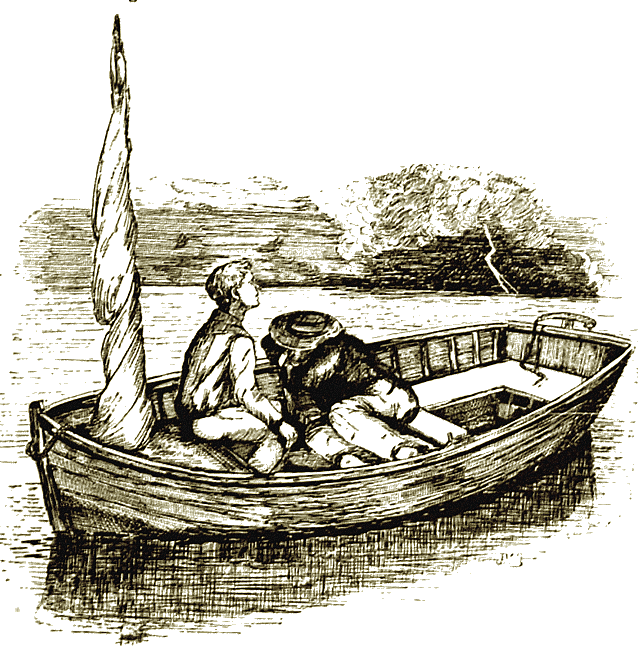
He called Ben's attention to this fact, but he saw that the sailor's eyes wandered uneasily to the barometer beside it, and that his face became grave.
"The glass is falling like a shot," he said, in answer to the boy's inquiring look.
"Then we must expect a storm," replied Rollin, "though there is not a cloud to be seen in the sky."
The wind had completely failed again and the Huzza was lying motionless. Abandoning the helm, Ben went forward, and, taking down the barometer from its nail, scrutinized it with an amazed and troubled expression.
"No, no," he muttered, after turning it over in his hands repeatedly, "the barometer is all right, it is natur' that is wrong."
"How wrong?" asked Rollin, who had been watching his friend's movements curiously.
"Why," said Ben, slowly, still gazing amazedly at the instrument, "in all the years I have been at sea I never saw a barometer act like that. The thing seems to have gone stark mad."
During his cruise on board the Swallow, Rollin had learned enough to know that the barometer was indeed acting very strangely. As every one is aware, the mercury in a barometer lowers in the tube before a change in the weather, especially before a storm. Hence its fluctuations serve as valuable warnings to seamen, predicting the approach of tempests, sometimes twenty-four hours before their appearance.
In proportion to the rapidity and the degree of the fall of the mercury the proximity and violence of the storm may be predicted. In the present instance the barometer on board the Huzza was exhibiting signs which wholly baffled the experience of the two friends. The mercury would fall in the tube a few degrees, then spring up again. In a minute or two it would drop again, remaining motionless awhile, when once more it would rise with a sudden leap. With each fall, however, it was observable that the mercury touched a lower point in the glass than before.
"That means storm, sure as fate," said Ben, "but a kind of storm which is new to me. Everything in this strange country is wrong end foremost and upside down—trees, animals and all—so why not storms in which it rains upward and blows zig-zag?"
"Had we not better go ashore and seek shelter?" asked Rollin.
"The land is never so safe as the water," replied Ben, dogmatically. "I would sooner ride it out on a shingle than trust to the strongest house ever built."
"All right," responded Rollin, yielding to the seaman's prejudices in favor of his natural element, though with some reluctance.
The thermometer continued stationary while the barometer went on falling by leaps. The heat was so fierce that it seemed as if all nature was shrivelling up beneath the white, hot glare of the sun. Utterly overcome, the two friends lay in the bottom of the boat, gasping and half unconscious.
Late in the afternoon, happening to unclose his heavy eyes, Rollin saw what caused him to sit upright with an exclamation of amazement. Low down upon the horizon was what looked like an irregular band of ebony, edged with an intense crimson hue. Even as he gazed, it grew wider, stretching across the whole western sky.
"Yes," said Ben, whose attention Rollin had called to this strange phenomenon, "there it is, sure enough, a storm and such a storm as few men have ever witnessed."
"It is a cyclone, Ben," responded the boy. "See how those masses of cloud whirl among themselves!"
While speaking the two friends busied themselves in making the best possible preparations to meet the coming danger. The sail was lowered and furled, the awning taken in, and the lockers stowed and secured.
All this had occupied less than five minutes, but so rapidly had the storm advanced that the sun was hidden, and an inky pall covered the greater part of the sky. Fierce flashes of lightning rent the blackness incessantly, and a deep, hoarse sound proceeded from the whirling and twisting masses of vapor, which seemed to fly no higher than the tree-tops and with great velocity.
For a moment there was a pause, as if all nature were breathless with awe, in which the screams of the frightened birds and animals upon the shore were plainly audible; then, with a roar like a thousand cannon, the storm was upon them.
In the intervals between the flashes it was so dark that objects were invisible a boat's length distant. In that appalling blackness the boat drove on, its occupants knew not whither; over mountains of heaving water, through blinding showers or spray, so tossed and beaten that it was a miracle she did not go to pieces at once. Even the stout-hearted seaman had abandoned hope. If his face could have been seen it would have expressed no fear for himself, but only deep sorrow and regret for the boy whom he loved with all the tenderness of his rugged but noble nature.
When the lightning illuminated the clouds in long, wavering sheets of yellow flame, a scene of indescribable terror and devastation was revealed. The whole forest bordering the lake was seen bending and swaying wildly with writhing branches and torn foliage. Long rows of tall trees were lifted bodily from the earth and flung down, leaving wide swathes where they had stood. The air was full of flying debris, and more than once some huge trunk or log, carried upon the wings of the tempest from the adjacent shore, plunged into the lake near the boat.
And now, above the yell and shriek of the storm, another sound came to the stunned ears of the travellers—an ominous, heart-shaking sound, such as the boy, at least, had never heard before. It was like that of an enormous wheel, beating the water with regular pulsations, mingled with the swishing noise of a million flails whistling through the air in unison. It seemed to be approaching the boat, rapidly increasing in volume as it advanced.
Rollin felt the sailor's hand, which held his own, contract suddenly. Peering into the darkness he endeavored to make out whence the sound proceeded. Even as he did so there was a sharp flash of lightning, and by its aid he beheld an appalling sight. Directly astern of the boat, like ebony columns supporting some fearful subterranean vault, three vast pillars sprang out of the black water and were lost in the blacker sky above. They were in rapid motion, whirling upon their centres as they advanced, giving out the strange swishing noise which the travellers had heard.
Placing his mouth close to the boy's ear the seaman shouted the single word,
"Waterspouts!"
But Rollin had recognized their character, and knew at once that their presence added a new peril to those which already surrounded them. He had read of ships being engulfed and sunk by the breaking of a waterspout upon their decks, and he knew that the only way for a vessel in their track to escape them is by firing a cannon. The sudden concussion makes a disturbance in the surrounding atmosphere which causes them to collapse.
The swishing noise grew louder every instant, and now the three pillars were visible in the darkness, emitting a pale, greenish light as they revolved. Their shape continually changed as they moved; now they were like an hour-glass, thin in the middle and spreading out at either end. Again they assumed an oval form, bulging in the centre and growing very small where they joined the clouds and the water. Then again they took the aspect of a straight tube, several yards in width, hollow in the inside, and with walls formed of the swiftly-revolving water.
In the flashes of lightning the water of the lake near their bases could be seen spinning like vast whirlpools, beaten into snowy froth and lifted up until it assumed the appearance of a large circular tent, with the apex in the hollow of the cylinder, while the clouds above, more intensely black than elsewhere, were drawn downward in a similar manner. Fragments of wood, branches, and even trunks of trees were sucked up into the watery cylinders, spun around and sent whirling to a distance, as if shot from a sling.
With haggard faces and starting eyes, the two friends watched the approach of the evil-looking monsters. Swiftly as the boat flew before the gale, the pillars came on yet more swiftly; now seeming to pause a moment in their course, and again darting onward with redoubled speed, sometimes coming close together and circling round and round each other as if in a weird dance, and again separating, as if each were about to go off upon some wild quest of its own.
When they were within a hundred and fifty yards of the boat, two of the waterspouts began to diverge from their companion, passing away at right angles from their former course. The third, however, continued in the track of the flying boat as if bent upon pursuing it to its destruction.
Nearer and nearer it came. And now the boat was floundering in the swirl of water at its base, while far overhead towered the gloomy column till absorbed into the dense canopy of clouds. In another instant all would be over!
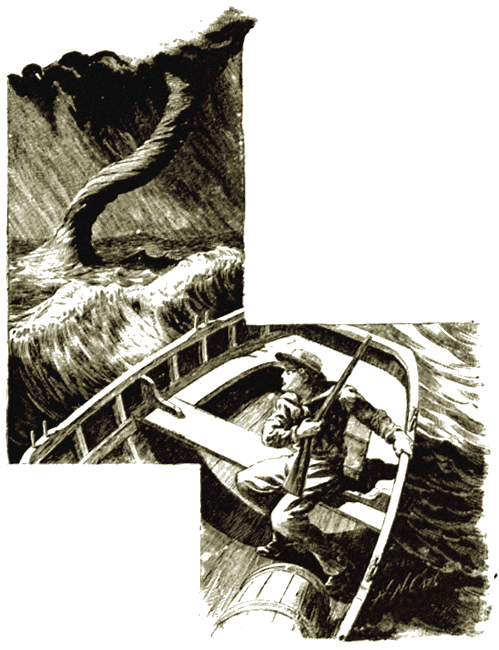
In the haste of their preparations to meet the storm the Winchester rifle had been left lying upon the stern sheets of the boat, within reach of Rollin's hand. The gleam of its barrel in a flash of lightning caught his eye. With a final impulse of despair he snatched it up and began firing into the midst of the revolving pillar.
At the first explosion it seemed to waver, and at the second it was seen to part suddenly in the middle and change its shape. Whether the force of the shot had broken it, or it had collapsed of its own accord, after the manner of these strange formations, it is impossible to say; down it came, however, with a deafening roar. For a moment it seemed as if the boat were being buried in the depths of the lake itself, then it seemed to receive a violent blow from beneath, and Rollin was flung from his seat.
He felt himself hurled through the air, then plunged head long into the water, sinking down, down, with blinded sight and suspended breath. Then he rose again, and, dashing the spray from his eyes, found himself floating upon the bosom of the lake.
He caught a glimpse of the boat driving onward before the wind; then the mist closed around her and he was alone, battling for life in the storm and darkness of that dreadful scene.
ROLLIN was an excellent swimmer, and after the first moment of confusion he regained his coolness and courage. The water of the lake was warm and if he could have been free of the weight of his shoes and clothing, he would have felt no doubt of his ability to keep afloat for a considerable time, perhaps even to reach land. As every one knows, the human frame is slightly lighter than water, and if one is sufficiently calm to avoid useless and exhausting struggles, and remembers to keep every part of the body submerged, except the nose and lips, even if wholly ignorant of the art of swimming, he may keep afloat for a long time.
But with his heavy shoes and sodden clothes, Rollin knew that drowning must be only a question of time, unless he could obtain some support. Though the storm seemed to be lessening in volume, the wind still blew fiercely and the waves rolled mountain-high, rendering his progress yet more difficult. He soon began to feel greatly exhausted. His clothing seemed to drag him down and his shoes to be made of lead. At every stroke now his head went under water, and it was only with the utmost effort that he could keep upon the surface long enough to get his breath. As he rose upon the crest of a billow he gazed wildly around. Nothing was visible; the land was obscured by the mist and the boat was far away. Ah, if only he could feel Ben's strong hand outstretched to save him, if he could only hear his voice or see his rough but kindly face once again, how happy he should be!
Brave as he was, a sob escaped from his cold lips. It was cruel to perish so young and with no friend near to cheer his last moments. His struggles grew feebler, already the water was closing over his head, when one of his outstretched hands touched some solid substance. Grasping at it convulsively, he found that it sustained his weight.
Rubbing the water out of his eyes, he saw that it was a mass of driftwood which had been torn from the banks of the lake by the storm. The firmly interlaced branches and limbs of which it was composed made a tolerably safe support, and with his remaining strength he drew himself upon it and lay down, completely exhausted, but very grateful for his escape.
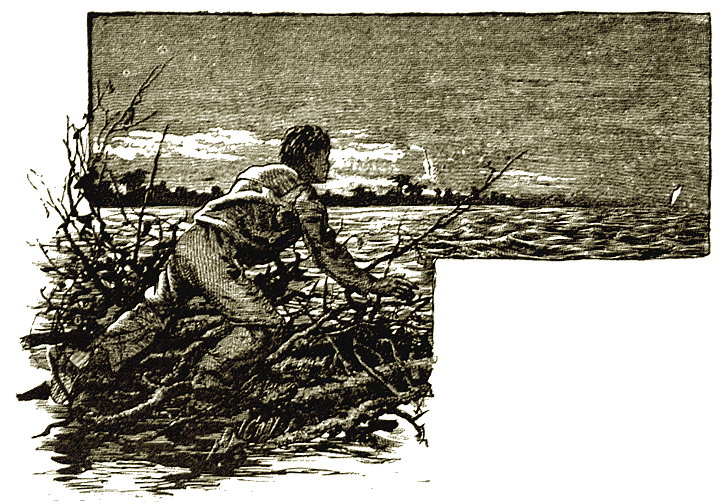
Gradually the storm abated; a pale glow penetrated the midnight blackness of the clouds, revealing the wildly agitated surface of the lake and the vague outline of the distant shore. Little by little the mist rolled away and the rain ceased falling, and at last, low down upon the western horizon, a narrow crimson streak, where the sun had just set, gave promise of clearing weather.
Lifting himself to his knees upon the mass of driftwood, Rollin gazed anxiously in the direction in which he had last seen the boat. There, far up the lake, looking like the while wing of some small bird, was the sail of the boat which the sailor must have set as soon as the lessening of the gale permitted. Whether the Huzza was heading away from him or attempting to beat back toward him, the boy could not determine.
The rapid approach of darkness soon hid the boat from view again, and the boy sank back upon the frail raft, with a feeling of utter desolation. The loose structure of branches and fragments of wood afforded but a precarious support. It was barely sufficient to keep him afloat, and the motion of the waves threatened to break it to pieces at any moment. With the greater portion of his body under water, drenched, benumbed and cramped, the poor boy wore out the long dreary night.
When day dawned over the lake, the wind had gone down and the sky was clear, but the water was still rough, breaking incessantly over the half-unconscious form of the unfortunate castaway. Lilting his heavy eyes, he saw, far away to the eastward, whither she had been driven by the tempest, the sail of the Huzza. The boat was so distant that he could not make out which way she was steering. At the end of an hour, however, the sail had grown visibly larger, and it was evident that she was approaching.
As keenly as Rollin had suffered during that terrible night, his misery had not exceeded the sailor's. Sunk in the depths of sorrow and despair at the loss of his young friend, he had allowed the boat to drift at the mercy of the elements, heedless of his own safety. The dawn, however, had aroused him somewhat from his lethargy, and he was now beating back over the course which he had come, in the forlorn hope of discovering some trace of the boy.
The wind was blowing briskly from the westward, in other words adversely to the course of the boat; hence she was compelled to tack repeatedly; and swiftly as she sailed, her direct progress was comparatively slow. The boy watched her movements with anxious eves. The lake was wide and his raft low in the water; would the sailor be able to single him out from among the other masses of drift tossing upon the swells?
When the Huzza had approached within a mile of him, Rollin fastened his jacket to a long branch taken from his raft, and waved it in the air to attract the seaman's attention. The Huzza was on the starboard tack and did not change her direction. He was not yet seen.
The minutes dragged heavily by and still the Huzza's bow pointed at an angle from the raft. Was she going to pass and leave him there after all? He shouted, but the wind bore his voice away unheard, and the boat sailed on until she lay parallel with the raft and more than a mile distant.
Suddenly she came swiftly round on her heel and the boy uttered a glad cry; for he believed that Ben had discovered him at last and was coming to his aid. But no; she swung around until she lay before the wind, and started to retrace her former course up the lake. Ben had given up the search and abandoned him to his fate!
Rollin threw himself back upon the raft and burst into tears; but the next instant he was up again, shouting with delight. The boat was now pointing toward him; Ben had seen him at last and he was safe. But what had happened to the sailor? He was standing up in the stern of the boat, stamping, shaking his fist and waving his arms about, as if he had gone mad. Rollin gazed at his friend in amazement, endeavoring in vain to understand the cause of his excitement.
His astonishment was still further augmented by seeing the sailor seize a large fragment of wood and brandish it violently, as if threatening some one. At this moment a faint splashing sound caused him to turn his head, and the cause of Ben's singular gestures was revealed.
A large canoe, filled with savages, was coming toward the raft with great swiftness. Without doubt it was the same party which had attacked the crew of the Swallow's boat at the beginning of the voyage. Tenacious in the pursuit of vengeance, as is the habit of all wild men, they had kept upon the track of the travellers since they had entered the river, determined to square accounts with the smaller party for the rough handling they had received in their attack upon the Swallow's boat.
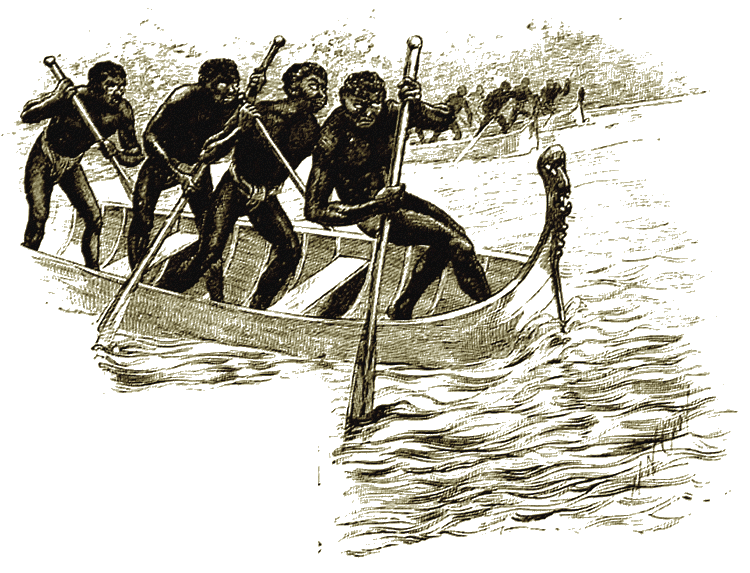
Their ferocious countenances, threatening gestures, and the resolution with which they plied their paddles proved that they anticipated an easy victory over the two whites. They had evidently determined to finish the boy first and attack the sailor afterward. For a moment Rollin remained shuddering and spell-bound at the sight of these fierce beings, whose tenderest mercies would be instant destruction by the ugly-looking war-clubs which they carried, or a slower and more terrible death by torture.
When he first caught sight of them they were not more than three hundred yards away, while the boat was rather more distant, and swiftly as the latter was advancing, it seemed doubtful that the sailor could arrive in time to succor his young friend. Meanwhile the boy stood hesitating upon his frail platform. To remain where he was, meant certain destruction, and if he were to leap into the water and attempt to swim to the boat, he would be overtaken and despatched while utterly powerless to defend himself.
But even while he wavered, the canoe was upon him. Her sharp prow struck the raft and wedged itself among the branches. This was a slight advantage to the boy, for the raft was plainly too slight to bear the weight of even a single one of his assailants. As the foremost savage arose in the canoe to strike at him with his club, Rollin seized the pole which had borne his signal and, whirling it around his head, knocked the savage overboard.
His fighting blood was up now, and bracing himself firmly upon the raft, he dealt another of the savages a furious blow upon the head, which sent him screaming and sprawling into the midst of his companions, occasioning a momentary confusion among them. While they were kicking, struggling, and yelling, the Huzza, with her broad sail winged out, and borne onward by the full force of the wind, crashed into the canoe, her heavy bows bursting a large hole in the side of the frailer vessel.
As the two boats touched, a savage went spinning heels over head from a blow of the sailor's huge bludgeon. With a grim smile and flashing eyes, he dealt stroke on stroke; and every time his weapon fell, a black opponent was disabled. To have seen him at that moment, one would have thought that he was engaged in some rough sport, instead of a desperate combat for life.
"One after another," he shouted, "or all together! Just as you please, you lubbers! Here's your shop! If you don't see what you want, ask for it! Touch 'em up behind, lad, with that bit of a twig of yours, while I spiles their looks in front."
In the first dismay, caused by the sailor's tremendous onslaught, the savages offered but a feeble defence, and the combined attack of the two friends had put seven or eight of the black men hors de combat before they seemed to realize their own strength or the numerical inferiority of the whites. Huddled together in the canoe and striving either to defend themselves than to take the offensive, they fell easy victims to the blows rained upon them.
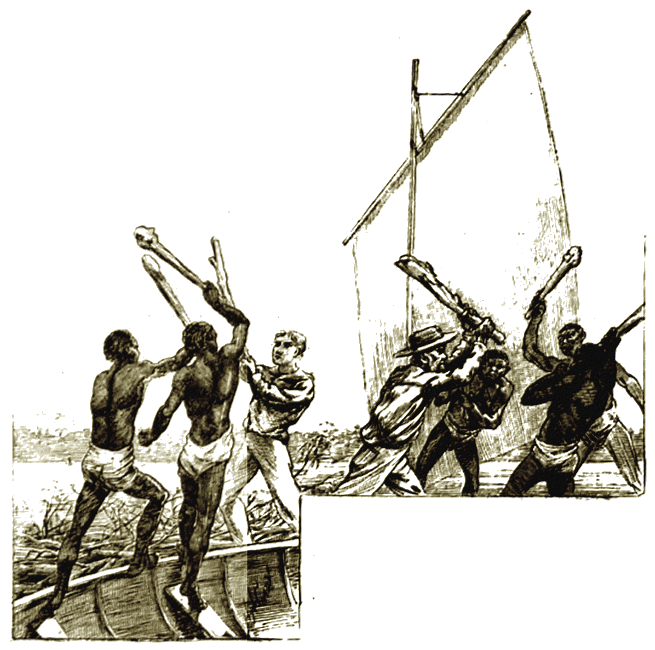
It was not long, however, before they recovered their normal courage and fought with some degree of order. And now the sailor had ample opportunity to test his own powers. Ten or a dozen of the savages, armed with heavy war-clubs and spears, were still unwounded. The position of the two vessels prevented the natives from using their whole force effectively; besides the boy's courageous demonstration upon their flank and rear compelled them to defend themselves in that quarter. More than once his stout pole had descended upon the head or arm of some savage combatant, in the act of launching a blow at his friend. But in spite of his almost superhuman strength the odds were beginning to tell upon the sailor. He was wounded in several places, the blood was flowing from a cut upon his forehead, and he had received a spear thrust in the fleshy part of his thigh.
It had never occurred to Ben to make use of the fire-arms in the boat. In fact, fighting at close quarters, they would not have been as effective in disabling the enemy as his club. Just at a critical juncture, however, while three or four of the savages were contending with him at once, his weapon broke upon the iron skull of one of them. But his huge fists were nearly as deadly, falling like blacksmiths' sledges upon the dusky faces and reducing them to shapeless pulp.
Rendered desperate by their failure to overcome the friends, two of the savages attacked the boy together, while the balance made a simultaneous rush upon the sailor. The boy's slight weapon was speedily struck from his grasp and the next instant he fell back into the water, stunned by a blow from a war-club.
His fall was witnessed by Ben, who, despite his own danger, had kept an anxious watch upon his young friend. Maddened by grief and rage, he uttered a hoarse shout, and striking one of his assailants senseless into the bottom of the boat with his fist, seized the next by the waist, dashed him with awful force into the midst of his companions clustered together in the forward part of the canoe, driving them all backward in a body.
The fragile vessel, already nearly half cut in two by the bow of the Huzza, broke into two pieces and rolled over, discharging the whole of its black cargo into the water.
Released from contact with the canoe, the Huzza drew away from the scene of the combat. The savages, many of whom were completely disabled and all having received more or less injury, evinced no disposition to renew the attack, but busied themselves in collecting their helpless comrades floating in the lake; and supporting themselves upon the fragments of the canoe, made the best of their way toward the shore, expressing their rage and disappointment in a chorus of lamentable howls.
Meanwhile, giving the senseless savage, who still lay in the bottom of the boat, a hearty kick, by way of venting his feelings, Ben took the helm and began to search for the body of his friend, of whose death he had no doubt
STUNNED and bewildered from the wound he had received, Rollin sank like a stone. The cool water in the depths of the lake revived him somewhat, however, and he mechanically struck out for the surface. The debris of the raft, which had gone to pieces in the struggle, floated around him, and throwing his arm over a fragment of wood which came in his way, he clung to it, too weak to make any further exertion.
The Huzza had fallen off before the wind to some distance before Ben gained control of her, and in coming about she passed a hundred yards or more to the left of the scene of the combat. Meanwhile the injured savage lying in the bottom of the Huzza had regained his faculties and sitting up, looked vaguely about him.
"There you are, you black marine!" growled Ben, in a tone of rage and disgust, "waking out of a comfortable snooze. Don't you wonder why breakfast ain't ready, eh? Don't you feel like grumbling because the coffee ain't boiled and the bacon fried, eh? Yah!"
Uttering these words with an expression of great irony, the sailor once more resumed his anxious scrutiny of the surface of the lake.
"Ah me!" he said, with a groan, "it's all up with the poor little chap, at last. I shall never set eyes on him again in this world."
The boat had gone about once more, and was headed toward the spot where the boy lay floating upon his log, and
Rollin summoned his strength to hail his friend when he should have approached near enough.
A slight movement on the part of the savage drew the sailor's attention to that hapless individual. A grimace, occasioned by the pain of his hurls, contorted his sable features into the semblance of a grin, which instantly aroused the seaman's ire anew.
"You are laughing, are you?" he roared, leaping from his seat and seizing the poor savage by the back of his neck. "I'll give you something that will amuse you. There! how is that? and that?"
With each ejaculation the sailors huge fist descended upon the head of the unfortunate native, with sufficient force to have knocked him down, had Ben not taken the precaution to hold him upright with the other hand. None but a savage's hard skull could have sustained such a battering, without serious injury. As it was, each blow elicited a howl.
The sailor had interrupted his pugilistic exercise to draw the sleeve of his jacket across his face, when a faint voice from the water, calling his name, caught his attention.
"What was that?" he exclaimed, looking eagerly around. "Who called my name? Can't you answer?" he said, giving the savage a violent shake in his excitement. "Didn't you hear a hail?"
"Let the poor creature alone," replied Rollin's voice, "and help me out of the water, for I cannot hold on much longer."
"Where are you, lad?" cried the sailor, springing up and releasing the native, who felt back exhausted.
"Here, under the starboard bow, among the floating branches," was the feeble response.
With a vigorous stroke of the oars, Ben brought the boat alongside the boy and lifted him aboard with his strong arms.
"Not dead yet!" cried Ben, joyfully surveying him. "But are you hurt, lad?"
"Only a bruise or two," answered Rollin. "My head aches and my shoulder is lame. But I shall no doubt be all right in a day or two."
"What shall we do with that there bottle of ink?" said the sailor, pointing to the native who lay in the bottom of the boat, gazing at the two friends with terrified eyes.
"Let the poor wretch go," replied Rollin.
"Very well," said Ben, "though a little hanging would serve him right, the murdering villain! Here, you man-eating rascal!" he added, addressing the savage sternly, "you are free to join your brother-vagabonds paddling away yonder, like the cowardly marines they are. Come, clear out! and get yourself knocked on the head elsewhere."
The savage evidently comprehended his gestures, but did not attempt to make use of his freedom. He shook his head and pointed to his left arm which hung helpless at his side.
"Why," said Rollin, pityingly, "his arm is broken. See, Ben, he cannot raise it."
"You are right, lad," responded the sailor, in a remorseful tone. "He must have got that in the scuffle. Look here," he said, addressing the native apologetically, "if I had known that fin of yours was damaged, I wouldn't have thumped you as I did just now. Though you deserved all you got, you know, and more too."
During his stay on board the Swallow, Rollin had acquired some general ideas of common surgery, and while the sailor was talking, he had produced a number of splints and strips of linen from the medicine chest. He now proceeded, with Ben's assistance, to set and bind up the injured limb of the native.
When this had been satisfactorily accomplished, Ben arranged some spare pieces of sail-cloth in the boat, to form as comfortable a resting-place as possible, and lifted the savage upon it, with a gentleness strongly in contrast with his recent pugnacity. As Rollin was still very weak and lame, Ben prepared the food for a meal, offering a portion to the native.
"There, poor fellow-creature," he said, "put that under your black hatches—though I don't know," he added doubtfully, "as Christian wittles will set well on a cannibal stomach."
The captive took the food, however, and after a humble gesture, devoured it eagerly, carrying it to his mouth with the palm of his hand and snapping it up like a hungry dog.
"I wonder," said Ben, thoughtfully, "what his name is in his own lingo. How do you call yourself, blackie?"
The savage's reply, accompanied by many nods and grimaces, intended to be conciliatory, was of course, wholly unintelligible.
"Now what do you make of that?" grumbled the sailor.
"The only word that I could catch sounded something like 'Polly'," responded Rollin, smiling at his friend's discomfiture.
"I once knew a young woman of the name of Polly, to whom I was rather partial," observed Ben. "A very handsome girl she was, too," he said, with a retrospective sigh, "barring red hair and a bad temper. What do you say to calling this here heathen Polly, lad?"
Rollin assented, and Polly was formally invested with his civilized name. Being a really good-hearted savage in his wild way, he soon learned to answer to it with every demonstration of fidelity and affection.
Though Rollin had escaped any serious injury, the blow which he had received from the war-club, united with his long exposure to the storm on the previous night, told upon his young frame. On the following morning he lay tossing in a high fever. Poor Ben was at his wit's end. He gave the sick boy such simple remedies from the medicine chest as he was familiar with, but without effect. Rollin grew rapidly worse and at nightfall was delirious.
The boat had now left the lake far behind and was following the course of the river, narrowed again to a smoothly flowing current a hundred yards wide. By means of signs Ben had managed to teach Polly how to steer with his uninjured hand, and he soon learned to make himself very useful. He was a bright, quick-witted fellow, and in many ways testified his gratitude and affection toward the captors who had not only spared his life, but had treated him with a tenderness which was entirely new to him. He seemed to have no wish to leave the boat, which he could now easily have done, and his dusky face expressed almost as much concern for the sick boy as did that of the sailor.
On the morning of the third day the boy had evidently reached a crisis of the fever. He lay in a stupor, motionless, with closed eyes and breathing heavily. It was plain, even to Ben's inexperience, that unless relief could be speedily obtained, his young friend must die.
"He is in a bad way, Polly," he said, after gazing long and sadly at the unconscious lad. "And the worst of it is I can do nothing for him, poor boy! poor boy!"
The savage nodded.
"Yes, yes, you are quite right," continued Ben. "I am a useless old piece of timber, a regular horse-marine, in such matters, and I must sit down and see the boy die before my face, for want of a little common sense."
The savage nodded again, gazing at the boy with a solicitous expression.
"Look at him yourself, Polly. You wild people know something of doctoring. Perhaps you can help the lad. If you can Polly, you will make a friend of old Ben Bark, for life."
As if he had only been waiting for this permission, Polly nodded a great many times, and kneeling beside the boy took his hand and studied his face long and intently. Presently he resumed his seat, and looked thoughtfully about him, apparently examining the vegetation on the banks of the river. Suddenly he uttered an exclamation, and speaking some words in an eager tone, pointed toward a particular spot on the right bank.
"Now do you mean that you see something growing there which will be good for the boy," said Ben, doubtfully, "or do you mean that you want to be put ashore in order to desert? Well, well, either way you shall have your will."
He changed the boat's course as he spoke, and in a few moments she touched the shore near the spot which Polly had indicated. The savage quickly arose and seizing a handspike which lay near, leaped ashore. He ran along the bank a short distance then suddenly paused and kneeling down before a low flowering shrub, with thick glossy leaves, began to dig vigorously, using the handspike with his uninjured hand.
Presently he came running back, holding up a number of roots about as thick as a mans finger and of a reddish color, which he showed to the sailor with a triumphant air.
"I see them, Polly," said Ben, "what are they good for?"
The savage pointed toward the sick boy, made a motion as if drinking something, opened his eyes very wide, then began capering about.
"Oh," observed Ben, "I understand. The boy is to take something made of the roots, which will cure him. Is that it, Polly?"
The savage nodded energetically.
"Well," said the sailor, "it can do no harm to try. The boy will die anyway, unless something is done."
Fastening the boat to the bank, Ben procured a tin kettle, filled it with water and lit the oil stove. The latter proceeding amazed the savage, and he gazed at the stove with some apprehension, but he was not long in understanding its use.
Squatting upon the ground, he scraped his roots clean, broke them into small pieces and put them in the water, which was soon boiling.
Stirring the mess occasionally, Polly allowed it to boil for about half an hour. When the decoction had assumed a brownish red hue, he took it from the stove and poured it into a tin cup, holding about half a pint, which he set aside to cool When that was accomplished, the dusky chemist tasted his medicine, expressed his satisfaction by a series of loud smackings of the lips, and indicated that Ben should raise the boy's head that he might drink.
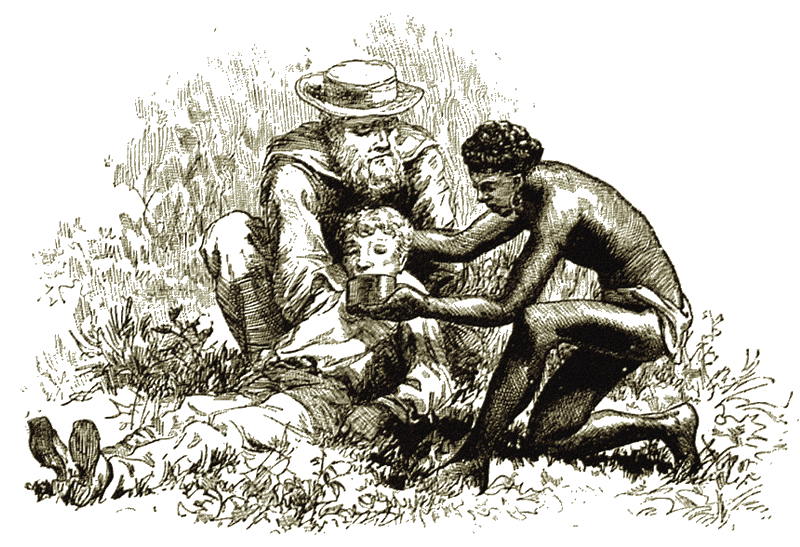
It was a task of some difficulty to force the fluid between the set teeth of the unconscious boy, but between them they managed it and then sat down, one on each side of him, to await the result. The moments passed sadly away. The boy's breathing grew fainter and fainter, his face assumed a yellow tint, his eyes, rolled back in their sockets, showed a line of white between the half-opened lids. Heavier and heavier fell the weight of a dreadful certainty upon the sailor's heart. His head drooped over the insensible boy's form, and his tears fell fast upon the limp hand which he held in his own. The sun mounted high in the heavens, and slowly declined toward its setting. The keen gold of the western sky changed to cloudy crimson, the purple hues of the brief tropical twilight stole over the landscape, and still the two strangely assorted friends bent sadly over the form of the dying boy.
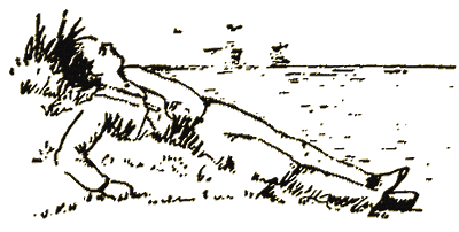
WITH the fall of twilight the last hope was extinguished in the breasts of those two watching over the hapless boy, dying in the midst of the Australian wilderness. For many hours there had been no change in his appearance, and now as the sailor bent over him, the breath came so faintly between his lips that the sailor drew back, and covering his face with his hands, groaned aloud, certain that his friend had ceased to live.
As he sat so, silently indulging the bitter grief which filled him, a sudden joyful exclamation from the savage aroused him. Pointing eagerly to the boy's face, Polly uttered several words in his own language, nodding vigorously all the while. Bending over in turn, to gaze at the boy's face, the sailor saw a faint red spot flickering in his pale cheek. The perspiration stood in drops upon his forehead, and his chest heaved with regular respiration.
"Polly," whispered Ben, in a doubtful tone, "am I deceiving myself, or is he—is he going to live after all?"
Polly nodded again, with a grin that distended his mouth from ear to ear, and made a motion as if drinking.
"You mean that that there mess of yours did it?" said Ben. "Well I do believe it, Polly, and I am grateful according."
He was interrupted by a movement on the part of the sick boy, who turned upon his side and stretched out his arms. Then he opened his eyes and looked around, rather vaguely.
"Is it breakfast time yet, Ben?" he said, in a drowsy voice. "I am as hungry as a hawk."
The sailor's only reply was to throw his arm about the savage's shoulder and hug him till his ribs cracked.
"Polly, you black ruffian," he exclaimed, in a suppressed tone of exultation, "if I was sure the color wouldn't come off, I'd kiss you for this here, I would."
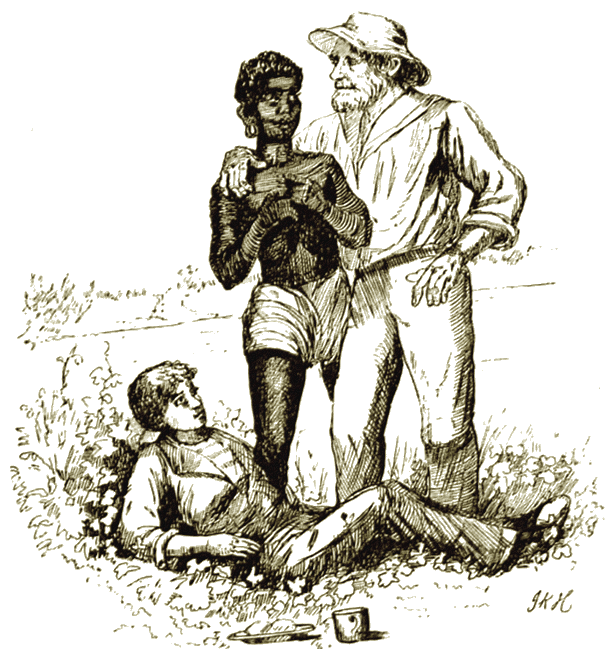
The savage grinned complacently. The boy, who was surveying this scene rather amazedly, broke into a feeble laugh, whereat Ben responded with a tremendous guffaw that resounded far through the silent forest, and even Polly added his share to the merriment by a shrill cackle.
"You have been very ill, dear boy," added the sailor, becoming serious again, "and little did Polly and me ever think to see this joyful time. Did us, Polly?"
"I know it, dear Ben," responded the boy, feebly giving his thin white hand to his friend. "But it is all like a bad dream now. I shall soon be well again."
"Yes, with the help of the Captain aloft and this here savage, who is the whitest man I ever met," was the sailors reply, "Do you know, lad, when I had given up all hope and sat down like the useless lump of ballast that I am, to see you die, this same Polly went to work and found something to cure you? Yes, dear boy, but for Polly you would not be here now, and I should be a lonely old hulk, drifting around without anchor, sails or rudder, waiting for some friendly gale to founder me and put me out of the way."
The sailor spoke with deep feeling, which impressed the boy strongly. Rollin stretched out his hand and look that of the savage.
"Thank you, Polly," he said. "I shall never forget what you have done for me to-day."
The savage smiled proudly; then putting his fingers to his mouth, moved his jaws rapidly.
"Yes, yes," replied Ben, "I know the lad is hungry. I'll pipe to supper directly. It's a pity we haven't a bit of fresh meat to make him a bowl of soup."
As if he understood the latter portion of the sailor's remarks, Polly arose at once, picked up the handspike again, and leaping ashore disappeared in the gathering darkness. Meanwhile Ben lighted the stove and began preparing such food as their stock afforded.
While he was thus engaged, Polly returned, carrying a small animal which he had slain, somewhat like a diminutive kangaroo in shape.
"What kind of warment is that?" asked Ben, in some disgust, as Polly held it up in triumph.
"Wallaby," said Polly.
"What the mischief is 'wallaby'?" retorted Ben. "You're a good fellow, Polly, but you don't understand that these pison reptiles ain't fit for a while stomach."
"He is right, Ben," interrupted the boy, "that is a wallaby, a well-known Australian animal, and excellent to eat. I should like a taste of wallaby myself, Ben."
"Very well," said Ben, "fire away with your rat, or wallaby, or whatever it is, Polly."
The deft fingers of the savage soon had the animal skinned and dressed. Its flesh was white and of excellent flavor, and even Ben, who consented to taste it, confessed that it was much superior to rabbit or fowl as an article of food.
During the next three or four days Rollin continued to improve rapidly. Polly's medicine, whatever it may have been, had effectually broken up the disease, which was one of the dangerous Australian fevers, so fatal to persons unaccustomed to the climate, and the boy's excellent constitution did the rest. Polly's arm, too, knit with the marvellous quickness common in those living an open-air life. By the time Rollin was able to resume his share of the duties of the expedition, Polly had cast aside splints and bandages, and was using both arms equally well.
With the savage's recovery there seemed to arise in his mind no intention or desire to leave his white friends. Every day that passed appeared to attach him still more firmly to them. His regard for Ben was mingled with a degree of awe of his giant strength. But for Rollin he felt a warm and humble affection, exhibited constantly in a thousand little attentions.
Every morning, armed only with the handspike, for he had no weapons of his own and was ignorant of firearms, he went ashore and speedily returned with some small animal, a quantity of nuts or fruit, often entirely strange to the travellers, for the boy's meal. At night, true to his wild habits, he constituted himself watchman, and would sit upright in the bow of the boat with eyes and ears alert. He seemed never to sleep. Often during the night Rollin would open his eyes to see his black friend leaning forward over the water, listening intently to some suspicious sound in the neighboring forest.
He had already made considerable progress in the English tongue, and could speak many words with perfect plainness. On their part the two friends had conceived a great liking for Polly. Despite his wild habits, his character was simple, childlike, and affectionate, faithful as a dog and honest as the sun.
The appearance of the country had now undergone a change. Instead of dense forests, there were stretches of open plain, covered with giant grass, interspersed with patches of park-like woods and dry ravines.
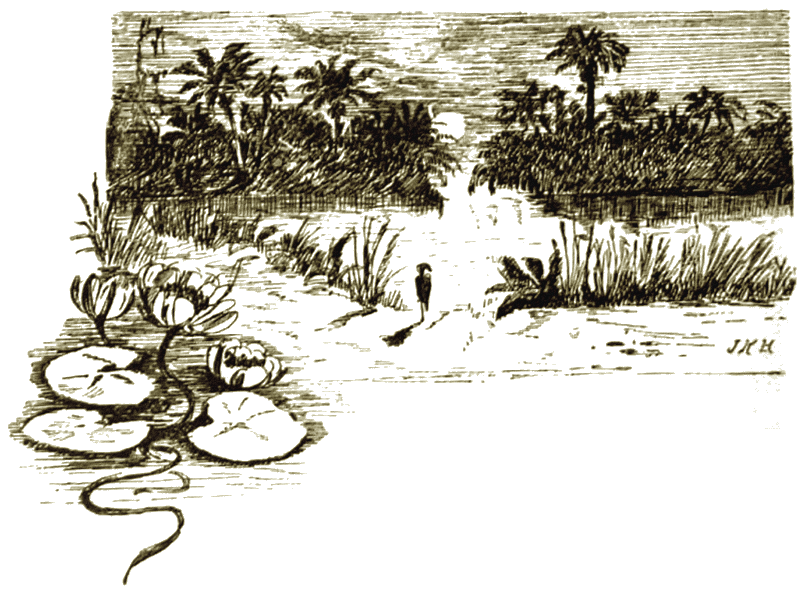
On the fourth day of Rollin's recovery the travellers caught sight of distant uplands, revealed across one of the open spaces in the trees. Examining these with the telescope the faint outline of a lofty mountain, nearly invisible on the horizon, came into view.
The boat was running swiftly before the fresh breeze, which, with the exception of a few hours at a time, had aided them during the greater part of the voyage. Reckoning by Captain Faulkner's map, the mouth of the great lake, and consequently the native village indicated upon the chart, could not be more than the run of a day or a day and a half distant, should the boat continue at her present rate of sailing. Hence the friends felt the necessity of greater vigilance as they neared the point where possible danger was to be apprehended.
Another problem occupied their thoughts. How would Polly act in the event of a collision with his countrymen? Could they expect that he would take part with them against his own people? He seemed grateful and attached to them, but would not his sympathies be with their enemies, and at the critical moment would he not turn against them?
These questions troubled the two friends greatly, though Rollin felt a strong inclination to trust the savage. Ben, on the other hand, took a gloomier view of the situation.
"It ain't as if he was white," he remarked, "and a Christian. Being a heathen and a savage, it's a part of his religion, d'ye see? to be treacherous and strike from behind. Instead of considering himself a sneak for betraying us, he would take a hand in doing us up and eating his share of us afterwards, and then strut around, as proud of his treachery as a drum-major on a field day."
"What do you propose to do, then?" asked Rollin, gazing anxiously at the unconscious Polly, who was steering the boat at the time.
"Tie him and gag him and lay him comfortably in the bottom of the boat till the danger is past," replied Ben, promptly.
"No," said Rollin, after a pause, "that would be cruel and unworthy of us, Ben. My advice is to trust him fully, and show him that we do."
"Well, well," returned Ben, "perhaps you are right, lad. I hope you are, for to tell the truth I've took a sort of liking for the black rascal."
The uneasiness of the friends was not at all diminished by the peculiar demeanor of the savage, later in the day. They observed that he seemed disquieted and restless. His eyes roved from the faces of the two whites to the banks of the river and back again, in a troubled way. Now and then he would start from his seat and fix his gaze upon some point on the shore, long and steadfastly, and resume his former position with an ominous shake of the head. His ordinary cheerful expression had given place to a pondering watchfulness, and altogether he appeared like a person whose mind was burdened with some overmastering doubt or fear.
Shortly after midday he suddenly indicated that he desired to be put ashore. Rollin immediately complied, and making signs that they were to wait for him, he disappeared among the trees with a light, quick step.
"Now what do you say to that?" asked Ben, with a significant look, when he was out of hearing.
"Perhaps he has gone to pick up some small game, as he often does," said Rollin, rather anxiously.
"No, for he has not taken the hand-spike. He has taken the hatchet instead. I say, lad, that he is going to desert, and a good thing, too."
"Well, if he has, it settles the question," replied Rollin, "though I am sorry to lose him."
"What do you say to getting away from here at once, lad?" said the sailor suddenly. "How do you know that he hasn't gone to give warning to the other vagabonds, so that they will be all ready to give us a warm reception?"
"No," replied Rollin, "I do not, I cannot believe Polly means to betray us, Ben. Let us wait for him an hour, and if he does not return, then push on as fast as we can."
"All right, lad," responded Ben, with his customary cheerful acquiescence in his young friend's views. "Hallo, here he comes, now! What is the matter with him?"
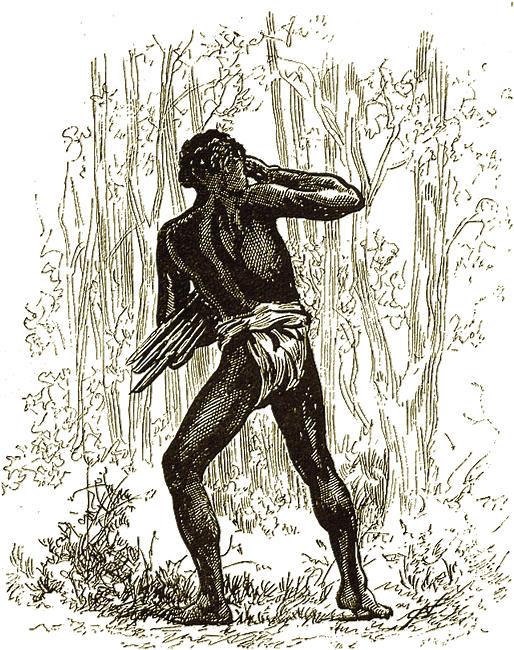
As he spoke, the savage reappeared at the edge of the forest, gliding from tree to tree and pausing now and then to glance distrustfully behind him. When he stepped into the boat and threw down a number of long slender rods and pieces of wood which he had cut, he seemed greatly exhausted.
He sat down upon a thwart to regain his breath, and the friends saw that his dusky features wore an expression of extreme concern and alarm.
"What is it, Polly?" said Rollin, laying his hand upon his arm, "What has happened? What have you seen?"
Extending his hand in the direction of the way by which he had come, he replied in a low ominous voice,
"Black fellows! Big row, soon. Much rascals."
THE two friends gazed at each other in silent consternation. There was no question of the genuineness of Polly's excitement, and broken as his words were, they conveyed a startling significance.
"Are you sure of what you say?" said Rollin, after a while, addressing the savage, "Did you see the black fellows with your own eyes?"
Polly nodded many times.
"Yes," he replied, "with these here peepers of my own, I see."
It is hardly necessary to observe that Polly had learned much of the little English he knew from Ben, and had copied his idioms as closely as he was able.
"Were there many of them?" asked Rollin.
"Two, three, one hundred black lubbers," responded Polly, "thick as fleas on dog's back. Yes, bless um! Blackguards with spears and shields, ready for scrimmage."
"Did they see you? Are they following you?"
"Not much," replied Polly, promptly, "no let bloody horse-marines set eyes on Polly. He squint at um behind tree. Make mug at um to hisself, then clap on all sail and here he are."
"How far off was it that you saw them, and what were they doing?" inquired the boy again.
"As far as run like sixty can in fifteen, twenty minutes," responded Polly.
"He means," said Rollin, addressing Ben, "that the distance between them and us is as far as he could run at the top of his speed in fifteen or twenty minutes."
"Three miles," answered Ben. "But were they in camp, Polly, or on the march?"
"All anchored," was the reply. "Got fire; cook heap rats. Think smell um somewheres. Not know here."
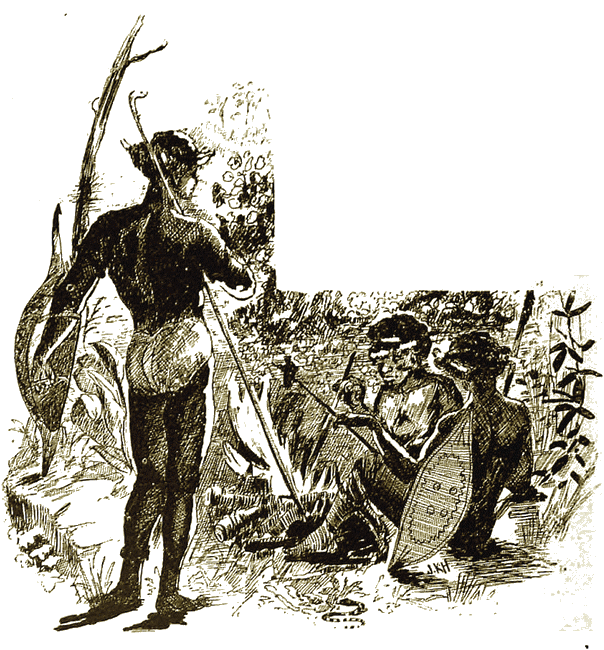
"You think they have a suspicion that we are in the neighborhood, but do not know exactly where, and that this is a war party out on the hunt for us? Is that what you mean. Polly?"
Polly nodded vigorously.
"Then," said the sailor, "the best we can do is to set sail at once and get out of this with all speed."
Polly shook his head negatively.
"Better stay where are till dark shut black villains' eyes," he objected. "Go now, see sure. Hide here, no see."
"I think he is right," said Rollin, thoughtfully. "By good luck they have not caught sight of us as yet. But they will be certain to keep a watch on the river and discover us the moment we show ourselves. Yes, Polly's plan is wisest."
"Dead sure," interjected the savage, decisively.
Ben uttered a dissatisfied grunt and looked at the native suspiciously.
"But how if he is deceiving us?" he said, addressing Rollin in a low tone. "How do we know that he has not already betrayed us to these scoundrels and merely wants to keep us here till they can bag us at one swoop?"
Rollin studied the attentive face of the savage with a penetrating gaze.
"I cannot believe it," he replied in an anxious tone. "See here, Polly, are you really our true friend? Or are you a wicked traitor, hiding hatred of us in your heart, and only waiting to give us up to your people yonder, to be tortured and murdered? Tell us the truth. Polly, without fear, and if it is so, you shall leave us and go join the others now."
The bright, affectionate expression of the savage's face clouded over with a look of distress.
"Think Polly rascal because black like the others?" he said in a sorrowful tone. "Think Polly black inside too, because got black mug? Well, then, knock um on the head and pitch um overboard. Got no use to live no more."
He arose, and, handing the hatchet which he had carried to Rollin, knelt at his feet and bent his head to receive the blow. He was so evidently sincere that Ben was ashamed of his suspicions of the faithful fellow. As Rollin look the savage's hand and raised him up, the sailor stepped forward and clapped him upon the shoulder.
"I ask your pardon, old boy," he said heartily. "I did you wrong, and I acknowledge it frankly. But you know, Polly, we are in something of a tight place, as the number ten foot said to the number six shoe, and a little suspicion comes natural like, d'ye see?"
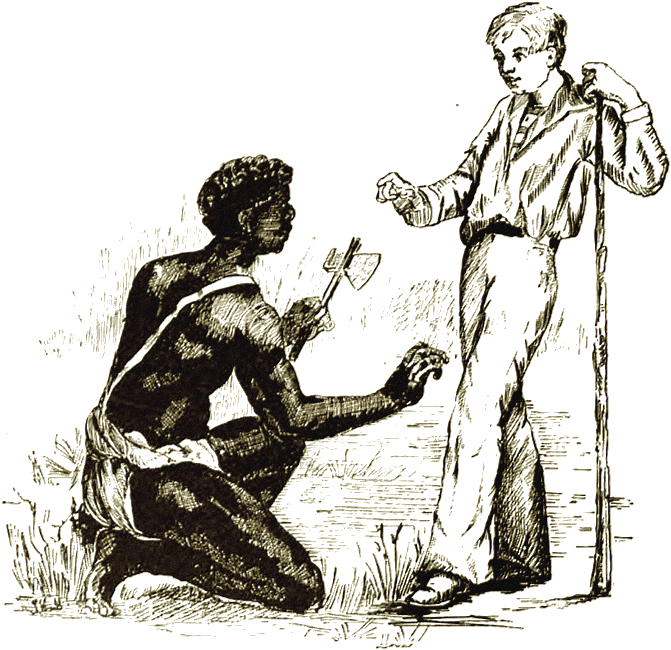
The savage received this apology in good part, then acting upon his advice, the three friends proceeded to push the boat under a mass of overhanging shrubbery on the bank of the stream, where she was effectually concealed. The mast was left standing, with the sail loosely clewed up, to be ready for a sudden departure, if necessary; and to guard still further against any prying eyes, which might be about, Polly cut a number of long branches and dexterously fastened them to the spar. Shielded thus, the boat was quite invisible at a little distance, even to the suspicious scrutiny of a savage.
Ben and Rollin busied themselves in overhauling and loading the fire-arms; though both of them sincerely hoped that there might be no occasion to use them. Both shrunk from the thought of so dreadful a necessity as the taking of life. Both were brave, but the bravest men are always humane. It is only the coward who is cruel.
Remembering his success in the previous combat, Ben selected a stout oaken club, capable of dealing a tremendous blow, and declared that, if they must light, he should depend upon that weapon, not only as more manly, but more effective in a melee.
"When you have fired your gun," he observed, "you may have killed your man, though like as not you may not, then there you are, with nothing but a clumsy chunk of iron in your fist. While a club is always loaded, so to speak, and ready for another whack, as soon as you have put the last where it will do the most good. Nevertheless you are right, lad, to have them other tools ready in case they are needed, d'ye see?"
Meantime Polly was busy with the rods and pieces of wood, which he had cut in the forest. With a pocket knife which Rollin had given him, he rapidly trimmed his rods, which were from four to six feet long and about an inch thick, smoothing and shaping them with wonderful dexterity, When complete these spears, for such they were, seemed very effective weapons, capable, in experienced hands, of being thrown to great distances with precision and power. Having balanced them in his grasp and tested their points carefully, Polly laid them aside and began upon one of the shorter pieces of wood which he had selected. These pieces were of one general shape, that is to say, a slight but decided curve, about two feet long, of a greenish color and very hard and heavy. By chipping away the surfaces, Polly reduced their thickness, leaving the principal weight in the centre and rounding both ends so as to afford a firm grasp for the hand.
He spent a great deal of time over these curious instruments, whose character at first puzzled the two friends, weighing them repeatedly in his hands and seeming to be very particular as to the exactness of the curve.
"Now what in the name of sense are those things?" said Ben, who had been watching Polly curiously. "Surely you can't mean them crooked, outlandish sticks for clubs, Polly? You would be dead sure to knock yourself down instead of the other fellow."
"No club," responded Polly. "What the mischief! Polly know what him about. You bet. See!"
Seizing the weapon, which he had just completed, a short distance from one of the ends, he whirled it over his head and launched it into the open space beyond the shrubbery where the boat lay.
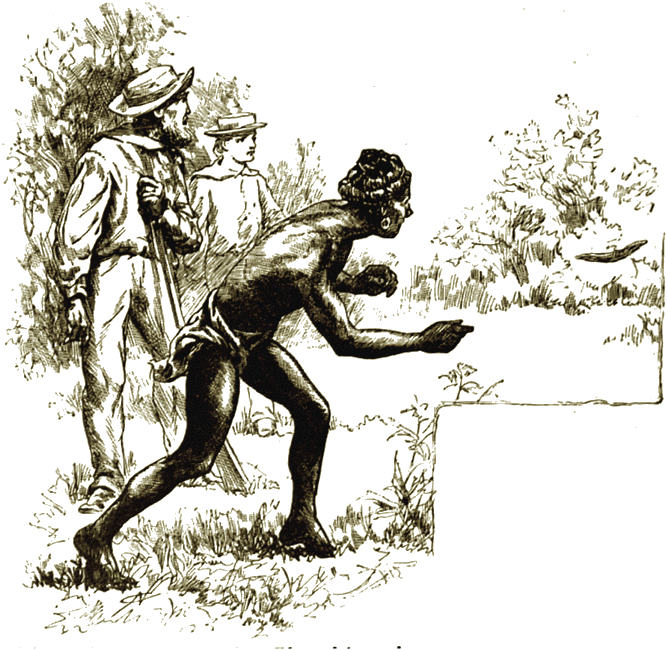
It sprang into the air like a bird, spinning round and round with a whizzing sound. Touching the ground at an amazing distance, it leaped up again, as if endowed with life of its own, and came flying back over the course it had taken, striking the earth only a few feet from where Polly stood. Picking it up, he returned to the boat with a triumphant grin.
"Well," said the sailor, with a gasp of wonder, "who ever saw the like of that? a thing which goes on an errand and comes back with the answer."
"I know what it is now," exclaimed Rollin, "I have often read of it, but I never saw one before. It is a boomerang, is it not, Polly?"
"Jess so," replied Polly, chipping away upon another piece of wood. "Boomerang. Go thump black rascal, then come back to Polly."
It was Polly's advice that they remain where they were until near midnight, by which time the savages would have moved on to prosecute their search elsewhere. Then the journey might be resumed safely for some hours, until daylight made it necessary to seek shelter again. His suggestion was adopted, and having made a supper of cold meat, of which a considerable supply still remained, they prepared to pass the time until the hour for departure should arrive. Polly advised his white friends to get some sleep, proposing to keep watch meantime himself.
As the night drew on, they sat close together in the boat, conversing together in low tones, while Polly, at his post in the bow, kept a distrustful eye upon the surrounding country. The hours passed without any suspicious sight or sound. The various noises of the forest alone disturbed the silence. The sense of impending peril, the suspense and the gloom of the night oppressed their spirits; gradually their talk ceased and they sat mute, wrapped each in his own anxious thoughts.
After a time, the deep breathing of the sailor told Rollin that his friend slept. Despite his uneasiness, he too began to succumb to the weariness which was upon him. Two or three times he started and rubbed his eyes, to see Polly sitting motionless as before, with bent head, peering into the darkness before him, then his heavy eye-lids closed and he sank into deep slumber.
He was aroused by a light touch upon his arm and a suppressed voice, which he recognized as Polly's, whispering in his ear.
"Hush. No speak, black fellows around."
He softly arose to a sitting position and gazed about him. He saw that the sailor was already awake and sat with his club in his hand, ready for the worst. A deep silence had fallen upon the forest and nothing was audible but the faint sighing of the wind among the trees. It was this sudden cessation of the ordinary night cries of the wilderness which had first warned Polly of approaching danger, inasmuch as it indicated the presence of human enemies.
To the two white friends no other sign announced their vicinity, but to the trained senses of the savage there were many such signs—the faint rustling of dead leaves, the snapping of a twig, together with others which he could neither have explained nor described.
It was a painful moment for the boy, thus silently awaiting the attack of unseen foes, and even the sailor shifted uneasily upon his seat, digging his fingers nervously into the handle of his club. Presently Polly, who had been listening intently, bent over between them and whispered,
"They know we somewheres, not know where. Hunt all around, only one fellow come this way."
"But one will be as bad as fifty," replied Rollin, in the same tone, "for he will alarm the others."
"No," said Polly, "we catch him. Make um still. Then get out of here, double quick."
"Yes, yes, I suppose so," muttered the sailor, "but it's bad business, bad business!"
"Hush!" interjected Polly.
A stealthy rustling sound in the shrubbery near at hand caused the occupants of the boat to grasp their weapons and hold their breath in agitated expectation. Suddenly Polly uttered a low exclamation:
"There he is."
Peering intently into the shadows, the boy and the sailor made out a dark form moving cautiously in the edge of the forest. Every few moments it paused and seemed to be listening, then came on a few steps farther and listened again. When it had approached within fifty yards of the boat it stopped again and remained motionless a long while.
"He see us," muttered Polly; "got sharp eyes, see us sure. Aha! what I say? He know we here; going to tell other rascal. Mustn't do that."
The figure had begun a retrograde movement, as slow and cautious as he had come. He had taken but a step or two when Polly arose in the boat. The two friends saw him whirl his arm about his head, and heard a sharp, whizzing sound in the air. There was a dull, hollow sound, as of two hard bodies meeting violently, a suppressed cry, and the dark form plunged forward and fell. While Ben and the boy were gazing at this spectacle in amazement, there was a faint splash close beside the boat, and, leaning over, Polly withdrew the boomerang, which he had thrown with such skill, from the water.
"Now, get out of here, double quick," he said composedly; "that fellow no talk for awhile, you bet."
"I hope you have not killed the poor wretch," returned Rollin, divided between admiration of Polly's wonderful marksmanship and horror of its effect.
"No kill," said Polly; "ought to all the same. But got too hard head. No crack that head. Sleep a little, that's all."
While speaking, the travellers had been rapidly preparing for departure, and now the boat was pushed into the stream and got before the wind.
The boat sped onward before the freshening breeze, and as the time went by without signs of pursuit on the part of their savage foes, the two white friends began to recover somewhat from the gloom which the imminent danger had cast upon their spirits.
"We have outwitted them, eh, Polly?" said Rollin to his dusky comrade, who sat beside him in the stern of the boat.
"Not so sure of that," replied Polly, doubtfully, "think more row with black rascal yet. They know we somewheres; bound to catch if can."
"They seem to have all gone down the river on the wrong scent," observed Ben. "For my part, I think as Rollin does, that we have got rid of them for good."
"What that sound like, eh?" said Polly, significantly.
A long, melancholy cry arose from the deep shadows of the forest on the river bank, and died away in a low, tremulous moan.
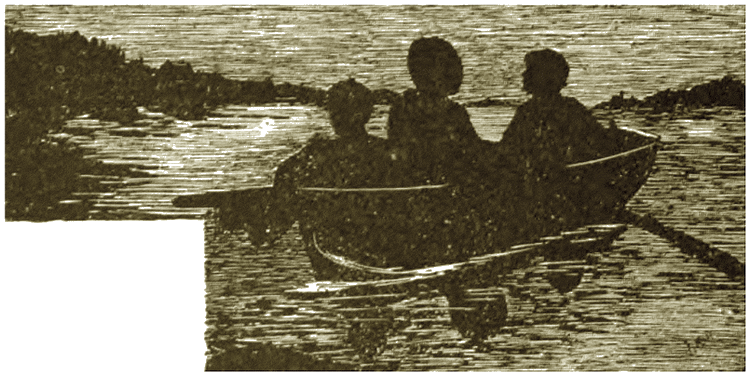
"An owl," answered Rollin. "I have often heard them since we began the voyage."
"That owl got no feathers," said Polly, quietly.
"What do you mean!"
"That owl got club, got boomerang, got spear," said Polly. "That owl like to knock you, Ben, me, on head, like sixty."
"You mean that it is a savage," replied Rollin, "who is imitating the cry of an owl as a signal to the rest?"
"Jess so. That owl hoot say to others, 'no found white man yet, but must find and knock brains out'. That what it say. Hark! there 'nother."
The hoot of the owl was answered by a similar lugubrious note far down the river. And as the friends sat listening in anxious silence the cry came again, this time from the bank not a hundred yards away.
"Thick as sharks," muttered Ben; "the woods seem alive with them."
Startled at finding themselves hemmed in on every side by watchful enemies, the travellers remained mute, with every sense strained to the highest tension. But the owl cries were not repeated, and during the rest of the night the savages gave no further sign of their presence.
When the pale wreaths of mist, curling upward from the surface of the river, revealed the outlines of the banks aglow in the red level light, the boat was drawn up beneath a thick clump of reeds and bushes growing in the shallow water, and the travellers prepared to pass the long day which must elapse before their journey could be resumed.
Both Rollin and the sailor began to feel the effects of the fatigue and excitement of the previous night. Having taken such precautions against surprise by the savages as were possible under the circumstances, they laid themselves down in the bottom of the boat and were soon sound asleep. Polly, upon whose lean, wiry frame neither toil nor wakefulness seemed to make the slightest impression, remained at his post in the stern, busying himself in perfecting the weapons which he had begun on the previous day.
It was long after noon when the two friends awoke, much refreshed by their slumber.
"Well, Polly," said Ben, with a yawn, "any signs of the enemy?"
"Plenty," replied Polly, composedly polishing away at a boomerang.
"Where, Polly?" asked Rollin, "I see none."
"Look there!" said the savage, pointing through an opening in the undergrowth. "What you call that?"
"It looks like a camp-fire," answered the boy.
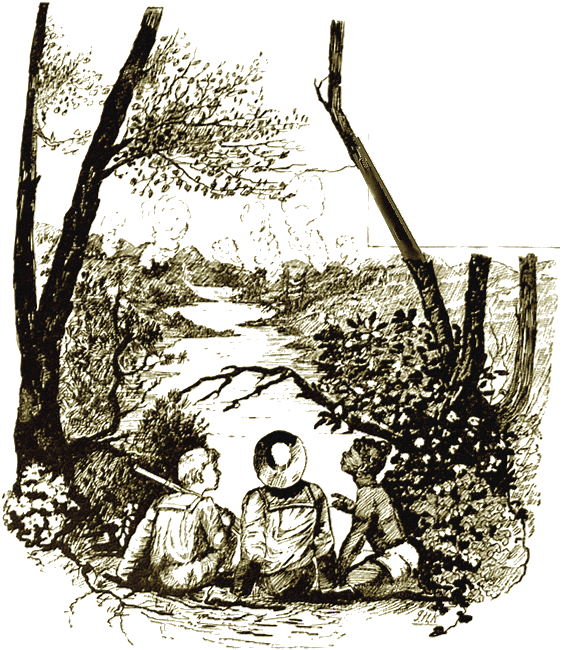
A tall column of thin blue smoke was rising straight into the still air from behind the brow of a low hill a mile distant. The fire itself was not visible, nor were any of the savages in sight.
"No camp-fire," said Polly; "that smoke talk. It say things. Other fires answer. Look there and there."
Farther away to the right the boy saw another column of smoke, much thinner and smaller than the first; and still more remote, on the bank of the river, near the point where they had anchored on the previous night, a third pillar of smoke, hardly larger than a man's arm, but very dark in color, was visible above the tops of the trees.
In fact, directed by Polly's finger, Rollin saw other columns of smoke, varying in magnitude and color, mounting upward in an irregular semicircle, at short distances, completely hemming them in.
"What does that mean?" asked Rollin, pointing to the crest of a hill to the left, whence the smoke was rising in interrupted puffs, like the explosion of shells in the air, one puff following the other at intervals of a minute.
"That mean chief there," said Polly. "He tell other fellows to keep watch, catch us soon."
As may be supposed, this startling intelligence did not tend to reassure the minds of the two friends; surrounded on every side by watchful enemies signalling to each other by means of their strange telegraph, formidable in numbers and inveterate in pursuit, how could they hope to escape?
ACTING upon Polly's suggestion, the boat was got under way at dark, and a run of ten miles was accomplished before a pale crimson glimmer on the eastern horizon warned them that the moon was about to arise. As the savages had manifested their presence last upon the right bank of the river, the boat was headed toward the left bank, and run into shallow water among the underwood covering a long narrow point of land extending into the stream.
The moon arose slowly, flooding the earth with her white radiance, glimmering on the placid ripples of the river, throwing the clustering trees into a checker-work of bright light and deep shadow, and illuminating the landscape with a brilliance almost equal to noonday. Despite his weariness, Rollin was gazing with admiration at the scene of almost fairy-like loveliness before him, when a low exclamation from Polly startled him.
Turning about, he saw the savage peering through an opening in the shrubbery among which they lay. Following his example, he beheld a strange and alarming sight. Upon the other side of the tongue of land which has been mentioned, ran a deep but narrow creek, and upon its bank, not three hundred yards distant, was a cluster of low huts, looking more like heaps of dried grass than human habitations.
In the open space before the native village, for such it was, smouldered the remains of a large fire, and around it sat or lay a number of grotesque figures; while stalking silently to and fro, hideous in their war paint, were a dozen or twenty more.
Startled by the imminence of their danger, the friends held a whispered consultation. To remain where they were, within a stone's throw of their enemies, was out of the question. On the other hand, if they showed themselves upon the river in the full light of the moon, they must be instantly detected.
While they were discussing the question in low, guarded tones, there was a sudden crashing sound in the shrubbery near at hand, and three or four dark figures appeared upon the bank within an oar's length of where the boat lay. Polly seized his club, while Ben gut the oars out and endeavored to push the boat from shore. But her bow had become entangled in one of the numerous vines over-hanging the water, and she was immovable.
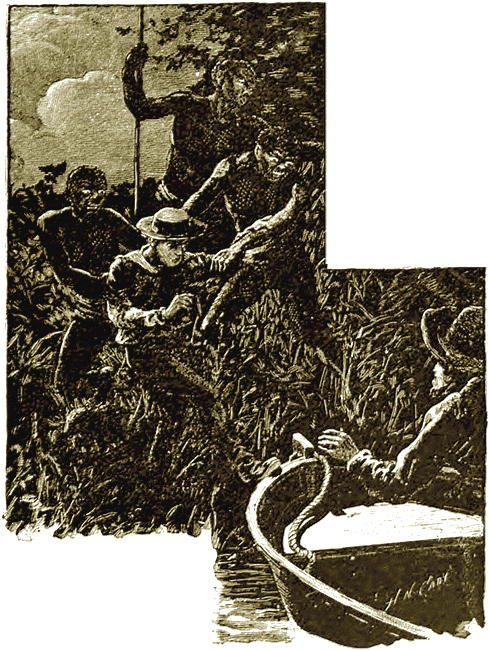
Perceiving the cause of the trouble, Rollin instantly sprang into the water to release the boat. He succeeded in disentangling the vine, but at the same moment a strong hand seized him by the shoulder and dragged him backward, shouting,
"I am seized! Row, row!" he pushed the boat with his foot with all his strength, and as the light vessel shot out into the stream he was dragged up the bank by his captors, who gathered around their young prisoner with yells of delight. They paid no attention to the other occupants of the boat, who had escaped them for the present, no doubt feeling certain of making them their prey at another time, but conveyed the boy to the village, where the whole tribe was by this time assembled together.
Rollin's heart was very heavy as he was borne into the midst of the exulting natives, and after being firmly bound, thrown rudely upon the ground to await their pleasure. He knew that he had no mercy to expect, but he maintained an appearance of fortitude, and returned the angry yells and threatening gestures of the savages with looks of calm resolution. He had by no means lost all hope of rescue; Ben and Polly were free, and he was confident that they would never abandon him in his hour of peril and distress.
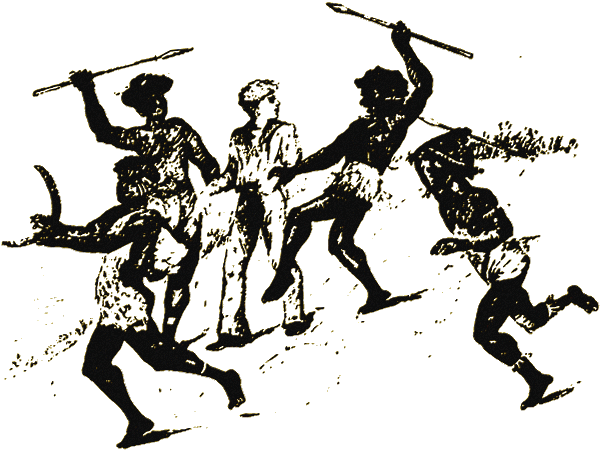
After much screeching, dancing, and other savage manifestations of triumph, the natives, for the most part, retired to their huts. Three or four of their number remained squatting around the dying fire, conversing in low tones, and casting looks of malevolent watchfulness at the young captive from time to time. After a while these too became silent, and Rollin saw that they had fallen asleep as they sat. The moon sank lower, the voices of the forest gradually ceased, and the fresh damp wind of early morning stirred the leaves with a faint sound.
Utterly miserable in mind and body, with the tightly-drawn thongs cutting into his benumbed limbs, the poor captive lay gazing with sorrowful eyes at the pale traces of dawn deepening in the east—the coining of that day which must be his last on earth, while the savages slept around him, and the myriad life of the forest awoke gradually into song and motion.
While he lay thus his eye rested mechanically upon a thick clump of bushes growing close to the ground, at the edge of the clearing. There was nothing peculiar about it, yet his attention was attracted to it, and from time to time his gaze wandered back to it. After an interval, when he looked at it again, he found himself startled and puzzled—he could not tell why at first. Then it flashed upon him all at once—the bush had moved.
When he first noticed it, it was at the extreme edge of the clearing. Since then it had advanced fifty feet or more toward the spot where he lay. Its progress was so slow as to be imperceptible; it seemed to change its place as a shadow lengthens in the sun, and not by any visible motion. His heart bounded with renewed hope. Could it be some stratagem of his friends to effect his release? Perhaps both Ben and Polly were watching him from behind their leafy screen with as much anxiety as he was watching the moving bush.
As the day drew on and the light grew brighter, the bush continued its gradual and almost invisible advance, until it was within fifty yards of where the boy lay, and just back of the group of huts. Here it became stationary and moved no farther. Rollin soon saw the cause. Some of the savages were already astir, and presently the whole population poured into the open space. With a shudder of terror, Rollin understood this movement They were gathering to witness his execution!
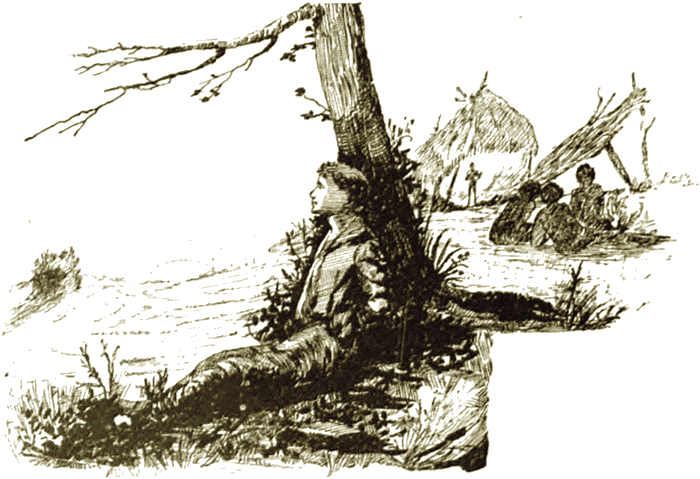
The chief, whom the boy recognized by his headdress of emu feathers and the additional quantity of grease with which his black body was bedaubed, advanced toward him, and partly untying his ankles, permitted him to arise, leaving his wrists still bound. Then uttering a rude sort of chant, the chief marched solemnly around the victim, waving a long and heavy club or sword of wood, edged with pieces of quartz.
The poor boy threw a wild appealing look toward the bush, whose presence there the savages in their barbarous exultation had failed to notice. It still remained motionless and gave no sign of life. Had he been mistaken? Had Ben and Polly left him to his dreadful fate without one effort to save him? A feeling of bitter sorrow and resentment filled his breast as he thought if either Ben or Polly had been in his place, how gladly he would have run every risk to rescue his imperiled friend.
The chief continued his chant, and the natives, ranged in silent rows, gazed at the preparations with an expression of dreadful expectation in their evil faces. Suddenly the chief paused and ceased his chant. The audience leaned forward in breathless suspense. The fatal blow was coming.
Rollin saw the heavy club whirl in the air, and with a shudder of deathly sickness closed his eyes. But at that instant a dark body whizzed through the air and a heavy boomerang, discharged from the bush, struck the chief upon the head and he fell with a crash. The whole body of natives, stunned and terrified by the sudden and unforeseen attack and the fall of their leader, remained motionless and silent.
Rollin opened his eyes and saw, bounding toward him at a furious speed, Ben followed closely by Polly. Plunging into the midst of the terrified savages, swinging the heavy rifle which he carried over his head and felling whole swathes of the demoralized warriors at every blow, Ben reached Rollin's side.
Without a word on either side, the sailor tossed the boy, still bound, upon his shoulder as easily as if he had been the lightest of burdens, and rushed away without the slightest diminution of speed, closely followed by Polly, who covered the retreat like the able warrior that he was.
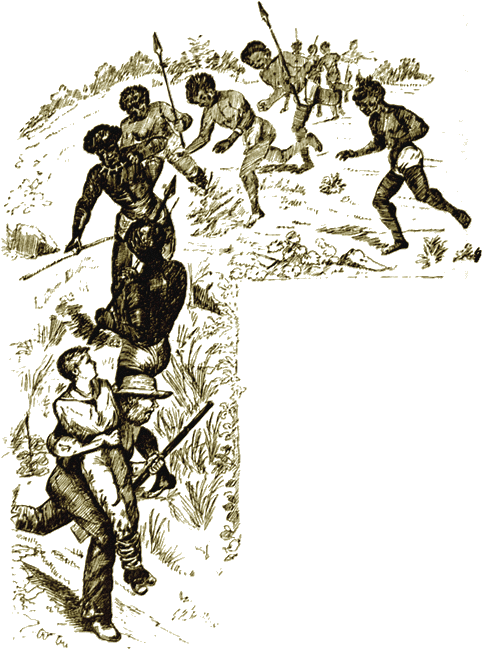
So completely paralyzed were the savages, that the three friends were almost in the cover of the forest again before one of them thought of pursuit. Then with a chorus of yells and shrieks, arming themselves with the weapons nearest at hand, they sprang to their feet and gave chase.
Ben and Polly had drawn the Huzza to shore at the mouth of the creek, in the most convenient place, and in anticipation of a close pursuit, they had made every preparation for instant departure. The boat lay at the distance of a third of a mile from the savage settlement, and over this space raced the fugitives, hard pressed by the yelling savages. Once or twice during the chase Polly turned and delivered a boomerang among the closely packed foes, causing a temporary check. But before the boat was reached spears and throwing clubs began to fall thickly around the flying friends, and both Polly and Ben were wounded in several places.
During the last hundred yards the foremost of the savages were not twenty feet in the rear, and if there had been the slightest hitch in releasing the boat, it would have gone hard with our friends. Fortunately the rope loosened with a jerk, and as the sailor threw Rollin into the bottom and followed himself, Polly pushed the vessel from shore. Surrounded by a cloud of missiles, none of which, happily, wrought serious damage, the Huzza swung out into the channel, and impelled by the oars in Ben's hands, shot swiftly away, leaving the baffled savages to shriek impotent maledictions from the bank.
Meanwhile Polly had cut the cords from Rollin's wrists and was chafing his benumbed hands, uttering odd exclamations of triumph and delight all the while.
"Got um back. Aha! yes. Ben and Polly great warriors. Take boy away right under noses of thirty, hundred, eighty. Laugh at um, make ugly mugs at um. Black lubbers can't keep boy when catch um. Knocked chief fellow into cocked hat. Eh, Ben, how that?"
"You are right," said Ben, rowing vigorously as he gazed at the buy with a smile of pleasure and affection. "You are right Polly, though you do put your observations in a boastful way unbecoming a white man and a seaman, d'ye see? We have got the boy back, as you say, though it was a tight squeeze to do it, and I am right down happy, yes I am."
"Thank you, Ben, thank you, Polly," responded Rollin, simply. "You both know how much I owe you, much better than I can say it in words."
"All right," said Polly. "Now Ben, must get out of here like sixty. Black lubbers got canoe, soon come after us. Best put sail up, plenty wind, go fast."
Ben assented and the mast was stepped and the sail speedily hoisted. The savages thus far had shown no disposition to pursue their escaping enemies. Under the sailor's energetic strokes the Huzza had put a mile of clear water between herself and the native village. But both Ben and Polly had seen two or three large and well appointed war canoes drawn up on the bank in the little creek near the huts, and in their present temper it seemed a certainty that they would give chase.
And in fact the sailor had but seated himself at the helm when two canoes, heavily loaded with warriors, shot out of the creek, followed a moment later by a third. All three were headed toward the Huzza, and the quick flash of the paddles proved that the savages were putting forth their utmost energies to overtake the fugitives.
Watching the advancing canoes with an anxious eye, Ben saw with disquietude that they were gaining upon the boat. The gain was small, it is true, and it would require several hours for them to close up with the boat, should the wind hold. But unless the course of the river should change so that the Huzza might be brought to a better point of sailing, the friends must be surely overtaken. Besides, the wind might die away toward afternoon, as it often did, leaving them at the mercy of their pursuers.
The sailor said nothing, however, not wishing to depress the spirits of his companions; though from the way Polly's quick eye rolled from the Huzza's sail to the canoes, it was evident that he too understood the situation.
On flew the gallant little Huzza, leaning to the wind until the water lapped the gunwale, but it was only too plain that she was no match for the canoes, impelled by twenty strong arms. By frequently changing hands at the paddle, the savages maintained their speed undiminished. By noon the foremost canoe was less than a hundred yards astern.
The compressed lips and lowering brows of the friends proved that they felt their situation to be desperate. To resist odds so overwhelming seemed mere madness, yet neither of them thought of surrender. Grouped together in the stern of the boat and facing their fast approaching foes, they waited in grim silence for the terrible moment which should decide their fate.
The wind, which for some time had been blowing in unsteady puffs, suddenly died away, and the Huzza's speed decreased instantly. With a yell of triumph the savages urged their canoes toward the devoted boat. The one in the lead was barely half a dozen times her own length away, and the three friends had grasped their weapons and sprung to their feet, when the rowers all at once ceased paddling. There was a moment of excited deliberation among them; then all three canoes swung about and retreated down the river, even faster than they had come.
The three friends stood gazing after them until they disappeared around a turn in the river, utterly stupefied at this amazing change in the state of affairs. Drawing a long breath, like one awakening from a deep sleep, Ben said,
"Now what in the name of all things wonderful does that mean?"
NOT less amazed than the sailor, Rollin remained mute, with open mouth and staring eyes. With a common impulse they turned to Polly for an explanation of the mystery. The savage stood gazing down the river in the direction taken by the canoes, with a look of perplexity on his face.
"What that mean?" he replied slowly, in answer to their questions. "Don't know myself. Gone, that sure. Row like sixty, too. Aha!" he exclaimed suddenly, "there smoke. That tell them come back, double quick."
Rollin and the sailor likewise made out the smoke, rising in a thin brownish plume from behind a distant headland in the direction of the native village.
"Hark!" exclaimed Rollin, "what is that?"
A series of sharp, sudden, cracking sounds, as Rollin said, more like the explosion of a package of fire-crackers than anything else, came faintly but distinctly from the direction of the native town.
"Fire-arms!" ejaculated Rollin and Ben simultaneously, looking at each other in amazement.
Another crashing discharge followed the first; then came volleys, fired with the steady regularity of platoon practice. It was evident that a sharply contested battle was going on at no great distance. But who were the combatants? Savages on one side, certainly, and on the other white men, well-armed and well-drilled—the crew of the Swallow's boat, commanded by Captain Chadwick!
The truth had flashed into the minds of both the boy and the sailor at once, and as they stood listening to the sound of the engagement, their faces grew pale with dismay. Both of the friends had begun to feel confident that Chadwick had long since abandoned the pursuit and returned to the ship. With what fierce hatred and determination he must be inspired to have followed them so far! As imminent as had been the danger from their savage foes, here were enemies a hundred times more to be dreaded. Led by a commander as brave, skilful and unscrupulous as the captain of the Swallow, how could they fail of their purpose? In the heart of the wilderness and independent of human justice, Chadwick might wreak his vengeance to the utmost, without fear of retribution.
Since they had begun to look upon Polly as a friend, Rollin and Ben had related to him some portion of their previous history. They had not confided to him, however, the ultimate object of their journey, nor referred to the mysterious Oo, leaving him to suppose that they were merely escaping from the cruelty and hatred of Chadwick. He understood perfectly now, that, of the two, his friends feared their white foes most, and stood listening to the sounds of the battle with as much uneasiness as they.
The Huzza was still moving through the water at a fair rate, and at sunset was a considerable distance from the scene of the combat. The sound of the fire-arms had long since died away, but which party had been victorious was yet a matter of doubt.
While it was still light, however, Polly, who had been anxiously scanning the river behind them, uttered a sudden exclamation.
"Look," said he, pointing down the stream, "what that there?"
The sailor and the boy joined him in the stern, and bent their gaze in the direction he indicated. At the foot of a headland, where the river made a sharp turn, a small white object was glimmering in the pale glow of twilight. It was many miles away, but to both of the friends its character was only too evident. It was the sail of a boat.
"It is the Swallow's boat," said Rollin with a sigh.
"Yes," muttered Ben, "there it is, sure enough. Of the two sets of villains, the worst has won the fight."
"Are we seen, do you think?" asked the boy, anxiously.
"No," replied Ben, "our sail is much smaller than theirs and besides we are in the shadow of the bluff, while they are in the full light. All the same we must seek shelter among the bushes yonder until it is quite dark, for fear the hawk's eyes of that scoundrel should sight us."
The boat was accordingly drawn under the bank and the sail lowered. Shortly after dark the faint glimmer of a fire appeared upon the right bank of the river, marking the point where the Swallow's crew had camped for the night. The three friends held an anxious consultation as to the proper course to be pursued. Ben and Polly were for setting sail at once and putting as many miles between themselves and their pursuers as possible before morning. Rollin said nothing for some time, but sat thoughtfully gazing at the distant campfire.
"Well, lad," said Ben, addressing him, "what do you think of the plan of getting under way and keeping on all night?"
"They sail faster than we do, and would surely come up with us by to-morrow afternoon," said the boy.
"True," replied Ben. "But what better can we do?"
"I have an idea," said Rollin, hesitatingly, "but I don't know whether it is practicable or not."
"Let us hear it, lad."
"Since they outsail and outnumber us, it is only a matter of time when they will overtake and capture us—that is, if we go on in this way. Now there are two chances open to us; one is to abandon our boat and take to the land; the other is to disable their boat."
Ben started. "It's a bold idea, lad, but I am afraid it can't be done."
"Why," said Rollin, "as you see, they have camped ashore and no doubt fastened the boat near by. I first thought of taking her away altogether, but that would be too dangerous. If we could damage her sufficiently to make her useless, even for some days, and delay them while they repaired her, we would be able to get so far ahead of them as to be practically free."
"Very well," said Ben, "but how do you propose to do it?"
"I would make a torpedo out of a condensed-milk can and some of our rifle powder, drop down the river under cover of the darkness, attach the torpedo to the side of their boat, and blow as big a hole in her as possible. What do you think of it?"
"Good!" exclaimed Polly, "first class! Rollin biggest head of us all, though only a boy."
"Yes," said Ben, doubtfully, "but the one who fixes the torpedo must take his life in his hands. The cartridge might go off too soon, or he might be seen from the shore and shot."
"I must take the chance," replied Rollin. "I have thought of all that."
"You?" said Ben. "You mean me. That there little job is going to be did by Ben Bark, whose old hulk ain't worth much, so if it is sunk the loss will be small."
"No, Ben," returned Rollin, firmly, "I must be the one, for several reasons. In the first place I suggested the plan and must take the responsibilities. In the next, I am the smallest and lightest of the three and shall be least likely to be detected."
Ben protested, but in the end gave way reluctantly, and it was arranged that Rollin should perform the dangerous duty of attempting to place the torpedo in position.
By the light of the oil stove, screened from observation by the sides of the boat, Rollin procured the powder and filled the small can he had selected for the purpose. Then he tore up some shreds of sail-cloth, and wetting a quantity of the powder, made a paste of it, which he rubbed into the fibres of the cloth. Thus he had a fuse, or slow match, which, as he calculated, would burn a sufficient length of time before igniting the explosives.
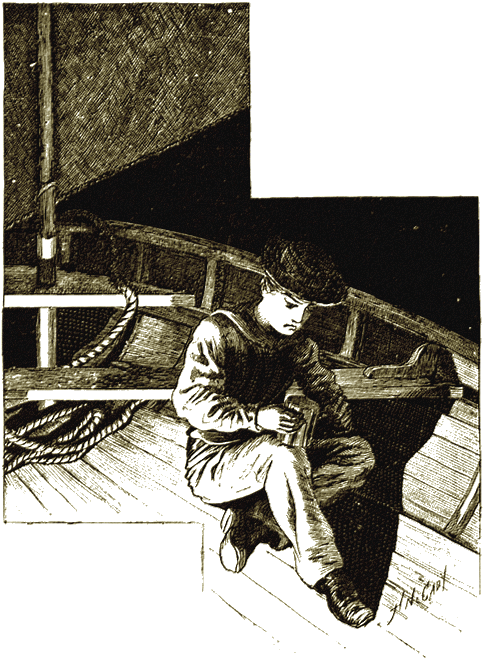
Fixing the fuse in the powder and tying the whole compactly together, he was ready for his dangerous adventure. By starting at once, the friends reckoned upon reaching the neighborhood of the camp by the time their enemies should be asleep and before the rising moon would render detection possible. The mast was unstepped and laid in the bottom of the boat, Ben took the oars and Polly steered.
Proceeding with the utmost caution, after two hours of rowing, the friends had approached as near the fire as was deemed safe. Removing his clothing, Rollin placed his torpedo and fuse, together with some matches upon a piece of plank, in order to keep them dry, and slipped gently into the water.
Exchanging a fervent good-bye with Ben and Polly, he set off, swimming silently and pushing his plank before him. He allowed himself to sink as low as possible in the water, keeping only a portion of his head above the surface. Thus hidden it would have been sharp eyes that could have detected so small an object moving on the river, even at the distance of a few feet.
Ben and Polly watched him until he had disappeared in the darkness, with feelings which cannot be described. The watch-fire on the shore was nearly extinct, throwing only a faint, reddish gleam a short distance around. No sound disturbed the stillness of the night, except now and then, as the sailor fancied, the faint plash of a swimmer's strokes. The minutes dragged heavily by. Rollin's absence seemed unaccountably protracted. Had harm already come to him? At length Ben could no longer restrain himself, but said to Polly in a low tone,
"I am afeared the boy has come to grief. He has been gone twice as long already as he ought."
"No," said Polly, more composedly, though there was a tremor in his voice too. "Rollin all right. He clever boy. Never you fear, Ben, he come back safe and sound."
"I wish I had never let him go," responded Ben, suppressing a groan. "Cowardly lubber that I am!"
"Hush," interrupted Polly, "look there. I told you he was all right."
A faint blue spark was visible in the direction of the camp. It burnt unsteadily for a moment; then there was a slight flash.
"He has fired the fuse!" ejaculated the sailor.
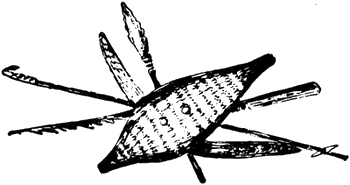
THE Huzza had stopped about a quarter of a mile from the camp. That distance, therefore, must he covered by swimming; but Rollin was at home in the water, and under ordinary circumstances would have thought little of such a task. He was compelled to proceed with great caution, both to avoid wetting his explosives and attracting the attention of Chadwick or his men.
When he had approached within thirty or forty yards of the shore he was able to make out the forms of the men, stretched about the expiring fire, and even Captain Chadwick's figure, wrapped in a cloak and seated with his back against a tree. All appeared to be asleep. Fastened by a rope to the bank, with her bow away from the land, lay the Swallow's boat.
In order to reach her he must go within twenty paces of where his cousin sat. The slightest error, therefore, would surely betray him to his unscrupulous enemy. Burying himself still deeper in the water, he swam yet more slowly, using only his feet to propel himself to avoid making the faintest sound. Once or twice some movement on the part of a sleeper caused him to pause and allow himself to sink under the surface for a moment.
Proceeding in this way, with his senses strained to their utmost, he finally floated gently under the bow of the boat, where he lay for a while to make sure that he had not been observed. When he had satisfied himself of this he softly seized the gunwale of the boat and drew himself up until he could obtain a view of the fire and the sleeping men. After waiting another minute or two he proceeded to fasten his torpedo against the side of the boat. He placed it just above the water line so that the explosion should occasion the utmost damage possible. He then arranged his fuse so that it should not be visible from the camp while burning, and softly struck a match. His hand shook so that the first and second went out immediately. The third, however, burned, and with it he touched the end of the fuse, which fizzed a moment in an erratic way, then continued to burn steadily, with a small red spark.
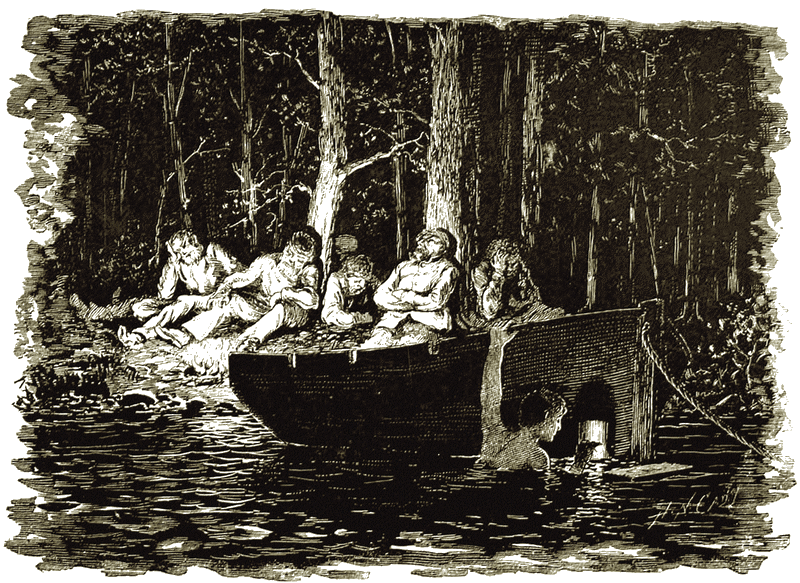
Assured that his work was well done, Rollin slipped cautiously into the water again and swam toward the Huzza. From time to time he raised his head and saw that the fuse still continued to burn. In the darkness he had some difficulty in finding the spot where his friends were waiting for him. Perhaps he might have swam about in vain for a long time, had not the excited voice of Ben, raised much too high for safety, guided him aright.
"I tell you I am going to find him!" the sailor was saying, "They have caught the lad, and I am going to get him back, if I have to walk through the whole gang of villains to do it."
"Hush, Ben," whispered Rollin, seizing the gunwale of the boat, "here I am, all safe. Help me in and pull away as quick as you can."
The sailor was about to make some noisy demonstration of delight, when he was restrained by the boy, who, with his friend's aid, climbed into the boat and began dressing.
"What luck, lad?" asked the sailor eagerly, as he took up the oars.
"The best," answered Rollin, "I reached the boat, fixed the torpedo, fired the fuse and came away without being discovered. Wait a little, Ben, and you will see something worth while, or I much mistaken."
While Ben rowed rapidly but quietly up the river, all three kept their eyes upon the spot where the explosion ought to occur. A considerable interval had already elapsed, and as the moments went by, even Rollin began to fear that his toil and risk had been fruitless.
"They have discovered your torpedo," growled Ben, "or else the fuse has gone out—"
He was interrupted by a sudden bright flush in the direction of the camp, which lighted up the country for a mile around; then a dull roar, as of a cannon, boomed over the water, dying away among the hills like distant thunder. Rollin's torpedo had done its work.
"You have given them the biggest kind of scare," said Ben, laughing with huge enjoyment. "And won't Chadwick look green when he finds out what has happened to his boat?"
"At all events," said Rollin, "they will not be able to follow us for a good while to come. I hope the hole in the boat is a good large one."
"Never fear, lad. By the sound of it I shouldn't be surprised if the explosion had smashed the whole bow."
In high spirits over the success of their attempt, the friends stepped the mast, hoisted the sail and put the Huzza before the freshening breeze. Though their worst enemies were at least temporarily crippled, they deemed it wise to get away from their vicinity as soon as possible. They resolved, therefore, to push on all night.
Polly insisted that he should be allowed to keep the watch while his friends slept, declaring that he felt no need of rest. Therefore Rollin and the sailor threw themselves down in the bottom of the boat and were soon wrapped in deep slumber, leaving the faithful savage at the helm.
It was early dawn when they were aroused by an unusual motion in the boat. The little Huzza was rolling and pitching heavily, dipping her close-hauled sail into the swells at every plunge.
"Hallo!" cried Ben as he arose and looked around him, "what the mischief have you been doing Polly? Here we are on blue water once more, though how we have got back upon the sea again in six hours is more than I know."
"It is not the sea," replied Rollin, "it is the great lake which is set down on my father's map. Wait a little, the sky is growing brighter. We shall soon see where we are."
As the mist arose from the water a glorious sight was revealed to the gaze of the voyagers. Stretching away before them, until it met the horizon, a vast expanse of tossing billows, a veritable inland sea, gleamed in the rising sun. The land behind them was already sinking into the waves, while before them nothing was visible but the lonely world of waters.
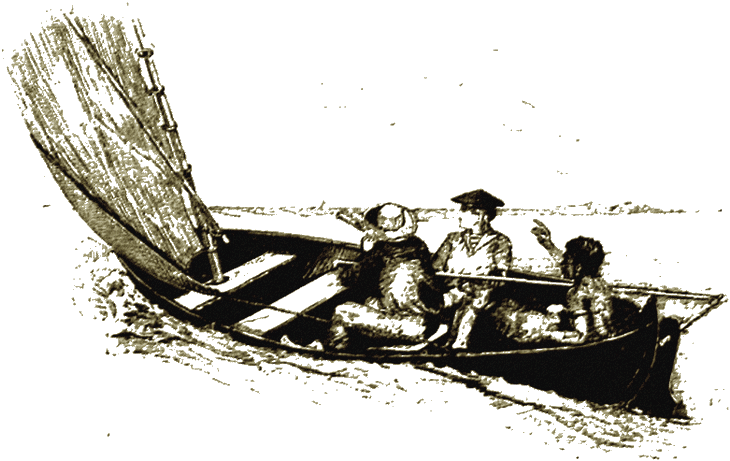
The brave little boat labored considerably in the heavy swells, but by putting a reef in the duck and stowing a portion of her load aft, she sailed more easily, riding the waves like a duck. For six days the sun arose and set in the waters of the great lake, but toward evening of the seventh, Rollin, who was sweeping the horizon before them with the glass, descried a faint blue speck low down and almost invisible. Though they were still too far off to guess its character, it was Ben's opinion that the object in sight was a detached mountain peak at the head of the lake.
On the following morning land appeared in sight on either quarter, in pale smoky mounds, like cloud banks, and the object which Rollin had discovered the day before was plainly visible. Its peculiar appearance excited much curiosity in the minds of the travellers. Its form was that of a lofty pyramid, regular in shape and standing solitary in a level plain, evidently at a great distance.
At sunset the Huzza had reached the upper end of the lake and entered the river again, which at this point was hardly fifty yards broad, flowing between steep overhanging bluffs, whose tops, covered with dense vegetation, shrouded the channel below in deep gloom. The travellers landed at a convenient spot and built a fire while Polly mounted the bluff to examine the surrounding country. On his return he reported the neighborhood free from traces of human beings, and the travellers stretched their cramped limbs upon the sward and passed the night without molestation.
For several days after this the friends continued their journey without any incident worth recording. As they proceeded the surrounding country underwent an entire change in character. The bluffs and hills sank gradually down into a wide, unbroken plain. The forest trees and undergrowth disappeared. The river, shrunk to a creek hardly a dozen yards across, wound sluggishly through a waste of parched yellow sand, gleaming in the sun as far as the eye could reach, without a sign of any living creature. Not a tree, or bush, not a wandering dingo, or a solitary bird broke the dreary monotony of the desert.
The river had become so narrow that except when the wind was well aft, the sail was of no assistance. In that scorching region, moreover, there was but little wind save at night, and the friends were compelled to resort to the arduous and fatiguing labor of rowing. For his years and strength Rollin was an expert oarsman, and under Ben's tuition Polly soon learned to pull a very creditable stroke. Dividing the work among them, the travellers still continued to make fair progress daily, though at the expense of aching muscles and tired limbs when they halted for the night.
As they proceeded the strange, pyramid-shaped peak, which Rollin had first discovered from the lake, became the most prominent object in the landscape. Arising sheer from the desert, in lonely grandeur, it seemed like some giant of a dead world, brooding over his own desolation. Its shape puzzled our friends exceedingly, for it was plain that no natural peak could have so true and regular a form. So vast was its size, that though visible from the lake, it was ten days' journey before the travellers reached its base.
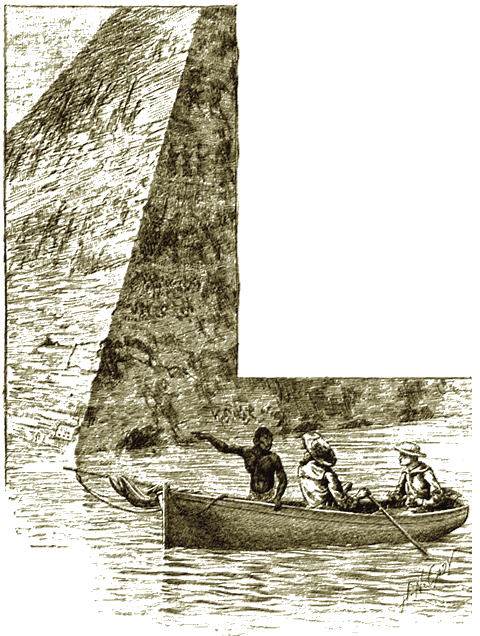
As the boat drew nearer, the curiosity of the friends changed to downright amazement. Neither Ben nor Rollin had ever seen anything like it, and both gazed at it with feelings akin to awe.
"Well," said Ben, drawing a deep breath, "the Commander Aloft, who set up that big stone here alone in the wilderness, knows what he meant it for, I don't."
"Ben," replied Rollin in some excitement, "that is not a natural rock. See its shape, and look! there are carvings all over it. I can make them out plainly now. There are images of men, horses and chariots, and something like letters."
The boy was right. The whole of the immense sloping face of the pyramid which was turned toward the river where the boat lay, was covered with a maze of figures, carved in the dense, black rock. At intervals were cut strange characters, evidently the letters of some unknown and probably long extinct language. Its top was flat and in the side were traces of steps leading up to it, crumbled and decayed by the action of the weather. Shaped from what had once been a huge natural hill of rock, it had no doubt served as an altar or watch-tower of some ancient race occupying the now solitary desert. Many centuries must have elapsed since its completion, for that portion of its base which faced the river was worn into caverns and hollows by the washing of the water against it.
"Ah," said Rollin, looking at it with a grave face, "if we could but read those inscriptions we might perhaps solve the mystery of Oo this very hour."
AFTER gazing at the strange monument for a long while, the travellers prepared to resume their journey. But they found themselves suddenly confronted by a perplexing difficulty. Just beyond the great pyramid they discovered that the river divided itself into two branches, or more properly was joined by another stream, flowing into it from the southwest along the base of the pyramid, which thus stood upon the angle formed by the joining streams.
The main stream, which continued its course to the southeast, became broader and shallower beyond the point of junction, while the branch, though narrow, appeared to be deep. Which should they take?
They might well hesitate in their choice, for a false step now might prove the ruin of their hopes, and perhaps lead them astray in the midst of an impassable desert, to die of hunger and thirst. In any case a portion of the distance must be made on foot, but every mile gained by water would be so much taken from the dangers and difficulties of an overland journey.
"This here," observed Ben, "is one of them situations where guessing takes the place of matthewmatics. It's sailing in the dark without a compass. The right hand may be the wrong hand and the left hand the right hand, d'ye see?"
Polly, to whom this philosophical observation was addressed, did not reply. He was gazing intently at some object on the face of the pyramid near the water's edge, a little distance beyond where the boat lay. Presently he raised his hand and pointed to it, as he said.
"What that on rock? Man been here. Go see. Maybe talking stone. Tell us something we want to know."
The object which the keen eyes of the savage had detected was the figure of a rude square, within which seemed to be something like modern letters. It was very faint and the occupants of the boat were too far off to make out its character. A few strokes of the oars brought the Huzza opposite the spot, and a simultaneous cry from the boy and the sailor announced a discovery.
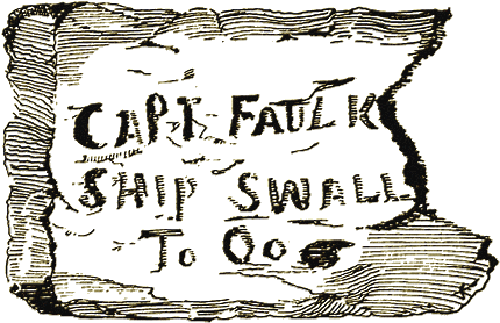
"Oh Ben, Ben! can it be possible, or am I deceiving myself because I wish it to be true?" Rollin grasped his friend's hand and trembled violently.
"It is there lad, plain as letters can make it," said the sailor, in a hushed voice. "After all, my boy, it is only what you prophesied yourself, d'ye see?"
"My father! alive! Oh Ben, alive! and I shall see him again?"
"Alive, I hope so," said the sailor gravely. "He was then, at any rate, and bound for Oo, besides."
Passing his hand before his eyes to clear away the tears which had gathered in them, Rollin made out the following inscription, half effaced but full of significance to him. "Oh Ben!" cried the boy. "It seems almost as if he knew that we would follow him, and meant to show us the proper course. See the pointing hand!"
"True," replied the sailor; "to tell you the honest fact, lad, I had some doubts both about your father's escape from Chadwick's hands and about there being any such thing as Oo at all. But that there knocks them higher than the main top-mast truck."
"We shall find Oo and my father," reiterated Rollin, his face beaming with renewed hope.
"With the help of the Master Aloft," responded Ben, "a stout heart and a stiff upper lip, we shall find them both, my boy."
"Let us go then," exclaimed Rollin, seizing the oars and rowing vigorously.
The hand upon the rock pointed to the right, that is, up the inflowing branch. The boat was therefore turned unto it, heading southwest.
The stream was so narrow that there was barely room for the spread of the oars, but on sounding with a line, Ben found full twenty feet of water below them. Excited by renewed hope, the travellers pushed on, working from dawn till dark and hardly allowing themselves sufficient time to eat their meals.
Their progress was greatly retarded by numerous obstacles. Sometimes the stream grew so contracted that the oars could not be used and they had to resort to pushing the boat along with poles. Again a sudden sharp bend would require their united strength to get her around it. On the sixth day the stream suddenly expanded again into a broad, shallow lake of considerable extent. Here their difficulties redoubled; for in most places the water was not six inches deep, and the channel, itself seldom over two feet deep, pursued a tortuous and winding course which taxed the vigilance and energies of the friends to the utmost.
So slowly did they proceed that at noon of the fourth day, when the occupants of the boat paused for a brief interval of rest and refreshment, they had made only about half the distance from the lower to the upper end of the lake, that is to say nearly ten miles, leaving as many more yet to be accomplished.
The lake at this point was perhaps two miles wide, and that part of the channel where the boat lay about equidistant from either shore. The landscape was still flat and arid, without trees or vegetation; but far to the southward, and nearly invisible in the shimmering of the heated air arising from the sun-scorched desert, the faint purple outline of a range of low-lying hills appeared.
While Rollin reposed with his head upon the gunwale, and Ben lay smoking under the shelter of their awning of sailcloth, they were aroused by a sudden exclamation from Polly. The native had arisen to his knees and appeared to be listening intently, with a startled look upon his dark features.
"Hark!" he said, lifting one hand to impose silence. "Something coming. Don't know what, but don't like the sound of him."
"Yes," added Rollin, "I hear it too. A strange, low, hollow rumbling."
"It can't be thunder," said Ben, "there is not a cloud to be seen."
"No," replied Polly, "not thunder. Thunder in sky, this on ground."
"It is more like the tramp of an army of feet, or the roll of thousands of heavy wagon wheels," observed Ben.
"Perhaps it's an earthquake," suggested the boy.
"No, it's not like an earthquake," replied the sailor, "I've heard too many of them to be mistaken. When I was in Sarawak in—let me see—eighteen hundred and—"
"It is coming closer," interrupted Rollin; "the air seems to shake and quiver. What can it be? I never heard anything like it before."
"Nor I," admitted the sailor; "and to tell you the truth, I don't like the sound of it, either. Do you see anything, Polly?"
"Ha!" exclaimed Polly, suddenly, pointing toward the upper end of the lake. "What's that?"
"I see nothing," said Rollin.
"I do." responded Ben. "A thin brownish line, close down upon the surface of the water, like a cloud of dust or a bank of fog. Is that what you mean, Polly?"
Polly nodded. "See! getting bigger."
"What can it be?" said Rollin, anxiously. "I see it now, spreading across the whole width of the lake. And look, Ben, look! the water is leaving us! It seems to be running to meet it."
"Up with that anchor!" shouted Ben, springing to his feet and seizing the oars. "Take the helm, boy! Look alive there, Polly! stow that awning and come aft. Quick, now!"
The sailor's authoritative tones, while they foretold imminent danger, inspired Rollin and the native with new courage and presence of mind. His orders were promptly and effectively obeyed. In the face of a peril which he now began to comprehend, the old seaman's coolness and skill returned to him, and he prepared to meet it with the best means at his command.
"Ben," said Rollin, from his seat at the helm, "what is going to happen?"
"Trouble," replied the sailor, quietly; "the whole lake is rising."
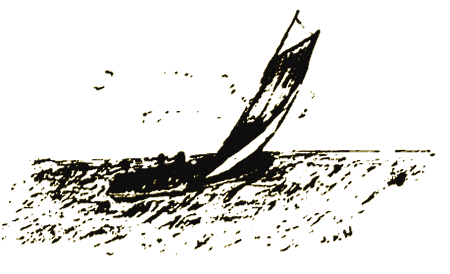
A SINGULAR characteristic of Australian lakes and watercourses is their sudden and unaccountable rise and fall. Good-sized rivers have been known to disappear completely, and dry channels have been filled with a deep swift current, in the space of a few minutes. This strange phenomenon has never been satisfactorily explained, though it is probably due to the sudden bursting out or subsidence of subterranean springs.
One of these sudden overflowings of the shallow lake, in the form of a great wave, was what had alarmed the travellers. The shock of so vast a volume of water, moving at a tremendous rate of speed, might easily overwhelm and crush their frail vessel; and they sat watching its approach with anxious eyes and compressed lips. Their only hope of escape was in keeping the bow of the boat directed toward the line of advance of the wave, and assisting it to mount upon it as it struck them. If the boat should meet it broadside on or fail to rise in time, she would be capsized in an instant or broken to pieces under the weight of the water.
The roar of the inundation had now swelled into a noise like the continuous discharge of cannon. The friends could see the great wave, stretching across the lake from shore to shore, and about the height of a man's head, rolling toward them, curling over in brownish foam at the top and seeming to suck up the water of the lake as it came on.
"Keep her head on! Keep her head on!" shouted Ben, above the wild uproar of the water. "Its our only chance. Mind what you're about, now."
"Here it comes!" cried Rollin, as the great wave loomed over their heads. The next instant they were engulfed in a torrent of foaming, thundering water.
The boat had fallen off a little under the influence of the under-current; and as the billow struck her, she failed to rise to it. The weight of the water seemed to hold her fast, while it poured over her in tons.
"Starboard oar!" shrieked Rollin, "starboard, or we are lost!"
He threw his weight upon the helm, and at the same time Ben put the whole power of his arm into the oar. Still she hung fast; and now as the full force of the wave descended upon her, an ominous cracking sound was heard. She was about to part and fall to pieces. At this juncture, Polly sprang forward, plunging waist-deep through the water, and grasping the oar which Ben held, below the sailor's hand, added his strength to the pull for life.
For a moment their destruction seemed inevitable. Rollin caught a glimpse of the native's naked shoulders, bowed over the oar, and of the sailor's white face and set teeth; then he felt the boat slowly yielding to the double pressure.
"She rises! she rises!" he shouted, through the rushing, tumbling current. As if endowed with life, the boat trembled all along her stout frame; her bows lifted and she shot upward and lay rocking upon the wildly agitated surface.
"Close squeak, that," observed Polly, coolly rubbing the water out of his eyes. "Drunk nuff water to last a month."
The three friends looked around them, hardly able to believe in their safety after the terrible danger which they had just passed through. Far beyond them now, the yellow crest of the great wave was foaming on down the lake. The water around them seemed to be following it in a body, and it required hard rowing on the part of the seaman to prevent the boat from being borne along with the current. Presently one of the oars touched the bottom. Rollin, who was still steering, put the helm down promptly, but instantly the other oar grounded. There was no longer six inches of water remaining in the channel.
"That looks bad," said Ben, with a troubled expression; "after being swamped we shall be left high and dry. All the water seems to be leaving the lake."
Even as he spoke, there was a heavy jar and the boat came to an abrupt halt, with her keel on the bottom.
"Well, here is a go," observed Polly, looking over the side. "Huzza lie down in mud to sleep, like a tired dingo."
The water continued to recede until the bottom became visible in knolls and hillocks surrounded by shallow pools. In the channel where the boat lay, the depth was insufficient to float her and she tilted over at an angle and settled down into the thick, bubbling ooze. In the course of half an hour more, where a large lake had been, now was a broad flat of sand and mud, with a small rivulet trickling through the midst of it where the former channel had been.
"Well, this is a country for natural curiosities," said Ben, with a blank look at his two companions. "Who ever heard of a lake spilling out like soup out of a wooden platter? What are we to do now?"
"Take to the land," responded Rollin, promptly, "as we should have been compelled to do in any case in a very short time."
Ben made a wry face. "Perhaps the water will come back if we wait a while. Maybe it has only gone to pay an afternoon call and will be back in time for tea."
"No, I think not," replied the boy, thoughtfully; "I doubt if we should see it again, if we waited here a month. No, no, Ben, we must prepare to travel on foot; and the sooner we begin, the better."
"I suppose you are right, lad." replied the sailor. "I shall be sorry to leave the poor little Huzza to bleach her ribs in this mud-hole. Jump out, Polly, and give her a shove to straighten her up. She leans like a cutter in a gale."
The savage obeyed, but no sooner had his feet touched the earth than he uttered a cry of fear. The two friends turned about, unable to comprehend the cause of his alarm.
"I am going down!" he exclaimed, "the earth is swallowing me up. Help! help!"
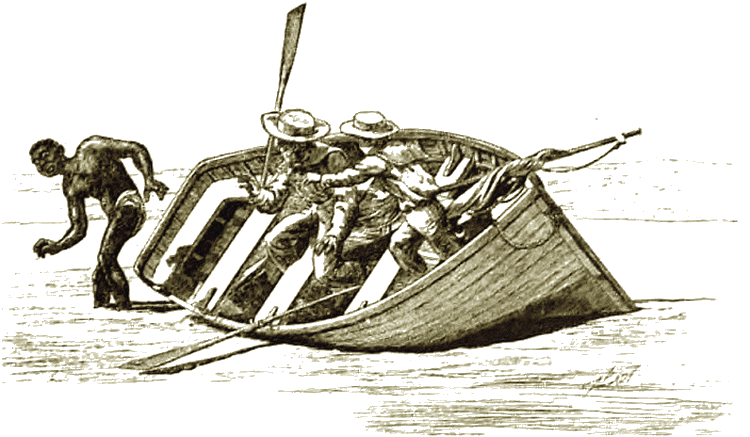
The spot where he stood was a patch of smooth, dark-colored sand, apparently dry and firm. But he had already sunk to his knees and was visibly going down, inch by inch, before their eyes, in spite of his frantic efforts. "A quicksand!" cried Rollin, seizing the native by the arm. "Hurry, Ben, or we shall never get him out."
The sailor hastened to his side and caught Polly by the other arm. But so tenacious of its hold was the treacherous sand that their united strength nearly dislocated the poor fellow's shoulders without releasing him.
"Pull, Ben, pull," shouted the boy, "while I dig. Keep up your courage, Polly; we will get you out."
And seizing an oar he began to dig the sand away from the native's legs with the blade. But as fast as he dug, the sand slid back; and it was only after ten minutes of furious labor that the prisoner was liberated and lifted into the boat Then all three sat down panting and looked at each other.
"Well, shipmate," said the sailor, addressing Polly, "the next time you start for China, I advise you to make the voyage on top of the earth, not through it."
"He! he!" laughed the native, faintly, not yet recovered from the shock of his adventure.
"We may all have to go that way for aught I know," interposed Rollin, who was examining the bottom on the opposite side of the boat. "See, here is another quicksand."
He pointed to a small piece of wood which he had thrown a few feet distant. It sank out of sight while they were looking at it.
"Look again," he added, placing another fragment of wood near the stern of the boat. In less than three minutes, that too had disappeared.
"Try farther away from the boat," said Ben, in a voice which he tried in vain to render firm. "If it is only a narrow belt, we can find some means of crossing it."
There was a piece of iron in the boat with a line attached, which had been used as a stern-anchor. The sailor himself seized this and threw it as far as the line would permit. It fell upon a seemingly firm spot, thirty feet distant The three friends watched it with eager eyes and suppressed breathing.
"It is going down!" cried the boy, in alarm.
"Yes," replied Ben, with a sigh, "it certainly is."
It was but too true. As if drawn downward by an invisible hand, the piece of iron descended imperceptibly yet steadily, until only the upper edge remained in sight; then that too was gone and the sand closed over it, smooth and deceptive as before.
"We are hemmed in," said Rollin, in a low voice; "the whole lake bottom is one great trap. Now I know why my father called it the 'Dead Lake' on his chart."
The travellers scanned the surrounding plain with fearful, questioning glances. Everywhere the same unvarying expanse of dark grayish sand met their gaze, with its treacherously smooth, solid-looking surface—a veritable plain of death. As Rollin had said, the whole lake bottom was one great trap. To trust themselves anywhere upon it for a single moment would be fatal; for they would be seized upon and swallowed up, as some huge animal swallows its helpless prey. Indeed, as they continued to gaze around them, bewildered and nerveless, they fell as if some hungry monster were watching them, waiting for the hour to come when they must yield themselves victims to it. This feeling was intensified by a curious quaking or undulation in the sand, from time to time, dreadful to behold, as if some living thing were struggling under the surface.
"Come," said Rollin, after they had all thus sat for many minutes, silent and fascinated, "we must do something."
"We are safe here at all events," replied Ben. "If worse came to worst, we have provisions enough to last for a long time, and there is water enough to drink at hand. That ugly sand can't swallow the boat, at least."
"Yes."
The single monosyllable, spoken in a tone in which terror struggled with wonder, came from Polly.
The two friends turned toward him quickly. He was lying in his former position, with his head over the side of the boat.
"What the mischief do you mean?" queried Ben, sharply.
"Sand can't swallow boat, eh?" said the native, with a significant gesture. "May stick in his throat, but swallow it all the same. Look here."
Ben and Rollin knelt down and looked over the side with the native. The boat lay with four inches of her bottom buried in the sand. Polly had made a mark upon her side a short distance above the level of the soil.
"Look sharp," said he. The two friends fixed their eyes upon the mark and remained silent. Ten minutes passed slowly away; then Rollin raised his head and looked at Ben. The sailor's glance met his own and both turned very pale.
"Yes," muttered the sailor, "it is so."
"The boat is slowing sinking," gasped the boy.
The sailor bowed his head upon his hand and made no reply.
The mark which Polly had made upon the side of the boat was originally about two inches above the sand. In the ten minutes during which they had watched it, the sand had crept half way up to it. When a short time afterward, Rollin looked over the side again, the mark was just disappearing from sight. Since the native had called their attention to the new danger, therefore, the boat had sunk two inches.
Of all the perils which they had encountered during their hazardous journey, this seemed the most terrible and the most hopeless. Surrounded on every side by an impassable barrier, they must sit helpless and inert, while the horrible sand slowly drew them into its fatal depths. To wait thus, feeling themselves being deliberately swallowed up, inch by inch, unable to resist or to make use of their strength and courage—to watch the slow approach of a dreadful death, and be unable to lift a hand to oppose it—is more than human nature can bear.
What wonder, then, that the poor boy sat trembling, with drooping head and white face, while Ben covered his eyes with his hand, and the native cast quick, terrified glances around him like a hunted animal? But it was Rollin who broke the despairing silence first.
"Ben," said he, abruptly, "are you going to sit here and go down with this boat, without trying to do anything to save yourself?"
The sailor raised his heavy eyes and looked at him inquiringly.
"What do you mean?" he asked in a low, broken voice.
"I mean," answered Rollin, "that we ought to be ashamed of ourselves to yield in this way, without a stroke in our own defense. We have been in as bad situations as this is before, and we have come out of them alive. We shall get out of this if we only try."
"How?" inquired Ben, arousing himself, while the savage crept nearer to listen.
"I have a plan," said the boy. "I am not sure it will succeed, but it is at least worth trying."
"Good; let us hear it."
"But first, how much time have we left?"
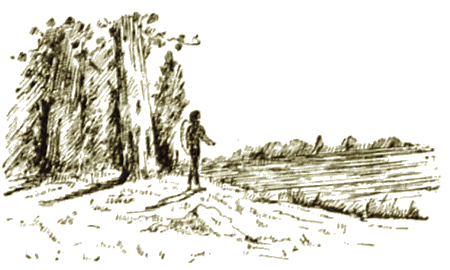
"HOW much time have we?" repeated Rollin.
Ben shook his head. "That is more than I can tell you." he replied. "It is eating us at its leisure, like an admiral at a state dinner."
"You saw that we sank the first inch in ten minutes," said Rollin. "I observed the second inch took nearly fifteen minutes to go down. As the boat sinks, she presents a wider surface, and hence a greater resistance to the sand. I think we can count upon three hours. That will be more than enough."
"Well," said Ben, "what do you propose to do?"
"I spent a winter in Maine when I was quite a small boy," replied Rollin, "and while there I often saw the snow lying five feet deep on the ground. Now until it partly thawed and froze again, making a hard, stiff crust, you could no more walk upon it than upon this sand. Yet the people there used to travel miles over it, without trouble and without sinking into it an inch."
"How did they do it?" asked Ben.
"With snowshoes," replied the boy.
"Ah, yes, I have heard of them," said the sailor, "though I never saw any, and you think—"
"Yes," returned Rollin, "I am sure something like snowshoes would do, if we can make them."
"But how will you make them here, lad?"
"We have tools and I know how to use them. They need not be like real snowshoes. J shall take the thwarts of the boat and split them into two halves with the saw, making two pieces, each a foot broad, three feet long and half an inch thick. I am sure these will sustain us if we keep moving all the time."
"I believe you are right," cried the sailor. "We shall get out of this scrape after all!"
"Now, Ben," said Rollin, who was already at work, "you and Polly look through our stores and pack up what we most need into three bundles, one for each of us, ready for the start. We must lose no time."
The three friends went to work with a vigor proportioned to the emergency. In less than an hour Rollin had prepared six thin planks, rounded in front and sloping backward in a long egg-shaped oval. He then drilled two holes in each piece and passed a small loop of strong line through them, to attach his improvised snowshoes, or, as he called them, "sandshoes," to the foot. By the time he had completed his task, Ben and Polly had gathered together such of their possessions as were most necessary for their overland journey. The keg containing five gallons of water and a drinking-cup were fastened upon Polly's shoulders, the other articles were made into bundles covered with pieces of canvas and strongly corded. Ben and Rollin strapped their revolvers to their waists and prepared to carry their rifles in their hands.
When their arrangements were complete, nearly two hours had passed. The friends had been so busily engaged in their work that they had paid little attention to the encroachment of the sand. Now when they paused and looked about them, they uttered a simultaneous cry of alarm. The boat had sunk to within three inches of her gunwales. They hurriedly fastened on their sandshoes and shouldered their packs. This had hardly been accomplished when one of the planks snapped with a loud crash, and the sand poured into the boat in a swift stream.
"Come," said Rollin, with a look of determination, "we have but one chance; we must try it. All depends upon our sandshoes now. I will go first."
He stepped boldly upon the quaking sand. The broad surfaces of the planks bore him up well; without them he would have sunk to his ankles in an instant. He was followed by Ben and Polly in turn, and the three friends set out upon their perilous journey. They had not proceeded ten yards when there was loud explosion behind them. The frame of the boat had fallen in; when they turned to look at her the points of her rowlocks were just disappearing beneath the dark surface of the sand.
It was necessary for them to keep in constant motion, for if they paused a moment, despite the resistance of the broad soles of their sandshoes, they began to sink immediately, and it required all their strength to free themselves from even the thinnest stratum of the sand.
With their utmost exertion they could not proceed faster than a slow walk. There was a peculiar adhesive quality about the sand, which seemed to hold them fast as by a powerful vacuum. Each step was a dead lift; their feet felt as if made of lead. Before half the distance was accomplished, all three were exhausted. The perspiration streamed from their bodies, their breath came in painful gasps, and the blood beat in their temples until it seemed as if they must fall prostrate with sheer dizziness. Yet they dared not pause an instant to rest—they must keep on or die.
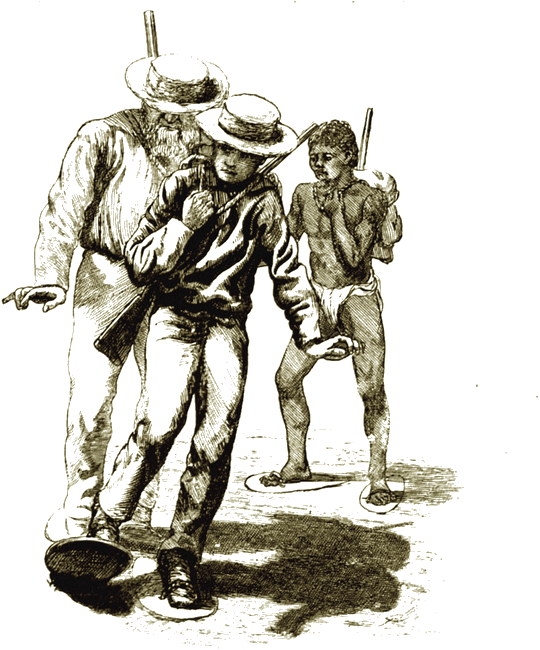
Reeling and staggering under their heavy burdens, dragging their feet painfully after them, they labored slowly on. They had accomplished the best part of the journey and were only a quarter of a mile from the bank of the lake, when Rollin's strength gave way and with a groan, he sank to his knees.
"Go on," he panted, "save yourselves. I cannot take another step. Good-bye, Ben; good-bye, Polly."
The sailor, who had advanced a few steps before missing the boy, turned about, with a loud cry, and staggering back to where he knelt already submerged to his thighs, seized him about the waist, and literally tore him out of the sand. Lifting him, with his burden still fastened to his shoulders, in his strong arms, the sailor continued his painful journey.
Lying with his head against his friend's broad chest, the boy could hear the thick beating of the sailor's heart and the hoarse sound of his choked breathing.
"O Ben," he gasped, "you are killing yourself for me."
Ben made no reply, but in his wildly straining eyes and the thick knotted cords of his neck Rollin could see the superhuman efforts he was making. At length Polly, who was a few feet in advance, reached the firm earth and threw himself at full length on the ground. With the last sparks of his expiring strength, the sailor toiled on and, gaining the bank of the lake in turn, rolled helplessly upon the ground, with the boy still clasped in his arms.
For ten minutes neither of the friends uttered a word, but lay mute and motionless, blind, sick, and fainting from the effects of their terrible journey across the quaking sands. Rollin was the first to recover the power of speech. Taking the sailors hands in his own, while the tears filled his eyes, he said,
"I have often had to thank you during this trip, Ben, for what you have done for me. Now I have no words to tell you what I feel. But you know how grateful, how very grateful, I am to you for this; do you not, my dear friend?"
"Yes, lad," replied the sailor, feebly, "it was nothing."
"Nothing!" repeated Rollin, "and you were near dying for me, Ben."
"Yes," said the old seaman, simply; "but if I had lost you, should I have cared to live, do you think?"
Rollin turned away his face to hide his swimming eyes.
"After all," put in Polly, slowly arising to a sitting posture, "if Rollin not make sandshoes, where we be anyhow?"
"You are right," said Ben; "we owe our escape from that horrible place to the lad's wit. So you see, my boy, if gratitude is owing to anybody, it is to you for saving all our lives."
"Oh well," responded Rollin, gayly, "if you insist upon it, I agree. Only don't expect me to look like a universal benefactor until I have had something to eat. For to tell you the truth, what, with the scare and the hard work, I am frightfully hungry."
As it was now near sunset and they could expect to make but little progress before dark, and as, besides, they were all greatly exhausted, they decided to camp where they were for the night. A fire was built, a pair of Rollin's sandshoes furnishing the fuel, and such food as they had prepared.
When they had finished, and Ben had lighted his pipe, the three friends, lying in comfortable positions in the warm, dry sand of the desert, fell to discussing their plans for the future. By striking due south across the plain, steering their course by the compass which Ben carried, they ought, in time, to reach the region where, according to Rollin's map, Oo should be found—if indeed it existed at all except in the imagination of the natives from whom Captain Faulkner had gathered his information. But in proportion to their progress, that doubt had grown fainter, until now even Ben, who, as we know, had been originally somewhat skeptical, was full of hope and confidence.
"Take care, Ben," said Rollin, laughing, "don't count your chickens, you know."
"They are hatching, lad; they are hatching over yonder."
He pointed to the southward, where the wide expanse of the desert stretched away to the dusk azure of the sky, now sprinkled with large stars, as bright and as golden as their hopes and dreams of Oo, in that unknown region of mystery, far off behind the hills.
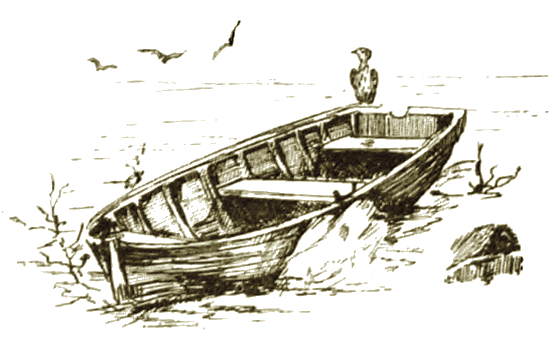
AT sunrise on the following morning the travellers took up their march across the desert. Their way lay over a perfectly barren plain, level as the floor of a house and composed of loose, dry, red sand. During the whole of that day and the three following, the country preserved the same unvarying lifeless character. Not so much as an insect or a blade of grass was to be seen. The heat was appalling; not the faintest wisp of cloud tempered the blazing sky. The sun rose and set, a dazzling ball of keen golden fire. The very atmosphere seemed to be scorched like that of a heated oven.
So great were their sufferings that shortly after midday they were compelled to halt. They managed to construct a miserable awning out of the pieces of sail-cloth which covered their packages. Beneath this they crept, gasping and almost fainting from the awful heat. Their supply of water proved a wise foresight, for not a drop was to be found in all that burnt-up region. Without it they must have perished during the first twenty-four hours. The only difficulty was that they had not brought half enough, for though they had husbanded every drop with the most anxious care, at nightfall of the first day's journey, the keg was half empty.
They remained under the imperfect shelter of their awning, dozing and half stupefied, until sunset, when they resumed their march. With the darkness a slight coolness descended upon the desert. The constellation of the Southern Cross shone clear and bright above the horizon; and by keeping this brilliant object before them, they knew that they should be pursuing the right course.
At midnight they halted and, throwing themselves upon the sand, slept uneasily until dawn, when they arose, and, after eating sparingly and with small appetite, swallowed each a small quantity of water and resumed their march.
On this day their progress was slower and their sufferings increased tenfold. They were already worn out with hardship and the fever of thirst and heat. At two hours before noon they were compelled to pause and erect their awning. Sparingly as they had used their supply of water, hardly two quarts remained. With their lips cracked and bleeding and their throats dry and husky, they could hardly forbear swallowing the whole at a draught.
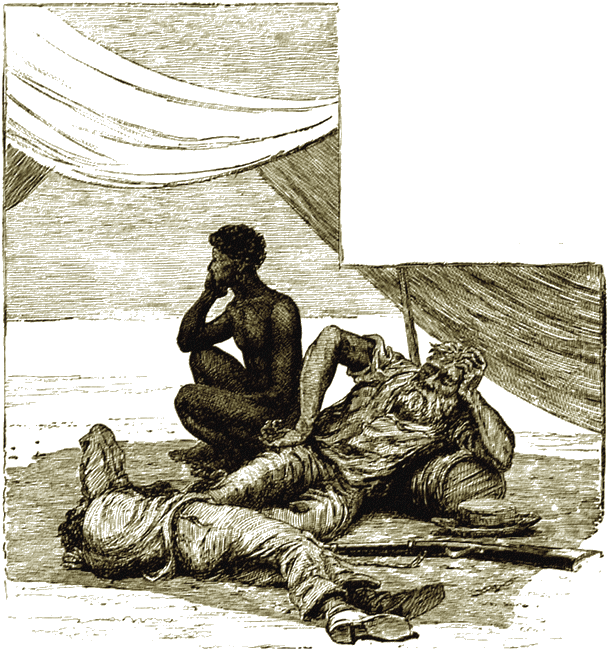
Crouched in the sand, burning hot even in the shadow of the tent, the three friends sat in dogged silence, inhaling the stifling air in suffocating gasps, until at length Polly threw himself down and fell into a doze. Shortly afterward Ben followed his example, and Rollin, who was too miserable to sleep, remained alone with his thoughts. Suffering had conquered hope in his brave young heart. Could he have closed his eyes, like the other two, with the certainty that he should never wake again, how gratefully he would have done it. His wandering gaze rested upon the keg which contained what remained of the water. He touched it with his foot and the sound of the fluid maddened him. He had already drunk his portion, but—His two friends were asleep and they would never miss a single cupful. He stretched out his hand and cautiously filled the tin cup. He raised it to his lips; then he hesitated and looked at Ben with a shrinking, guilty glance. The sailor's upturned face was pale and drawn with pain, and he moaned feebly in his sleep. No, no, he could not drink the water now. He drew the plug out of the keg and carefully poured back every drop.
At sunset they divided the last of the water, and, resuming their burdens, continued their journey with despairing hearts and feeble steps. Neither of the friends cherished the faintest hope of escape from that implacable region; and if they still toiled on, it was in obedience to that instinct which leads men to maintain the struggle for life while the last spark of strength remains.
The moon rose shortly after dark, casting a pale, tender glamor over the desert, lending it a strange sombre beauty which, even in the midst of their suffering, powerfully affected the hearts of the travellers, already full to overflowing with sad and solemn emotions. Toiling on, with wild eyes and ghastly faces, silent except for a low moan of pain from one or the other at intervals, they came at midnight to the first broken ground they had encountered since leaving the boat. It appeared to have been an ancient watercourse, though its bed was now filled with dry, powdery dust. As far as they were able to judge, the country beyond was undulating and furrowed with shallow valleys and small, irregular hillocks—a sign that they were approaching the limits of the great desert.
The wretched travellers felt that their powers were rapidly giving way. They kept their feet only by the exercise of almost superhuman determination. Their swollen tongues protruded from their scorched lips; agonizing pains shot through their temples; their bodies were covered with a cold sweat; a fiery mist obscured their sight, and strange, stunning noises roared in their ears.
"Water! water! oh for but one drop of water!"
It was poor Rollin who uttered this moan as he staggered on between his two older companions. But there was no more water; the keg, which Polly still bore upon his shoulders, was empty and dry.
Thus the dreadful night wore away and the first gleams of approaching dawn appeared in the east when Rollin, who had walked for the last hour supported by the arm of the sailor, suddenly fell to the earth. He could go no farther. With his head upon the sand and his arms lying helplessly at his side, he closed his eyes and sank into insensibility.
He was aroused by a sensation of delicious coolness in his throat.
"Water!" he murmured faintly.
"Hush," whispered the sailor, who was bending over him and holding a small flask to his lips, "Drink!"
The boy swallowed the water eagerly. Warm and insipid as it was, he had never tasted a draught so sweet before. There was but little of it, but it seemed to restore his failing energies at once.
"Where did you get it, Ben?" he asked, raising himself to a sitting position.
"Hush," repeated the sailor, glancing at Polly, who sat at a little distance with his head between his hands. "When we divided the last of the water I saved my share."
"For me," said Rollin, gratefully.
"I knew you would need it," replied Ben, simply.
"And you," said the boy, gazing at his friend, whose sunken features and hollow eves told how dreadful his own sufferings had been. "You denied yourself at a time when we were all nearly mad with thirst, that I might have it now. O Ben—" the remembrance of his selfish temptation on the previous day choked his voice.
"You were the smallest and weakest," replied the sailor, with a sad smile upon his haggard face. "I did not miss it; I am stronger than you."
His reeling step and shaking limbs belied his words.
Rollin drew one of his friends coarse, rough hands to him and kissed it.
"One in Whose presence we shall all shortly stand," he said solemnly, "has seen what you have done. He will reward you, dear Ben, as I never could."
Day was now breaking over the desert, illuminating the waste of sand with a flood of primrose light. In spite of their sufferings they had travelled nearly twenty miles during that terrible night. The hills toward which they were journeying now appeared to be less than that distance away. One day's journey only lay between them and safely, but, alas! with their strength exhausted and thirst devouring their vitals, they could go no farther.
Sitting with his head upon his knees, poor Polly had fallen into a painful slumber. The approach of the sailor, who, alarmed at his silence, feared that he was already dead, caused him to raise his face and look vaguely around him. Suddenly his eyes became fixed upon a point in the desert immediately in front of them. Their dull, listless stare had given place to the sudden brightness of renewing hope. He arose to his feet, with a low, hoarse cry: "Water! water!" he stretched out his hand, and pointing to the spot at which he had been gazing, "plenty of water."
"Where?" asked Ben. "I see nothing but dry sand."
"No see it because under ground," replied the native. "Must dig it up."
"Perhaps he is right after all," said Rollin. "Wild people find both food and water where white men would starve and die."
The spot which Polly had pointed out was a sandy hollow about two miles distant. Two or three withered and nearly leafless trees, the first signs of vegetable life which they had seen in the desert thus far, stood close together with their roots in the dry soil; but not the smallest drop of water nor the faintest trace of moisture was visible anywhere.
"Come," said Polly, appealingly, seeing their hesitation, "why die here like sick dingo, when water over there?"
The two friends yielded and, arising to their feet, followed him, dragging themselves along with slow and painful steps. It took them more than two hours to reach the spot; and when at length they fell, overcome, at the foot of the trees, they lay speechless and helpless for many minutes.
Ben was the first to recover. Glaring at the native with eyes in which the fire of incipient insanity glittered, he muttered hoarsely,
"Where is the water? Woe to you if you have deceived us."
Without replying, Polly crawled upon his hands and knees to a spot about ten feet distant from the base of one of the trees and began digging with one of the hunting-knives which he carried. Ben and Rollin watched his movements with indescribable anxiety.
In a short time the native uncovered a thick, fleshy-looking root, a section of which he cut off and drew out. He then scraped off the adhering soil and stood the piece of root upright in a tin vessel. In a few moments drops of a clear, colorless fluid began to ooze from it, followed by a copious flow. Tasting it, Rollin found it to be pure water, quite cold and with a slightly sweetish flavor.
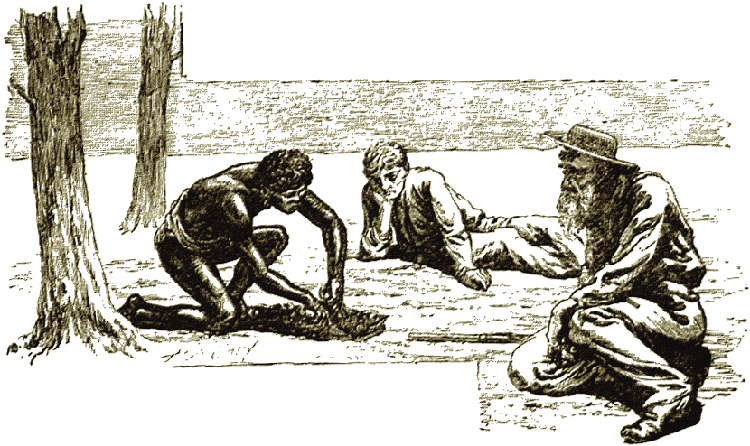
"It is real water," he said, addressing Ben, in a barely audible voice; "we are saved!"
Meanwhile the native had continued to dig, and soon had a dozen pieces of the root pouring their life-giving sap into the pail. So abundant was the supply that in fifteen minutes the thirsting travellers divided two quarts between them. It was swallowed almost at a draught. How inexpressibly delicious and grateful it was! How life itself, fluttering low in the socket, seemed to spring anew in their veins as they drank! Poor creatures! they could have wept for very joy. The reaction from the agonies which had tortured them for so many hours was almost too much for their enfeebled bodies to bear. Rollin laughed aloud; Ben sang a verse of a sea song, which he interrupted to give Polly a hearty hug.
When they had become a little calmer, all three set to work to help Polly provide more of the water-giving roots, which are those of a certain well-known gum-tree common to some portions of Australia. It grows in arid regions, and has the singular property of absorbing moisture from the earth and air, which its roots give back in the form of an abundant flow of water.
When they had drunk as much as they dared, which was not nearly as much as they craved, they placed the roots so as to drain into the keg, which was filled long before they were ready to start. They spent the rest of the day lying luxuriously in the shade of the gum-trees.
At dark, thoroughly refreshed and in high spirits, they shouldered their burdens and began their tramp toward the hills. Allowing themselves only a half-hour for rest at midnight, they pushed steadily on. The ground became more broken, a sparse growth of coarse grass covered the soil in patches, with here and there groups of stunted trees and bushes. An hour before dawn they found themselves in a belt of woods growing upon the lowermost ridges of the hills. The moon having set, and all three, feeling wearied with their rapid march, they camped beneath the shelter of a huge gum-tree, and, throwing themselves upon the thick turf, soon fell asleep.
On the following morning they ate their breakfast beside a clear spring of water bursting from a rock in the edge of the forest; then, after refilling Polly's keg, in case of need, they resumed their march. They had taken but a few steps when the native, who was in advance, paused abruptly and bent down to scrutinize something which had attracted his attention. Rollin and Ben hastened to join him.
"A human footstep," cried the boy, in a startled tone.
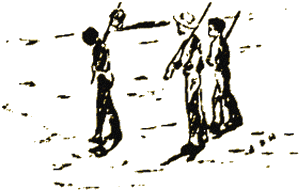
A HUMAN footprint is always a disquieting sign to those who travel in an unknown country. "In the desert," says the Arab proverb, "the stranger is always an enemy." Thus far the friends had met only with hostility and hatred on the part of the savage inhabitants of the wilderness which they had traversed; and they had no reason to look for a more peaceable disposition among the people of the region they were about to enter.
There was a startling peculiarity about the track which Polly had discovered, which did not tend to allay their anxiety. It was not the print of a naked foot, but of a shoe, or rather a buskin or sandal, since the sole was very wide in proportion to its length, and without a heel. Its wearer was not, therefore, a savage, but a man at least partly civilized, whose superior intelligence and better weapons would make him an enemy more to be feared.
Australia, a great continent in itself, has been but partly explored. Of the vast region extending from 150 degrees to 163 degrees longitude west from Washington, and from 23 degrees to 30 degrees south latitude,—in other words a country nearly nine hundred miles wide and five hundred miles long,—almost nothing is known. Surrounded by nearly impassable deserts and guarded by ferocious tribes, it has hitherto baffled the attempts of explorers to penetrate it. With the exception of Captain Faulkner, if indeed he had been able to escape the perils which had so nearly destroyed our adventurers, Ben and Rollin were the first whites who had ever set foot within the borders of that mysterious land called in Rollings chart the Orbello Country.
In this immense tract, separated from the rest of the world,—like Timbuctoo, a populous city in the desert, regarded for centuries as a myth,—an unknown race of semi-civilized people might well exist. At all events the travellers resolved to proceed with the utmost caution, avoiding the inhabitants, if possible, until they could learn something of their character and disposition.
While Ben and Rollin had been talking in low tones, Polly had gone ahead a short distance. He had paused and was now beckoning them to join him. When they reached his side, he pointed silently to the ground at his feet.
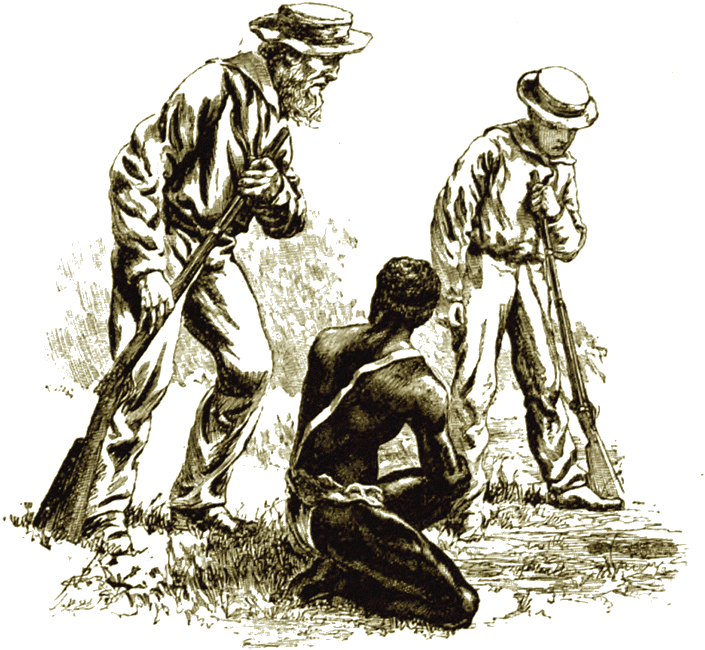
"More footsteps!" exclaimed the boy. "And see, Ben, how regularly they are placed side by side! What does that mean?"
"It means that a detachment of men, marching shoulder to shoulder, have passed here," replied Ben, kneeling to examine the marks. "Soldiers, in fact."
"Soldiers!" repeated Rollin.
"Who else would march in such perfect order! Look! the toes all point outward in a perfect line; two, four, six, eight abreast. Can you tell me, Polly, how many men have been here?"
Polly lifted both hands, with the fingers spread out, four times, then held up one finger.
"Forty-one men, eight abreast; and here, at one side of the main body, is the tread of a single man, the commander of the detachment."
"They cannot be savages," said Rollin, "for I have read that no real savages maintain anything like a true military formation. Perhaps they are white people, like ourselves."
"All the better; but I doubt it, lad. However, we shall know all about them soon enough. If we meet any of them, we must try and make friends with them."
"But suppose they refuse?" said the boy.
"So much the worse for them," replied Ben. "We haven't come thus far to be turned back."
"If want to be friends, be friends," said Polly, sententiously; "if want to fight, thrash them; that's all."
"Right, Polly," responded Rollin, laughing, "that is the situation in a nutshell. Peace if possible; war if we must."
They continued their march, with Polly acting as advance guard, keeping as much in the shelter of the trees as possible. The country through which they were passing was well wooded but open, the trees of great size, growing in scattered groups, with spaces of rolling meadow clothed, with thick, short turf, sprinkled with flowers. Flocks of parrots of gorgeous plumage swung upon the boughs of the trees, like clusters of variegated blossoms. Birds of paradise floated softly through the air, high above their heads, glittering in the rays of the morning sun. The wonderful lyre-bird scudded away through the dusky glades at their approach, like a cloud of dust driven before the wind.
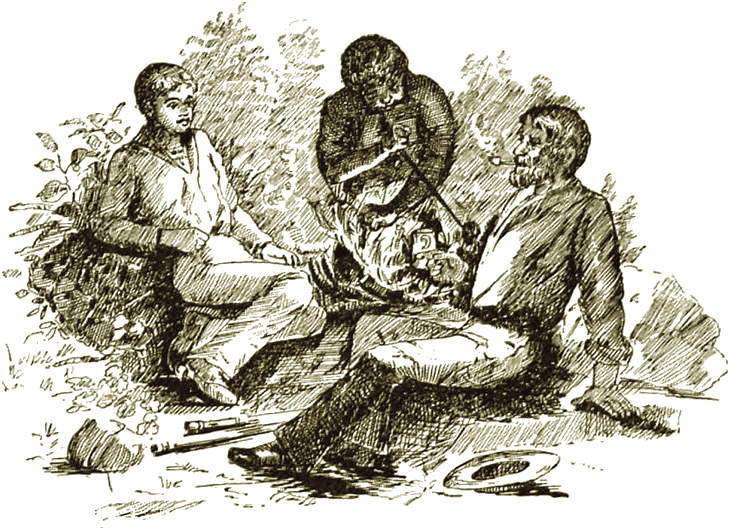
The travellers camped that night in a beautiful dell near a small stream. No further signs of inhabitants had been discovered during the day's march, but Polly took care to build their fire under the shelter of a tall rock, using only dry wood, which gave a clear flame and very little smoke. At dark the savage, who, since the discovery of the suspicious footsteps, had been unremitting in his watchfulness, pointed out a pale light upon the southern horizon. It was like the small arc of light made by a rising star, only much larger and of a reddish hue. The three friends stood gazing at the mysterious glow for a long while, without being able to determine its character.
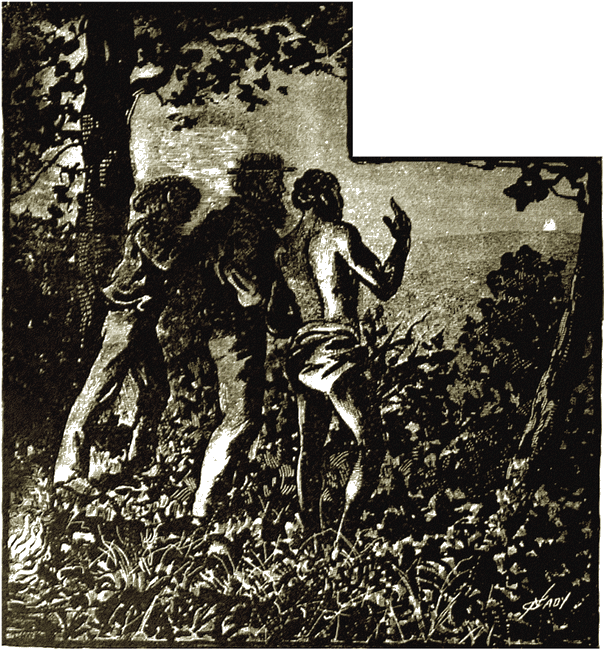
"Perhaps it is a camp-fire, like our own," suggested Ben.
"No," replied Polly, "too far off to see camp-fire."
"It looks like the lamp of a lighthouse just as it rises out of the sea," said Rollin; "don't you remember the light at Cape York. Ben? I thought it was a star rising when I first saw it."
"But what would a lighthouse be doing here, a thousand miles inland?" replied the sailor.
"Of course it is not a lighthouse. What I mean is that it must be upon some elevated place, or it would not be visible at such a distance."
"Perhaps burning mountain," suggested Polly; "have seen burning mountain once myself. Smoke like sixty; why not burn too?"
"A volcano in eruption!" exclaimed Rollin. "Why not? but no, for we should have seen the smoke during the day. Besides, it burns too clear and steady. No, it is not a volcano, Polly."
"It is not a light-house," said Ben, solemnly, "it is not a star, it is not a camp-fire, and it is not a wolcaner. What is it, then? For my part I don't like the looks of it. I am thinking the farther we steer from that booglish thing, the better it will be for us. That's my opinion, my lads, and you may have it for nothing."
The friends remained silent awhile, with their eves fixed upon the strange light; Polly and the sailor strongly affected by superstitious awe, and the boy endeavoring to find a solution of the mystery.
"Ben," said Rollin, suddenly, "how far distant should you say that light is?"
"Why," replied Ben, "if it is what it seems to be, a real, live, actual light, and not some ghostly, grisly invention of the imps of this here no-man's-land, got up for the purpose of leading us slap into some Davy Jones's den or other—"
"I thought Davy Jones lived only at the bottom of the sea," interrupted Rollin, rather impatiently.
"Well, why shouldn't he have a brother on land? I am sure there are lubbers enough to keep Davy Jones and all his family, clerks and all, busy. However, that's neither here nor there. If that is a light upon some high place, as you think, it may be a matter of fifty or sixty miles off."
"Three days' journey from Oo, then!" exclaimed Rollin.
"What do you mean, lad?" said the sailor, staring at him.
For answer Rollin took him by the arm and leading him to the camp-fire, which was still burning brightly, drew his chart from his pocket and placed his trembling forefinger upon it.
"What does that say?" he asked.
"The Burning Tower," read the sailor. "And you think—"
"The light of the Burning Tower is in sight," cried the boy, in great excitement. "It is all true, Ben! Oo exists! my father is there, and I shall find him."
He sat down upon the grass, his shaking limbs refusing to support him, and looked at Ben with dilating eyes.
"Well," said Ben, coolly, "that is what we came for; is it not, lad?"
"But the last doubt is gone now," replied Rollin. "The tower is there and Oo must be there!"
"And them dollars too," said Ben, with great seriousness. "Since the map is right in other respects, it is likely to be right about them as well."
Weary as he was, the boy slept little that night. Many times he raised himself upon his elbow and fixed his eyes upon the far-off horizon, where the mysterious light burned clear and bright, low down among the solemn stars.
They were afoot at dawn on the following morning. In his eagerness to be off, Rollin could hardly allow himself time to eat breakfast; and the more deliberate movements of his older companions wrought him up to a fever of impatience. They pushed rapidly forward during the forenoon and halted in the shadow of a rocky defile for a few moments of rest and refreshment. In arising to depart, Rolling's foot struck and dislodged a small fragment of quartz, partly buried in the sandy loam. A bright object beneath the stone attracted his attention and he stooped down to examine it. He uttered a cry of amazement.
"Ben, Polly!" he exclaimed, "see what I have found."
Polly glanced at it indifferently.
"Pooh!" said he, "yellow dirt. No good for nothing."
"It is gold," replied the boy, "real gold, and a large nugget, too. Why, it must weigh nearly a pound."
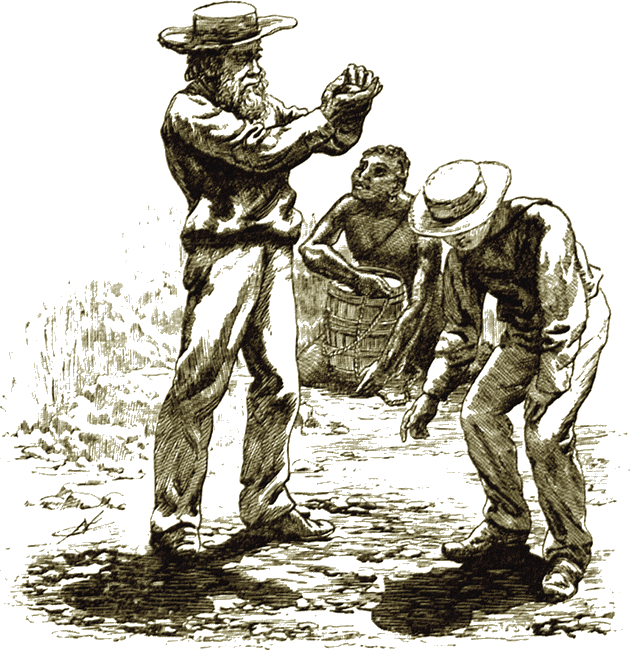
Ben stood staring at the precious lump with open mouth and eyes. He took the nugget in his hand and turned it over seriously.
"Look," said Rollin, "here it is, cropping out of the soil in every direction. The whole place is literally full of it. Why there must be hundreds of thousands of dollars worth here."
"And the whole of it is not worth as much to us now as that wild duck Polly is carrying upon his shoulder there," was the sailor's response, as he tossed the lump of metal aside. "Yes, yes, there it is, and enough of it to set the whole world fighting like a parcel of cats in a barrel, and, as Polly says, only yellow dirt after all."
They resumed their burdens and continued their march, turning their backs upon that vast but useless wealth, almost without a reluctant thought. They camped that night upon the edge of a cliff overlooking a wide extent of country. At dark the light, which they had seen upon the previous night, reappeared, still low upon the horizon and too far off for them to determine its character. While they were standing together, looking at it, Polly pointed out another light, or rather collection of lights, some miles distant in the plain below them.
"What do you make of them?" asked the sailor. "They look to me like a collection of camp-fires."
"I think it is a village," replied Rollin.
"A village!" repeated Ben, "why do you think so?"
"Because there are so many of them and they are so close together," answered the boy. "Those men whose footprints we saw were not savages. Why should they not live in villages?"
"Well," said Ben, "we shall know all about it to-morrow."
With the first light on the following morning the travellers turned their eyes toward the spot where they had seen the lights on the previous evening. With the aid of the telescope which they had brought with them, they saw a number of small huts or cabins grouped around a larger building situated upon the top of an eminence ten miles distant. The smaller dwellings appeared to be of wood, and the larger one of stone and of considerable extent though of no great height. But they were too far off for the friends to judge of the style of their architecture or to discern any of their inhabitants.
This discovery was the occasion of a long and earnest discussion between the travellers. They had now penetrated a considerable distance into the Orbello Country without encountering any of the inhabitants. But sooner or later they must come in contact with them and everything would depend upon the character of this unknown race.
Ben and Polly were in favor of persisting in their original plan; that is, to proceed with caution and avoid the people to the last moment. Rollin, on the other hand, proposed going straight to the village in sight and by conciliating its occupants, learn something of the character and whereabouts of Oo from them. The boy's advice was finally adopted and the travellers began their march toward the village. The rough character of the country compelled them to make considerable detours and they were still some distance from the village when at midday they were forced to halt for a few minutes' rest. They were lying upon the grass beside a small brook, and Rollin was inspecting the condition of their now meager larder, when an exclamation from the ever-watchful Polly caused them to turn their heads and look behind them. A sight met their eyes which caused them to spring to their feet and grasp their weapons.
Drawn up in line, two deep, at the edge of the open space, not twenty yards distant, stood a body of armed men, gazing at them with no friendly expression.
FOR the space of ten seconds our friends and the strangers remained mute and motionless, gazing at each other. The spectacle was a most alarming one. These men were jet black and of the most ferocious aspect. Moreover, their attitude was threatening in the extreme. There were twenty of them, beside one of their number who stood a little in advance of them and who appeared to be their leader.
They were clothed in tunics of some yellowish material, reaching to the knee and confined at the waist by a belt. Their feet were covered by buskins of leather, laced up to the ankle, similar to those—perhaps even the same, whose tracks the travellers had discovered on first entering the region. Between the top of the buskins and the edge of the tunic their legs were bare. Upon their heads were close-fitting caps, apparently of wood covered with leather, with flaps protecting the ears and the back of the neck, surmounted by a short, thick ridge of some stiff, bristly material running from back to front, giving the whole the look of a helmet such as was worn by common soldiers during the Middle Ages.
They were of medium height and slenderly but strongly built. Their hair was long and straight, flowing down upon their shoulders from beneath their caps. The front rank were armed with large bows, skillfully made and tipped with metal. The rear rank carried long spears, which, as they stood in double line, projected between the archers in front of them, a really admirable formation. But, as will be seen later on, these people were excellent soldiers, in a high state of discipline.
Their officer, black like themselves and wearing no distinctive emblem of command except that the crest of his cap was white while those of his men were black, carried a short spear, four feet in length, with a thick shaft and a broad head. Each of his men carried a similar weapon a foot shorter, attached to his belt, evidently to be used for thrusting at close quarters, like a sword.
All these details the friends took in at the first anxious survey; but there was no time for a deliberate examination of the strangers, for they were plainly about to proceed to hostilities. When the travellers first discovered their presence, each of the archers had an arrow upon the string and now at a gesture from the officer they made one step forward simultaneously and drew their immense bows. In another instant a score of arrows would be discharged.
Seeing this, Ben raised his rifle and Polly his club. But Rollin had already recovered his presence of mind and with a hurried movement restrained them. On perceiving that the sailor and Polly had lowered their weapons, the officer appeared to hesitate and his men remained stationary with their bows drawn.
With a coolness which nothing but the extreme danger of their situation could have given him, the boy laid his rifle and hunting-knife upon the ground at his feet and stepped toward the officer, holding out his hands with the palms upward, to show that they contained no weapon. Addressing him in the most conciliatory voice he could assume, he said,
"We are friends. We come to visit you. We are from a far country many thousand miles across the sea."
The officers fierce countenance remained impassive. He neither moved nor replied, but continued to eye the friends with an evil expression. He still refrained from hostilities, however.
"The black scoundrel does not understand you," muttered Ben. "I've seen many an ugly figure-head, but never such a murdering, piratical mug as his before."
"We come," continued Rollin, addressing the officer, "to try and find a white man, who disappeared a long while ago. We think he came to this country. He was my father. His name was Captain Faulkner."
He paused, hoping that the officer would reply, or at least make some reassuring sign. But he remained as motionless as before, with the same lowering, impassable face.
This ominous silence on the part of the strangers began to affect the boy with a growing sense of terror. But it stirred the anger of his two less reflective companions.
"Don't waste words on the blackguard—black he is, sure enough," growled Ben. "Tell him to clear out or we will smash his ugly timbers."
"Yes," assented Polly, in whom the warlike spirit had been likewise aroused by the insolent bearing of the officer and his men, "if they want fight, this here the shop to get it."
Whether the officer perceived something threatening in their tones and manner or had finally made up his mind to attack them, he turned half around toward his men and raised his spear. The bows, which had been partly relaxed, were again raised and the arrows aimed at the friends. At this movement, abandoning all hope of peace, Rollin sprang to the side of his two companions and seized his rifle. The firearms were levelled and Polly's club brandished; a combat was about to begin, which must have terminated more or less seriously for the travellers, when a figure sprang out of the bushes, and, with a single word of command, caused the points of the arrows to be lowered and the heads of the spears to be raised.
It was that of a young man of twenty-eight or thirty, so entirely unlike the others that it was evident at a glance that he belonged to a different and much superior race. He was very light colored, in fact almost white. His face was remarkably handsome and full of intelligence, though of a cast of feature resembling none of the European nations.
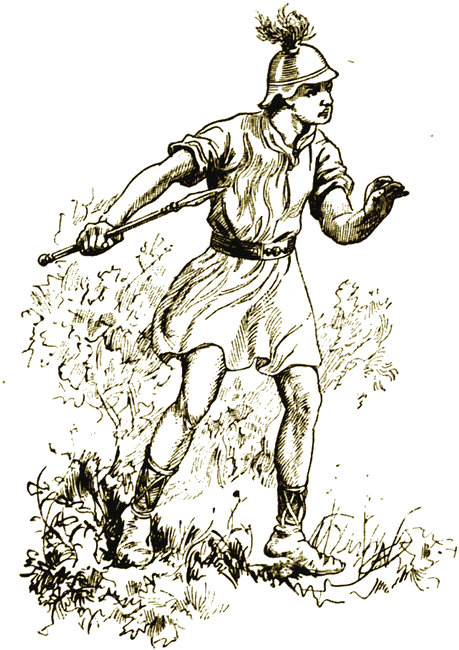
His dress was similar to that of his darker companions, but was much richer in material and ornament. His tunic was of pale green stuff, which glistened like heavy satin, fastened at the waist by a belt with clasps of stone or crystal, of a deep red hue. His buskins were of pure white leather, as was his cap. Upon the latter, a short tuft of green feathers took the place of the ridge of bristles. He carried a short spear similar to that borne by the officer in command of the detachment, but with a highly decorated and polished shaft and a diamond-shaped head, composed of the same red crystal which formed the clasps of his belt. This red stone, whose true character the travellers did not suspect at that time, skilfully cut in various shapes and devices, seemed to be the chief ornament of his dress and arms.
When this young man had spoken a few words in a sharp authoritative tone to the officer, who received them with sullen obedience, he turned about and examined the three travellers, with a grave but not unfriendly glance.
"Well," grumbled Ben, in a low voice, "I hope you will know us when you see us again, my boy."
Advancing a few steps, as before, Rollin took off his hat and made the young man a bow; to which the stranger replied by touching his forehead with his forefinger—evidently the customary salute of the country.
"We are friends," said Rollin; "people who have come from a far country to find one of our number who is lost. We believe he came here and we have followed. He is my father."
The young man listened attentively while the boy was speaking. When he had finished, he made a courteous movement with his head to signify that he did not understand.
"Try him with signs," suggested Ben. "Tell him you are hungry and see if he can take that in."
Rollin opened his mouth and pointed to it with his finger, then made as piteous a face as possible, to express distress. The stranger's face brightened at once and he nodded vigorously. Rollin doubled up his fist and made a movement like one drinking. Again the stranger nodded and smiled, beckoning the three friends to approach. Rollin advanced toward him at once, followed more slowly by Ben and Polly.
Again touching his forehead, the stranger spoke some words of command to the officer. That individual immediately formed his men into a column, four abreast, and placing himself at their head, began the march, the stranger and the friends bring up the rear. The evolutions and marching of these dusky soldiers were remarkably well done—better, in fact, than anything Rollin had seen in America, except by some of the best-trained troops.
A few minute's walk brought them out of the woods upon a broad, well-made road, which would have put to shame the ordinary, shabby American highway.
After a quick march of an hour and a half, the party reached the outskirts of the village which the friends had seen from a distance. If they had been amazed at what they had hitherto beheld in this strange country, their astonishment was now redoubled.
AS they had already perceived by the aid of the telescope, the town, if it could be called such, was composed of a number of small dwellings surrounding a larger one. The smaller buildings were of wood, circular in shape, with conical thatched roofs, rudely but strongly constructed by setting the ends of stout, rough-hewn logs into the ground side by side and pinning them firmly together. There were neither doors nor shutters, a mat of woven grass taking their place.
These cottages seemed to be occupied only by dark-skinned people, like the soldiers, who came to the doorways to gaze at the while strangers. The men were dressed in the yellow tunic and buskins of the soldiers. The females were similarly attired, with the exception that the buskins came higher upon the leg and the tunic reached nearly to their ankles without a belt at the waist.
Rollin remarked in the faces of all of these people, women, and even children, as well as the men, the same sullen, discontented expression which he had noticed in the soldiers. They remained perfectly silent, making none of the demonstrations of curiosity or interest which the arrival of a party of unknown strangers would have excited in most semi-civilized communities.
It was the large central edifice, however, which chiefly aroused the wonder of the travellers. It was situated in the centre of a circular space, two hundred yards across, around the outer edge of which ran the street of the village. This great building was composed of gray stone, uncut and rough, but excellently laid in cement. It was about one hundred feet square, but hardly twelve feet high above the level of the surrounding space. On all four sides, however, a ditch, six or eight yards wide and eight feet deep, had been cut, making the real height of the walls about twenty feet. The outer surface of the walls was wholly without ornament, and exhibiting neither doors nor windows. The only apertures visible were narrow slits, two inches wide and a foot long, pierced in the masonry at intervals, a little above the level of the ground upon the opposite side of the ditch. The roof appeared to be flat, with a parapet, which, with the slits in the walls, gave the whole edifice the air of a fortress or castle.
The party took the road leading to this building; but upon reaching the edge of the ditch, the dark-skinned officer saluted the young man by touching his forehead with his finger, and the detachment filed away to the right and disappeared among the cottages, leaving our travellers and their protector to descend into the ditch by means of a stairway of wood built against its side.
The friends looked in vain for any opening by which they were to enter the building, for such was evidently the intention of their protector. But without the slightest hesitation, he walked up to the foot of the wall, where they now perceived a sort of trap-door of wood in the bottom of the ditch, exactly similar to that leading to the outside cellar steps of an ordinary house. He rapped upon this door with the shaft of his spear. In a moment there was a muffled sound below and the door turned outward upon its hinges, revealing a narrow flight of stone steps leading under the wall of the building.
An elderly man, of the same dark hue as the people of the village, appeared in the opening, carrying a lamp of brownish glazed ware and peculiar shape. When he saw the voting man, he touched his forehead with his finger and stood aside to allow the party to descend, gazing at the three friends as they passed in evident amazement, but without uttering a word. After securing the trap-door, he led the way with his lamp down a narrow passage, closed at the farther end by a heavy wooden door, which he fastened behind them again with three stout bars.
The young man ushered them into a large chamber, furnished in a comfortable though somewhat singular manner. The walls were hung with mats of woven grass, painted in various curious but tasteful designs. The ceiling was coated with a pale bluish wash or stucco, as smooth as the plaster of an ordinary American dwelling. The floor was composed of a great number of small stones of different tints, laid in cement and grouped in contrasting colors very effectively.
A table, consisting of a single slab of dark polished stone, supported upon a square pillow sunk into the floor, stood in the middle of the room. Near at hand were several large chairs, with low seats and curved arms, but no backs, covered with a matting of the grass which seemed to be so commonly used among the Orbellos. Around the walls, in racks made for the purpose, were a large number of bows, spears, and lances mostly lipped with a polished dark stone. The chamber was lighted by two large windows opening upon an inner court, without glazing, but defended by grass mats, now drawn up in festoons at the top.
In this apartment, seated or standing, were a number of people of the light-colored race, resembling their guide. There was a movement of surprise among them as the friends entered, but it was immediately suppressed, as if out of respect for one of their number, an old man of venerable and dignified mien. His beard and hair were snow white and his grave, handsome features wore an expression of intelligence and kindness, which greatly reassured the travellers. His tunic was white and of the same glistening material as that of their protector's garment. The clasps of his belt, the tip of the short spear which hung at his side, and the various ornaments about his dress were composed of, or set with, a transparent stone, which sparkled like fire as he moved.
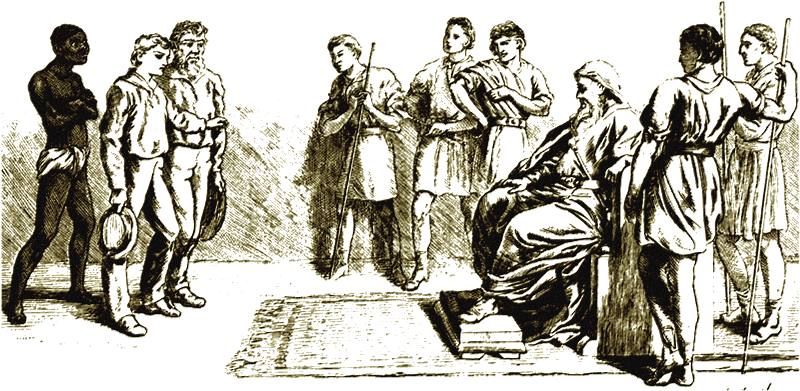
The friends observed that he was the only one present who wore these transparent stones. Several of the company, men of forty-five or fifty years, wore stones of a dark green color as ornaments, while those of the younger men were of red crystal, like their guide's. Each wore only a single color, no two varieties of the stones appearing upon the same person. From this fact the travellers concluded that the color or quality of the stones indicated the rank of the owner; the white or transparent, being that of the highest, the green of the middle, and the red of the lowest order. None of the black people wore either of the stones.
The old man was the only person seated; the others standing on either side of him, apparently in deference to his rank and age.
He occupied a large chair covered with skins and provided with a footstool. Altogether, though everything they saw was strange and new to them, Rollin and Ben felt that they were in the presence of people who might be justly called civilized—though it was a civilization hitherto unknown to the rest of the world.
Their guide approached the old man and, making a respectful salutation, spoke some words in the unknown tongue—evidently, from his gestures, an explanation of his discovery of the travellers. When he had finished, the old man turned toward them and, with a movement of the hand, beckoned them to draw nearer. The three friends obeyed and placed themselves before him, Rollin, as the spokesman of the party, a little in advance. Impressed by the venerable air of the old man, the boy made him a respectful bow, which was returned by touching the forehead after the manner of the country.
The old man gazed at each of the friends in turn, gravely and coldly, but his features visibly softened as his eyes rested upon the frank, manly face of the boy. After a moment's silence, he addressed Rollin, evidently from his tone asking a question.
"We are strangers," replied the boy; "we do not speak your language."
The old man listened attentively and shook his head with a slight smile.
"How can I make him understand?" said Rollin, looking anxiously at Ben; "everything depends upon our securing this old man's good will, for, as you see, he is some official of high rank."
"Try him with French, lad," suggested the sailor, whose faith in Rollin's learning was unbounded, "and if that don't work, give him a bit of Greek or Latin."
"I have it!" replied Rollin, "I will try drawing. Perhaps he will understand that."
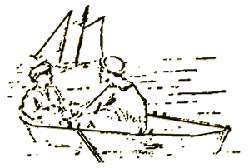
Taking from his pocket his memorandum book and pencil, which he had fortunately kept by him, he went to the table, and, tearing out a number of leaves, began a rapid sketch. He had considerable skill as a draughtsman, and he had soon completed his first picture. It represented the seashore with a ship in the distance, and a small boat with two persons, a man and boy, in it. Next he drew the man and boy in their boat, pursued by a larger boat full of men, who by their gestures showed that they were enemies.
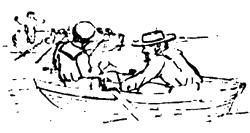
Then he drew the man and boy shaking hands with a savage, to show how Polly had become their friend. His fourth sketch represented the three travellers in the desert, in attitudes indicative of weakness and suffering. This was followed by a fifth picture, representing them drinking at the spring, to show that they had passed the desert and reached the Orbello country in safety. His last drawing, which he made with his utmost skill and care, represented a tall pillar or tower, with a fire upon its top, and a middle-aged man, with a beard, walking toward it. At some distance behind him followed the three friends, with their hands stretched out toward him with appealing gestures, as if trying in vain to reach him. By this sketch he endeavored to convey to the strangers the object of the visit of himself and his two friends to their country, and he hoped that it might lead to some intelligence of his father. He succeeded in making a very good likeness of him as he had last seen him, and if any of those present had met Captain Faulkner, he felt sure that they would recognize his drawing of him.
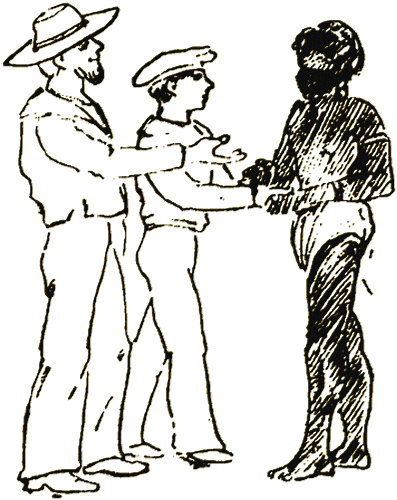
When he had finished his sketches, he handed them, one after the other, to the old man. After gazing at the first attentively for a moment, he passed it to the man standing at his side, in silence. He did the same with the second. Rollin, who watched his face closely, could not make out whether he comprehended the drawing or not. When he took up the third, however, he smiled slightly, and as he passed it to the man beside him, both looked at Polly and exchanged some words. The fourth and fifth sketches he merely glanced at without commenting upon them; but when he came to the last, representing Captain Faulkner and the Burning Tower, the boy saw him start and a look of amazement cross his features. He gazed at it for several minutes, lifting his eyes from time to time to study Rollin's face with a keen, enquiring scrutiny.
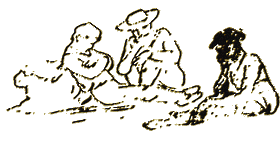
Presently he addressed the man at his side, who, from his dress and manner, appeared to be the next after himself in rank and authority, and pointed to the sketch with his finger. The same expression of amazement came into this man's face as he saw it, and, leaning down so that he might not be heard by the others in the room, he uttered, in a low tone, the word "Goyolloman!"
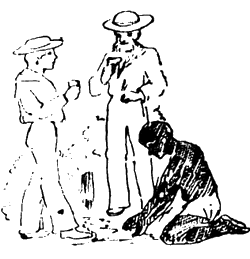
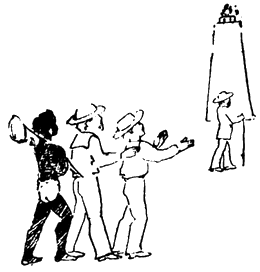
As he spoke the word, both he and the old man touched their foreheads with every sign of the deepest veneration. The latter bowed in token of assent and replied in the unknown tongue, repeating the mysterious word "Goyolloman" several times. During the conversation both he and his companion glanced at the boy with an expression of great interest.
"Oh, Ben," whispered Rollin, whom all this had not escaped, "I think they must have seen my father! They seem to recognize my picture. Oh, if I could only talk to them or understand what they say!"
"Patience, lad," replied the sailor philosophically. "It is not likely we shall get away from here in a hurry, and you will have plenty of time to learn their lingo."
He was interrupted by the old man, who beckoned their guide to approach and gave some orders in a low tone. With a wave of the hand, accompanied by another look of singular intentness at the boy, he dismissed the travellers.
As he turned away, the boy heard the old man once more utter in a low, earnest tone, the unknown word "Goyolloman."
CONDUCTED by their guide, the friends proceeded along another corridor of some length, up a flight of steps and into a room, which, as he indicated by signs, was set apart for their use. Then making them a salute, he went away and left them alone together.
"The first question is," said Ben, in a significant tone, "is this here a lodging for guests, or a prison?"
Rollin stepped to the door by which they had entered, and lifted a corner of the mat which covered it. He was startled to see in the corridor outside, a black soldier armed with a spear, evidently keeping guard over them.
"That looks bad," observed Ben. "They don't mean that we shall cruise at liberty."
"It appears so," replied the boy, in a troubled voice, "yet they seemed very kind and friendly."
While Polly, who since their arrival in the Orbello village had seemed stupefied with wonder and awe, squatted upon the floor, Rollin and Ben made an examination of their quarters. Two smaller rooms, each containing a sort of couch and evidently intended for sleeping chambers, opened into the larger apartment.
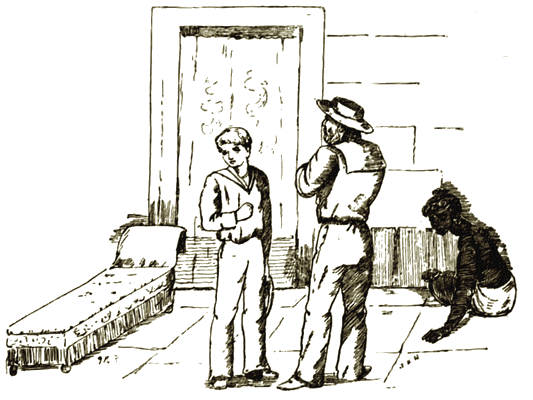
These rooms had neither windows nor doors. A single window lighted the main apartment, opening upon the inner court. Before this window was a small stone balcony, from which a view of the whole extraordinary edifice could be obtained.
It was built around four sides of a large square; the inner walls only containing doors and windows, the outer, as we have seen, being without any apertures except the narrow slits in the stone work. From the outside the walls were but one story above the level of the ground, or two stories from the bottom of the ditch. Inside there were three stories, the lowermost, as well as the whole court, being sunk below the surface of the earth. One peculiarity in this remarkable style of architecture was the absence of the arch; all openings in the walls being supported by heavy lintels and sills of cut stone.
The court was paved, and its centre was occupied by a large cistern filled with water. Moving to and fro about the court Rollin saw a score or more of the light-colored people. Among them were a number of the darker race, both men and women, and the boy noticed that while the former appeared to be merely conversing or enjoying the air, the latter were engaged in various occupations. The light persons were evidently the masters, while the blacks were slaves or servants.
As far as the friends could judge this remarkable building contained two or three hundred inhabitants, each family dwelling in a separate set of apartments, the whole constituting a community whose chief or head was no doubt the old gentleman whose presence they had just left. The village, in fact, was double: the outer one composed of the small cottages occupied by the inferior or dark race, and the inner of the single large building, tenanted by the light-colored people.
Their investigation was interrupted by the return of their guide, followed by a number of servants bearing dishes, which they placed upon the table in the middle of the apartment. When the meal was ready, two chairs were placed for Ben and the boy, a portion of the food being set aside for Polly, who, in virtue of his dark skin, was evidently regarded as the servant of the two friends. With a courteous gesture the young man invited them to eat and departed, taking the servants with him.
The friends sat down to their first meal in an Orbello house with a good appetite and no little curiosity. Polly, who could not be induced to occupy a chair, which he seemed to regard as some sort of man-trap designed for his especial destruction, squatted upon the floor with his food in front of him. The dinner was served in dishes of brown earthenware, very delicate and highly glazed. As to what they were eating, neither Ben nor Rollin could guess. It was admirably cooked, however, though of a peculiar and unfamiliar flavor, and the friends made an excellent meal.
In about an hour the servants returned and removed the remains of the feast, after which the friends were left undisturbed until near sunset, when the young man, who appeared to have been formally constituted their especial guardian, re-entered the room. He beckoned them to follow him, and led the way to the large apartment, where they had been brought before the old gentleman. He was in his former seat, and near him stood four of those who had been present before, all middle-aged or elderly men, wearing the green stone and evidently his councillors.
In obedience to a gesture, the three companions approached him. Fixing his eyes upon the boy, this time with an expression whose kindliness could not be mistaken, he handed him a small square of what seemed at first like rough white paper, but which upon a closer examination proved to be a piece of grass-matting, but woven with marvellous delicacy of strands no thicker than hairs, and bleached a pure white. Rollin was astonished to find that these singular people had adopted his own mode of communication, and that the slip contained a drawing in some dark-colored wash, like India ink, much more artistically finished than his own had been. He understood it at a glance and only too well.
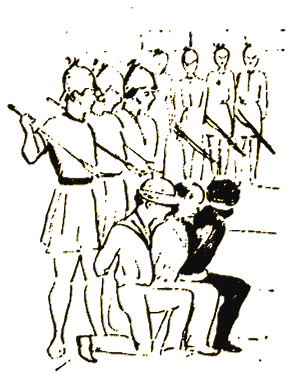
It represented a body of the black archers, drawn up in line in the court of the building. Before them, kneeling upon the ground, with their arms bound and their eyes bandaged, were himself and his two companions. Over each stood a soldier with upraised spear, awaiting the word of command.
It was a formal execution.
With pale face and trembling lips Rollin handed the sketch to Ben in silence. The sailor uttered a growl of rage.
"So they mean to murder us, after all," he said between his teeth.
To the surprise of the friends, no one stirred or made any threatening demonstration whatever. On the contrary the old man smiled good-naturedly, at the same time offering the boy a second drawing.
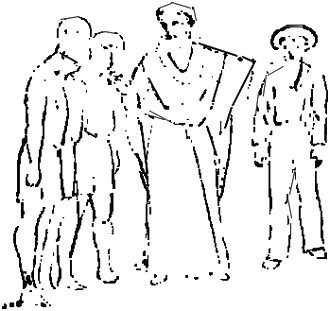
Rollin's face brightened as he looked at it. "They mean us no harm, after all," he said. "This drawing explains it all. See, here they are holding a council about us. The old man stands with his hand upon my shoulder, addressing the others, who bow their heads in token of assent. I think I understand it. It is against the law for strangers to come into this country. If they do, they are liable to the penalty of death. But for some reason the old man has taken us under his protection and has made an exception in our favor. So we are safe."
"Oh, that is it?" replied Ben, only half appeased; "well, so much the better for them."
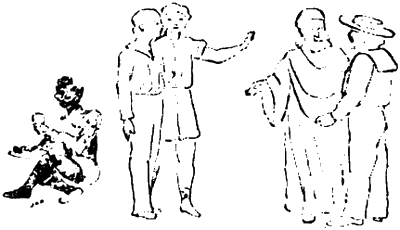
When the two friends had studied the second sketch sufficiently, the old man gave the boy another. This drawing seemed to indicate that they were to regard themselves as guests of the house. Rollin was walking arm in arm with a young man, who by his gestures appeared to be describing the surroundings, while Ben was engaged in a friendly conversation with one of the councillors. Polly was seen in the background, squatting down and eating from a dish of food with a grotesquely exaggerated grin of satisfaction.
"That is easy enough to understand," observed Ben. "They mean to make us free of the ship, unless," he added, with a look of doubt, "they intend to fatten us up to eat. What do you think, lad?"
"I think that we are in high favor, Ben," said Rollin, smiling, "and that unless we do something to anger them, we have nothing more to fear, unless it is being prevented from continuing our hunt for Oo. If that is the case, we must wait patiently until we can find an opportunity of slipping away."
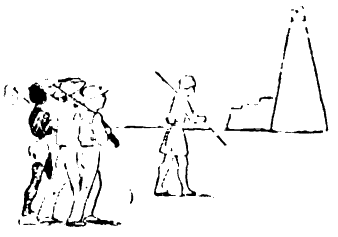
As if in answer to his doubt, the old man handed him a fourth drawing. It showed the three friends, accompanied by an escort, walking toward a tall pillar upon which there was a fire—the Burning Tower, in fact. Upon the horizon the full moon was just rising.
For a moment the boy and the sailor were puzzled to make out the meaning of this sketch. But observing the troubled look upon their faces, the old man leaned forward in his chair and pronounced two words, at the same time touching his forehead:
"Goyolloman! Oo!
"I understand," cried the boy eagerly. "He means that we are to go to Oo. See, here is the Burning Tower! And we are to go at the next full moon. Here it is rising. What 'Goyolloman' means I don't know."
"Perhaps the Commodore of the whole business," suggested Ben; "their king or chief, or whatever they call him."
"Likely enough," replied Rollin. "At all events we shall get to Oo and I shall know about my father."
The audience now being over, the three friends were conducted back to their apartments in a much more cheerful frame of mind. They found excellent beds prepared for them, to the great satisfaction of Rollin and Ben. As for Polly, distrustful by nature and habit, he rolled himself in one of the skins which he found in the apartment and laid himself down upon the floor before the door, with his clubs and boomerangs beside him.
"If any rascals want to sneak in while us sleep," he observed, "Polly hear um and they catch heap crack on head. No play marines tricks on us, you bet."
IF Rollin was right in his conjecture that they were to be conducted to Oo at the next full moon, they had nearly three weeks to wait. They therefore prepared to pass the interval as patiently as they might. The boy's inquiring spirit was keenly awakened, and in spite of his ignorance of the Orbello tongue, he managed to learn many singular and important facts during his brief stay in the dwelling. He discovered that the young man who had first acted as the guardian of the travellers was named Uli Telliman—Uli, as with us, being his first or given name, and Telliman his family name. The word Uli, meaning "one" or "the first," having been given him because he was the eldest born; for the Orbellos name their children in the order of their birth—Uli, Duli, Tuli, or first, second, third. If, on reaching manhood, the young Orbello perform some noteworthy action or distinguish himself in any way, another name may be assigned him by the ruler of his household, which name he is thereafter known by.
Uli was the grandson of the old gentleman, whose family name was also Telliman ("man" being a common terminal syllable in Orbello names, indicating that its possessor is of noble rank or birth), and who was called Taybo, or the Ruler. He appeared to be the supreme head of the community in civil, military, and religious affairs, though in important cases he might ask the aid and advice of a council composed of the older men of the village.
The Orbello military system is a very perfect one. Each village has its own corps, the rank and file consisting of the black race, or Lundee, officered by the Orbello nobles, excepting the subalterns, similar to our corporals and sergeants, who are promoted from among the common soldiers. When not on duty the men reside with their families in the cottages of the outer town, pursuing their regular avocations as mechanics or agriculturists. They have their stated periods of service, and on special occasions the whole command may be called out upon the summons of the Taybo. They are excellently trained and drilled, marching and performing their various evolutions with the steadiness of the best white soldiers. Their arms are bows and arrows, in which they are wonderfully proficient, long spears or lances, battle axes and short heavy javelins, the latter being worn at the side and used in the same manner as the sword, which is unknown in this country.
Every Orbello gentleman is a soldier, and trained in the use of arms and in the science of war from his boyhood. From the ages of twelve to seventeen, the Orbello boys of each town are members of a cadet corps, commanded by veterans who have retired from active service. They are taught the duties of the common soldier, as well as those of the commander, a thorough proficiency in the use of the bow and spear being necessary to admission into the higher grades of tactics and engineering. As the Orbellos say, "A good officer is the best soldier in his company."
Rollin was in the habit of going every morning into the court of the dwelling, to watch the cadets of the village, numbering about fifty, perform their daily drill. The fine marching and difficult manoeuvres executed by these boys of his own age excited his wonder and admiration. As the ranks moved by him, with measured step, the plumes in their caps waving and their spears flashing in the sun, he could not help envying them.
A great friendship was speedily established between our hero and Uli Telliman, as well as his younger brother, Duli, a bright youth of sixteen, and by means of signs and words they were soon able to understand one another tolerably well. From Uli and his brother Rollin obtained much interesting information relating to the previous history of the country. In ancient times, "many years of the moon ago" the whole country from sea to sea—that is, the whole island of Australia—was owned and governed by the Orbello people, then much more numerous and powerful than at present, dwelling in great cities of stone, adorned with splendid sculptures and carvings. "In those days," runs the tradition, "when the king led his armies to battle, his foot soldiers numbered more than the sands of the sea."
In course of time strangers of a black color and savage aspect came in boats from distant islands in the sea. There were many battles and the Orbellos were finally defeated and overthrown, their beautiful cities destroyed, and their commerce and manufactures ruined. Reduced in numbers and weakened in power, they were driven inland, until all that remained of a once mighty nation crossed the desert and established themselves in their present territory. Even here they were attacked by a powerful expedition of their implacable enemies. But arousing their expiring energies, they fought a desperate battle with the invaders and conquered them. Those who were not driven into the desert to perish, submitted and became the slaves of the victors. They were allowed to dwell in the country with their wives and children. A law was passed inflicting the penalty of death upon any strangers who should thereafter come into the country.
These defeated enemies were the people now known as the Lundee. Though all this took place centuries ago, the Lundee have never become reconciled to their lot, nor adopted the civilization of their masters, always remaining a distinct race, sullenly submissive, but ready to revolt at the first opportunity. This is why they are compelled to live by themselves in the outer town, while the Orbellos occupy the large fortified building which forms the citadel or interior town. All Orbello villages, of which there are several hundred, containing more than a quarter of a million of the superior race and nearly twice as many Lundee, are built upon this plan.
As may he supposed, Rollin did not fail to question Uli and his brother about Oo. But he could elicit nothing from them, either because they were unable to understand his interrogatories, or were unwilling to discuss the subject.
In the second week of his visit a startling incident occurred through which, by his presence of mind, he not only won the gratitude of the Taybo and his family, but made himself the hero of the whole village.
A number of large dogs were kept in the village for hunting purposes. It was a part of Uli's duty to visit the quarters of these animals, in the Lundee part of the town. One morning the young Orbello invited Rollin to accompany him thither, and, followed by his brother Duli, and their sister, a pretty child of eight or nine years, they set out. From habit, and without any thought of using the weapon, which, with the other firearms, had never been discharged since their first meeting with the Orbellos, Rollin carried his rifle with him.
Among the dogs was one which Rollin noticed particularly, not only on account of his immense size, but because of his singular actions. This animal was the little girl's especial favorite, and as she stood caressing his large head Rollin observed that he seemed sullen and uneasy. His eves were blood-shot, the hair upon his spine was erect, and a slight foam appeared upon his lips. Every now and then he uttered a low growl and showed his white teeth.
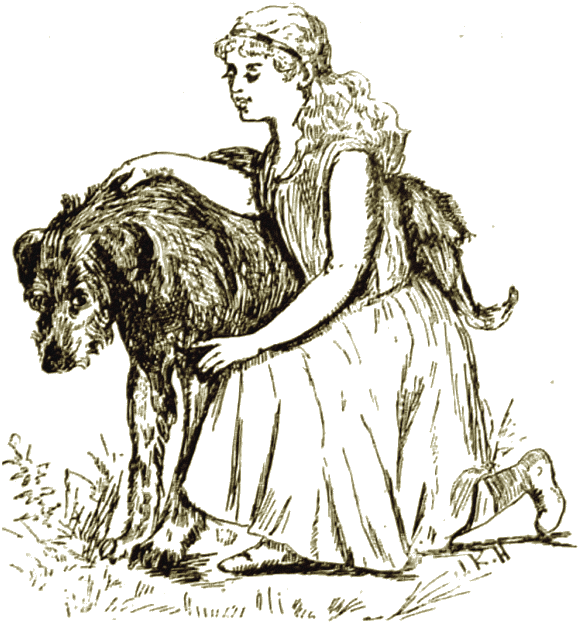
Rollin pointed out these symptoms to the older brother, who called his sister away from the animal and directed the Lundee keeper to take charge of him. On their return homeward they had gone several hundred yards before they discovered that the little girl was not with them. Fearing that she had persisted in remaining with the canine pet, which he felt sure was in a dangerous condition, Rollin proposed returning for her. While they were hesitating, they were alarmed by a loud cry of terror and beheld the little girl flying toward them, pursued by the dog, now evidently in a state of madness.
When they first appeared in sight, the dog was hardly twenty yards behind, the child, and in spite of her utmost speed, was rapidly coming up with her. Uttering a shout, the two brothers, followed by Rollin, ran to her rescue. But they had nearly three hundred yards to go, and long before they could reach her, the savage animal would have seized the child.
Both of the brothers were unarmed, except the light javelins at their sides; but as we have said, Rollin carried his rifle, which was fortunately loaded. He had acquired considerable skill with the weapon, but he had never attempted a shot under such circumstances. The dog was so close to the child that at that distance he might easily miss the brute and kill her. But there was no alternative.
His hesitation lasted but an instant. He stopped short in his wild race and cocking his rifle, planted his feet firmly and took careful aim. His heart beat violently and a mist covered his sight; but he set his teeth and fired, just as with one final leap the dog was in the act of bearing the screaming child to the ground. He closed his eyes, not daring to look at the result of his shot.
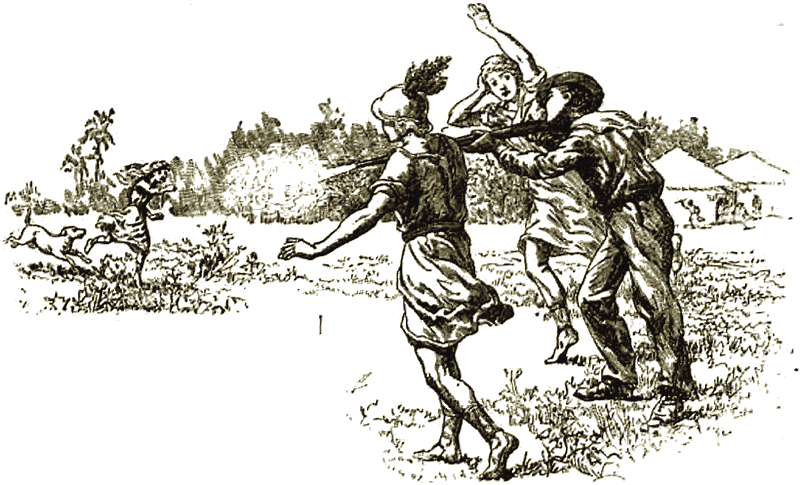
A wild tumult of cries and exclamations of joy and amazement told him that he had been successful, and opening his eyes, he saw the huge animal rolling upon the ground in the death struggle, while the child was running toward her brothers, unharmed. By this time the whole village was aroused, and men, women, and children, Orbello and Lundee alike, came streaming toward them with excited cries and gesticulations. The body of the dog was examined with amazed curiosity. Being unacquainted with firearms, his death, which it was known, the boy had dealt him from a distance twice as far as their best bows would carry, puzzled them exceedingly. The rifle was scrutinized, handled, and passed from one to another with a running fire of comments and ejaculations.
In the midst of the excitement there was a distant shout, and the Taybo, accompanied by Ben and Polly, and surrounded by his council, was seen approaching as rapidly as his aged limbs would permit. The crowd drew back respectfully, while Uli and his brother, with the little girl between them, advanced and explained what had happened to him. He listened gravely, but with deep emotion, and when the recital was finished he raised the child in his arms and kissed her tenderly. Then he turned to the boy and spoke some words in a broken voice, which Rollin understood to be thanks for the service he had performed; after which he took a gold chain, to which was attached one of the white sparkling stones, indicative of his rank, which he wore, and placed it around the boy's neck. At this sight the crowd uttered a shout of applause and saluted Rollin by touching their foreheads, showing that in giving him the white stone the Taybo had invested him with the insignia of some rank or title recognized among the Orbellos.
At a sign from the Taybo, two brawny Lundee soldiers lifted Rollin upon their shoulders. Led by the Taybo and his officers, with Ben and Polly on one side and the two brothers on the other, and followed by the whole population, chanting a hymn in unison, he was carried in triumph to the dwelling.
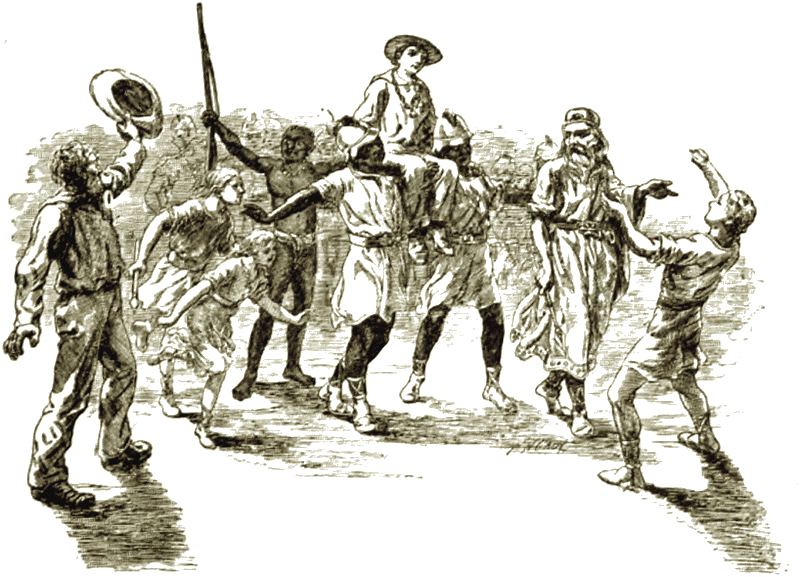
"I'M proud of you, lad," said Ben, when the three friends returned to their quarters after the incident related in the last chapter. "It was a good shot, you made; as good as the one I made when I was gunner's male on board the Wyandotte, when I took the blockade-runner atween wind and water. I was promoted for that there job; but these here benighted landsmen, having nothing in the way of a comfortable berth on board ship to bestow, have done their best, I suppose, with that there bit of shining glass you have around your neck."
"Have you looked at that 'bit of shining glass,' as you call it?" responded Rollin. "Perhaps, when I tell you it is a diamond of great value, and beautifully cut, you will think better of the Taybo's generosity."
"A diamond!" repeated the sailor, examining the ornament with new interest.
The gem was as large as a hazel-nut, full of fire, and of the purest water. It was admirably cut—for the Orbellos are skillful lapidaries—of an oblong shape, and pierced at one end to admit the ring by which it was suspended. The chain, itself a work of art, was of virgin gold, as thick as a man's finger and handsomely engraved.
"I will tell you something more," said Rollin, when Ben had sufficiently admired the ornament; "all of those red and green stones, which these people wear in such profusion, are rubies and emeralds. Each person hen; carries a fortune about him in ornaments, buttons, and javelin heads. There must be mines of them in the neighborhood."
The conversation was interrupted at this point by the entrance of Uli Telliman, followed by the Taybo. The young Orbello wore a smiling look, while the expression of the elder was full of benevolence. With much difficulty and with a strange mixture of Orbello, broken English, signs, and drawings, they managed to make the boy understand the object of their visit. It was to induce Rollin and his two friends to remain in the village permanently. As we have said, Uli and his brother had conceived a great friendship and admiration for the young American, and the rescue of the Taybo's granddaughter had entirely won the old man's heart. They used every imaginable argument to overcome the boy's determination to depart at the appointed time. They offered him a handsome set of apartments in the building and the income of a large estate, situated without the limits of the town—all in fact, which, according to Orbello ideas, constitutes ease, fortune, and position. They seemed much downcast by Rollins firm refusal of their liberality. He reminded them of their promise that he should be taken to Oo at the next full moon. He tried to explain that he was sensible of their kindness and generosity, but that he had a mission which he must fulfill.
The Orbellos argued, entreated, and insisted; Rollin refused and explained, and the colloquy was becoming healed, when the mat before the door was raised and a messenger, covered with dust, entered and handed the Taybo a folded package, uttering the single word "Goyolloman."
The old gentleman touched his forehead and then proceeded to read the missive. As he did so his face fell and a look of dissatisfaction overshadowed it. He handed the message to Uli, who read it with the same signs of discomfiture. Then, without any further attempt to oppose the boy's wishes, the two Orbellos arose and the Taybo briefly informed him that the courier had brought an order from the Capital, directing that the three strangers should be sent thither, and that, therefore, they might prepare to set out at the next full moon, six days hence, as originally proposed. After which they retired, leaving Rollin full of regret for the disappointment of his good friends, but firm in his resolution.
On the evening of the festival, which is one of the most important among the Orbello ceremonies, the three friends were invited to join the inhabitants upon the roof of the building. The whole concourse, of all ages and sexes, had discarded their usual dress and wore long flowing robes of pure white, without ornament or head covering. In their hands they held branches of the Moon Flower, a singular plant, bearing a large circular white blossom, six inches in diameter, nearly flat and marked with blotches of pale gray color, very much resembling the dark spots upon the surface of the moon itself. This strange flower is found only in the high tablelands of the Orbello country. It is regarded as sacred and is carefully cultivated, being used at the moon festivals as an emblem of the planet.
It was yet dark when the three friends reached the roof, the moon not yet having arisen. The throng stood in perfect silence, facing the east, where a pale lambent glow was gradually deepening upon the horizon. As the edge of the moon appeared upon the brink of the distant hills, like a thin line of burnished silver, the whole concourse, with the exception of the Taybo, knelt down. A number of musicians bearing a species of small flute, made of jointed reeds, with a singularly sweet and tender tone, began to play. The air was wild and melancholy, and seemed to Rollin wonderfully in sympathy with the mysterious influence of the night and the solemn beauty of the scene.
After a short prelude by the flutes, the single voice of the Taybo was heard in a slow, devotional chant. Then four young girls responded from a distant part of the roof, their clear, harmonious notes ringing out like a chime of silver bells. When these had finished, the Taybo chanted again, and four male voices, deep-toned and powerful, replied. Then, as the moon mounted above the horizon, the whole throng, rising to their feet, broke into a mighty chorus, voluminous and majestic as the pealing of a great organ.
After the singing of the hymn, the whole throng gathered upon the eastern portion of the ample roof to witness what is known as the "Dance of the Full Moon." Thirteen young maidens, representing the thirteen lunar months, or revolutions of the moon during the year, formed themselves into a circle, linked together by graceful festoons of blossoming vines. In the centre stood a tall and beautiful girl, called the Lady of the Moon, wearing a garland of the sacred Moon Flower, and bearing a branch of the same in her hand.
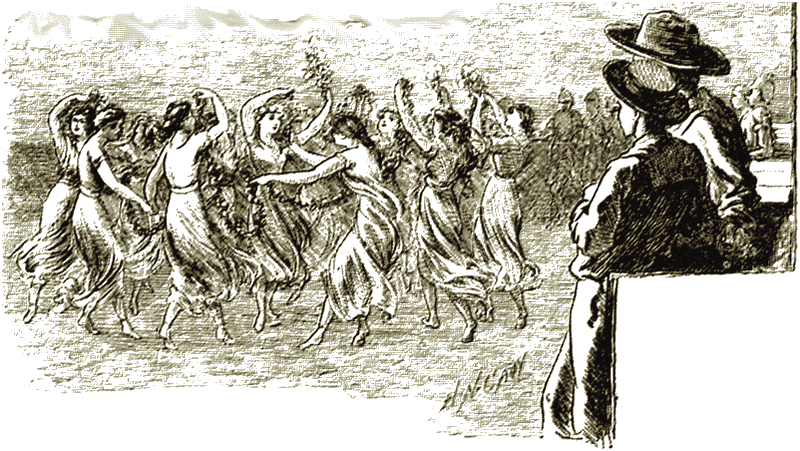
The flutes then began a soft, measured air, and the thirteen young girls, or months, began circling around in a slow rhythmical dance, keeping time to the music, while one of their number sang a short strain or song. To this the Lady of the Moon responded. Then the next month took up the refrain, and so on through the whole thirteen, the Lady of the Moon answering each in turn with a different air and words.
Rollin had never witnessed anything so strange and beautiful as this dance, with the pale beams of the moon illuminating the graceful figures of the dancers moving to the sound of the flutes, and the silent rows of spectators clad in white. The dances lasted nearly two hours. When they were done and the concourse began to descend to their various habitations, Uli approached the three friends, and with a very downcast expression invited them to accompany him to the Taybo's apartment.
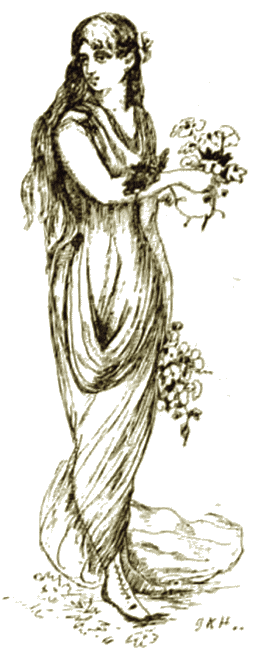
They found the old gentleman surrounded by his family, including the little grandchild whose life Rollin had saved, waiting to bid them farewell. The Taybo made them a short address, intended to convey his affection for them and his regret at their departure. After which he gave Rollin a small square of the matting paper, which has been described, covered with writing in the Orbello character, which the boy took to be a species of safe conduct or passport, and which indeed it proved to be; though it was not till some time afterwards that he learned the full value of the privileges it granted.
With a warm pressure of the hand, in the American, manner, Rollin and Ben took leave of their kind friends and, following Uli and his brother, passed through the corridors and out of the building. Before the entrance they found their escort, composed of twenty young Orbellos, awaiting them. Their baggage, which Polly had previously packed up, was carried upon the shoulders of four Lundee slaves.
The whole Orbello population had gathered upon the roof again to see them set out, and as they began their march, scarfs, veils, and hands were waved to them in token of farewell.
The party proceeded at a brisk pace, and shortly after sunrise arrived at another village very similar to the one they had just left. Here they were received with a ready hospitality which proved they had been expected—the Taybo in fact having sent messengers in advance. Late in the afternoon the journey was resumed; for during the period of the full moon, when the broad safe roads are brilliantly illuminated by its light, the Orbellos travel much during the cool hours of darkness.
For three successive nights the party pursued their journey in this way, resting by clay at the villages along the route. On the third night the road, which had hitherto wound through a broken, irregular country, sometimes skirting the bases of lofty hills and again descending into fertile and cultivated valleys, led out upon a wide sandy plain, elevated somewhat above the surrounding region.
As they turned the corner of a mass of rock and shrubs, and the level and desolate expanse was revealed to the eyes of the travellers, Rollin uttered a sudden exclamation and grasped the sailor by the arm.
"Look!" said he, in a low, eager tone, "do you see what that is?"
Dim and strange in the moonlight, unbroken, save for the few sparse and stunted trees growing here and there at wide intervals upon the low, sandy hillocks, the plain stretched away for twenty miles or more. In the midst of it stood a dusky mass of vast and irregular outline, like the walls of some gigantic edifice. Out of this, towering hundreds of feet in the air, arose a mighty and indefinite shape crowned with fire, whose solemn and steadfast splendor shone far and wide over the silent plain and cast a faint red gleam upon the serious faces of the party.
"I understand, lad," replied Ben, returning the boys earnest look.
"It is the Burning Tower, Ben."
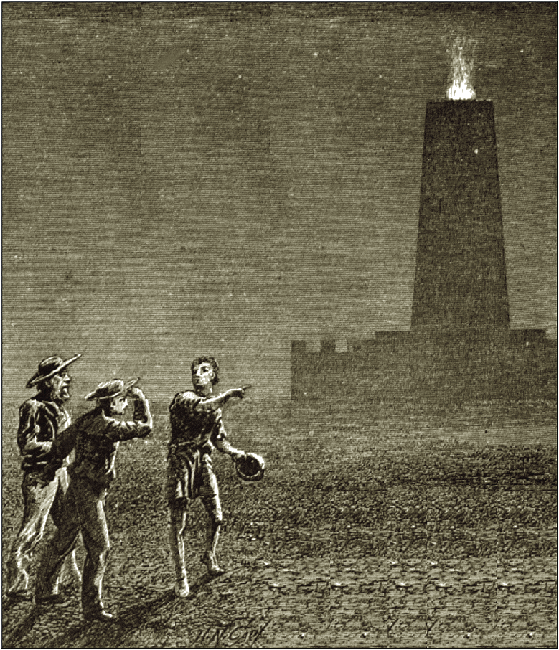
At this moment Uli, who was in advance, brought the party to a halt at the edge of the plain. Removing his cap with an air of deep reverence, he turned to Rollin and, pointing toward the fire-crowned tower with his hand, uttered the single word,
"Oo!"
THE march was resumed in silence. The boy's heart beat rapidly with a strange mixture of hope, fear, and wonder. Before him, but a few miles distant, lay the end of his long and eventful journey, the mysterious Oo. What Oo was he did not, even yet, know. The nameless object, half visible by its own crimson fires, toward which be was moving, resembled nothing that he had ever seen or read of. There was something supernatural, almost terrifying, in its appearance. It was like a huge giant with a flaming torch, guarding some wondrous secret of this unknown region which he, a mere boy, had come from the opposite side of the globe to penetrate.
And after all, should he find what he sought? Was it possible that his father's fate could be in any way connected with this incomprehensible fiery thing before him? He could not believe it now, and with every step he took his doubt and agitation increased.
And now the first gleams of dawn began to appear on the eastern horizon. The moonlight faded slowly, and one after another the stars turned pale and died in the yellow glory of coming day. When at last the sun arose above the hills, it exhibited to the astonished gaze of the boy and the sailor the most wonderful sight which they had ever beheld.
Less than half a mile distant, rising out of the sands of the plain, vast, solitary, and grim, stood an edifice of dark stone, circular in shape and about five hundred yards in diameter. Its walls, sixty feet in height, were pierced with four tiers or rows of narrow windows, the lowermost fifteen feet from the ground, and buttressed at intervals by octagonal turrets, likewise pierced with narrow openings and surmounted by a solid parapet. Along the top of the wall of the main building, running from turret to turret and projecting outward its full width, was a stone gallery, resting upon supports, carved in the shape of dragon-like animals springing out of the masonry of the wall.
The roof of this immense pile was composed of flat slabs of stone, and receded toward the centre in a series of battlemented terraces, one rising above the other in a bewildering maze of parapets, bastions, and galleries; the whole forming a tremendous system of defensive fortification, suspended in mid-air and capable of sheltering a hundred thousand fighting men.
Soaring out of this edifice, which at a distance had the appearance of a pedestal supporting the loftier structure, arose a huge tower, seven hundred feet in height, three hundred feet square at the base, and two hundred at the top. It was built of pure white stone, which glistened and sparkled in the rays of the morning sun like a pillar of moulded snow. In contrast to the sombre grandeur of the fortress-like edifice below, it was literally incrusted from top to bottom with a most marvellous lacework of delicate and beautiful ornament. Rows on rows of tall columns, supporting graceful flowering capitals, and these again surmounted by superb cornices, covered the four sides of the wonderful structure. Richly carved pedestals, bearing niches with peaked roofs, and containing giant figures of men or heroes in flowing garments, sprung at intervals from the surface of the masonry. Flying buttresses carried slender sculptured galleries in and out among the countless angles and projections. Clothing the whole in a mantle of stony foliage, twisting about shafts and pillars, creeping along galleries and cornices, and clinging upon the flat surfaces, were carved the broad blossoms and dependent leaves of the sacred Moon-Flower.
Everywhere the gaze wandered some new beauty, some wonder before unseen, sprang into view. The forest of columns, the myriads of spires and pinnacles, the maze of sculpture and decoration dazzled the eye and stunned the imagination. So true were the proportions of this astonishing edifice that, ponderous as it was, it seemed airy and light, like a while cloud floating in the brilliant rays of the morning sun. To Rollin it was more like a dream than a real work of human hands, and even Ben could only express his admiration in a series of gasps.
The architecture of this great structure, like every other building in the Orbello country, was of a distinct order, unlike anything to be found elsewhere. Here, as in the stone dwellings of the villages, the noticeable feature was the absence of the arch. Yet, notwithstanding the lack of this most graceful architectural form, nothing could have been more exquisitely perfect and beautiful than this tower. As Rollin afterward learned, more than three hundred years were required to build this great edifice. It had been finished more than seven hundred years, and yet it seemed as fresh and pure as if the stones had been laid but yesterday. This is owing to the fact that the material composing it is not ordinary marble, which darkens with time, but a species of hard, dense white rock upon which the weather has no effect.
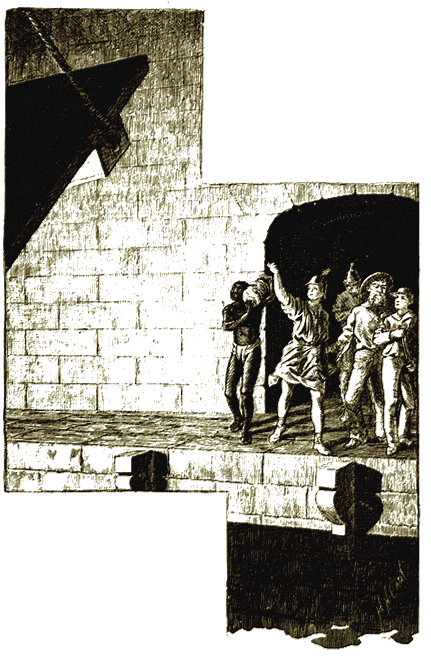
About the top of the tower floated a cloud of pale blue smoke from the fire which is always kept burning there, and which is visible from every part of the Orbello territory, the tower being situated upon the highest point, and exactly in the centre of the country. The fire, like the tower itself, is considered sacred, and so long as it continues to burn the Orbellos believe that nothing can overcome or injure them. Should it be allowed to go out, it can only be relighted by one person of a strange race, who must come among them under peculiar circumstances. Should this person not be at hand, no one else can light it, and the Orbello nation must come to an end. Some time before the visit of our friends a tremendous storm had extinguished the fire, to the great terror of the people; but fortunately the person pointed out by their ancient traditions was found, and the sacred fire relighted amid universal rejoicing.
This structure, designated in Rollin's chart as the "Burning Tower," is known among the Orbellos as the "Tower of the Stars," It is dedicated to the spirit or element of fire, as the visible symbol of the unseen Deity. It is at once a temple, an observatory, and a watch-tower. It is the duly of a certain number of persons to feed the fire night and day. Others occupy themselves with the study of the heavenly bodies, all important events among the Orbellos being regulated by the position of the planets and stars, or the phases of the moon. Others again keep watch of the country. Should a signal be seen in any of the distant villages, denoting an invasion of strangers or an insurrection among the slaves, warning is at once given and troops are despatched thither. In the event of general danger, the fire upon the tower, which ordinarily burns with a red flame, is given a different color by the addition of certain chemicals; whereupon the whole effective force of the nation is rapidly concentrated and prepared for battle. With the exception, however, of an occasional outbreak among the Lundee of some village, the country has been at peace for many years.
Upon reaching the foot of the outer wall, the farther progress of the party was barred by a wide ditch, twenty feet deep, whose bottom was set with large stones, cut with long sharp points, making passage across them impossible. At a summons from Uli, however, a bridge of heavy planks slowly descended, unmasking a gate or sallyport in one of the turrets. Crossing upon this, the party was halted at the entrance, while an officer, in command of a party of soldiers, conferred with Uli in a low tone. Understanding that the officer hesitated to admit the strangers, Rollin produced the slip of matting-paper which the Taybo had given him. The officer read it attentively, and, touching his forehead with every evidence of respect, drew aside and allowed them to pass, while his men saluted them by shouldering their spears.
Passing into the building they proceeded along a wide corridor paved with stone, until they reached another gate, which was opened for them. Beyond the gate the passage ended abruptly in an impassable gulf, which, from its total blackness, must have descended an immense depth into the earth. But a bridge, which was drawn up upon the opposite side, was immediately lowered and the party continued their march. Seven such gates and draw-bridges defended the entrance into this remarkable fortress.
On the right and left of the main corridor smaller passages, closed by stout doors, led away in different directions. Large oil lamps, in niches placed at intervals along the walls, lighted the interior of the vast building, which seemed to be occupied by soldiers only. These troops in every case were of the Orbello race, not a single Lundee being visible anywhere. As Rollin afterward learned, the Lundee are rigidly excluded by law and are not allowed to pass the outer gate of the fortress, the black porters accompanying the party having been stopped at the first draw-bridge and their burdens transferred to the shoulders of some of the Orbello soldiers.
Twenty paces from the last gate and drawbridge, the corridor suddenly opened upon a broad platform of white stone terminating in a flight of steps, a hundred feet wide, of the same white material, which descended beneath a magnificent sculptured portal. Passing through this portal they found themselves in the lowermost story of the great tower. Glancing upward, Rollin felt himself stunned and overwhelmed.
The interior of the edifice was hollow, forming one vast apartment two hundred feet square and seven hundred feet to the roof, almost invisible in its dim height. Here, gleaming in the light of day, pouring in at innumerable windows, was the same maze of columns, cornices, statues, and galleries which made the exterior walls so marvellous and beautiful. At the various stories slender stone bridges sprang across the open space on columns connecting the opposite sides of the tower; the loftier ones looking like skeins of white silk suspended in the air.
Descending the steps, one hundred and three in number, according to Rollin's count, the party reached a broad level road passing tinder the foundation of the tower. A cry of utter amazement broke from the boy's lips, and he seized the arm of the bewildered sailor with a trembling hand.
"What is this, Ben? Where are we?"
And truly to unaccustomed eyes the scene which now revealed itself might well have seemed a fantasy of the senses. For a moment both Rollin and the sailor stood still and looked wildly around them. As for Polly, it was a wonder how his eyes remained in his head at all, so far did they protrude with horrified astonishment.
At first sight it was as if they were standing in the street of some strange city by night, with a black and starless sky overhead and countless lamps glimmering in long rows on either hand. But they remembered that they had left the early morning sun shining in the upper world but fifteen or twenty minutes previously. Moreover, as their eyes became more accustomed to the semi-obscurity, they could discern the solid rock, through which the street was cut, far above them. They were in a subterranean city, seventy feet under ground!
"You asked where we were?" said Ben, who was the first to recover his speech. "I think, lad, we have reached the end of our long cruise."
"And this is—?"
"What does your chart say? 'Under the sands or the desert,' does it not?"
"Then Oo is a city after all, Ben?"
"Yes, and we are in Oo at last, lad."
YES, it was Oo at last. Oo, the sacred city, hidden beneath the sands! Oo, "the city of unnumbered lights," as it is called in the Orbello tongue. Quarried out of the solid rock, illuminated by artificial light—for the rays of the sun never enter its streets and habitations—and containing a population of more than seventy-five thousand souls, Oo, the capital of the Orbello kingdom, is probably the most wonderful city in the world. With the exception of the fortification and tower, which have been described, every portion of it is subterranean. The surface of the plain above shows no sign of the vast throng dwelling in the bowels of the earth below.
Centuries ago, according to the tradition, a party of Orbellos, flying from their Lundee enemies, found a large natural cave in this lonely place. Here they concealed themselves and constructed rude dwellings in the rock. In the course of time other fugitives joined them and new habitations were built, until by degrees it became the great city it now is.
The main street or avenue is sixty feet broad and seventy feet to the roof or ceiling of rock above. Other streets of less width, intersect it at intervals, and the whole is brilliantly lighted by lamps, placed in niches in the walls of the dwellings on either side; every house having one of these lamps, furnished and tended by the owner. For the most part the houses are cut out of the rock, the walls being solid from the ground floor to the roof, thus forming a strong support to the mass of rock above. They are divided into stories, and generally occupied by two or more families. In some cases, where the rock has proven soft and weak, the houses have been regularly built of masonry. In Oo, a property owner does not sell you a plot of ground upon which you may erect your dwelling, but a solid cube of rock, which you must hollow out and carve to suit your own taste.
The dwellings occupied by the mass of the people are very plain, the walls being left without ornament, the windows square openings covered with mats, and the doorways on a level with the street. Those owned by the wealthier class, however, are richly sculptured, with massive cornices, stone balconies and lofty porticoes. There are no stoves or fireplaces in Oo, the mild temperature rendering artificial heat unnecessary. Cooking is done upon small braziers or lamps, supplied with the same vegetable oil which is used for illuminating purposes. In a confined space, occupied by so many people and where so many thousand lamps are always burning, the atmosphere would soon become unbearably foul, but for the great tower, which serves as a huge ventilating shaft; the many openings in its vast height, and the fire upon its top creating a circulation of air in every part of the city.
With their minds still in a whirl of amazement, the three friends followed Uli and the escort along the principal avenue of the city. For more than a mile they walked onward between rows of sombre looking houses, until they came to a point where the avenue terminated in a large circular open space. In an ordinary town upon the surface of the earth, this open space, which was a circular, would have been a park. But here, in place of turf, there was a pavement of variegated stone, highly polished; and groups of sculptured columns supported the roof of hewn rock. Around each column were metal rings bearing clusters of lamps, which shed a soft, clear lustre over the whole space.
Passing between the groups of columns, the party approached a fine building occupying the centre of the space. Like the others it was quarried out of the rock, but was much more extensive and elaborate than any the friends had yet seen below the surface. It was evidently some official residence or government building, for its many windows were brilliantly lighted, and in the circular colonnade enclosing the lowermost story a number of sentries paced to and fro with shouldered spears. At the main entrance, likewise, a body of richly attired soldiers, commanded by an officer of high rank, kept guard.
As the party drew near they were halted by the officer, who, after speaking in a low tone to Uli, turned to Rollin and examined him keenly. Remembering the passport which the Taybo had given him, Rollin again produced it and handed it to the officer, who read it attentively and then returned it, touching his forehead at the same time.
The regulations appeared to be very strict, for only Uli and the three friends were allowed to enter the building. The baggage being transferred to the care of the soldiers on duty at the entrance, the remainder of the party saluted and marched away. Beckoning them to follow him the officer himself led the way into the palace, followed by Uli, the three strangers and the men carrying their possessions.
The interior of the edifice far surpassed in richness and magnificence anything the visitors had hitherto seen in the Orbello country. The walls were encrusted with plates of polished quartz, jasper and onyx in artistic designs. Sheets of beaten gold, thickly set with gems glistening in the light of numberless lamps, covered the ceilings. The lamps themselves, moulded in various graceful forms of birds and animals, were also of gold, ornamented with precious stones. Upon the floors were laid thick carpets, woven of grass fibre, fine and soft as silk and dyed in deep warm tints. Gold and jewels glittered everywhere amid a profusion of rich materials and brilliant colors, reminding Rollin of those enchanted palaces in the fairy tales he used to read when a child.
"This is surely Aladdin's palace, Ben," he exclaimed.
"Then Mr. Aladdin must have plenty of money," replied Ben, accepting the statement literally. "From the looks of things I take it this here Aladdin is the governor of the country."
"You mistake, Ben," explained Rollin, "Aladdin is the name of a character in a story who becomes suddenly very rich and has a wonderful palace built for him by magic."
"Oh, that's it," said Ben. "Well, whatever his name may be, the owner of this here establishment must be some one of consequence."
"Yes, as you say, Ben, the ruler of the country. You remember when they were talking about sending us to Oo, the Taybo made use of the word 'Goyolloman,' and we decided that it must mean the supreme head or king of the Orbello nation. Well, I am sure that this is the Goyolloman's palace."
"Like enough, lad," assented the sailor.
"And what is more, Ben," continued the boy in a lower tone, "I feel certain that if we are to find my father at all, it will be in this place. Perhaps," he added in a saddened tone, "if he is alive, they are keeping him a prisoner here."
"I don't think that probable," replied Ben. "But if it is so, we shall find him and get him out, never fear."
At this point the officer who was conducting them turned aside into a narrower passage and paused before a door, which he motioned them to enter. They did so and found themselves in a large apartment, with a number of smaller ones opening into it. In obedience to an order from the officer, the soldier deposited the baggage in a corner; after which he touched his forehead respectfully and retired, followed by his men, leaving the friends alone with Uli.
While Polly and Uli busied themselves with unpacking their possessions, Ben and Rollin made an inspection of their new quarters. The large apartment was furnished in a truly magnificent style. Splendid rugs and mats covered the tiled floor. The same profusion of gold and jewels glittered on the walls and ceiling. The polished wood of the chairs and tables shone like mirrors. Every resource of Orbello art and wealth seemed to have been lavished upon this wonderful chamber. The smaller apartments were fitted up luxuriously as sleeping-rooms; compared with these, those they had occupied in the Taybo's dwelling, though they had thought them very handsome at the time, appeared absolutely bare. It struck them as singular that so much splendor should have been set aside for the use of mere strangers visiting the city. And what was more curious, it was evident that the apartments had been newly furnished and decorated as if in anticipation of their coming.
While they were speculating upon this discovery, the matting before the door was raised and an old man, bearing a white staff and clad in the robes of high rank, entered, followed by three men carrying a number of dishes. He touched his forehead with marked respect to Rollin and Ben. While the meal was being prepared by his attendants, he conferred with Uli in a low tone, casting frequent glances at the boy and the sailor as he talked. When it was ready the three men retired, and, again touching his forehead with great ceremony to the two friends, the old man also took his leave.
"Well," said Ben, with a look of amazement, "it seems we are very important people, though we did not know it—the biggest kind of guns. What do you make of it, lad?"
"They certainly do treat us with singular consideration, Ben," replied the boy. "It seems as if all this magnificence had been especially prepared for us. And that old gentleman treats us as if we were visiting princes, instead of two ordinary Americans. I can t understand it."
"Try Uli," suggested the sailor; "perhaps you can get something out of him."
"Uli, my friend," said the boy, addressing the young man, "do you know by whose orders we are treated so handsomely here?"
The young Orbello, who was quietly eating at the opposite side of the table, lifted his eyes with a smile and replied,
"Goyolloman."
"You mean that the Goyolloman had ordered us to be well cared for. Is that it, Uli?"
Uli nodded assent.
"Will you tell us something about the Goyolloman, Uli?" continued the boy. "Does he live in this building? Shall we be allowed to see and speak to him? Come, Uli, answer, there's a good fellow."
But Uli merely shook his head and remained silent.
"That is the way with them all," said Rollin, addressing Ben: "the moment you begin to question them about this mysterious Goyolloman, they either do not, or pretend not to understand, and you can get nothing out of them. But all the same I am going to find this Goyolloman, if there is any such person at all, and speak to him."
At this Uli shook his head vigorously.
"No," he exclaimed, with a frightened look, "kill!"
And his knowledge of English being insufficient, he drew his spear and, pointing it against his own breast, shook his head again with renewed energy.
"Ah," said Ben, "he means that they will stick a spear into your gizzard if you try to interview this invisible and unsociable old party they call the Goyolloman. That's about what you are driving at, eh, Uli?"
The young Orbello nodded assent.
"Nevertheless," replied Rollin, obstinately, "I shall find a way to get at him yet. I mean to see him and ask him some questions. If he is the king, he will know what became of my father; and I am not going to leave this place till I know that."
"Have patience, lad," said the sailor, philosophically; "the wit of a Yankee boy and the pluck of a Yankee seaman have carried us through so far, safe and sound. Depend upon it, they will be a match for this here Goyolloman, and all the Orbellos in Oo to boot."
When they had finished the meal, the old gentleman, who appeared to be a sort of major-domo or high steward of the palace, returned with his three followers to clear away the remains of the feast. Rollin noticed that one of the men fixed a look of peculiar intelligence upon him, and, though he could not understand its meaning, he kept a close watch upon his movements. Presently, in passing him, the man dropped a small package at his feet and made him a quick sign to conceal it. Very much amazed, Rollin secured the package and put it in his pocket unobserved.
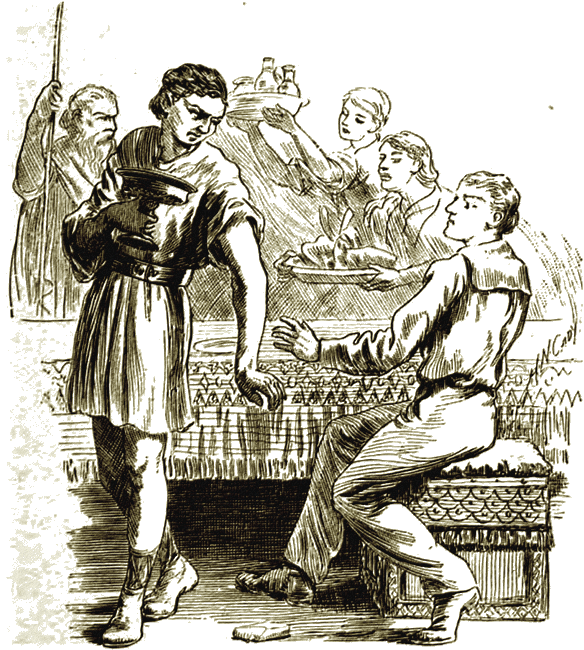
When the old man and his followers had retired, Rollin complained of feeling very tired and went to the sleeping-chamber assigned him, motioning Ben to follow him. Dropping the curtain before the door, he placed a lamp upon one of the tables and proceeded to examine the package. It appeared to be a small piece of the white matting paper, folded several times. On unrolling it he saw that the inner side was covered with writing, a portion of it at least in English. In great agitation he bent over it and began to read. He had not deciphered a dozen words when he sprang to his feet, his eyes glittering and his face as pale as death.
"What is it, lad?" asked the sailor, in alarm.
"My father!" ejaculated Rollin, in a low, choked voice, "read! read!"
THE page was divided into two portions, one in the English language, the other a French translation. The English portion ran as follows:
I have learned that a white boy and man have found their way into the country. I have had them brought to this place in the hope of communicating with them. If they read either English or French, I implore them to write me an answer to this letter. I am an American and my name is Faulkner. I was the owner and captain of a vessel called the "Swallow." I was taken from my ship by violence and put ashore. After incredible hardships I reached this country. By a singular coincidence I was compelled to become at once its king and a prisoner. I am not allowed to leave the portion of the building assigned to me, or to see or speak with any one. When I left my native country I had a son living. I do not know what has become of him. I wish to try and communicate with him or some of my friends. If this is received and understood, send a reply by the man who brought it. He can be trusted. Be cautious: any one holding intercourse with me would risk death.
Rollin and the sailor stood looking at each other, in indescribable agitation. The boy especially was nearly overcome; his limbs trembled under him and he was unable to utter a word. The one faint hope of finding his father had sustained him through all the dangers and hardships of his remarkable journey; but now that it was fulfilled in so strange a manner, he could hardly believe it.
His father was really alive and under the same roof with himself—perhaps within a few yards of him at that very moment! Yet he was forbidden to see him under pain of death. That thought aroused him from his bewilderment. His breast swelled with resentment; and acting on the impulse of the moment, he started toward the door with a hasty step.
"What are you going to do, lad?" said the sailor, restraining him.
"Why, Ben," exclaimed he, angrily, "does not my father say that they are keeping him a prisoner here?"
"Just so," replied Ben, quietly, "and he says more besides."
"I am going to get him out," said the boy. "He is in this building and I won't be kept from him."
"Let's argy this matter," expostulated Ben, "and not go off like a couple of water-soaked rockets, without no effect, whatsomever, except a fizz and a bad smell."
"They have no right to imprison my father, who is an American citizen and not one of these half-civilized Orbellos," persisted Rollin, obstinately.
"No more they have," replied Ben, quietly; "but to go and get a couple of them big spears punched into our bread-baskets won't help him and would be a waste of raw material besides. No, no, lad, we must go to work systematic-like, and lay one coil of the cable fair and square on another, so it will run all smooth and clear when the time comes. Now, you'll grant, I suppose, that your father is a man of learning, judgment, and sense?"
"Yes," was the somewhat impatient rejoinder.
"And if he tells you a thing you believe he knows what he is talking about?"
"Yes, yes."
"Furthermore and lastwise, isn't it the duty of a son to obey his father and a seaman his commander?"
"Yes, yes, of course," replied the boy, "but come to the point."
"Well, since he tells you that he is not allowed to see any one, and that if we try it on we shall stand a good chance of being run up to the yard arm, you may make up your mind it is true. Then again, since he orders us to write to him, it is your duty as a son and mine as a seaman just to write, and nothing more, till further orders."
"What do you advise, then?" said Rollin, hesitatingly.
"Why, what I said—write an answer to his letter. Tell him who we are, and ask him to send instructions what course we are to sail. Tell him we are here to get him out of limbo, and don't mean to leave till it is done. If he wants us to do it by fighting, you can say Ben Bark considers himself under his orders, the same as ever, and stands ready to match himself agin any twenty of these heathen at a moment's notice. If he prefers circumwention, let him give us a hint and count upon us to carry it out. Them there," said Ben, judicially, "is the pints as I should convey in the letter, and then wait for the captain's answer."
"I believe you are right, Ben," replied Rollin, thoughtfully. "I will write and ask what he wishes us to do."
He sat down at the table and, tearing some blank pages out of the pocket diary which he carried, wrote:
My dear Father:
I know you will be greatly surprised to learn who the white boy and man, to whom your letter was addressed, really are. I am your son Rollin, and my companion is Ben Bark. You remember Ben; he was a sailor on board the Swallow when you commanded her. We have with us also an Australian native, whom we call Polly, who is our friend and very faithful and brave.
Dear father, we have come on purpose to find you: In spite of what Cousin Chadwick told us I always knew you were alive, and I was sure I should see you again. I discovered your chart in the cabin of the "Swallow" and that set me upon the right track. I persuaded Ben, who felt about Cousin Chadwick as I did, to join me. We deserted together and took one of the boats. Chadwick pursued us a long distance, but I blew up his boat with a torpedo of my own invention. Ben thinks we have not seen the last of him and that he will follow us even here. We went through many hardships and came very near perishing many times, but we persisted and arrived here at last.
We do not understand what you say about being the king of this country and a prisoner at the same time, nor why they should wish to keep us from seeing you. But we are determined to liberate you and will not rest until we have succeeded in doing it. Give us your advice and we will do anything you direct, except go away without you. Do not ask us to do that, for we could not consent. We are all three—for Polly is one of us—strong, determined, and well-armed. Shall we try stratagem, or force our way to you openly by fighting, if necessary?
Please answer at once, for we are anxious to begin work.
Your affectionate son,
Rollin Faulkner.
"Ship-shape and to the pint," said Ben, approvingly, when Rollin had read aloud what he had written. "There ain't many afloat or ashore as could put together as neat a bit of English as that there. Ah, a wonderful thing is learning, lad. I might have had just them sentiments, but I could no more put them on paper than the ship's figurehead. Sentiments is like wine in a bottle without no corkscrew. Learning is the corkscrew, d'ye see?"
Without replying, for he was too deeply agitated to be amused at his friend's quaint approbation, Rollin folded his letter in readiness for the messenger when he should return. Then the two companions sat down to wait with what patience they could summon. Ben smoked his pipe with an assumption of philosophical coolness which his anxious face belied, while every now and then Rollin sprang to his feet and paced the floor in irrepressible excitement.
At length toward three o'clock in the afternoon, there was a sound of footsteps in the corridor, and Rollin and the sailor hastened to join Polly and Uli in the outer room. The matting over the door was raised and the old gentleman with the white staff entered, followed by his three assistants, one of whom was the man who had given Rollin his father's message in the morning. The boy seated himself near the table and waited quietly, with his eye upon this man. It was not long before he passed close to where the boy sat. Rollin instantly pushed the letter he had written into his hand unobserved by any one. With a rapid sign of intelligence, the man concealed the letter in his dress and presently, having completed his duties, left the room with the others.
Though the meal which had been prepared for them might have tempted an epicure, Rollin was unable to eat; and even Ben, whose appetite few things discomposed, did scant justice to the feast. Uli, whose simple, straightforward mind was incapable of suspicion, saw nothing of this; but Polly, squatting, as usual, upon the floor with a dish between his knees, cast inquiring glances, from time to time, at his two white friends.
The next four hours seemed positively endless to Rollin and Ben. They felt themselves to be in a critical position. A word from the man they had trusted would betray all and frustrate the object which they had travelled so far and suffered so much to accomplish. Should he prove treacherous or be detected, their lives, as well as Captain Faulkner's, might pay the forfeit. The relations of the latter with the Orbellos were as yet inexplicable to the friends. He had spoken of himself as their king, and yet as a prisoner with whom intercourse would be fatal. It was a paradox which they could make nothing of. The whole situation seemed full of mystery and peril, and they awaited the reply to Rollin's letter, which might throw some light upon it, with the deepest anxiety.
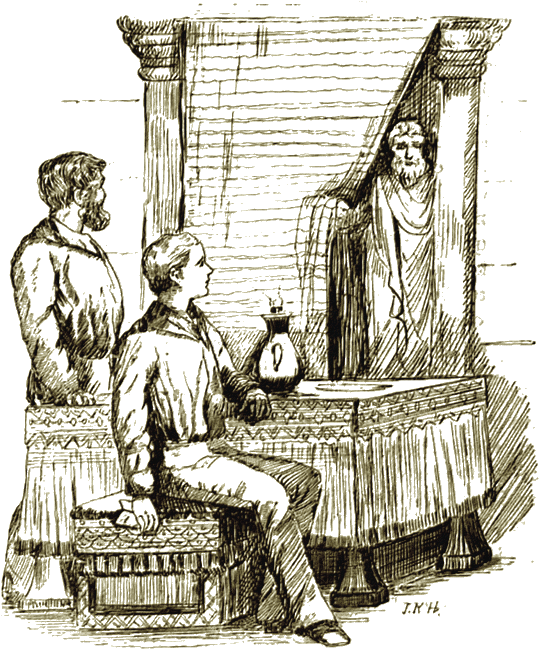
It was nearly eight o'clock before the aged major-domo and his assistants reappeared with their evening meal. In spite of the danger of detection Rollin could not help fixing a questioning look upon the face of the man who had taken his letter. But he remained impassable, busying himself about the table with an air of the utmost indifference. Just as Rollin was on the point of giving up all hope, for that night at least, the man passed him hastily and stumbled against his chair. At the same moment the boy felt something thrust into the breast of his jacket. The man recovered himself with a muttered apology and went on.
Though burning with impatience, Rollin managed to sit through the meal. But as soon as it was over, he retired at once to his sleeping-room, followed by the sailor.
"Well?" said the latter, inquiringly, as soon as they were alone.
"Yes," replied Rollin, drawing a packet of matting-paper from his breast, "here it is."
After carefully securing the curtain over the door, Ben sat down beside Rollin, who unfolded the packet and began to read in a low eager voice:
"My dear Son:
"I am indeed greatly surprised to learn who my visitors are. At most I hoped you might be from my own country, which I have not seen for so long a time. When they told me your age I thought of my own boy, Rollin, whom I had left in far-off America and whom I never expected to see again. I ordered you and your companion to be brought here and treated as my guests. I hoped to obtain from you some news of the outside world, and perhaps through you to communicate with my friends, who must believe me dead long ago.
"Your presence here, my dear son, gives meat once pleasure and pain. It assures me that you are alive and well, and that you have not forgotten your unhappy father, but at the same time it places you in a position of great risk and peril. One imprudent word, one false step would destroy you, for I should have no power to help you. These people are very mild and intelligent in most respects, but stern and immovable in all that relates to their religion. If it were suspected that you had communicated with me, or intended to do so, the whole nation would rise against you. Let me try and explain in a few words.
"You have perhaps already learned that these people worship God under the form of fire. The government is religious, and the authority is vested in the Goyolloman or priest-king. While his person is regarded as sacred and he is venerated as the living representative of the Deity, he is bound by laws more severe than those governing any of his subjects. He resides entirely alone, in a part of the palace separated from the rest, where he is practically kept a prisoner while he lives. No one is allowed to see or speak to him on pain of death. Even his own officers and servants, who are selected from the highest ranks of the nobility and never leave the palace, receive his orders and deliver their reports, which are always in writing, through a small opening in the wall. So you see, my son, the position of the Goyolloman is by no means an enviable one, at least according to our ideas.
"You will wonder how I, a stranger of a different race, became king of the Orbellos. It is a remarkable story. Many years ago, while cruising on the coast of western Australia, I spent some months exploring the country, which was then wholly unknown. I made many interesting discoveries, and among the various traditions and superstitions of the natives I found one which puzzled me exceedingly. It was a single word, apparently without meaning or connection. Every one had heard it, but no one could explain it. It was never pronounced without awe and reverence; yet when I questioned the natives they grew confused, answered vaguely that it was 'a great god who dwelt under the sands of the desert;' or 'a wonderful place full of gold and jewels where demons dwelt,' or some other statement equally wild and senseless. This word, as you already guess, was Oo."
"My curiosity was strongly excited. As there never is a rumor or tradition without some truth at the bottom of it. I felt sure that Oo, whatever it might be, really existed, and I resolved to find it and solve the mystery. As all of the stories agreed in placing it 'many days journey to the southward,' I explored the country in that direction, following the course of the Darke River, which flows southerly for several hundred miles. My efforts were without success, except to confirm my belief in the existence of Oo, and to make me still more resolved to find it. On the last of these expeditions I penetrated as far as the great lake. Here, utterly exhausted, sick with fever and starving, I was forced to halt. Had it not been for the kindness of a friendly chief I should have perished. From him I obtained much valuable information in regard to Oo. One of his ancestors had visited it many years before, and it was his story of the wonders he had seen there, preserved in his family, which the old chief related to me. I jotted down what he told me upon a rude chart which I made from the bark of a tree, my writing materials having been destroyed. It was this chart which you found.
"After many hardships I returned to the Swallow, which I had left in Kings Sound at the mouth of the Darke River, in charge of my first mate Chadwick. I trusted Chadwick thoroughly. He was my relative, and I had done him many favors. He knew my hopes and plans. He seemed to take a deep interest in them. But my story of the wealth of Oo and the inexhaustible treasures of gold and precious stones to be found there had aroused the demon of avarice in his heart. Something in his manner awakened a doubt of him in my mind, and I withheld what I had learned as to the probable situation of Oo. I also concealed my chart, to prevent it from falling into his hands. My doubt was only too speedily confirmed.
"One night, soon after my return to the vessel, he entered the cabin where I sat, followed by two of the crew. I was seized, bound and gagged, and put into a boat. They took me to a barren island and there left me. The island was but a short distance from the mainland, and knowing I must soon perish if I remained where I was, I managed to construct a raft upon which I reached the continent. The nearest settlements were upon the southern coast, a thousand miles through unexplored wildernesses, among hostile tribes. If the old chief was right, Oo lay between me and these settlements. I resolved to try and reach it. I will not pain you, my son, with the story of those long months of hopeless, desperate struggle with every form of misery and hardship. Suffice it that I reached this place at last.
"The Orbello laws condemn all strangers to death; but ragged, starving, wretched as I was, my appearance was hailed with the wildest signs of delight. I was led into the city in triumph, clad in rich robes, and installed in this palace as king of the Orbello people! It was all like a strange, fantastic dream to me. It was some time afterward before I learned why this honor had been so unaccountably bestowed upon me.
"Some time before my arrival, the former king died suddenly without naming his successor. The Orbello throne is not inherited, and the sovereign alone has the power to select the one who shall fill his place after his death. The country was therefore without a head. Added to this, upon the very day of the king's death a great storm had extinguished the fire upon the tower for the first time in many centuries. The Orbellos believe that the fate of their nation depends upon this fire, and the double disaster had plunged the country into the deepest gloom, for it seemed to forebode nothing less than the utter extinction of the whole race. An ancient tradition had predicted this catastrophe. It foretold the appearance of a white stranger from the north, who would relight the fire upon the tower, fill the vacant throne, and so save the country from impending ruin. I was declared to be the while stranger from the north indicated by the tradition. I was made king and relighted the fire upon the tower amid universal rejoicing. This is why you find your father, a plain American citizen, the unwilling sovereign of this strange nation.
"Many, many times during my long residence here, a prisoner in solitary grandeur, seeing no human face, hearing no human voice, I have thought of you, my son. I have revolved many plans of escape in my mind, but all have proven futile. I am closely watched and guarded night and day, by those who believe they are doing their duty to God in keeping me separated from the rest of the world. Now that you have come so far to see me and have shown so much courage and devotion, I will endeavor with all my power to devise some means of regaining my freedom. But you must not try to come to me, either by force or in secret. Both means would fail and certainly insure your destruction. I implore you, Rollin, to heed what I say. I know these people better than you. Leave it all to me. If there is any way I will discover it and let you know. Some chance may occur to assist us. But in any case, obey me to the letter. By exercising great caution we can communicate in writing, for the messenger is devoted to me and may be trusted.
"I do indeed remember Ben Bark. Tell the honest fellow I am deeply indebted to him for his devotion to you and to me, and that I may some day be in position to repay him.
"You will hear from me again soon. Meantime, remain quiet, do nothing to arouse suspicion, and, above all, make no attempt to reach me until I direct you to.
"Your affectionate Father."
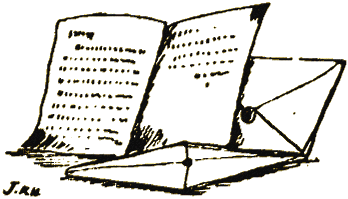
THROUGH their friend Uli, who seemed to have made up his mind to remain with them during their stay in Oo, the travellers learned that they were not expected to confine themselves to their apartments, but were at liberty to visit any portion of the building except that occupied by the Goyolloman. They might also go about the city freely, but would not be allowed to leave it without the Goyolloman's permission. Rollin was not slow to avail himself of this opportunity. In spite of the danger, he by no means despaired of finding some way of reaching his father and obtaining his freedom. That these half-civilized Orbellos should have the power to keep his father a prisoner, in compliance with their superstitious laws, angered him. He spent much of his time wandering about the twilight streets of the strange subterranean city, or among the labyrinth of corridors in the palace, revolving plans for his fathers escape in his mind.
He was treated with great courtesy by the officers inhabiting the palace, but when he ventured too near that part occupied by his father, he observed that a sharp but respectful watch was kept upon his movements. The Goyolloman's apartments were in the centre of the building and enclosed in a wall of solid masonry, with but one door. At this door two elderly men, whose dress indicated the highest rank, kept guard night and day, and in the adjacent halls and passages there was always a number of richly-clad soldiers pacing to and fro.
It was evident to Rollin, therefore, that any attempt to approach his father in this way must result in disastrous failure. But though irritated and saddened, he was not discouraged. There must be some way to accomplish his purpose, he thought, if he could but discover it. He held many consultations with Ben, but to little purpose. The simple-minded sailor regarded the wishes of Captain Faulkner as the commands of his superior officer, which he was bound to obey without cavil or question. "The Captain's orders is to do nothing until he passes the word," he would say. "It is for us to do it and belay jaw-tackle."
This advice seemed cold-blooded and cowardly to Rollin. He felt as if he could not sit passively and wait for some favorable moment which might never come. Hence, as we have said, he spent his time wandering about, turning over various plans in his mind.
In this way several weeks went by. His time was not wholly lost, however, inasmuch as he made himself familiar with the city, the knowledge of which, he thought, might prove of service in his plans to rescue his father. With the same object he studied the Orbello language industriously, and was soon able to converse with considerable ease.
One day, after a long ramble through the city, he found himself in the outskirts, where the houses ceased and the street by which he had come ended abruptly against the wall of rock. It was an ancient part of the town, and some of the dwellings were deserted and ruinous. Heaps of broken rock and rubbish covered the ground for a considerable space. There were no lamps in the immediate vicinity, the only light coming from those in the distance.
It was a strange, gloomy place, and Rollin sat down upon a heap of fragments and looked curiously around. Just before him the ground sloped sharply downward, making a circular pit, whose extent and character he could not see on account of the darkness. As he bent forward to obtain a better view of it, the stones and earth suddenly gave way beneath him and he slid swiftly downward, striking the bottom with a shock, amid a shower of rubbish dislodged by his fall.
For a moment he lay stunned and breathless; then he arose to his feet and endeavored to discover where he was. Some distance above his head a circular opening, faintly illuminated, marked the mouth of the pit down which he had fallen. To his surprise he felt a strong draught, laden with a damp earthy smell, blowing against his cheek. As his eyes grew more accustomed to the darkness, he discovered the entrance to a good-sized tunnel or passage leading away on either hand. It was evident that he was in a ruinous shaft which had formerly given admission to some ancient corridor or subterranean way beneath the city, probably long since forgotten by the inhabitants.
His first impulse was to climb out of the pit His next was to explore the tunnel. With his father's escape always in his mind, it occurred to him that he might chance upon some discovery which could be turned to account. One branch of the tunnel appeared to lead away toward the centre of the city, the other toward the wall of rock surrounding it. As the latter might prove a means of exit from the city, in case of need, he determined to try it first. Without pausing to reflect upon the possible danger of what he was about to do, he stepped into the tunnel and went boldly forward.
For a hundred paces or more he proceeded without much difficulty. By stretching out both arms he could touch the walls on either side with the tips of his fingers. But now he came to a point where the rock seemed suddenly to recede and he could not touch it at all. His footsteps, too, sounded loud and hollow, proving that the tunnel had widened into some sort of chamber. It was not likely, he argued, that this chamber could be the termination of the tunnel. By going straight across he ought to find the continuation upon the opposite side. It was absolutely dark and he could only advance a step at a time, with his arms outstretched.
At length his right hand touched the rock again, but with his left he could feel only the empty air. He had, therefore, reached the wall of the chamber, and by following it he must soon find the opposite opening of the tunnel. He groped onward seventy or eighty paces in this way, without coming to it. Could he have passed it unaware? If so, the sooner he turned back the better. While he was debating this question, he was brought to a sadden halt by an alarming discovery. The foot with which he was cautiously feeling the way before him, found no further resting-place. He knelt down and passed his hand over the rocky floor.
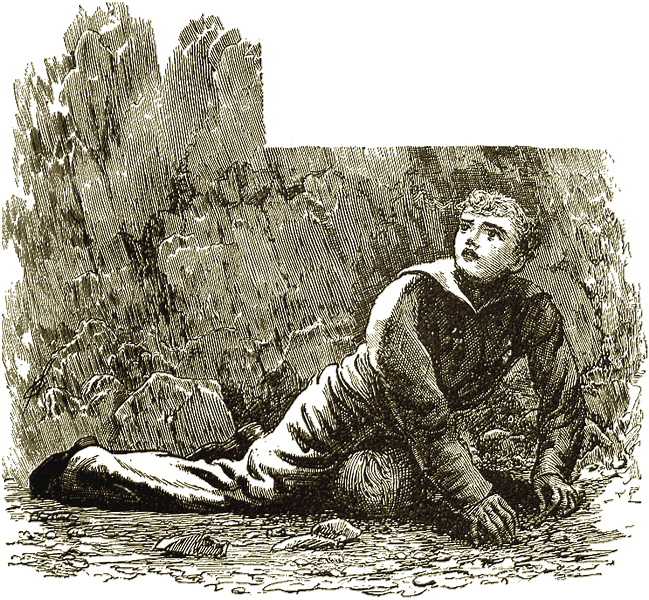
Less than eighteen inches beyond where he stood the floor ended in an abrupt chasm of unknown depth. He picked up a stone and threw it outward into the darkness. There was a silence of some seconds, then the faint plash of water ascended to his ears. He drew back from the frightful precipice, over which he had been upon the point of plunging, with a shudder.
Considerably shaken, he turned about to retrace his path, and in doing so withdrew his hand from the wall for a moment. To his intense anxiety he could not find it again. He stood for a moment indecisive, then began to advance in a new direction, feeling his way before him as he went. He had not taken three steps when he found himself upon the brink of the precipice again. Starting back, he once more changed his course, only to be confronted by the same terrifying obstacle. It seemed as if he were completely hemmed in by an impassable abyss.
He stood still, not daring to move, his heart beating loudly in the dead silence, and the cold sweat starting out upon his forehead. He bitterly repented now the rash impulse which had led him into this fearful place without a light. He searched his pockets in the hope of finding a match, but in vain.
After a time he mastered his terror somewhat, and, getting down upon his hands and knees, crawled slowly and with the utmost caution in what he believed to be the direction from which he had come. Finding himself upon the edge of the precipice again, he skirted it, keeping it upon his right hand. For nearly half an hour he proceeded in this way, until he really began to fear, impossible as it seemed, that the precipice did indeed surround him on all sides, when to his great delight his hand encountered the rocky wall. Arising to his feet he groped onward, and almost immediately discovered the opening of the tunnel. Whether it was the one he was seeking or not, he had no means of knowing, but he entered it at a hazard.
He had travelled, as he judged, more than a hundred yards, when he observed a pale light glimmering some distance beyond, and in a few moments more he emerged into the open air, with the blue sky and the sun shining overhead. Exhausted with terror and fatigue, he seated himself upon the ground to rest. He was evidently outside of the city, not upon a level with the surface of the earth, but in what looked like an extensive quarry, sixty or seventy feet in depth and three hundred paces in diameter, with precipitous sides. A portion of it appeared very ancient, while a small space, opposite to where he sat, seemed to have been recently worked.
After a few moments he arose and began to inspect the place. The bottom was covered with heaps of rock, broken into small fragments. The sides were pitted with shallow cavities and seams, before which lay piles of stiff, bluish clay and loose sand which had been dug out of them. While he was wondering what it was that the diggers had been in search of in these excavations, his eye was attracted by a small, glittering object in the mound of clay at his feet. He picked it up, and, rubbing the soil off it, uttered a cry of amazement. In spite of its roughness, it shone in places with keen, many-colored fire. It was, in fact, a diamond, pure white, and when cut would make a gem as large as a hazel-nut.
He now remembered to have read that diamonds are found in this bluish clay, and, kneeling down upon the pile before him, he began to dig into it with his pocket-knife. It was not long before he unearthed another stone, even larger than the first, and then several smaller ones, all apparently pure and very valuable. But important as they seemed to him, the diggers had evidently thrown them out with the clay as of no use to them.
He knew that among the Orbellos diamonds and other precious stones have no value, except as emblems of rank. Therefore the diggers had discarded as refuse, in this one heap, what would have been equal to a large fortune in Europe or America, where even the smallest stone brings an extravagant price. He abandoned his search in the pile of clay and entered the excavation nearest him. A very little digging in its sides convinced him that the soil was literally filled with gems.
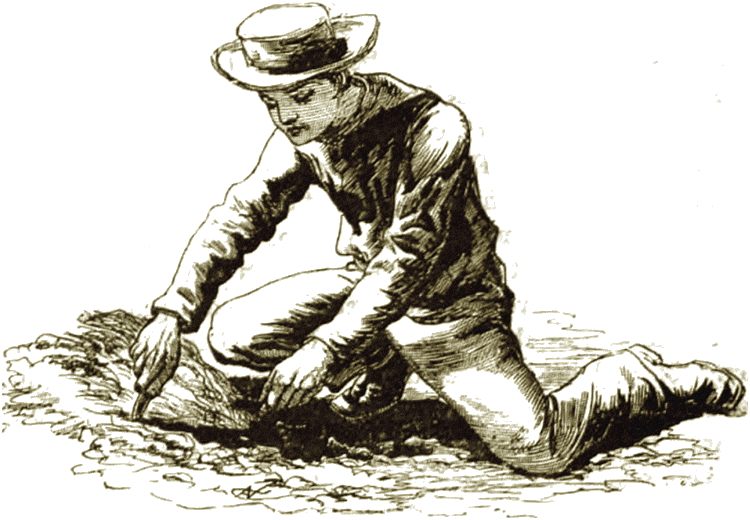
At another time such a discovery might have greatly excited him; but he was now too anxious about his father's fate as well as his own to take much interest in it. After securing two or three good-sized stones, he came out of the cavity and continued his explorations. He found that the clay-pits occupied but one side of the quarry. Farther on the solid rock cropped out of the soil and was split into wide seams, filled with coarse yellow sand and gravel. Some of these seams had been excavated. Pausing a moment in his walk, he examined a handful of the gravel. He was rewarded by another discovery, no less remarkable than the first. This time it was not diamonds, but oblong pebbles, translucent, and of a deep-red color. One of these pebbles, partly polished by friction against the others, revealed their character. They were rubies. These beautiful gems are now rarely found, the mines being exhausted; hence they are highly esteemed.
There seemed to be an infinite number of them of all sizes among the gravel heaps, but he did not pause to explore them. Continuing his tour of inspection, he came to an immense pile of boulders, nearly round, and from six inches to a foot in diameter. These boulders were evidently not native to the place, but had been brought from a distance. Two or three which had lodged along the sides of the slope showed where they had been dumped down from above. He observed that all around this pile, and strewn over the bottom of the quarry, were broken fragments of the boulders which had been split open by artificial means. Attached to the inner surface of some of these broken pieces he found small green crystals.
After a little thought he concluded that these green crystals must be emeralds, and that the boulders had been broken to obtain them. No doubt the unbroken boulders likewise contained emeralds. He knew that among the Orbellos the diamond was the emblem of the highest rank, the emerald of the intermediate, and the ruby of the lowest. This quarry, then, supplied them with the diamonds and rubies, which were found in the soil, and the boulders containing the emeralds had been brought from elsewhere, the gems being extracted by the workmen here. Comparatively few being required for decoration or ornament, this vast deposit of wealth would be regarded by the Orbellos as possessing but little value. The existence of the great Kimberly mines in South Africa, from which millions of dollars worth of diamonds have already been taken, was known for many years to the white Dutch settlers and natives of the region, who considered a fat ox more valuable than all the diamonds put together.
As Rollin walked on, thinking of all this, an idea suddenly flashed into his mind. He had just discovered the source of those rumors and traditions, current among the tribes of the North, which had led his Cousin Chadwick to commit so many crimes, to search so long and diligently, and to pursue himself and Ben so far into the wilderness—the cause of his father's misfortunes, and all that had followed. He now understood the meaning of that mysterious symbol upon his father's chart, near the site of Oo and the Burning Tower.
0o. The place of infinite wealth!
ROLLIN found a slope in the walls of the quarry which he might easily have ascended, but he hesitated, reflecting that if he did so and re-entered the city by the gates, he should betray the fact that he had discovered a secret means of getting out. He wished to avoid this on all accounts. Besides, he had been told that he must not leave Oo without the Goyolloman's permission. Here other dangerous complications might arise. He ought therefore to return by the way he had come. But dared he attempt it? Could it be possible to find his way back through all the windings of the underground passage, where the first false step might plunge him down some frightful precipice?
If he had a lantern or torch it would be a different matter. There was a quantity of light, dry wood lying about, and all he needed was a match. He searched through his pockets again without success. Then he took off his jacket and examined the lining. To his great relief he found a single match which had slipped through a rent in the pocket.
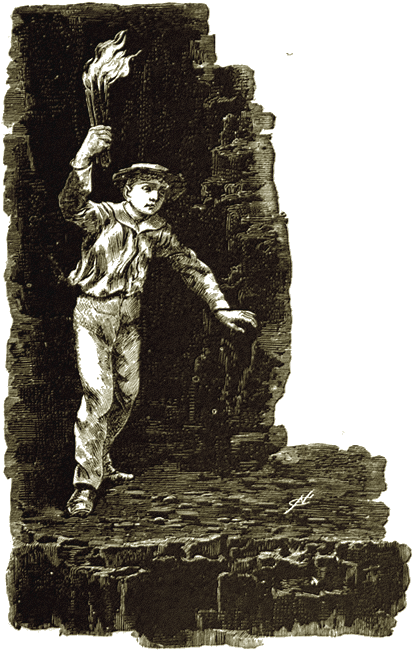
Gathering a handful of the sticks, he went back to the mouth of the tunnel, which he regained with some difficulty, owing to the shrubs and weeds which grew before it. Striking his match with great caution, he ignited his sticks, which gave out considerable light, and entered the passage. Aided by the light, his progress was rapid, and it was not long before he reached the chamber where the tunnel branched off. He now saw that the chamber instead of being, as he supposed, a circular excavation, was a natural cavern, of great extent and irregular form, across the floor of which, on one side, ran a wide chasm of unknown depth. It was along this abyss that he had groped in the darkness. The boy shuddered at the dreadful pitfall which he had so providentially escaped.
The continuation of the tunnel opened at right angles into the cavern, and not directly opposite, as he had imagined, and this was why he had gone astray. With his torch, however, he had no difficulty in finding it, and a few minutes later he climbed out of the pit into which he had fallen, and stood in the deserted city street.
As he walked homeward he debated whether or not he should relate his adventure to Ben. He finally decided to say nothing about it for the present. Another idea had come into his head—an idea that made his heart beat with mingled hope and doubt, and he wished to run no risk of interference from the well-meant obstinacy of the sailor. His friends observed that he was silent and absorbed during the remainder of the day. The seaman cast an anxious look at his pondering face from time to time, but said nothing until just as they were parting for the night. Then entering Rollin's bedchamber with him, he sat down and gazed at him steadfastly, but with his old, kind, affectionate expression. "Look here, lad," he said, "what do you suppose old Ben would do in this here no-man's land, or in the whole world, for that matter, if you was took from him?"
"Why do you ask that, Ben?" inquired the boy, wonderingly.
"And how," continued Ben, without replying, "do you suppose your father would feel, and him not having seen you in all these years, and living on the hope of seeing you when, in his judgment, it is safe and right?"
"If such an accident should happen," answered Rollin, beginning to understand the sailors meaning, "I am sure you would both feel very badly."
"Well, then," said Ben, laying his hand affectionately upon the boy's shoulder, "for both our sakes, don't."
The boy remained silent, with averted face.
"Because I know," said Ben, "that you are planning something in your head, and I know that no matter how clever your idea may be—and it's bound to be clever—it must be full of danger. I ask you, lad, to consult your father first. Will you do that much?"
Rollin still remained silent, wishing neither to admit nor deny the truth of Ben's suspicions.
"Well," added the sailor, with a sigh, "one thing you can do at least; that is, let me go along with you, on conditions as I don't open my jaw, nor interfere with anything you wish to do, only stand atwixt you and danger when it comes. Will you do that much, lad?"
Rollin turned about and grasped the sailors hand warmly.
"You are a good and true friend, Ben," he exclaimed, "and I thank you; I promise you not to carry out any plan without consulting my father, and not to undertake any real risk without you. Will that satisfy you?"
"Aye, aye, lad," replied Ben, his rugged face lighting up. "Thankee! dear boy; thankee for them words!"
And with a look of great relief he went away and left the boy to his meditations.
Early on the following morning Rollin left the palace, taking with him a compass, which was among their baggage. The street behind the palace led almost in a straight line to the opening into the tunnel in the outskirts of the city, which he had discovered the night before. Beginning at the wall of the palace he counted his steps, making each stride as nearly equal in length as possible. He found the whole distance to the opening into the tunnel to be fifteen hundred and sixty-six paces. This was, of course, a loose way of measuring, but it was the best at hand, since if he had attempted any more accurate method he would surely have attracted the notice of the inhabitants.
Arriving at the tunnel, he set his compass and carefully noted the bearings of the palace, which, being brilliantly lighted, was plainly visible from his position. He then returned, pacing over the ground as before. He made the distance this time fifteen hundred and eighty-nine paces, or, allowing two feet six inches to a pace, a variation of forty-two feet from his former estimate. Considering the distance, this was not bad, but it was still too wide for his purpose. He therefore went over the ground once more each way; getting fifteen hundred and sixty paces going, and fifteen hundred and eighty-one coming. He had, therefore, four measurements. Adding them together and taking the average, he found it to be fifteen hundred and seventy-four paces, which he thought would be near enough for his object.
Returning to his sleeping-room, he managed to secure unobserved one of the lamps, which he concealed under his jacket. He also provided himself with a number of matches from their stock. Thus prepared he went back to the tunnel.
He had explored one branch of the passage, that leading out of the city; he now proposed to explore the opposite branch leading toward the heart of the town. This branch seemed to follow the street which ran in a straight line toward the palace, and perhaps passed under the palace itself. This was what had given Rollin his new idea.
Like the tunnel, the palace was an ancient work. It was possible that there might be some connection between the two. The tunnel might have been originally intended as a secret exit for the inhabitants of the palace, by means of which they were enabled to enter and leave the city unobserved. If this were so, he might find a way of reaching his father undetected, either by discovering some forgotten entrance into the building above, or by breaking through the roof of the passage.
Entering the mouth of the tunnel, he lighted his lamp, and, holding his compass in one hand and the lamp in the other, he went forward, counting his steps and noting the direction by the compass. The passage seemed to follow the line of the street above, as he had hoped; but keeping count of his paces was a matter of great difficulty, owing to the accumulations of rubbish, broken stone, and dust through which he was forced to make his way.
At a thousand paces from the entrance he came to the opening of a second passage, at right angles to the course he was pursuing. It was very wide and spacious, and seemed to have once served some important purpose. Resolved to know the ground thoroughly, he decided to explore it—at least far enough to know whither it led. He followed it for some distance, and was about to give it up and return to his original task, when he discerned a faint gleam of light not far beyond. He soon came to a pair of dilapidated steps which terminated the tunnel.
Leaving his lamp behind for fear of detection, he mounted the steps and, pushing his way through a small fissure in the masonry, saw that he was in one of the disused vaults in the lower story of the Burning Tower. He fixed this discovery in his mind as of possible use to him in the future, and indeed it proved a most fortunate one in the end.
After resting here a few moments, he retraced his steps to the main tunnel. He had already covered a thousand paces from the mouth of the tunnel, leaving five hundred and seventy-four to go. When he had gone the whole fifteen hundred and seventy-four paces he made a mark upon the wall. Then he paced the length of the tunnel again twice over, comparing the results and locating the exact position which, according to his calculations, should be immediately beneath the outer wall of the palace. Fifty or sixty paces farther ought to bring him under his father's apartments.
He paused here, however, for he had worked many hours, and he was exhausted with fatigue and excitement. Besides he had now reached a critical point and needed the assistance of both his father and Ben. He therefore retraced his steps through the tunnel and returned home.
Arrived there he took the sailor into his bedroom and related the whole story to him. When he had finished, his friend sat gazing at him open-mouthed and in silence, a long while.
"This here," said the honest fellow at length, in a tone of almost respectful admiration, "beats all the navigation I ever heard tell of. I always said, lad, that you had the makings of a first-class commander, but now I say you are cut out for nothing less than admiral-in-chief of the whole navy. Its wonderful—won-der-ful!"
"And you think it will succeed?" asked Rollin, anxiously.
"Succeed!" repeated Ben, "will the sun rise to-morrow? In course it will. What's to prevent?"
"Then I will write to my father," said Rollin, "for I want him to understand my plan and be prepared to help me."
He immediately sat down and wrote out what we have related, asking his father to assist him in locating the position by rapping upon the floor of his apartments with some heavy instrument at intervals, until he should receive an answering rap from below. He knew that solid rock will convey sound for a long distance.
At supper time the letter was delivered to the messenger, and at breakfast the next morning Rollin received his fathers reply. It ran:
My Dear Son:
Your plan is admirable. I think it will succeed. I cannot thank you for your love and devotion now, for my heat is too full.
I will follow your directions to the letter. Between the hours of ten and twelve in the morning I will rap upon the floor every five minutes, changing my position each time; beginning at the outer apartments and working toward the centre. Good-by, my boy, and may Heaven bless and assist you.
AT half-past nine on the following morning Rollin and Ben were in the tunnel, at the point where the boy had paused in his explorations on the previous day. According to his calculations they had some sixty paces to go from this point to be under his father's apartments. They had advanced only a few steps forward when the passage suddenly expanded into a wide and lofty chamber, whose roof was supported by columns, many of them broken and fallen. This discovery seemed to prove that Rollin had not erred in his judgment, for the chamber was unquestionably the ancient vault or crypt belonging to the building above. It was of so great extent, however, and so choked with rubbish that the two explorers began to fear that they should never hit upon the entrance to the rooms above, if indeed such existed.
They groped onward until they reached the proper position as nearly as they could guess; here they halted and waited in breathless silence for the first signal from above. Many minutes passed and no sound was audible. Rollin was on the point of proposing a change to another part of the chamber, when Ben suddenly caught him by the arm. A faint hollow sound, hardly more than a murmur, seemed to be trembling in the deep hush of the place. Five minutes went by, then it was repeated, this time much nearer and louder than before. Rollin uttered a cry of joy. There could be no doubt of it now—it was his father's signal! His calculations were correct; they were beneath the Goyolloman's apartments.
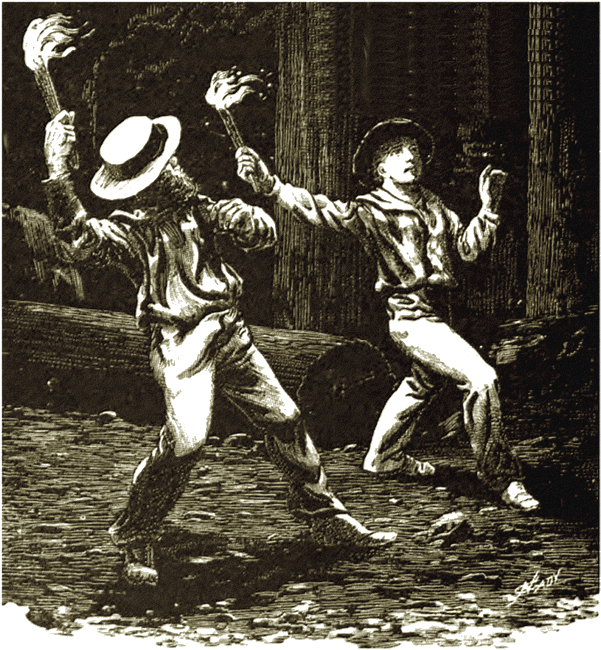
Seizing a large fragment of rock, Ben threw it violently against the roof of the chamber. Immediately a series of loud raps followed. The prisoner knew that his friends were at hand!
Rollin and Ben began at once to explore among the piles of rubbish for the stairway which the boy believed must lead to the apartments above. In that immense vault, shrouded in obscurity and choked with the ruin of centuries, it seemed almost a hopeless task.
But they were destined to be fortunate that day, for they had been searching hardly ten minutes when, at the bottom of a vast accumulation of broken masonry, splintered columns and dust, Rollin discovered what looked like the first step of a flight of stone stairs. Calling Ben to his aid the two friends set to work at the heap of rubbish and soon unearthed another step and a part of a decayed railing. Feeling sure that they were on the right track at last, they continued their labor with renewed energy. Fragments of rock, masses of stonework, and sections of fallen columns flew aside, amid clouds of dust rising round them like the smoke from a fire. Never had the sailor's Herculean strength stood him in better stead. He made nothing of burdens, which would have crushed two ordinary men, hurling them down with his brawny hands as if they had been chips.
After three hours of hard work, the stairway, much broken and decayed, but sufficiently sound to bear their weight was uncovered from the floor of the vault to the roof. The light of the lamp revealed a circular opening in the ceiling, which had been closed by large slabs of stone. But it seemed as if they had now come to the end of their resources, for without the proper tools they could not hope to remove such masses from their resting place. And how were they to procure tools?
For a moment they stood looking at the obstructions, the sole barrier remaining between them and the accomplishment of their hopes, Rollin with a discouraged glance—Ben thoughtfully. The latter broke the silence at length.
"Hold the light, lad," he said.
"What are you going to do?" asked Rollin anxiously.
"Lift those stones," was the quiet reply.
"Oh, Ben!" exclaimed the boy, "You can never do it. They will surely crush you."
"Perhaps," returned the sailor grimly, "I am going to try all the same."
While Rollin watched him uneasily, Ben mounted the steps until he was within a short distance of the roof then placing his broad shoulders against one of the slabs, threw his whole strength upon it. The ruinous stairs rocked and swayed beneath him. His great muscles stood out like ropes and his brown face turned a deep crimson with the tremendous strain. But though the dust and splinters fell around him like rain, the stone remained immovable.
"Oh Ben," urged the boy, "give it up! Don't try any more. It will kill you."
"I am going to lift that stone," growled Ben, drawing a deep breath and once more applying his shoulder to the slab.
For a moment his utmost effort seemed to be vain. Then with a crashing, grinding noise, the stone gave way from its fastenings. Slowly the sturdy back straightened up; bearing upon it the mighty mass, until with a sound like thunder, it fell aside, disclosing an opening through which flashed a brilliant light, while a voice was heard calling,
"Rollin, my son!"
"Here, father! here!" cried the boy, bounding up the steps.
A man with white hair and beard, prematurely aged, but handsome and upright still, arrayed in splendid robes, glittering with jewels, stood before him with outstretched arms. It was the Goyolloman, the unseen king of the Orbellos. For a moment Rollin hesitated, scanning his noble features eagerly, then he was folded in his father's arms.
For some time both father and son were too much overcome to speak, sobs choking the boy's utterance, while the prisoner leaned over him, stroking his hair and vainly striving to control his working features. The sailor stood a few paces distant, gazing at this affecting scene, and drawing the cuff of his coal across his eves from time to time. "Oh father! have I found you at last?"
"My son, my dear son! May heaven, which has defended you and spared me to this hour, be thanked!"
Raising his eyes, the royal prisoner saw the sailor's honest features, strangely contorted between the desire to laugh and cry at once. He extended his hand toward him.
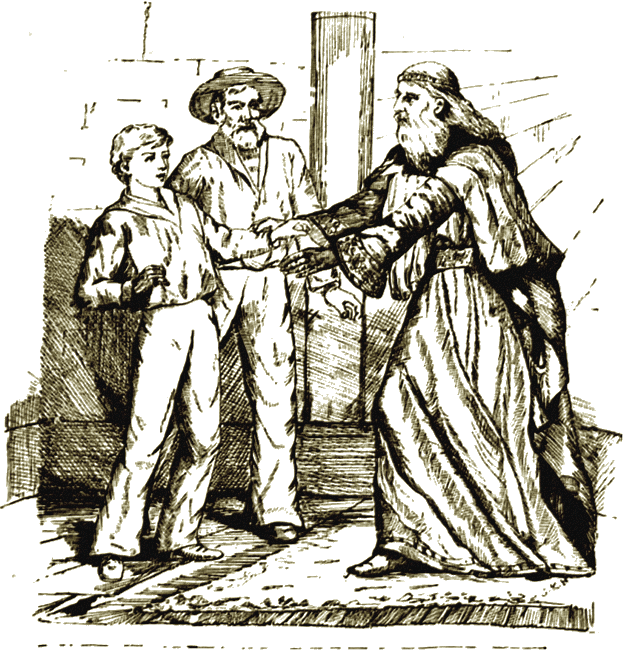
"Ben, my friend," he said, "how can I thank you for what you have done for my boy and me?"
"Captain, I—" the sailor grasped the outstretched hand and wrung it, while his voice broke, "I know its agin all discipline to make free with my superior officers, d'ye see, but this here is the happiest day of my life. Rollin, old chap, if it wasn't that them heathen blackguards might be listening around outside, with the captain's leave, I'd like to call for three times three, with a will and a tiger on to the end of them." Then apparently remembering the respect he considered due to the captain, he drew back and touched his forehead by way of salute, "my duty, Captain?"
Drawing his son's arm through his own, and beckoning the sailor to accompany them, Captain Faulkner led the way into an adjoining chamber, where they seated themselves. They talked for a long time, for the father and son had many things to say to each other after their sad separation and their strange reunion.
Rollin would have persuaded his father to escape from his captivity at once, since he had now a safe means of doing so. But his father restrained his impatience, showing him that to attempt it without due preparation would surely result in disaster. The Goyolloman's absence would sooner or later be discovered and the whole country aroused at once. If they were captured he would be restored to his royal prison and more strictly guarded than ever, while his companions would be put to death.
He had learned, he told them, of a much shorter route from the Orbello country to the settlements upon the southern coast. The Goyolloman was never disturbed at night. They must therefore begin the journey at dark, thus gaining at least twelve hours start, before his absence was suspected. The two friends must quietly get their baggage together, with a sufficient supply of food, and transport the whole to the tunnel in readiness for the moment of escape. The evening of the third day was settled upon for the attempt.
It was now growing late and as they did not wish to awaken any troublesome suspicions in the minds of the officers of the palace, Rollin and Ben bade the Goyolloman, whom we must now call by his true name, Captain Faulkner, good night, and returned through the tunnel and the streets to their quarters.
During the next day the two friends and Polly—for with Captain Faulkner's consent, they had let the faithful savage into their secret—managed to convey a good part of their baggage, piece by piece to the tunnel undetected. When they visited the Captain in his apartments that night, they found him looking very grave and disturbed. They were greatly startled to learn the cause.
Their old enemy, Chadwick, had arrived in the country with his men! Urged on by his inveterate greed for the wealth he believed to exist in this unknown region, added to his desire for revenge, he had pushed forward surmounting every obstacle and eluding or overcoming every enemy in his way. He had come, it was evident, with no good intent. At the head of a well-armed and resolute party, he might work great harm before he could be restrained.
His first movements had revealed his determination. He had seized a strong position and defeating the Lundee detachment sent against him, had demanded a free passage through the territory to the city of Oo. This, as we have seen, was contrary to the Orbello laws, which stringently exclude every stranger, under penalty of death. The Taybo of the district which Chadwick had invaded, had sent a courier to the Goyolloman informing him of the circumstances and asking for orders. Captain Faulkner had directed that Chadwick and his men be commanded to leave the country at once, in which case he was to be allowed to go unharmed. If he refused to do so, they were to be attacked in force.
"I hope," added Rollin's father, his face darkening as he spoke, "that he will be wise enough to take advantage of the leniency shown him."
While he was speaking, a gong in the outer apartment rang violently. This gong was used to summon the Goyolloman to the opening in the wall through which he received and transmitted communications with his officers and attendants. It was never rung after sunset, however. It must be something of pressing importance which had caused it to be rung now, Captain Faulkner arose and went out, returning after some time with a piece of matting-paper in his hand and looking still more anxious.
"I feared that Chadwick would cause trouble," he said, addressing Rollin and Ben. "I was right. A second courier has just arrived with this despatch. Listen: 'The strangers are corrupting the Lundee troops. Three companies have revolted and joined the strangers. It is feared that others will speedily follow and the rebellion spread unless prompt measures are taken to prevent it. The Goyolloman is earnestly prayed to send immediate assistance."
"Well," replied Rollin, with a smile, "it matters very little to us. Let them fight it out among themselves. We shall soon be far away from here."
"No, my son," said his father, "that would not be honorable or right. Though, according to our ideas, these people have treated me with indignity by keeping me a prisoner here, they have only done what their laws and religion commanded them to do. They have made me their ruler and depend upon me for their welfare. If I were to desert them now and leave them to the mercy of that evil man, thousands might suffer. They would be without a recognized head, and would, besides, feel themselves abandoned by heaven, whose representative they think I am. No, my boy, I cannot desert my post until this danger is past."
Rollin's face fell. He found it hard to agree with his father's ideas of duty. Ben, on the other hand, seemed to understand and approve of the captain's motives.
"Yes, lad," said he, "the captain is right. The commander can't desert the ship in a storm, no matter how leaky she is. If he was to take the boat and sneak off in the dark, who's to say how soon the vessel would founder with all on board?"
The boy sighed at seeing his hopes deferred, but he felt that his father and Ben must be right.
"No doubt you have heard that the Lundee are a subject race," said Captain Faulkner. "They have never become reconciled to their position, and need only a resolute leader to break into open insurrection. I am afraid they have found the right man in Chadwick."
On their way homeward that night the two friends found the whole city in commotion. The streets were crowded with people conversing in low, earnest tones. Rumors of coming trouble were in every mouth. When they reached their quarters they discovered Polly squatting upon the floor, chipping away industriously at a new spear which he was making. Rollin asked him what he was doing. Holding up the half finished spear with a significant gesture, he replied,
"Need him soon. Heap big fight come, one, three, six day, sometime. Plenty fun."
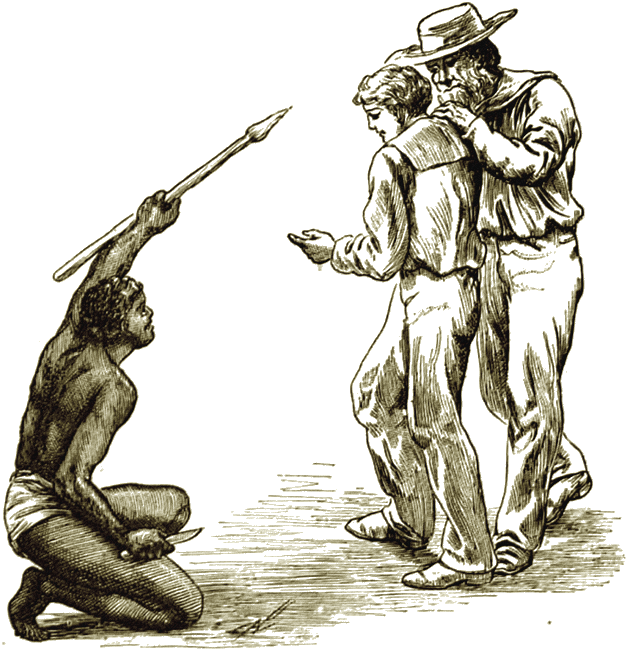
ALL night long the sleep of the friends was broken by the sound of hurried feet in the halls of the palace, the clang of weapons, and the haste and confusion of preparation. When they arose and went out on the following morning they found the popular agitation increased. Everywhere the doubt and gloom of approaching danger darkened the peoples faces. The very air of the subterranean city seemed oppressive with the weight of a gathering storm. Evidently the situation was regarded as more serious than the friends had been at first led to suppose.
At intervals the great gong in the city square, which is only rung in times of public danger or calamity, sent its sinister voice moaning through the streets, chilling the hearts of all listeners with an indefinable fear. Detachments of Orbello troops were marching to and fro, massing at various points in readiness for departure to the scene of trouble. As has been said, no Lundee ever enters the gates of Oo, or in the irritated state of the people's minds it would have gone hard with any of them who might have shown themselves.
The two friends made their way through the tunnel to the captain's apartments, where they found him at his table busily writing. He seemed graver and more anxious than ever.
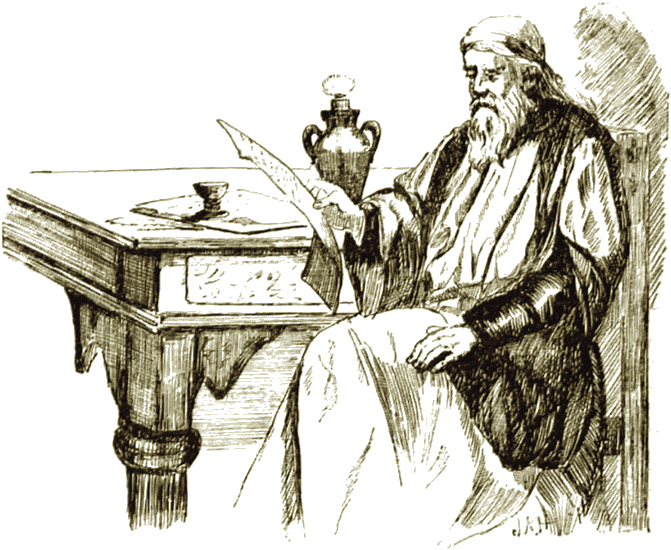
"The situation is indeed very serious," he said, in reply to Rollin's question, "The revolt is rapidly spreading. Chadwick has already gathered several thousands of the Lundee about him and is preparing to advance upon Oo. He holds out prospects of freedom and wealth to such as will join him. He evidently proposes nothing less than the overthrow of the Orbello nation. His original plan of robbing the people of some of their treasure and escaping with his booty has developed into a scheme of political conquest. He is ambitious and unscrupulous. Nothing would please him better than to make himself the despotic ruler of the country and master of its enormous wealth."
"Like a second Cortez in Mexico," observed Rollin.
"Exactly," returned his father. "But he has reckoned without me, the relative and friend whom he so cruelly wronged."
"What do you intend to do?" asked Rollin anxiously.
"The Lundee," replied Captain Faulkner, "outnumber the Orbellos two to one, and are all trained soldiers. If the Orbellos of each village had only to defend themselves against the Lundee belonging to it, fighting as they would from behind their stone walls, they could easily hold them in check. But Chadwick is far too shrewd to make such a blunder. He will draw off the Lundee and gather the whole body together. Having a large army under his command, he will march directly upon Oo, capturing the villages in his way, and endeavor to seize the city. Once master of Oo, it would be only a matter of a very short time before the whole country would be forced to submit. I have foreseen this, however, and tonight the whole available Orbello force will be marching to the defence of Oo, leaving only a small garrison in each town. The decisive battle will be fought here."
"I hope, captain," said Ben, "in this here scrimmage as is going to happen you wont forget as how old Ben is on deck ready to give a good account of himself."
"And I," interposed Rollin, eagerly, "I am only a boy, but I am large and strong, and, as Ben will tell you, I can hold my own in a fight."
"No, no," replied the captain, resting his hand affectionately upon the boy's shoulder, while he looked kindly at Ben, "I have found my son and my friend too recently to risk losing them again. But," added the captain, "I shall need every available help in the coming crisis, and you can both be of great service to me. You, Ben, shall have charge of a part of the exterior fortifications of the gate behind the defences."
"Them being the orders," responded the sailor, acquiescing with his usual good humor, "it stands to reason they must be obeyed. Though I should enjoy a rap or two at some of them ugly mugs all the same."
"You, Rollin, shall be one of my aide-de-camp. I cannot be present on the field in person, and I shall need some one in whom I can place perfect confidence to convey my orders and report how the battle is going. Thus you will both be comparatively safe and more useful to me than as mere soldiers fighting hand to hand in the field. Unless, indeed," he said, his face darkening with a momentary anxiety, "the day should go against us and the enemy penetrate the fortress. But I hope that will not happen."
"Very well, father," said Rollin, brightening, "all I wanted was to do my part."
At this point the Goyolloman was summoned by the gong to receive a communication from without, and bidding him farewell, the two friends retraced their steps through the tunnel. On returning home they found Polly still working away grimly at his weapons, and preparing for what he called "plenty of fun."
Upon Rollin's advice the remainder of the baggage was conveyed to the tunnel that night, together with a considerable quantity of food which they managed to accumulate. Whatever turn affairs might take they were now prepared for instant flight.
Troops were already beginning to arrive from the villages in large numbers. They were of course all Orbellos; not a Lundee was to be seen among them. The two friends went toward the gates of the city, where preparations for defence were going on with the utmost expedition. The city being invulnerable through the thick mass of rock beneath which it lay, at least to any means of attack in the power of the Lundee, the huge fortification around the tower must necessarily be the scene of the approaching contest. As to the tunnel leading out of the city, which Rollin had discovered, since it was unknown to the inhabitants themselves, its presence could not be suspected by the enemy. There was no danger, therefore, to be apprehended from that quarter.
The two friends mounted the tower, where a strange sight met their eves. We have said that the red flame on the tower, visible over the whole extent of the Orbello territory, was the sign of peace and security; and being changed to another color, gave warning of peril and disaster. The flame was now burning with a deep green hue, casting a strange livid glare far and wide over the surrounding country.
Beneath them, as far as the eye could reach, along the converging roads, bodies of troops were marching toward the city, pouring into the gates with a steady tramp, sounding like distant thunder in the silence of the night. As fast as they entered, they were assigned quarters in the fortress which they were to defend. It was a strange and solemn sight, and one that the friends long remembered, to see those hosts of fighting men moving onward in battalions and companies, their long rows of spear-heads and the ornaments of their uniforms glittering in the weird light of the tower.
Far to the south, above the rim of the distant hills, a crimson glare, shining upon the clouds, marked the burning villages in the path of the rebel army. Unable to sleep, the two friends remained upon the tower until the first gleams of day. All night long the green flame shed its ominous light over the country. All night long the glow of the burning villages illumined the clouds, and all night long, in a never ending stream, the soldiers poured into the gates of the imperilled city.
When the friends awoke late the next day they found an officer from the Goyolloman waiting for them with their commissions, assigning them to their posts in the army of defence. That a boy of Rollin's age should be entrusted with a responsible position seemed quite a matter of course to the Orbellos, since, as we have seen, their own boys are trained to arms from their twelfth or thirteenth year.
When they went out they found Oo wearing the aspect of a beleaguered city. Troops were encamped in the streets, fires were lighted, arms were being furbished up, and officers were running to and fro, receiving and delivering orders. Proceeding to the tower, they saw that the immense fortification was swarming with men. The battlemented roof was covered with them, sitting or lying about at ease, until the moment for action should arrive. The last detachments were coming in with haste and disorder, having been pursued by the vanguard of the enemy, whom they reported in great force, not more than fifteen miles distant. Indeed from their position on the galleries of the tower, they could plainly perceive the pillars of smoke, rising here and there from burning houses and grain fields fired by the revolted blacks.
In their character of officers, Rollin and Ben made a tour of inspection through the fortress. They were greatly reassured by the calm and soldierly bearing of the Orbello troops and their splendid order and discipline. Ben was especially pleased.
"When the time comes to beat to quarters, lad," he observed, "these men won't leave the guns until the last shot is fired. More's the pity they haven't no guns and are forced to do the business with them lubberly bows and spears. With a few six pounders and some grape, these chaps wouldn't leave anything of those black scoundrels out yonder but an ink spot and a smell of spoiled grease."
Among the defensive weapons piled upon the roof were a quantity of large stones and fragments of rock, intended to be hurled down upon the enemy at close quarters. Rollin was gazing at these stones with a serious air. Presently he turned to the sailor and said quietly,
"I've an idea!"
"Let us hear it, lad," replied his companion; "your ideas are always as good as gold."
"You see those stones," said he.
"In course," responded Ben, "and some of those black rascals will feel them, too, before long."
"They mean to hurl them down upon the Lundee when they come under the walls. Now my idea is to make them much more efficient by discharging them at a distance, like cannon shot."
"How will you do it, lad?" asked Ben.
"Give me twenty men out of your command, with axes and strong ropes," replied Rollin, "and come along with me. Look alive, Ben, we have no time to lose."
"Aye, aye, lad," said Ben, obeying cheerfully and without argument.
In ten minutes the two friends left the gales of the fortress, followed by the men, carrying the necessary tools. On showing their commissions to the officer at the drawbridge, they were allowed to pass without question. Leading the party across the plain to where he had observed some scattered trees, a little more than a mile distant, the boy examined and selected a number which he thought fit for his purpose. Pointing to these with his finger he uttered the single word,
"Cut."
In a few minutes he had a dozen stout young trees lying upon the ground. When these were trimmed of their limbs and branches, he had as many tough elastic spars, six or eight inches thick and from thirty to forty feet long. Hitching the ropes which they had brought with them to these spars, the men dragged them back to the fortress and upon the roof, where, in obedience to his directions, they set to work upon them.
Now Rollin's idea was not by any means a new one. In fact he had got it from the books of ancient history which he had read. Seeing the heaps of rock and stones, he had been reminded of the machines called catapults, used in olden times to sling masses of rock against an enemy. He had neither the leisure nor the means of constructing anything elaborate, but he thought there would be no difficulty in making a sort of modified catapult, which would serve.
He had first a heavy platform of planks built and firmly secured together. To this one of the spars was fastened in an upright position and securely bolted and braced. Upon the upper, or free end of the spar was a shallow box, four feet square and a foot deep, open at the front and top, the whole looking like an immense sugar scoop standing upon its handle. Next he had a rough windlass constructed upon the end of the platform opposite to the spar, around which ran a thick rope. About two thirds of the way up the spar he placed a strong hook to which the rope was to be attached by a slipknot, which could be instantly loosened by a small cord and pin which ran through the knot and held it fast. Two men turning the windlass would draw the spar backward and downward as far as he wished. Then by jerking the pin out of the knot, the elastic spar, bent down under powerful pressure, would spring upright with tremendous force. This was Rollin's catapult. In four hours, so eagerly was the work pushed, the machine was ready for its first trial.
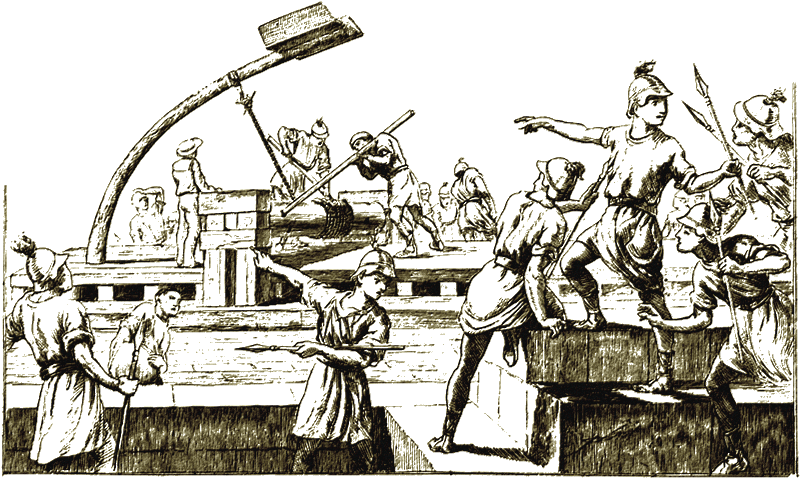
At first little attention was paid to what Rollin and his workmen were doing; but as the machine progressed toward completion, groups of soldiers began to gather about them, watching with curious and puzzled eyes the growth of the unknown monster. When at length, arousing from the absorption of his work, Rollin stepped back to obtain a better view of the whole, he was astonished and somewhat dismayed to find the galleries of the tower and the adjacent fortifications filled with spectators. He would have much preferred testing his catapult unobserved; but there was no help for it, and he proceeded to the trial with as much coolness as he could summon. Two men at the windlass slowly drew down the spar to within five feet of the platform. Four others lifted a fragment of rock weighing a hundred pounds or more into the scoop. Then with a beating heart the boy took the cord attached to the loop into his own hand.
He jerked it. There was a tremendous whizzing sound, as the spar sprung upright with a clang, and the huge mass of rock was hurled outward and upward in a long curve. Thousands of eyes followed it as it flew groaning through the air and fell to the earth, amid a cloud of dust, three hundred and fifty yards distant. His catapult was a success!
There was a moment's astonished silence, then a roar of applause went up from ten thousand throats, like the sound of a great wave rushing upon the shore. Spears were waved, caps were flung up; hearts that had previously sunk low with the dread of coming defeat bounded with the assurance of hope in the work of one small, quick-witted boy. In an instant one hundred men were toiling at the other spars, while others again went to procure more of the trees. By nightfall forty catapults, built on the principle of Rollins, were finished and placed upon the walls and in the galleries of the tower commanding the various points of approach.
They were really very effective instruments, as the sequel proved, discharging either single masses of stone from fifty to two hundred pounds in weight, or a multitude of small stones, capable, like grape and canister, of doing great execution among closely-ranked bodies of men. Their range could be modified from more than one thousand to less than one hundred feet by simply drawing down the spar more or less, thus increasing or decreasing the force of the discharge. Having carefully explained all these points, and assured himself that the men in charge of the engines would be able to work them to advantage, Rollin returned with Ben to the palace, very well pleased with his day's work.
ROLLIN awoke the next morning to find himself a hero. His invention of the catapults, simple as he deemed it, appeared to be regarded as little short of a miracle. It had been noised through the city, and when he and Ben showed themselves outside of the palace, a shout of applause went up from troops and populace alike.
In passing through one of the streets adjoining the palace Rollin heard his name called, and looking around he saw Duli Telliman, Uli's brother, running toward him. The young Orbello saluted him affectionately and led him to a body of troops camped near by. Here he found his old friend, the Taybo, with the Orbello soldiers of the village, the Lundee having revolted like the rest and gone to join their companions under Chadwick. Most of the men knew Rollin and Ben, and they were greeted with warmth. Here, too, he found Uli, who had come from the palace to put himself under the Taybo's orders.
Duli, he learned, had a command in the cadet corps of his town, and at his solicitation Rollin, and Ben went to visit their quarters. As the cadets form a sort of reserve to the regular troops when in the field, guarding baggage, convoying supplies, and performing other important services, each village had furnished its contingent, and they were now encamped together in the city to the number of twelve or fifteen thousand.
As there was no doubt that the enemy would soon attack the city, Rollin was anxious to see his father once more before he went to take the post assigned him. Both father and son were grave and thoughtful. The issue of the coming struggle could not be foreseen. At best the odds of numbers were largely in favor of the Lundee, and in the event of a defeat, escape from the city might be difficult if not impossible. But the prospect of taking part in a great battle was beginning to have a certain fearful fascination for the boy, and he would hardly have been willing to fore-go it now, even if he could have done so.
Every precaution which the experience of the Orbello commanders and the military skill of the Goyolloman could suggest had been taken to ensure success. Parties thrown out to reconnoitre the enemy reported the Lundee army to number over one hundred and twenty thousand fighting men. The effective force of the Orbellos did not amount to more than fifty-five thousand. The fifteen thousand cadets could not be reckoned, since it was not supposed they could act in the field against regular troops, their office being that of a baggage-guard, and to perform the many necessary services required by a great army, which are usually intrusted to new recruits and other irregulars or non-combatants. Hence the enemy might be calculated at nearly three to one, which, even with the advantage of their fortifications, seemed terrible odds for the Orbellos to contend against.
The conversation was interrupted by a sudden ringing at the gong, and a message was passed through the opening in the wall. It read,
"The vanguard of the enemy is in sight."
Rollin arose and took his father's hand. For a moment the two stood looking at each other in silence, the tears rising to the boy's eyes in spite of his efforts to keep them back.
"We must part, my son," said his father, in a slightly unsteady voice. "Go and do your duty bravely and faithfully, as I know you will. Avoid danger all you can without cowardice, and if we are defeated come to me at once and let us be together in the hour of peril."
"Be easy in your mind, Captain," broke in Ben, with gruff cheerfulness, "we won't give up the ship while a gun will fire or a plank float. If so be as we are thrashed—which it are not in their black skins to do, according to my reckoning why we will take to our heels as graceful as may be."
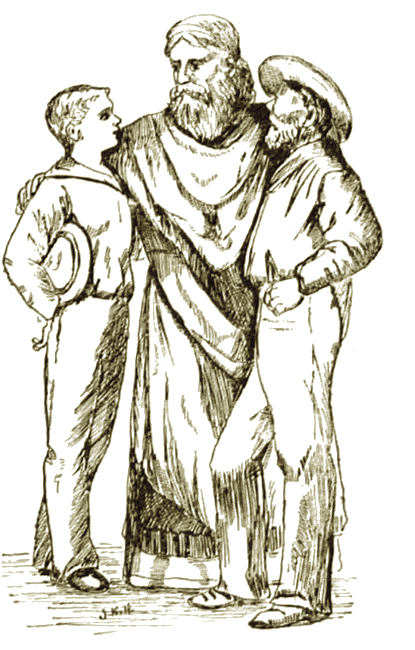
It having been arranged in the event of a reverse that the party, not forgetting Polly, should meet at the mouth of the tunnel, directing their movements after that according to circumstances, Rollin and Ben once more clasped the captains hand and departed.
Ben's post was in the stone gallery immediately above the main drawbridge. This was one of the most important points in the defence, and was manned by the crack corps of the Orbello army, tried veterans, and every one a noble of high rank. This division was supported by fifteen hundred of the king's body-guard; the whole armed with the short, heavy thrusting-spear used only at close quarters. In the turret at either wing a catapult had been so planted as to deliver its missiles at long range, or to sweep the approaches with a crossfire.
Back of these troops, in the successive lines of defence, rising terrace above terrace and encircling the whole edifice, were posted fifteen thousand bowmen. From the admirable system of construction the whole number could engage the enemy at one time, each line firing over the heads of the men below.
Twelve thousand men occupied the interior of the fortress, posted at the loop-holes in the outer walls. The main body of the army, consisting of thirteen thousand bowmen and ten thousand men armed with long spears, were drawn up in four lines in the plain immediately around the fortress. These troops would bear the first brunt of the enemy's onset, supported by the divisions in the fortification and upon the roof. In case of defeat they would retreat into the building by the various drawbridges, protected by the fire from above.
The commanding general of the Orbello forces was at his post in the fourth gallery of the tower, where he had a perfect view of the whole field. As the Goyolloman's special aide-de-camp and messenger, Rollin's place was near him. Mounting the steps of the tower, he found this officer surrounded by his staff. He was an elderly man of fine, soldierly bearing, splendidly dressed, and wearing ornaments denoting the very highest rank. As Rollin approached, he smiled kindly and beckoned him to a place at his side.
"Welcome, my son," he said, "you have come to help us play out the great game."
"It is very little that I can do, I fear," replied Rollin modestly, "but I will do my best."
"Nay, if every one did as much," returned the general, with a gesture of his hand, indicating the catapults, which reared their tall spars in various portions of the fortifications, "we should have little to fear from yonder rebels."
"The enemy is in sight, I am told," said Rollin.
The general pointed to a dark mass moving upon the brow of a hill some two or three miles distant. This was the advance guard of the Lundee. They marched slowly down into the plain and look up a position to the right of the centre, where they camped.
It was growing late, and it was evident that there would be no attack that night, but the troops slept on their arms for fear of a surprise. Rollin returned to his room in the palace and retired early in order to be on hand in good season on the following morning. After lying awake a long time, with thoughts of the morrow's struggle whirling in his excited brain, he fell into a sound sleep.
He was awakened by a touch upon his shoulder, and springing up, saw Polly standing near him. The boy gazed at his savage friend a moment, then burst into a fit of laughter.
"Why, Polly, what on earth have you been doing to yourself?"
"Big row to-day," replied the native, with dignity, copying Ben's peculiarities of speech as usual. "Polly put on Sunday togs when fight, all same as big white chief. What the mischief you laugh at?"
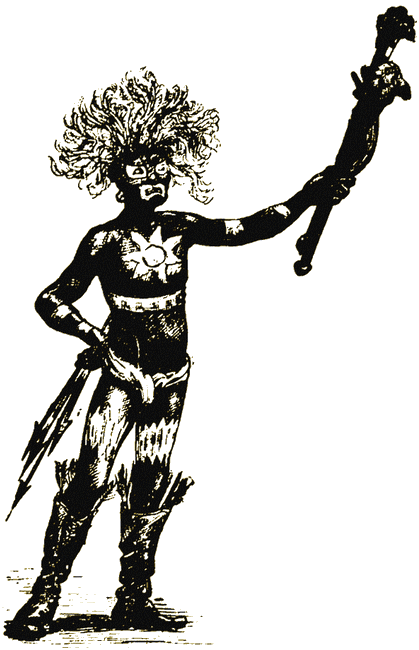
In anticipation of the coming battle, Polly had got himself up in what he considered a perfect war panoply befitting his character as a warrior of renown. In the first place he had procured some red and white paint, and with this had artistically bedaubed himself from head to foot in a fashion hideous to behold. He had drawn white circles around his mouth and eyes, painting his lips and eye-lids red. He had then drawn bands of alternate red and white around his body and limbs, until he had made himself look something like a weird, animated barbers pole, surmounted by a frightful clown's mask. He had stuck an infinite number of white plumes, such as arc worn by the Orbello officers, all over his head, so that it presented the appearance of a huge ball, a yard in diameter, surrounding his grotesquely painted visage. To complete all, he had borrowed a pair of Ben's huge boots, the loose tops of which came nearly to his knees. The space between the leather and his limbs he had reserved as an arsenal for spare arrows and a throw-stick or two, which rattled loudly as he walked. With his bow slung upon his back, a number of javelins in one hand and a bunch of clubs and boomerangs in the other, he strode proudly before the boy's astonished eyes, the very impersonation, as he believed, of warlike terror and grace.
"Well, Polly," said Rollin, wiping the tears of laughter from his eyes, "if any of those Lundee fellows venture within a mile of you to-day, they are braver than I take them to be. But are the troops astir yet?"
"Lundee warriors are dogs," asserted the native, rolling his eyes. "Polly very terrible. Kill six, two, one thousand his own self."
"If you do half that much," replied Rollin, "they ought to hail you king of Orbello Land on the field of battle. But are the troops astir yet?"
"Yes, muss begin soon," answered the native.
"Well, then, come along."
In the outer apartment they found Ben already afoot and waiting for them, and all three took their way to the fortress. Ben and Polly went to their posts in the ramparts, while Rollin mounted the tower to take his place beside the general.
Day was just breaking and the dying camp-fires shone red through the rising fog. A deep low hum arose from the plain, and now and then a far-off shout, or nearer the clang of weapons and the quick tramp of many feet. As the mist rolled slowly away, a strange picture was revealed to the boy's eyes. As far as he could see, on every hill and in every hollow, stretching down into the plain itself, vast bodies of men stood or lay upon the ground, or marched to and fro with fluttering flags and glistening spears. There seemed to be thousands on thousands of them, and the boy's heart sank as he saw how few the Orbellos seemed compared with the enormous host arrayed against them. The Lundee forces completely surrounded the fortress, their outposts having been pushed to within half a mile of the sentry lines of the Orbello army.
Just as the first rays of the sun struck upon the floating standards of the two armies, the sound of trumpets in the Lundee camp rang out upon the warm morning air, answered by those of the Orbellos, and the numerous columns of the enemy began a general movement toward the devoted city. The battle was about to begin.
The troops outside of the fortress were soon in line. On the right and left of the main gate strong detachments were pushed forward to occupy the high ground, three hundred yards from the walls. Among the foremost colors of the division on the right, Rollin recognized the bird in flight upon a yellow ground, which was the standard of his old friend, the Taybo. It was upon this body that the first general attack would be made under the skilful direction of Chadwick, who was proving himself to be a leader of no mean ability.
It was not until nine o'clock that the leading columns of the enemy, sweeping down into the plain and driving in the skirmishers, attacked the right in force. The engagement opened by a discharge of arrows, and here the admirable discipline of the Orbello troops told against the looser organization of the Lundee, officered as they were by their own race, none of whom had ever risen above the rank of subalterns. While the arrows of the Lundee came in confused discharges, doing little damage, those of the Orbellos were shot in regular volleys, each rank opening and retiring to give place to the next rank. The Orbello marksmanship was excellent, the bowmen shooting with the steadiness and accuracy of target practice. Wide rents appeared in the Lundee lines, and presently they were seen to waiver. At this juncture the Orbello squadrons charged them with levelled spears. The already disordered ranks gave way, rolled back upon themselves, and finally look to headlong flight.
A tremendous shout from the Orbello forces hailed this success, in which Rollin, who had watched the engagement in breathless suspense, could not forbear joining. The general's face, however, exhibited none of the exultation which might have been expected. He was scanning another part of the field with an anxious expression, and following the direction of his gaze, the boy saw a sight which chilled his own enthusiasm at a glance.
ALONG the rising ground at the left, and swinging gradually around so as to inclose the entire position of the Orbellos, column after column came on with a swift and steady movement. The formation of the enemy was such that the first heavy blow would be struck upon the Orbello centre covering the main gate, followed by a series of attacks all along the line, as the Lundee army by divisions came into action. By this manoeuvre each section of the Orbello front would have to defend itself, and thus be unable to lend support to the centre, at the main gate, where the decisive struggle of the day must take place.
The Lundee divisions advanced to the attack in silence and in perfect array, the long lines of spears gleaming in the sun like spots of flame. In obedience to orders, and without the flight of an arrow, the advance corps of Orbellos, on the right and left of the centre, retired in good order upon the main lines. The solid ranks of the enemy were now only three hundred yards distant. Suddenly the two catapults in the first gallery, which had been loaded with two hundred-weight of rock each, ready for firing, sprang erect with a heavy clang, and the immense projectiles groaned through the air, falling directly into the thickest portions of the advancing columns, tearing wide lanes through them. Astonished and dismayed, the whole line halted in a cloud of dust driven into the air by the falling rocks.
While they wavered, the two catapults, together with four others nearest in position in the works, sent their missiles into the disordered enemy, who began to fall back upon the rear. But fresh squadrons coming up checked the flight, permitting the fugitives to reform, and the advance was resumed. The catapults continued to shower masses of rock and small stones upon them, but in spite of the havoc they pressed bravely on, At a hundred yards' distance the whole force of archers opened upon them from the roof and the loop-holes of the fortification. The very air seemed to be darkened with the clouds of arrows. The front of the Lundee lines melted away before the withering fire of the bowmen and the discharges of the catapults, which, crossing upon the approaches, swept down the serried ranks as hail beats down a field of wheat.
Indeed it was evident that but for Rollings happy thought the overwhelming numbers of the Lundee, ably handled by their commander Chadwick, must have stormed at least the outer works of the gate at the first rush. But utterly unprepared for the deadly power of these, to them, new and terrible engines, they began to lose the confidence which had inspired them at the beginning of the engagement, and to fight with the ferocity of sullen desperation.
The panorama now spread out before the boy's eyes was one of fearful grandeur. Over the plain, on every side, dense columns of the enemy were coming up to join those already engaged, their myriad lance-points flashing through the clouds of dust, rolling up like the smoke from a great fire. Dark lines of troops with levelled spears swayed to and fro in the advance and retreat of close combat under the walls of the devoted fortress. Back and forth, in crossing lines that dazzled the eye like fast-falling snow, flew a storm of arrows. Here and there two opposing regiments were seen fighting hand to hand with the short thrusting-spear, the lines writhing in long convolutions as they gained or lost ground. In the ramparts on the roof below, all was in motion: the archers drawing their bows and bending forward with their discharge, giving the whole a peculiar wave-like pulsation, and the tall spars of the catapults nodding up and down with a machine-like regularity.
Though there was none of the deafening explosions common to a battle fought with fire-arms, the uproar was appalling. The tramp of countless feet, the shouts, cries, and shrieks of the combatants, the clang of the bows, the whizzing of the arrows in flight, and the dull boom of the catapults united to make a pandemonium of the most awful description.
Though an occasional shaft rattled against the stone of the gallery, where he stood beside the commander, Rollin was, comparatively speaking, out of the action. The fighting spirit was strong within him, and he felt a growing resentment of the restrictions which kept him in idleness while the fortunes of the day were in the balance. He could see, in the occasional lull in the arrow flights, the sturdy form of Ben moving about the catapult in the battery in the first gallery, and he could hardly resist the temptation to join him. He was destined, however, to take his full share in the deadly game before the sun set upon that memorable field.
It was now two o'clock in the day and the fight had been raging since shortly after sunrise, without advantage to either side; though owing to the fire of the catapults and the shelter behind which the larger part of the Orbellos fought, the Lundee had sustained much the heavier losses in killed and wounded.
But the bold and skilful leader of the revolted Lundee was not yet at the end of his resources. Fresh troops were massing on the heights opposite the main gate, to be hurled upon the already hard pushed Orbello centre and overwhelm it at a blow. Foreseeing this movement, the Goyolloman directed the commander to strengthen the lines before the drawbridge with such troops as might be spared from the interior of the fortress. These re-enforcements amounted to only two thousand men, it being possible to spare no more from the other divisions.
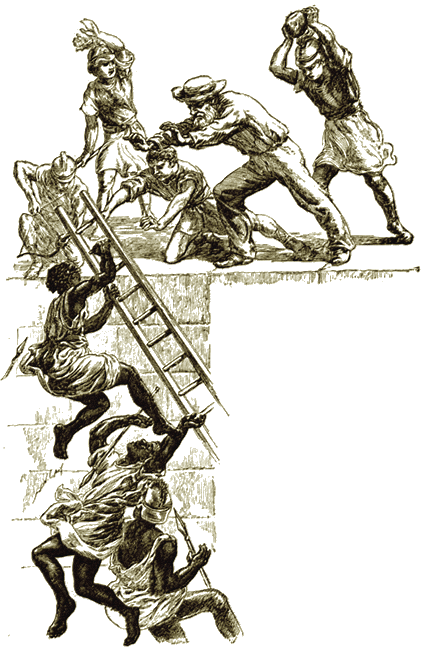
There was a momentary lull in the fury of the battle, as the waves seem to withdraw from the shore to gather together in one enormous billow, then all that could be done to meet the coming blow was promptly done. Lines were reformed, the catapults loaded with boulders, the officers of the various divisions walked among their men, speaking words of encouragement. And now, with the rush and roar of a whirlwind, the attack was delivered.
Ten thousand Lundee, in a compact body, came on at a run, with levelled spears, striking the Orbello lines in the centre, doubling them in, bending them back, and completely disorganizing them. The Orbellos fought gallantly, dropping bows and spears, and engaging the enemy with their short javelins, hand to hand. The carnage was dreadful. A storming party of Lundee succeeded in getting a ladder in position, and swarming up, maintained a doubtful struggle with the defenders of the walls. This manoeuvre had not escape Ben Bark's watchful eyes. Calling to those nearest him to follow, he rushed forward and, almost with his own unaided strength, threw the ladder, with its living load, into the ditch below.
At this gallant action of his friend, Rollin could not restrain an exclamation of applause. The general, who stood near, shook his head with a melancholy smile.
"He is a brave man," he said sadly, "but he cannot contend against fate."
"You think we shall be defeated?" asked the boy timidly.
"They still hold the gate," responded the general, "but without help they are lost, and I have no help to send them. Before yonder sun has set Oo will have fallen."
With his head bent upon his chest the veteran turned and walked away. The boy watched his moving figure for a moment, then he hastened down the steps of the tower. Pausing at the bottom, he wrote the following note upon a leaf of his pocket-book:
Dear Father:
Our men are being hard pressed at the main gate. The general fears all is lost. I am going to try to help.
Good-by.
Rollin.
Pushing this message into the hand of an officer, who stood at the foot of the stairway, with the words "for the Goyolloman," he hurried on to the camp of the cadets, whom he found in a state of great excitement and eager for news. His friend Duli Telliman saw him and made his way to his side. To the young Orbello Rollin related the critical position of affairs and unfolded the plan he had formed. Duli heartily approved, and mounting a post cried out at the top of his voice,
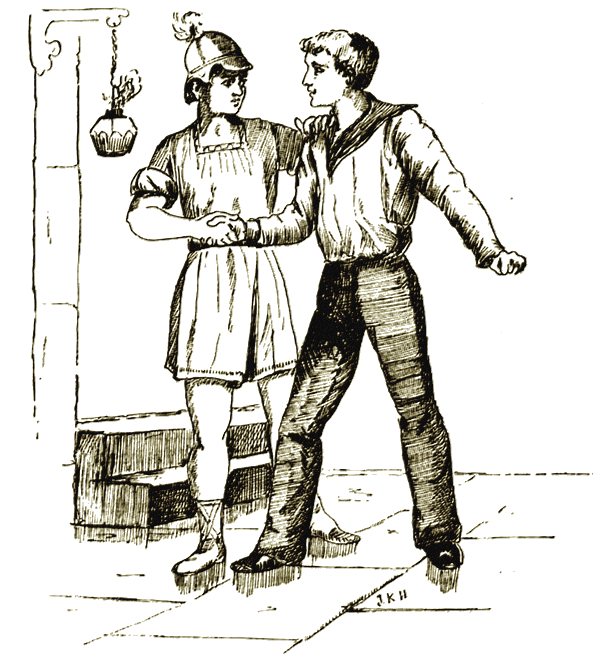
"Boys, the battle is going against us. Oo will surely be captured before night unless we do something to prevent it. My friend, the white stranger boy, Rollin, has thought of a plan. Will you hear what he has to say?"
"We will! we will!" responded a thousand voices.
Taking Duli's place, and speaking in the best Orbello he could command, Rollin said,
"We are only boys, it is true, but many of us are large and strong. I have discovered a way of getting out of the city unseen. By this means we can attack the Lundee in the rear and unexpectedly. Will you take me for your leader and try?"
"Yes, yes," replied the voices again.
"Then," cried Rollin, springing to the ground and addressing Duli, "I want fifty boys to act as messengers. Now, boys," he continued when the required number had gathered around him, "scatter through the camp and select ten or fifteen of the largest boys from each company. Get them into line ready to follow me."
The messengers sped away, and soon from every part of the camp rose the cry "Fall in!" In an incredibly short space of time the cadets chosen for the expedition, many of them almost men in size, were in line along the street, while the smaller boys who were not to go, stood by looking on with envious eyes. Calling his fifty messengers to him again, Rollin directed each one to provide himself with a lamp, which was easily done, as they had only to take them from the walls of the neighboring houses; Oo being lighted, as it will be remembered, by lamps placed on the outside of the dwellings.
All being ready, with the lamp bearers at the head of the column, Rollin gave the word to start. Leading them at a double-quick to the entrance of the tunnel, he stationed the boys with lamps at equal distances along the subterranean passage, and sent the cadets through upon a run. As fast as they emerged into the quarry pit outside of the city, he formed them in line. Boys as they were, and full of enthusiasm, he got them through the tunnel and into position in one tenth of the time it would have taken to have handled the same number of adult troops.
While the last files were still pouring through the tunnel, he led the head of the column up the slope to the plain above. Taking advantage of the inequalities of the ground, he kept his little army hidden from the enemy until he reached a sandy elevation not a hundred yards from the rear of the Lundee at the main gate. Here he halted his troops and formed them in a compact body, ready for the charge. Creeping to the top of the hill, he peered cautiously over.
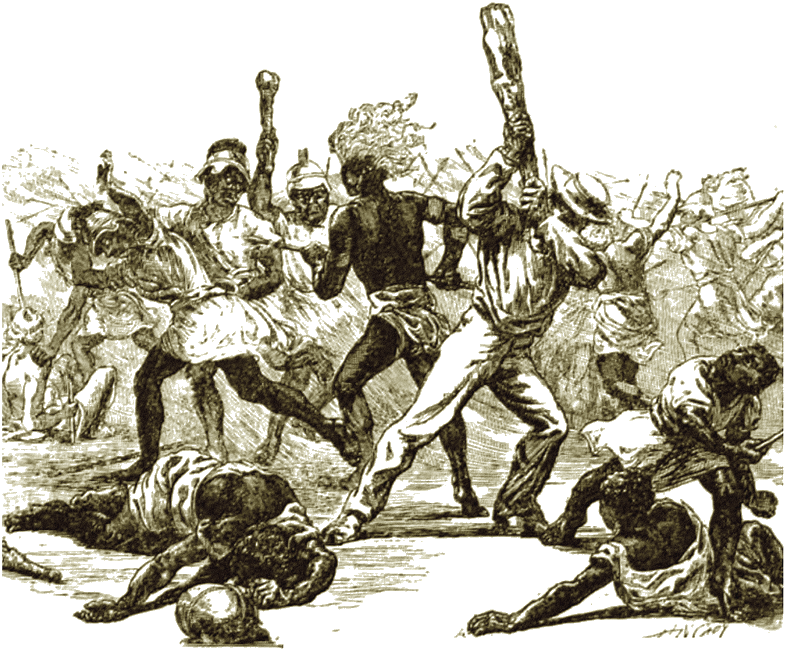
The battle still raged fiercely around the gate, but it was the last effort of despair. The gallant defenders, reduced to a few hundred, were fighting before the drawbridge, almost hidden in the cloud of Lundee surrounding them. A dozen ladders were in position upon the walls, and strong parties of the enemy had affected lodgements in the gallery, while others were mounting rapidly to their assistance. The boy could see the sturdy form of Ben wielding a huge fragment of wood and clearing a wide circle around him at every blow. At his side fought Polly, his wild war-cry rising shrilly over the din of the field.
Hastily descending the hill, he gave a rapid glance along the line of eager, boyish faces, waiting breathlessly for the word to move. Even to him they seemed very young to take part in the fearful business before them. None of them had ever seen a battle, and many a heart there beat thick and many a cheek was pale. But not one shrank back; not one would have slunk away if he could.
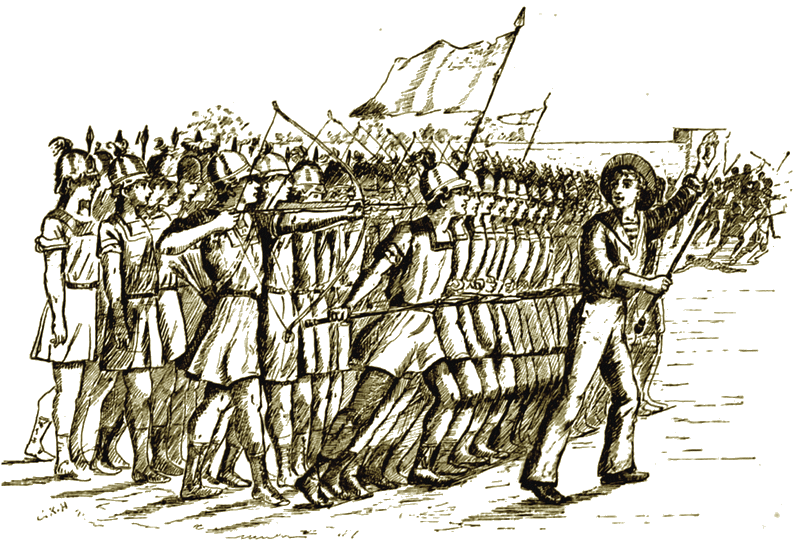
Drawing a deep breath, Rollin gave the word to march. Leading them around the base of the hill, he put them at a double-quick, and with levelled spears and drawn bows the whole gallant young army swept clown upon the rear of the Lundee. As the foremost rank broke into a double-quick the second discharged a storm of arrows between the open spaces in the first line, then cast away their bows, and drawing their spears closed in with a cheer. Rank after rank they swept on in as perfect order as if on parade, lowering their lances and breaking into the charging step, until the whole body was moving onward in a compact mass, the ground shaking beneath their regular yet swift advance, their levelled spears glittering like a line of moving flame, and their young faces sternly set beneath their frowning helmets. As imminent as the danger was, Rollin, advancing at their head, was proud of the gallant young army of which he had so strangely become the commander. It was all a dream—an incredible thing which in after years he could never quite believe; yet real enough, as many a seditious Lundee that day had reason to know. So sudden and unexpected was the attack, that many of the enemy threw down their arms and fled without stopping to see who their assailants were. In an instant the whole body of Lundee were in confusion.
Seeing this unlooked-for diversion in their favor, the dispirited Orbellos took heart again, and with a shout made a desperate sally against the discomfited enemy. The ladders were hurled into the ditch and the storming parties driven headlong over the walls. With a roar and rush the Orbellos poured through the gates, rolling the Lundee backward, where, met by the spears of the cadets, they were massed together in inextricable disorder.
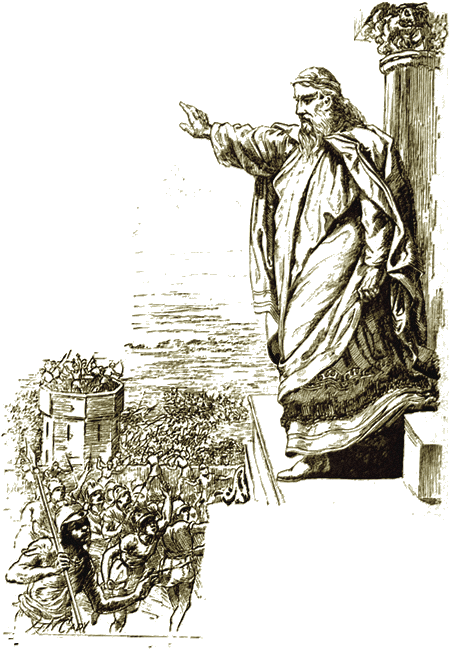
Even yet the enemy might have recovered their courage and turned the scales of fortune in their favor, but at that most critical moment a startling apparition upon the Burning Tower attracted the eyes of both armies. It was the figure of a man, tall and majestic of stature, clothed in splendid robes, and with a gleaming circlet upon his long white locks. He stood with his hand out-stretched, as if in blessing or malediction, looking almost supernatural in the declining rays of the sun.
A dead silence fell upon friend and foe, spears were lowered, and heads involuntarily bowed. Then arose a cry, of renewed hope and courage on the part of the Orbellos, and of terror on that of the Lundee:
"The Goyolloman! the Goyolloman!"
To the Orbellos his appearance there—for they could know nothing of the tunnel connecting his apartments with the tower—seemed a manifestation from heaven in their favor. To the more ignorant Lundee, to whom the invisible Goyolloman was at all times something mysterious and awful, his presence was a sign of the anger of the Deity with their treachery and rebellion. While, therefore, the Orbellos renewed the battle with three-fold vigor, the Lundee threw down their arms panic-stricken and fled in every direction, pursued by their victorious foes.
In the flush of triumph, while officers and men alike thought only of the victory so dearly won, the figure disappeared from the tower and no Orbello ever beheld it again.
RETURNING from the field by way of the main gate, Rollin felt himself suddenly seized in a pair of brawny arms, while Ben's voice, between laughing and crying, exclaimed,
"We have won, my lad, we have won! no thanks to us either, for it was your doing. We were at our last kick when you hove in sight with your boys. It was a pretty picture to see them shavers go in."
"Heap big warriors, them little chaps, all the same," remarked Polly, who was close at hand.
The faithful savage showed signs of having taken his full share in the day's fighting. His magnificent head-dress was shorn away, one of his boots had been dropped somewhere, and what with perspiration and rough handling, his war paint had become mixed up and smeared over his face and figure in a most astonishing manner. The sailor, too, exhibited evidences of the Herculean efforts he had made, but his honest face shone with delight, and he declared himself quite ready to "take another hack at it" if need were.
The three friends retired to their apartments in the palace for a short rest and some food, for neither had eaten a morsel all day. At nine o'clock they went to visit Rollin's father by way of the tunnel. They found the captain reading a report, which had just been handed in to him, with a clouded brow. He welcomed his son and his two companions warmly.
"You are a real hero, my boy," he said, drawing the lad to him affectionately. "I saw the charge you led. It was splendidly done. Your boys fought like old soldiers. Do you know, my son, this nation has reason to be grateful to you? You, and you alone, by your courage and cleverness have saved it from ruin to-day."
"No, father," replied Rollin, "it was your appearance on the tower that really did it."
"It helped, certainly," said his father. "I hoped it would. When I received your note I was revolving it in my mind as a last resort I half guessed what you meant to do, and I tried to time my appearance so as to aid you at the critical moment. But it would have failed had not your attack already thrown the Lundee into confusion. No, no, my boy, you have honestly won your laurels and I am proud of you."
"Has anything been heard of Cousin Chadwick and his men?" asked Rollin.
"He and most of the whites with him were taken prisoners at the gate," replied Captain Faulkner with a frown.
"What will be done with them?" said the boy.
"Their crime is an unpardonable one. There is but one fate for them. The council has decided that they must die at sunrise to-morrow; Orbello justice is swift.
"And serve them right, too, the lubbers," growled Ben.
"Yes," said the Captain sternly, "it is but just. To carry out his own ambitious schemes Chadwick has involved a peaceful nation in war and caused the death of hundreds. His career has been one long series of treachery, ingratitude, and crime, and this is the fitting close."
"It is terrible," murmured the boy, shuddering. "I cannot bear to think of it."
"Think of the widows and orphans in the land to-night," replied his father, coldly. "Think how many happy homes he has made desolate."
"And think, too, lad," added Ben, "of his cruelty to you on board the Swallow—"
"I forgive him that now," interrupted Rollin quickly, "and I wish his other wrongs might be as easily forgiven. I know you are right, father. He deserves the worst punishment. But has he not already been terribly punished? And what good will his death do any one now? If it would save a single life, I would not say a word; but—"
"Well?" said his father, seeing that he hesitated.
"I ask that his life and the lives of those with him be spared," was the boy's earnest response.
His father looked at him in silence for a moment, the stern expression of his features visibly softening.
"I am pleased to hear you speak as you do," he said, after a moment. "But this man is a great criminal. His fate has been settled by the supreme law of the country and I dare not interfere in his behalf. And even if I were to set him and his companions free by the exercise of my authority, they would be torn to pieces by the people."
"Then let us take them with us," replied Rollin. "If you cannot liberate them openly, can you not do it secretly?"
His father made no reply. Rollin went up to him and took his hand.
"Father," he said in a gentle tone, "you have been pleased with what I have done to-day. You think I have deserved some reward. Well, I shall feel that I have been repaid for everything, ten times over, if you will save this man and his companions. Will you not do it for my sake, father?"
"What a way he has!" muttered Ben audibly. "If he was to ask me for my head in that tone of voice, blow me! if I wouldn't unscrew it and give it to him."
There was a long silence in the room, while Captain Faulkner paced to and fro with bowed head.
"Well," said he, finally, turning about and looking down at his son affectionately, "I will do it—for your sake, my son."
"Oh, thank you, thank you!" cried the boy gratefully.
"And you may put in a word of thanks for me, too," said the sailor; "for though the man is a blackguard and those with him neither better nor worse than horse marines, scragging them in cold blood would have gone agin my stomach, after all. So, begging your pardon, Captain, I axes leave for to thank you on my own account."
And the warm-hearted seaman concluded his speech with an elaborate bow, suitable to the occasion.
"We must leave Oo to-night," said Captain Faulkner. "If the escape of these men were discovered, I could not protect them from the fury of the people even in my own apartments. Besides the exit of the tunnel is now known, and by to-morrow it will be useless to us. Take Ben and Polly with you and convey the baggage to the quarry outside the walls. I will join you there at midnight."
"But will you not need our help?" asked Rollin anxiously.
"No," replied his father, "all must be done quietly or it will fail. The prisoners, fortunately, are confined in the basement of the tower. The tunnel which you discovered leads into the vaults adjoining their prison. I have the means of access to them, unknown to the guard at the outer door. Go my son, go my friends; I will not fail to be with you at the appointed time."
The three companions took their departure. On their way through the city they paused at the camp of the Taybo, who with Uli and Duli, had returned some time since from the battlefield. With deep regret the boy bade his Orbello friends farewell. It was with difficulty that he restrained his feelings when they spoke affectionately of meeting him in the morning, for he knew that by daybreak he should be far from them and that he should never see them again.
An hour before midnight the baggage had been transported to the quarry outside the walls, and the three friends stood waiting the arrival of Captain Faulkner and the prisoners.
"Ben," said Rollin suddenly, "I want to ask you a question."
"Fire away, lad," replied the sailor, who was smoking his pipe with great contentment.
"First let me read you something," said the boy, drawing from his pocket the paper which it will be remembered the Taybo had given him on his departure from the village, and reading it aloud by the light of the lamp which he carried. "That says that I am to enjoy all the rights and privileges of an Orbello citizen, doesn't it?"
"Just so," answered Ben; "nothing could be clearer."
"Well, then, I have a right to my full share of anything which is the common property of the people, have I not?"
"Sure," replied Ben; "there can't be no doubt of that."
"I am glad you agree with me," said the boy. "Now come, I want to show you something."
Leaving Polly to mount guard over the baggage, Rollin led the sailor to one of the clay-pits which he had explored on the day of his first discovery of the tunnel. Pointing to the walls of the cavity, where several glittering points were to be seen, he said:
"Do you know what those are, Ben?"
"Stones," said Ben.
"Yes, they are stones, but very valuable ones. Those are diamonds, Ben."
"Diamonds," repeated Ben curiously, but without offering to touch one of them.
"Yes, diamonds of the purest water. Now since they are the common property of the Orbello nation, we are sure that I have a perfect right to a share of them, are we not?"
"Certain," said the sailor, "and if services was to be paid for in proportion, I should say the whole of them would no more than square the debt."
"I shall be satisfied with a few," replied Rollin, opening a small leather bag which he carried, and proceeding to dig out one of the glittering stones with his knife. "Come, Ben, you shall share with me."
"No, lad," said the sailor drawing back. "They are yours, but not mine. Go on, my boy, and take what is justly yours. I will hold the light for you."
So plentiful were the stones that in a very short time Rollin had filled his bag, choosing the largest and those which, as far as he could judge in their rough state, were the purest. Uncut as they were, the light falling into the bag, where they lay together, shot back rays of rainbow fire, dazzling the eyes of the beholders.
Meanwhile in the gloomy dungeon of the tower, lighted by a single smoky lamp, sat Chadwick and his companions, buried in sullen despair. With his proud spirit utterly broken, and a prey to bitter and unavailing remorse and regret, the fallen leader of the Lundee rebels recalled the events of his life, so soon to close with a shameful death. He thought of the kind protector whose goodness he had rewarded with treachery. He thought of the poor boy whom he had robbed of his parent and stripped of his means of support, giving him in exchange hardship, toil, and cruelty. He thought of the golden dreams which had lured him on through a long career of crime to his present wretched position. He knew he must die; but he cared less for that than the weight of sin upon his soul. He felt if he might see those whom he had so cruelly injured and ask their forgiveness, he should be able to meet his doom with more courage.
While he sat so, with his face buried in his hands, a little apart from his companions, a slight noise caused him to raise his head. He saw, coming through a narrow door at the back of the dungeon, a figure that caused him to start to his feet with an exclamation.
"You here?" he said in a trembling voice.
"Yes," replied Captain Faulkner, for it was he, approaching the shrinking prisoner. "I, whom you so basely betrayed, whom you thought you had murdered, whose name you have blasted, and whose child you impoverished, I am here. Do you know why?"
"To look at the man who has injured you," answered Chadwick, more calmly, "before he receives the punishment he deserves. And I am glad that you have come. Death clears all scores. I ask you to try and pardon me so that I may die with a lighter heart.
"You acknowledge your crimes, fully and freely?" demanded the captain.
"Fully and freely," was the reply.
"And you have no hope of escape?"
"None whatever," answered Chadwick, bending his head mournfully.
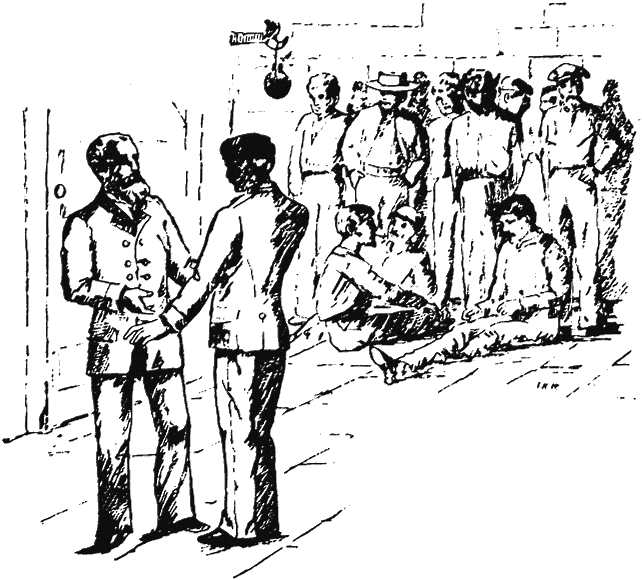
"Then," said his relative, extending his hand to him, while a benignant smile overspread his noble features, "not only do I forgive you from the bottom of my heart, but I will save you."
"You will save me!" echoed Chadwick, bewilderedly.
"After all I have done against you? I—I cannot believe it."
He covered his face with his hands and stood silent for a moment.
"Come," said Captain Faulkner, kindly. "Since I cannot aid you openly, it must be done unknown to those who watch over you. We have no time to spare. Get your men together and follow me without noise."
Leading the captives out of the dungeon by the way he had come, Captain Faulkner fastened the door behind them and, taking up the lamp he had brought, guided them through the tunnel to the quarry-pit where Rollin, Ben, and Polly were waiting for them with the baggage.
Taking Chadwick by the arm, he led him face to face with Rollin.
"Rollin," he said, "I have kept my promise, you see, and saved your enemy's life, as you begged me to."
"He, too," murmured Chadwick, overwhelmed by this new exhibition of generosity. "Rollin," he added in a broken voice, "I hope you may never learn that the sharpest punishment a wicked man may have to bear is such unmerited kindness as both you and your father have shown me to-night."
"Do not speak of it, cousin," said Rollin, giving him his hand. "Let all the past, from this night, be as if it had never happened."
"And now," exclaimed Captain Faulkner cheerfully, "let us start, for we have a long and difficult journey before us."
Distributing the baggage among them, the travellers mounted to the plain and, under the guidance of Rollin's father, began their march. All night the light from the tower illuminated their path, once more burning with the red flame the symbol of peace and safety in the land of the Orbellos. On leaving the palace for the last time, Captain Faulkner wrote a message, in the Orbello language, which he placed in a conspicuous position. It ran:
"The time has come for me to return to my own people and my own country. I part from all with good-will and affection, and I implore the Deity to grant the Orbello nation happiness, prosperity, and peace. I nominate as my successor to the Goyolloman's throne, Uli, grandson of the Taybo Telliman. If he decline the honor, then I empower the Grand Council to choose the proper person. Farewell."
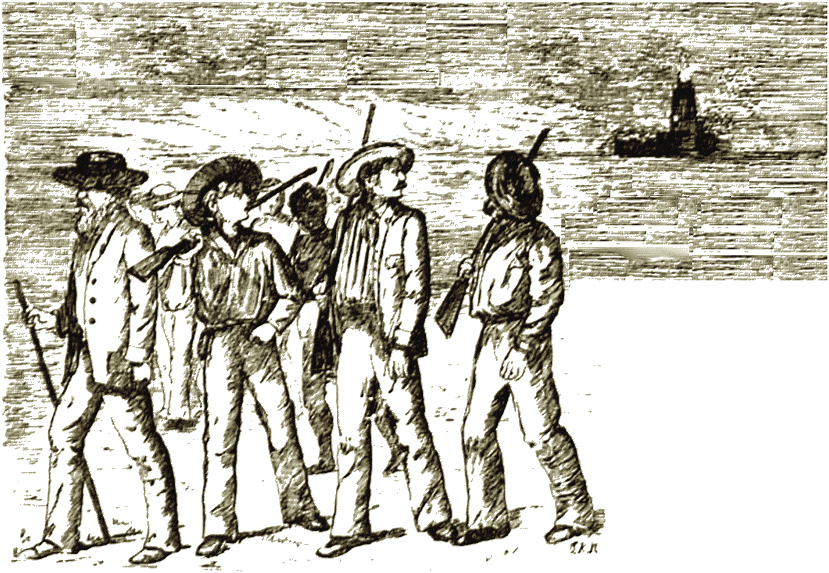
But little more remains to be told. After many hardships and perils the travellers reached one of the English settlements on the southern coast of Australia. Thence they proceeded to Sidney, where they found the Swallow waiting, according to Chadwick's directions when he left her in Kings Sound. The whole party took passage in her for America. Polly refused to abandon his friends Rollin and Ben.
"Polly no more black fellow," he asserted; "all white inside, anyhow. All 'Merican, except him hide."
On his arrival Chadwick made immediate and full restitution of the property which he had wrongfully appropriated, proving his repentance to be genuine and unaffected. His strange and terrible experience uprooted the pride and ambition which were his bane, and strengthened and developed the good which was in his nature. He is still the commander of the Swallow, which now belongs to Rollin, and in which the whole party take long voyages together. At such times Ben insists on resuming his old post as a foremast hand, though he is well provided for and has no need to work.
Rollin was amazed and overwhelmed at the price his diamonds brought when they were sold. It amounted to a large fortune, which his father manages for him until he shall come of age. During the greater part of the year they all live together at Captain Faulkner's beautiful place on the Hudson not many miles from New York. On warm nights Polly, who has never quite lost his wild habits, takes off his civilized clothing and, tying a waist-cloth about him, decorates his ebony person with paint and steals from tree to tree, with a noiseless step, tracking imaginary foes or pursuing unseen game.
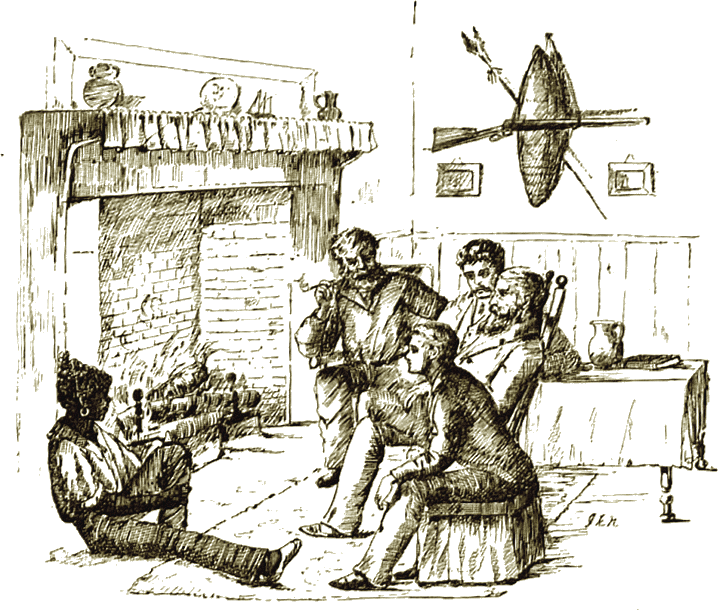
In the large sitting-room of the house, on cold winter evenings, Captain Faulkner, white haired and white bearded, though still hale and strong, and Cousin Chadwick, with his calm eye and melancholy smile, sit in their easy chairs and listen, while Rollin, Ben, and Polly, lounging upon the rugs before the glowing fire, go over again the story of their wonderful discovery of mysterious "Oo."
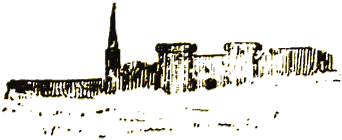
Roy Glashan's Library
Non sibi sed omnibus
Go to Home Page
This work is out of copyright in countries with a copyright
period of 70 years or less, after the year of the author's death.
If it is under copyright in your country of residence,
do not download or redistribute this file.
Original content added by RGL (e.g., introductions, notes,
RGL covers) is proprietary and protected by copyright.